And then there was Mort, a kitten I 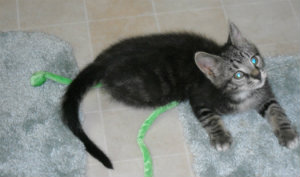 adopted two days after Sparky died in an attempt to deal with my grief. Taking care of him was a full-time job in and of itself, and certainly took up much of my potential writing time. The “kitten from another planet,” as Jo describes him, was with us for about two months before I was forced to return him to the adoption service. Mort did all the things one would expect a kitten to do, but he didn't stop there. His antics and misbehavior went far beyond what is considered normal.
adopted two days after Sparky died in an attempt to deal with my grief. Taking care of him was a full-time job in and of itself, and certainly took up much of my potential writing time. The “kitten from another planet,” as Jo describes him, was with us for about two months before I was forced to return him to the adoption service. Mort did all the things one would expect a kitten to do, but he didn't stop there. His antics and misbehavior went far beyond what is considered normal.
But you'll have to read all about Mort in next week's blog. #
Sparky – Final Chapter (8/18/15)
Sparky’s appetite remained hearty to the end, though he continued to lose weight. The rest of his time was taken up with sleeping and using the litter box. When he wasn’t eating or sleeping, he would crouch on a table or chair and just stare into space. He didn’t seem to be in any sort of pain, but he clearly wasn’t content.
That’s when wife Josephine and I decided to have him checked over one more time, preferably by someone other than the vet we’d been going to. I had been less than satisfied with him, suspecting he was a confirmed dog lover who treated cats only because it was required. Previous visits to this facility over the past few years had included an expensive ultra-sound scan on Sparky that yielded absolutely nothing. We also knew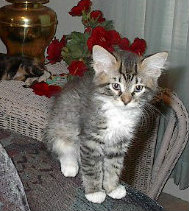 that we might have to put Sparky to sleep for good, but I wasn’t going to commit to that without a professional opinion.
that we might have to put Sparky to sleep for good, but I wasn’t going to commit to that without a professional opinion.
One of those small local phone books had shown up in our mailbox recently, and a subsequent scan of its yellow pages turned up an ad for a different veterinary clinic that was relatively close by. We called and made an appointment for the following day.
When we placed Sparky in the cat carrier, there was – uncharacteristically – no resistance from the Maine Coon/tabby. When we set the carrier down in the middle of the back seat so that Jo could watch and speak soothingly to him, Sparky gazed out at us with barely a whimper, perhaps sensing that we were not heading for the usual destination.
Sparky – again uncharacteristically – remained relatively calm as we drove to the new pet clinic. Arriving a short time 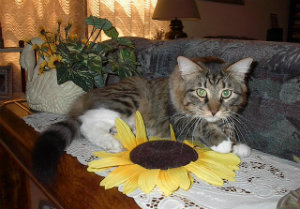 later, we went inside and announced our presence to the young woman at the reception area. “Please have a seat and someone will be with you shortly,” she said, smiling.
later, we went inside and announced our presence to the young woman at the reception area. “Please have a seat and someone will be with you shortly,” she said, smiling.
Another couple with a very large dog sat directly across from us. They both smiled as their canine strained against his leash in an attempt to get closer to Sparky in the carrier. Sparky stared back at the dog with barely any interest.
A few minutes later we were ushered into a small room where Sparky was taken from the carrier and brought somewhere to be weighed. Upon his return, not more than two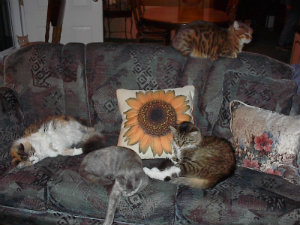 minutes passed before the veterinarian, a pleasant, middle-aged woman, entered the room and began examining Sparky.
minutes passed before the veterinarian, a pleasant, middle-aged woman, entered the room and began examining Sparky.
There was running commentary by the animal doctor as she ran her hands up and down Sparky, touching him with obvious experience and knowledge. She asked questions and we answered. Continuing her examination of Sparky, she concentrated on the cat’s midsection.
“I’m detecting a mass at one end of Sparky’s stomach,” she said finally. “I don’t think he’s experiencing any pain, but he’s not going to get any better.” She paused, and then added, “I’m talking about cancer.”
Jo and I sat there, both of us stunned by the vet’s words.
“There’s no way to tell how long he might go on, but his condition is just going to worsen. The decision of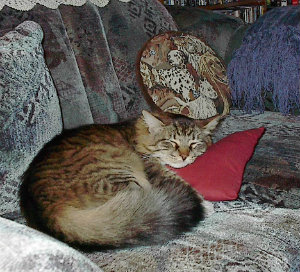 course is up to you, but I would advise euthanizing.”
course is up to you, but I would advise euthanizing.”
Jo gasped, and I could feel my eyes welling up. It was as if someone had shoved a sharp knife directly into my heart. Jo stood up and walked over to the examining table. Reaching out to caress Sparky, she looked back at me then at the doctor. “All right,” she said. I think I nodded my assent, unable to speak.
“Okay. I’m going to give Sparky an injection of something that will make him feel a little better. He’ll seem somewhat disoriented at first, but he won’t be uncomfortable. He just won’t care. I’ll be back shortly.”
The injection was over before Sparky realized what the vet had done. The doctor left the room then and Sparky jumped lightly down to the floor and began wandering around, stopping once to quietly throw up in a corner.
When the vet returned, I found  it impossible to move from where I sat. Jo was still standing by the examining table. The doctor’s assistant gathered Sparky up in her arms and brought him back to the table. What transpired next now seems like a bad dream. I remember the vet giving Sparky another injection and the frozen expression on his face just before his body slackened and his head dropped to the table.
it impossible to move from where I sat. Jo was still standing by the examining table. The doctor’s assistant gathered Sparky up in her arms and brought him back to the table. What transpired next now seems like a bad dream. I remember the vet giving Sparky another injection and the frozen expression on his face just before his body slackened and his head dropped to the table.
What followed is a blur. I vaguely recall someone wrapping Sparky’s body in a blanket and putting him back into the carrier. I remember someone paying the bill, and bringing the body-laden carrier out to the car. It may have been me; I’m not sure.
We buried Sparky up on the hill in back of the house (see last photo) where the old garden had been. It is right next to the grave of Lucy, the friendly stray cat who had been struck and killed by a reckless driver on the street in front of our home.
Sparky was with us for 13 wonderful years. Hopefully he’s happier now with both his old and new companions at the Rainbow Bridge. There isn’t a day that goes by that I don’t think of him.
We’ll miss him forever. #
Sparky (2/12/15)
Judging from events that have transpired during the past three months, which includes this month, it may be that for us the planets have arranged themselves in some sort of bizarre, funky alignment. Not that this writer subscribes to an astrological way of life, but at this juncture, there doesn’t seem to be any other plausible explanation.
First it was my bout with the flu just before Christmas, immediately followed by wife Josephine’s similar flu fight, and then her ensuing, more serious battle with COPD, which is still ongoing.
And now, just a few days ago, our oldest cat Sparky, a tabby-Maine Coon mix, stopped eating. During the past couple of years, he had lost a pound or two and slept most of the time, but he always showed up for breakfast and dinner. And he still persisted in hanging around in the kitchen at lunchtime hoping to score a few table scraps.
As a senior cat approaching age 13 in a few weeks – and you can figure that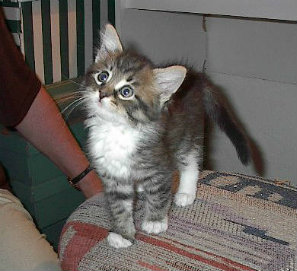 in human terms as being in his late 60s – Sparky rarely raced through the house anymore, nor did he respond to overtures from the younger cats to play. But he still seemed healthy enough.
in human terms as being in his late 60s – Sparky rarely raced through the house anymore, nor did he respond to overtures from the younger cats to play. But he still seemed healthy enough.
And then Sparky stopped eating.
Last Friday morning I had to extract him from under the hidden seclusion of a cloth-covered table in the living room and carry him into the kitchen. I pointed to the row of small cat dishes displaying his favorite cat tuna and reminded him that it was breakfast time. He showed no interest and immediately walked away.
Usually Sparky was the first to show up for meals, but not this time. We spent most of the day trying to get Sparky to eat. Jo even opened up a can of real tuna, a treat the other cats would almost kill for, but Sparky wanted no part of it.
We hesitated calling the vet. Sometimes these things have a way of working themselves out on their own. And costly veterinary bills are not part of our usual day-to-day budget. Still, Sparky not eating was serious and if we didn’t do something soon, the little guy could die.
I knew the vet was open on Saturdays until noon and decided to wait till morning, hoping Sparky’s appetite would return.
It didn’t.
Jo retrieved the cat carrier from one of her large walk-in closets. We had been forced to purchase it from the airline when we flew to Las Vegas in 1996. At that time we had only one cat, Bratly, a 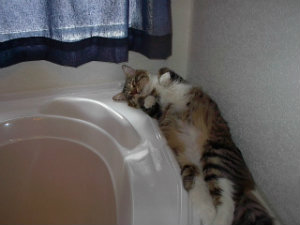 small calico whose diminutive stature was swallowed up by the large carrier.
small calico whose diminutive stature was swallowed up by the large carrier.
When Sparky saw Jo place the carrier down on the floor near the front door, he padded quickly away in the opposite direction. He knew what the carrier was and what it represented.
Meantime, at about 10:40 am I called the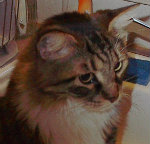 vet hospital and advised them of our problem with Sparky. The woman I spoke to asked me if I could get there in the next 20 minutes, that they had an appointment open at 11 am. I said I’d be there.
vet hospital and advised them of our problem with Sparky. The woman I spoke to asked me if I could get there in the next 20 minutes, that they had an appointment open at 11 am. I said I’d be there.
Getting Sparky into the carrier was another problem all by itself. He wanted no part of it and said so. Normally, Sparky has almost no voice. What usually comes out of him is a soft, throaty sound barely more than a whisper. This time, however, Sparky made his dislike for the carrier and its likely destination loud and clear.
We got him to the front of the carrier and together worked at cramming him into the so-called “skykennel.” Sparky was beside himself. He wailed long and loud, letting us know in no uncertain terms that this was not for him.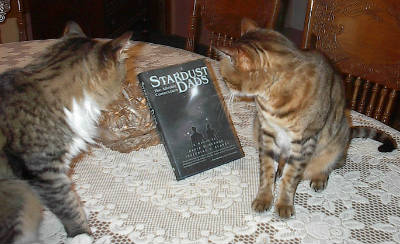
I picked up the traveling cage and went outside, maneuvering it awkwardly down the steps from the deck. Sparky yelled even louder as he moved back and forth inside the cage. I stepped carefully along the gravel walk to the driveway and my car, trying to keep the carrier level. When I placed it on the seat next to the driver’s seat, Sparky had a fit. He wailed louder and louder as I started the car and pulled out onto the road.
When I pulled up to the front of the veterinary hospital about 10 minutes later, Sparky’s bellowing was at full throttle. I moved through the double doors into the large, high-ceilinged reception room.
“I assume this is Sparky,” the dark-haired woman at the front desk said, grimacing at Sparky’s shrieking as she motioned for me to follow her. She opened a door and I put the carrier down on the floor of a small room. Sparky brought it down a notch but continued to wail.
“Someone will be with you shortly,” the woman said. “You can let Sparky out to walk around if you like.” It was now 11 am exactly.
The room contained a few upper and lower cabinets; a sink; a small, granite-topped examining table; and another door opposite the one we had just come through. I opened the carrier’s metal grid door and let Sparky out. He continued to cry loudly as he walked around the room smelling and examining everything. He went over to the inner door and stopped, listening to the noises and muffled voices behind it.
Eventually Sparky jumped up on the counter near the sink, then onto a high-backed stool, finally stopping on the examining table, which he smelled carefully for at least five minutes.
Forty minutes later, a short, bespectacled woman came in through the inner door. She gave Sparky a brief once-over, asked me a few questions, assured me the 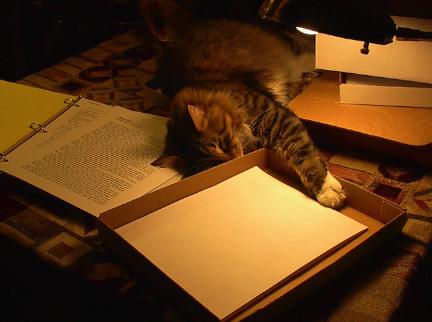 doctor would be there soon, and then disappeared back through the inner door.
doctor would be there soon, and then disappeared back through the inner door.
Meanwhile, Sparky continued to pace around the room, stopping at the inner door to listen intently to the noises and voices beyond. I had brought Sparky here three years ago at which time they conducted an ultrasound on him. Was it possible that Sparky remembered? Nah.
Eventually the doctor showed up and examined Sparky thoroughly. He tried with his stethoscope to listen to Sparky’s insides, but Sparky was far from cooperative, uncharacteristically squirming around almost violently.
The tall, slim veterinarian with close-cropped hair explained what he saw going on with Sparky and outlined what he thought would be the best approach. He offered to hospitalize him, which I promptly turned down. He then said they would administer three injections, a corticosteroid, an antibiotic and an appetite inducer. He also gave me a prescription for Sparky to keep the inflammation down.
The doctor left and the woman gathered up Sparky and followed right behind. A short while later she returned with a ruffled Sparky who uttered a few short, dissatisfied meows and hurried unattended into the carrier. He obviously wanted no part of the doctor or this place. He was quiet on the trip home, barely making a sound.
Surprisingly, when I put the carrier down on the floor once we had gotten inside the house and released Sparky, there was none of the usual hissing because of smells of other animals he might have picked up during his visit to the vet.
An hour later, Sparky sipped some water, peed in one of the litter boxes, and polished a full plate of cat food. His appetite has been excellent ever since.
Let's hope the funky planet alignment has gone for good. #
Big Shot (2/3/15)
My wife and writing partner Josephine is much better than she was, though certainly not 100 percent. She still suffers daily from a stuffy nose, and the ubiquitous, no-doubt-stress-induced canker sores in her mouth make eating or drinking anything a painful experience. But she has improved to the point where the pulmonologist has taken her off daytime oxygen.
Nighttime oxygen, however, is still part of her routine. Jo was diagnosed as having COPD (chronic obstructive pulmonary disease). Consequently, she’s required to use an inhalant once a day to control and prevent symptoms such as wheezing and shortness of breath caused by ongoing lung disease, which includes bronchitis and emphysema. It works by relaxing the muscles around the airways so that they open up and allow her to breathe more easily.
This daily inhalant is not intended to relieve sudden breathing problems, which is why Jo also now keeps a quick-relief inhaler nearby.
Right after I brought Jo home from the hospital, we had the very old carpeting in the bedroom ripped out and replaced with a healthier laminate. This was one of the major reasons for both of us sleeping at night in the living room for most of January. Shortly after the laminate was installed, we moved back into the bedroom.
Not that life is now worry-free. Jo insists a lamp be left on in a nearby room so that if she wakes up during the night she can quickly determine if one of our five cats has decided to attack the “green snake,” the long, green plastic tubing that connects the oxygen machine with Jo’s nose. I of course would prefer a 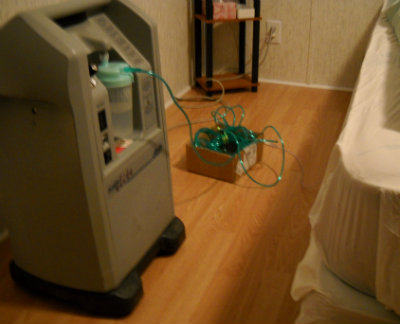 darkened bedroom when I sleep, but hopefully this is only temporary and everything will return to normal if and when Jo is finally taken off the supplemental oxygen.
darkened bedroom when I sleep, but hopefully this is only temporary and everything will return to normal if and when Jo is finally taken off the supplemental oxygen.
As mentioned earlier, when Jo was still in the hospital, she was given antibiotics. Which gave us a lot of food for thought since influenza is a viral infection, and antibiotics would be useless against the flu.
Meantime, our friend Chris called recently to find out how Jo was doing and the conversation eventually got around to the hospital antibiotics mystery. This in turn led to us discussing the current controversy over measles vaccinations. How the sudden, unexpected outbreak in Western states is being blamed on so-called “anti-vaxxers” who declined to have their children vaccinated against the highly contagious disease because of a possible autism connection.
I did a little research and discovered that the autism theory has been discredited. But even if that were not the case, not having one’s child vaccinated against measles and other childhood diseases can affect more than just one’s son or daughter. Measles in particular is highly contagious and children not properly vaccinated may well infect many others, both young and old alike.
I can well understand some people being reluctant to get vaccinated. For years I made sure that I was inoculated against influenza. Then one day I read something online that suggested there was a connection between flu vaccines and Alzheimer’s disease. I researched this startling bit of news and found that it wasn’t just some lone crackpot spouting nonsense. It became readily apparent that there were many well-respected doctors and highly regarded scientists who subscribed to this theory.
After much thought and careful consideration, I decided to forego my usual flu shot. I got away with it in 2013, but, well, if you read this reporter’s previous blog, you’d know how bad things got for both my wife and me in 2014. We suffered the worst cases of flu each of us ever had.
As a result, I’m going to have to reconsider whether or not to get a flu shot next year. While Jo was in the hospital dealing with her own flu demons, she was informed that a number of patients were admitted with the flu, all of them recipients of the flu vaccine.
So what to do? There are still a good many educated and professional people insisting on a connection between flu vaccines and Alzheimer’s. There are still others who claim they come down with the flu after being inoculated.
As far as measles is concerned, I had them when I was young, so I’m immune. Influenza is another story. Right now I’m leaning toward inoculation. As for my wife Jo, she’s not talking.
Somehow, though, I think we’ll both decide we’d rather be safe than sorry. #
Winter of Our Discontent (1/16/15)
In mid-December – the 16th to be exact – I started feeling ill. I’d already had a dry cough develop during the day, and by evening I was feeling the chills. I knew I had a slight fever, not something to worry too much about when one is young. But for a 75-year-old, it’s always cause for concern.
I didn’t feel any better the next day, Wednesday, December 17th. After throwing down a couple of aspirin, wife Josephine forced me to swallow a few mouthfuls of chicken noodle soup. Still running a fever, I slept on and off for most of the day.
On Thursday, December 18th, I was still no better. That’s when Jo called the doctor’s office. They recommended Robitussin for the cough, aspirin for the fever – and to call 911 if I experienced shortness of breath.
I took more aspirin and crawled into bed, prepared to sweat it out until the fever broke. And I succeeded, feeling somewhat better Friday morning. My improved spirits were short-lived, however, when Jo’s health began to decline.
“I can’t breathe,” Jo repeated over and over, through the day and into the night. Now running a fever, she rejected the bedroom, propped herself up between two pillows at the kitchen table and cat-napped through the night, trying desperately to regain a normal breathing pattern.
On Saturday evening, December 20th, becoming increasingly aware that both of us were battling the flu, I called Bill, Jo’s son, and asked him to come over and take us to the local hospital’s ER in the hope that something could be done to ease Jo’s breathing problems.
Bill and wife Lena came right over and took us immediately to the local hospital’s emergency room. Following Jo’s admittance, tests were run, X-rays taken, oxygen 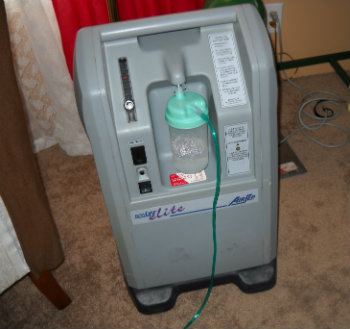 administered, followed by more tests. Long story short, I was informed that Jo would be kept overnight for further tests and observation.
administered, followed by more tests. Long story short, I was informed that Jo would be kept overnight for further tests and observation.
Without my own car there, and Bill and Lena waiting patiently, I had no choice but to have Bill drop me off at home. Once there, I fed the cats, swallowed more aspirin, and went to bed, feeling as if I’d been run over by a truck. The next day, a Sunday, I woke up feeling worse than when I had gone to bed. My nightshirt was soaking wet.
Jo called to tell me she was still having trouble breathing.
“There’s an IV making my arm throb. They’re doing tests and poking me with all kinds of needles, and they still have me on oxygen,” she said. “There’s a phone in the room but I’d rather use my cell.”
She paused then and I thought I heard her utter a quiet sob. “Biggest surprise,” she suddenly blurted, “was when someone came in and shoved a needle into my stomach. They warned me it would burn and hurt like hell, and they weren’t wrong. Apparently it’s to prevent blood clots. They told me it will be a once-a-day thing.”
I voiced my empathy for her pain and what she was going through. She responded by asking if I was okay.
I mumbled something about surviving, trying to sound convincing despite the nagging dread that I might not see morning. We agreed that I would stay home and try to get some sleep. “I’ll call you later,” she said.
I somehow made it through to Monday morning. I called Jo, who immediately rattled off a list of things she said she needed, things like a hand mirror, a special cloth to clean her eyeglasses, her laptop, her weaker prescription sunglasses that dim the brightness of her computer screen and allow her to see better, her toothbrush and toothpaste, and believe it or not, a glob of hair gel to help add body to her drooping hair. We decided I would try and get more sleep and shoot for going to the hospital on Tuesday. Before doing so, I gathered up most of the items Jo requested. In a burst of inspiration, I used a small, zip-top baggie from the kitchen to hold the hair gel.
On Tuesday morning, I gobbled down more aspirin and pulled myself together for my trek to the hospital. For the third consecutive night, I had experienced night sweats, waking up with a soaking wet nightshirt. Despite not wanting to open my pores, I nevertheless forced myself into a hot shower.
When I spoke with Josephine, she cried softly for awhile before telling me she still had trouble breathing. At 9:30 am, she said, they told her they had tried unsuccessfully to lower her oxygen from four liters to two liters. And they had taken another chest X-ray.
I brought Jo her requested items along with the laptop and sat with her in the room while she recounted her most recent experiences. I complied with hospital rules by donning disposable rubber gloves and mask before entering the room. Jo said they had now confined her strictly to the bed.
On Wednesday, things turned worse for both of us. The flu still held me in its grip, and I ran a low-grade fever throughout the day. Jo was being given all sorts of medications, including antibiotics, and wound up with a bad case of thrush, making it difficult for Jo to eat her food, or even swallow. Doctors also ordered a PET scan for Jo.
With daily blood tests still showing low sodium, they took her water away. As if this wasn’t bad enough, they also stopped giving her morning coffee, which left her with nothing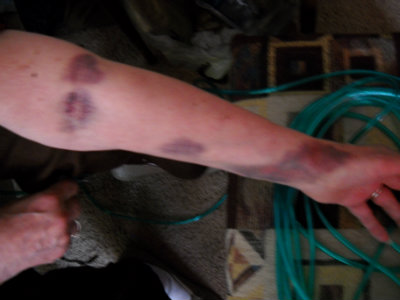 but lemon/lime Gatorade to sip on. Making matters worse, the constant drawing of blood left her one arm littered with bruises.
but lemon/lime Gatorade to sip on. Making matters worse, the constant drawing of blood left her one arm littered with bruises.
Adding insult to injury, when Jo was out for the PET scan, an overachieving nurse’s assistant turned off the oxygen that was bubbling in the temporarily vacant room. When Jo returned, she replaced the oxygen tube into her nose, not realizing the oxygen was off. After a full hour had passed, Jo called in a nurse to tell her she was feeing worse than before. The nurse immediately commented that Jo’s lips were blue. A quick check revealed the oxygen lever in the off position.
Sometime later in the day Jo’s oxygen was increased to nine liters and a heart monitor was attached.
When I spoke to Jo later that day, she said there were a few more items she needed. She knew I was in pretty bad shape and said Brian, her youngest son, would stop by the house, pick them up and bring them to the hospital, which he did.
Brian showed up at the hospital Wednesday evening with girlfriend Michelle. The bright spot in an otherwise gloomy night was Michelle showing Jo the sparkling ring Brian had given her when he proposed to her earlier.
On Thursday Jo was given a strong prescription medication for the thrush, which began working immediately. Later in the day the heart monitor was removed and the oxygen taken down to seven liters.
On Friday, December 26th, Jo’s oxygen was taken down twice from seven liters to five liters to see if she could maintain her oxygen level in the 90s. Eventually this was achieved.
Saturday morning, Jo called to tell me she was now at four liters of oxygen and they’d be releasing her probably around 1 pm. I got there sometime after noon, but we didn’t get out until after 4 pm. In order to qualify for home oxygen, Jo had to breathe room air for at least 15 minutes and have an oxygen level no higher than 86. She qualified handily.
Jo is currently home and still on four liters of oxygen. The flu stayed with me for a while, with my cough becoming much worse before it finally dissipated. For us, Christmas had been canceled. Cards were never sent out. Gifts were never exchanged. And the Second Thoughts blog was placed on an indefinite hold.
The highlight of our post-holiday, post-hospital experience was one cold morning when a water line near our well pump froze up and we had no water. To make it interesting, our land-line phone went out too. Bill came back over and brought a portable heating unit with which he was able to eventually thaw out the frozen pipe and get the water flowing again. We used one of our cell phones to notify the phone company, which then took four hours to restore a dial tone.
It’s still winter and who knows what will happen next. All we know is that for us the flu is history, Jo is home from the hospital, and she’s getting better every day.
More bad stuff ahead? Bring it on! #
Humbugs Past (12/16/14)
I have mostly wonderful memories of Christmases past, both as a child and as an adult. However, there were a couple of holidays in my childhood and at least one in my early adulthood that I’d just as soon forget. They all had one thing in common: my late stepfather.
Actually, to be fully accurate, there was an additional item that figured prominently as well: alcohol. During at least two Christmas Eves, when my sister and I were in our early teens, Arthur and our mom would begin the festivities with a few beers. This might have been okay if it had stopped with that. But as fate would have it, the hard stuff would eventually rear its destructive head.
That Christmas Eve when bad things first happened, a bottle of Hennessey’s finest cognac suddenly and magically make its appearance. The two were off and running. All my sister Barbara and I could do was watch and wait. Both of us somehow knew the worst was yet to come.
Arthur became nastier and nastier as he drank. Then, when no one was looking, he deliberately pushed the live, fully decorated tree over, claiming his dead first wife Ferdie did it. Shortly after that little display of drama, and the tree was back in place, he began bickering with Mom. The bickering quickly became heated. As usual, he laid the blame on Barbara and me, saying we were always trying to sabotage his marriage to our mother.
that little display of drama, and the tree was back in place, he began bickering with Mom. The bickering quickly became heated. As usual, he laid the blame on Barbara and me, saying we were always trying to sabotage his marriage to our mother.
One thing led to another as Arthur became more belligerent and abusive, culminating in his physically hitting me for something he claimed I said. And that’s when the proverbial butcher knife made its appearance. More than once over those years in the early to mid-1950s, Mom would feel the need to withdraw the large knife from a kitchen drawer and defend her children against a drunken Arthur.
“Get out!” she screamed as Arthur moved toward her menacingly. I don’t recall if she ever actually used the knife and cut Arthur, but that night he seemed to fear she would actually use the knife on him and he left.
Arthur obviously then visited one of the many bars in the neighborhood before returning to the third-floor walk-up apartment. Drunker than ever, he began banging on the thick metal door, finally heaving his large, heavy frame against it multiple times in an attempt to break it down. I remember how terrified all of us were, not at all sure the door was strong enough to keep this monster out.
We had no phone for my mother to call the police. The one time we did get a phone installed, my mother, who never had much self-control, would begin calling her sister in California, the only surviving family member she had, and run up the bill to a point at which they couldn’t afford to pay.
Eventually Arthur left and Mom sent us to bed. But hours later Arthur returned, again banging away at the front door. I recall how terrified I was to be suddenly awakened from an already troubling sleep. Barbara and I cowered in fear as Mom spoke to Arthur through the door, staying amazingly calm as she finally convinced him that she wasn’t going to let him in as long as he was drinking.
Most of those years are hazy memories now, but I know this series of disturbing events did indeed occur at least one other time while we were still young.
Time-trip ahead to the early to mid-1960s. I was married now and our son and daughter had finally reached the age where they were quite aware of Christmas and Santa Claus, and presents. And then it was Christmas Eve and Arthur and my mother arrived bearing gifts…and booze. Yes, Arthur and my mother were together. Not still, but again. Mom had divorced him twice, but like a bad penny, he kept coming back.
That year, they gave our son and daughter their gifts, and then that magic bottle of Hennessey reappeared. Again, as if in some strange “Groundhog Day” incarnation, Arthur became abusive and came at me. Lo and behold, that ubiquitous butcher knife showed up in my mother’s hand. This time we had a phone and the police were called. Before they got there though, blows were exchanged between Arthur and me.
The next day, I made up my mind. I was not going to let history repeat itself in my home and subject myself and my wife and children to the same terrors my sister and I had experienced as children. I laid down the law. There would be no visitation by either spouse's family on Christmas Eve. A visit on Christmas Day was okay after 1 pm, but no alcohol, period. And that’s the way things stayed until the children became of age.
There were many joyful Christmases after that, and those unhappy memories have for the most part thankfully faded.
Unfortunately, they will never be forgotten. #
Foggy Mountain Modem Breakdown (12/10/14)
I didn’t do the weekly food shopping I usually do on Saturday because it was raining in the morning and the forecast said it would continue to do this on and off for the rest of the day. Despite my never knowing what I’m going to write about, you might think this would have been a perfect opportunity for me to get a jump on the writing of Tuesday’s weekly Second Thoughts blog. My wife Josephine certainly thought so. But you and Jo would be wrong.
Life doesn’t work that way. Just when you think things are going smoothly, life throws you a curve. And I’ve never been able to hit the curve. That curve arrived in the form of a modem, the thingamajig that connects you to the Internet. Allow me to go back to Friday morning.
Looking through my inventory of baseball cards in order to replace a set of cards I had sold earlier on eBay, I discovered much to my horror that I’d made an inexcusable mistake. The set of three cards I had sold was supposed to feature a 2007 rookie card of the player listed. Unfortunately, I hadn’t noticed the word “reprint” in tiny type in the bottom left corner of the card’s back. I had probably missed it because the Topps company reproduced the exact replica of the original card’s back as well as the front. Usually when they reprint a card, the back is different and is very obviously a reprint.
In any event, I sent a message to the auction’s winner, who hadn’t paid yet, explaining how I had screwed up. I offered to compensate for the error by including two additional cards, both of them special “refractors.” He was quite understanding and agreeable to my offer, but said he was thinking of bidding on some of my other auctions and suggested he hold off on payment until I could ship all cards together.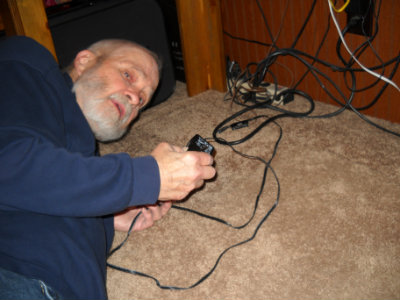 That way, he could save a little on shipping costs. There was a lot of back-and-forth messaging – and then we lost the Internet.
That way, he could save a little on shipping costs. There was a lot of back-and-forth messaging – and then we lost the Internet.
I called AT&T, our ISP (Internet Service Provider), and related our plight to a friendly, well-spoken woman named Latoya. She asked me if the computer was plugged directly into the wall and was there a filter.
My head nearly exploded. Filter? What filter?
I hollered to Josephine, who started checking wires and sockets and such. After a lot of checking this and clicking that, Latoya determined that our four-and-a-half-year-old modem was dead in the water. Kaput. NG. Shot.
There would be a charge of $100, Latoya had advised, which we could pay over a 10-month period.
“A hundred dollars?” I heard someone say. “Your equipment breaks down and we have to pay for it?” I realized the voice was mine.
Latoya explained the modem had only a one-year warranty, and we didn’t have a maintenance agreement.
“But it’s Friday afternoon,” I said. “We can’t be without the web. I’ve got auctions about to go off.” The frustration and near panic in my voice must have been obvious.
“I hear you, Mister George,” Latoya said. “We’ll get a new modem out to you right away.”
“How soon can you get it to us?”
“You should have it no later than Tuesday.”
“That means an entire weekend and more without the Internet. And we don’t own smartphones. Any chance we could get it by Monday?” I could hear the desperation in my own voice.
“I’ll add expedite to the order,” Latoya said, 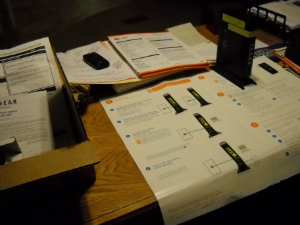 trying to sound reassuring. “Before I can place the order, Mister George, I have to ask you one question to validate you are David George.”
trying to sound reassuring. “Before I can place the order, Mister George, I have to ask you one question to validate you are David George.”
‘Isn’t that a little silly at this stage?” I said.
“I know,” Latoya agreed, “but I have to ask you this. Who was your boyhood hero?”
“What? Boyhood hero? I had a lot of boyhood heroes. Ask me something else.”
“I’m sorry, Mister George. That’s the only security question I have.”
“Okay. How about Roy Rogers?”
“Correct!” Latoya seemed elated.
“I’ll bet you’re too young to even know who he was.”
Latoya laughed. “I do know,” she said confidently. “Hi yo, Silver!”
“Uh…no. That was the Lone Ranger, and Silver was a white stallion. Roy Rogers’ horse was a palomino named Trigger....”
I don’t know why exactly, but I decided to leave the computer on, eyeing the lights on the modem from time to time. I would look at the green power light and try to will the other lights to go on.
Suddenly, sometime late Friday afternoon, the lights started flashing on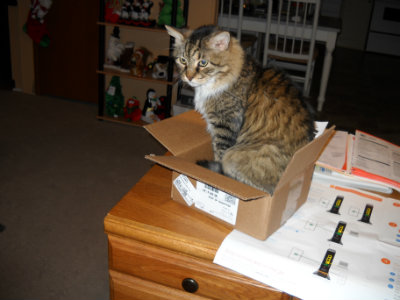 the modem and we had…liftoff! The modem was working again. It had gone on as mysteriously as it had gone off.
the modem and we had…liftoff! The modem was working again. It had gone on as mysteriously as it had gone off.
I didn’t question it, going right to eBay and resuming my conversation with the auction winner. I did some more work with my auction listings on eBay, then went to Twitter and completed my usual “Follow Friday” routine. After that, I went through my nightly set of tweets directing potential readers to our novel’s website.
In the morning, the modem lights were still green. I began checking my usual sites, beginning of course with eBay and my auction listings. Next was the analytics page for our website, which tells us how many visitors we receive each day, breaking it down even further to unique visitors. There are other bits of data, some of which I have no need to know, nor in some cases even understand.
All in all, as usual, we seemed to be ahead of the previous month.
That’s when Jo came into the room and handed me a sheet from her small notepad, saying she thought I might be able to use it sometime in one of my blog entries. She referred to the scribbling and quoted almost verbatim, “Did you know that just sixteen ounces of honey requires 1,152 bees to travel 112,000 miles and pollinate 4.5 million flowers?”
Before I could respond to this nugget of trivia, we lost the Internet again. I glanced at the modem and saw all but the power light had gone out. The modem’s been out ever since.
I decided I’d have to bring my laptop over to the library and use their web connections tomorrow (Monday) to check on my eBay auctions, and then do the food shopping.
Meantime, I still don’t know what the hell I’m gonna write about. #
Author Update: We received the replacement modem midday Tuesday. It was the third time the UPS driver left a package on the hood of one of our cars. Fortunately, Jo spotted it when she looked out the bedroom window. We called Latoya back after we looked at the directions for installing and realized one had to be a NASA engineer to understand it all. Never mind the maze of wires under the computer table. Latoya walked us through it and we were back in business Tuesday evening. All in all, we endured three days and seven hours of Internet withdrawal.
The Write Stuff (12/2/14)
I spent all day Sunday, the day I’m supposed to be writing this blog, doing everything but. I just couldn’t decide what to write about. After an early rising, I got dressed, tested my blood sugar, took my eye drops, made coffee, fed the cats, injected insulin, prepared and ate my breakfast, cleaned the litter boxes, checked eBay and relisted some of my auctions that had closed without a sale, all the while rifling through my brain’s memory banks searching for an idea for Tuesday’s blog.
I got to thinking as I continued through the day how it’s always been this way for me when it came to deadlines. Always the 11th hour. Always with barely hours to spare before actually sitting down and meeting the deadline for an article.
True, present-day deadlines are self-imposed. But they are still deadlines nonetheless.
In the old days (read that as the ’60s and ’70s), when an editor would assign me a story, I would usually have a couple of nights and at least one weekend to complete the assignment. I’d watch baseball or football all weekend until mid- to late Sunday night. That’s when I would buckle down and get out the ironing board, adjust it to the right height, set up my old manual Royal typewriter, and get to work.
Always with a cat nearby quietly observing my industrious labor, I would pound that typewriter into oblivion, knocking out 4,000 words as I worked far into the night.
During the day I would function quite efficiently as an editor: copyediting, proofreading, titling, writing blurbs and captions, presenting layout ideas to the art department, sorting through and selecting photos, fleshing out illustration ideas for freelance artists, and handing out assignments to freelance writers. The products were men’s adventure magazines that featured stories such as “I Discovered the Lost Spider Tribe of Bolivia,” or “Escape from Africa’s Flesh-Eating Wombats.”
My dad told me it was the same for him, working days as a public relations/promotions executive, and then churning out detective stories in the evening after work and on weekends. He said that when he would get an assignment from an editor, he’d wait until his “back was up against the wall” before he’d actually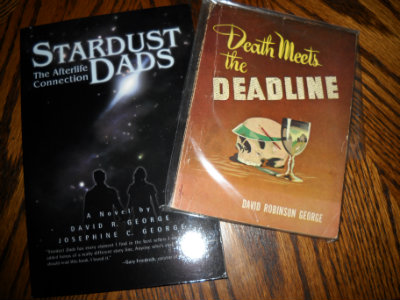 sit down and start the article for one of the multiple detective magazines he wrote for. Judging from his output – despite waiting until the last minute – Dad apparently managed to successfully meet his freelance writing deadlines more than 700 times. And somehow, amid the freelance stories and daily demands of an often stress-laden day job, he managed to punch out a page-turning novel, Death Meets the Deadline, circa 1944.
sit down and start the article for one of the multiple detective magazines he wrote for. Judging from his output – despite waiting until the last minute – Dad apparently managed to successfully meet his freelance writing deadlines more than 700 times. And somehow, amid the freelance stories and daily demands of an often stress-laden day job, he managed to punch out a page-turning novel, Death Meets the Deadline, circa 1944.
I’ve actually lost count for myself, but articles, stories and columns definitely number in the hundreds, most of them completed within merely hours of the imposed deadline. I don’t know why this is. Perhaps I’m still not sure of myself. Or maybe it’s in the genes. And, as Dad had done, in the evening after work and on weekends, but with much help from wife and co-author Josephine, our novel, Stardust Dads, was somehow written and published.
Today, one thing is certain: I’ve got to learn how to manage my time better. Jo says I keep saying that but never follow through. It’s now Monday evening as I write this. Except for having to clean up a splash of cat vomit that greeted me upon awakening, I began the day in much the same way I started out Sunday.
After getting breakfast out of the way, I checked eBay and found I had sold and been paid for three of four baseball card auctions. I went on to compose and send out invoices, after which I continued to go through the tedious but very necessary “busy work” on eBay, relisting auctions t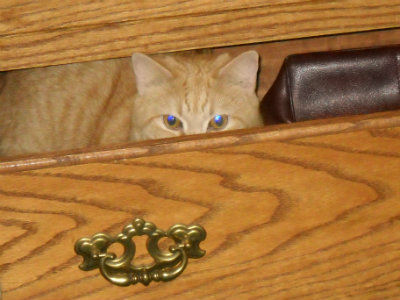 hat had not sold, adjusting prices and sometimes rewording a listing.
hat had not sold, adjusting prices and sometimes rewording a listing.
I continued with other work on the computer, checking various sites such as Facebook, Twitter, CNN News, and reading and responding to email. I always find it amazing how quickly time passes while I’m on the computer, and that’s not including games such as Word Grid, which Josephine and I enjoy playing.
Despite leaving the games for another day, and skipping my usual nap, the hours seemingly flew by. All of a sudden it was nearly 3 pm and lunchtime had long beckoned. I realized I had not yet packaged and prepared the cards I had sold for mailing. I had to leave for the post office no later than 4 pm. I also remembered I had not yet paid the ISP/phone bill, which was due in less than a week.
As I wrote out a check for AT&T, a number of facts presented themselves to me: There was no time for a shower; the cards had to be prepared for mailing; and lunch would have to wait until I returned from the post office.
I spent another precious ten minutes locating the sold cards and began packaging them. That’s when Murphy’s Law kicked in. The packing-tape dispenser seemed to be malfunctioning. Either the tape wrinkled up at the top, or it would actually tear off prematurely. At first I thought the roll of tape had run its course and a new roll was needed. A closer examination found that not to be the case. Another mystery never to be solved. Meantime, the minutes ticked by.
It was almost time to leave when I had finished packing and affixing the labels. There was barely enough time to comb my hair and put on a jacket. I grabbed a Rice Krispies Treat, stuffed it in my mouth, and dashed out the door.
It’s now 10 pm. Riley, the orange kitten now grown to the size of a small child, has awakened from one of his many long naps and is standing on my scanner. He stares at me with his eyes wide, obviously ready to play.
I still don't know what to write about. #
Retrospection (11/25/14)
Several readers have asked me why I don’t write more often about events that are happening today, particularly things political. One reader even took the time to email me and suggest I not write so often about cats.
Well, I’m sorry but I’m gonna keep writing about cats because I love cats. And so do a great many of our readers. I find cats interesting, adorable, noble – even mysterious at times.
As for politics, I’m very much into the subject, but I rarely write about it because I don’t feel I’m knowledgeable enough in that area. Oh, I certainly have opinions, but that’s all they are.
From time to time I have written about something that was currently front-page news. For example, a couple of years ago, December 18, 2012 to be exact, I wrote a blog in response to the senseless murder of children in Connecticut several days earlier. Murders committed by one deranged young man armed with a high-power, semiautomatic Bushmaster assault rifle and two semiautomatic handguns. There was 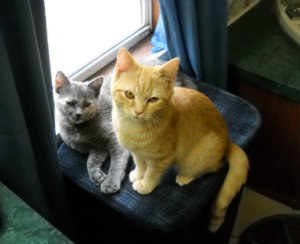 no way I could keep quiet about the school’s six adult women and 20 innocent young children, plus the shooter’s mother, whose lives were abruptly snuffed out.
no way I could keep quiet about the school’s six adult women and 20 innocent young children, plus the shooter’s mother, whose lives were abruptly snuffed out.
I did some research and recounted the many mass shootings that had occurred so far that year. I cited examples of other nations such as Australia who had similar problems of gun violence and how they took legislative steps to reduce their recurring incidents of mass carnage.
Of course, on a lighter note, I am guilty of penning many blogs about – and I’m quoting myself here – “free-wheeling, frolicking felines.” One of my personal favorite columns I wrote back on April 24, 2012. “Cross-Country Kitties” involved the transporting of our three cats in dog cages on a 2,100-mile journey from Nevada to North Carolina in the summer of 2010. My wife Jo and I had rented a new Ford Explorer to make the trip.
I recounted how then 4-year-old Cisco, our full-blooded Bengal cat who understands the concept of leverage, had pried open a piece of sheetrock covering a small hole in an Oklahoma motel room wall and escaped into the inner recesses of a dual-level passageway of exposed pipes, plumbing fixtures and spider webs that wound its way through the large complex of 200 rooms. Sparky, our then 8-year-old tabby/Maine Coon, had followed right behind him. It took most of the night before the two decided to return, displaying total indifference to our mental state of near collapse.
In “Cat Tales” (5/22/12), I wrote in general about the virtues and not-so-virtuous habits and traits of the more than 86 million cats held as pets in this country.
In “Pets R Us” (7/10/12), I recounted the many and varied pets I have had through the years, from puppies to ducks to tadpoles to fish to cats – many, many cats.
In “Cats Will Be Cats” (10/2/12), I extolled the positive sides of our then three cats, including their fastidious litter-box habits. I also wrote about their idiosyncratic movements as well.
In “Of Mice and Men, and Snakes” (11/27/12), I explained how our cats became “watch-cats,” alerting us to the invasion of field mice in our home. I wrote about how they gathered in front of the lower kitchen cabinets, indicating with turned-up noses and twitching whiskers, and accompanied by hearty meows, that we had several mice snared on sticky traps deep inside the cabinets.
In “Critter Jitters” (12/4/12), I wrote about a guest cat that visits us daily, expecting and receiving ample nourishment. I also wrote about other local critters, from creepy spiders, wily white squirrels, rascally raccoons, testy turtles, lurking lizards, and blue-tailed skinks.
In “Sparky and the White Christmas Tree” (12/11/12), I told the story of how Sparky evidently saw our new, full-size artificial tree as his private playground, his own personal mountain to climb and conquer. Slowly but surely, no matter how much we tried to discourage it, Sparky would run up the middle of the tree and “nest” in one of the branches – which might have been okay if he had been content to do only that. But Sparky had other plans.
That first year of Sparky’s arrival, he managed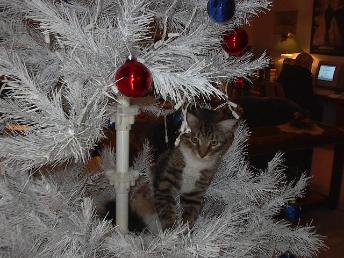 to dislodge branch after branch from the tree. He would run into and up the tree, nesting at different times on different branches, his weight eventually bending and snapping them off one by one.
to dislodge branch after branch from the tree. He would run into and up the tree, nesting at different times on different branches, his weight eventually bending and snapping them off one by one.
Pretty soon, before the holiday was over, Sparky had managed to reduce our tree to barely more than a sprig, leaving us with only the top of the tree, which we placed into a vase and set up on a table.
“Lucy” (1/29/13) is more of a tribute to a stray we had been feeding for weeks and her sudden, unexpected demise. We had grown quite attached to Lucy and were not prepared for the knock on the door by a young man who informed us of the apparent “hit-and-run” accident involving poor Lucy.
“Kitten Invasion” (4/16/13) documented our rescue of 4-month-old brother and sister kitties and their first days living with us. Two weeks later, in “Mills River Kittens Revisited” (4/30/13), I recounted multiple tales of the two out-of-control kittens and the surprising response by our Bengal cat Cisco. Following these feline-centered blog entries are at least another dozen or so columns featuring cats, including last week’s “CATaholic,” but there have been so many other blogs I have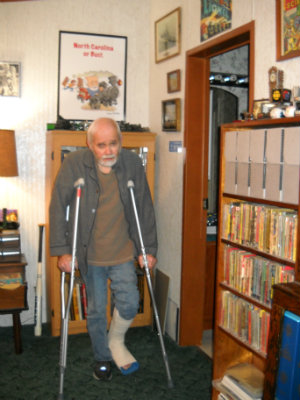 written dealing with a wide assortment of subjects that have nothing to do with cats. I’ve been told that they make for some interesting, often amusing reading.
written dealing with a wide assortment of subjects that have nothing to do with cats. I’ve been told that they make for some interesting, often amusing reading.
I decided to serialize in Second Thoughts a long article I wrote for Alter Ego magazine a few years ago, the rights to which I still retain. “The Good Ol’ Days of Men’s Adventure Magazines (2/12/13) ran for four consecutive weeks, the fourth and final part on 3/5/13. In it, I reflect on my days during the 1960s and ’70s when I worked as an editor/writer for the now-defunct men’s adventure magazines. At the time, we shared a large suite of Manhattan offices with Marvel Comics. For me, they really were the “good ol’ days,” but no one bothered to tell me at the time.
Other more serious blog entries include “The Boarding Home” (10/30/12) in which I detail some of my yearlong experiences as a 9-year-old relegated to a private home for children. In “A Break in the Routine” (1/15/13), I explain in detail how I slipped on some ice hidden beneath the snow in my driveway and broke my ankle in two places. The accident happened right after Christmas in 2010, a year in which there were four major snowstorms in western North Carolina.
On a lighter note, readers might want to scroll back to check out “Screwed Up, Locked Out, Done In” (8/7/12), all about the day Jo and I managed to lock ourselves out of our house.
With nearly two and a half years of weekly blogs written and locked into place, there is no dearth of reading material available here. In the near future, we will figure out a way to categorize these blog entries and make them easier to access.
Meantime, there’s much, much more to come. #
CATaholic (11/18/14)
That’s right – you read it correctly the first time. I’m addicted to cats. Big ones, small ones; males, females; tabbies, calicos, Bengals; gray, black-and-white, orange; kittens or fully grown adults – makes no difference – I love ’em all.
Now don’t get me wrong; I love all animals. Puppies, chipmunks, rabbits, squirrels, horses, even giraffes (or “giraffics” as my son used to refer to the long-necked animals when he was very young), but 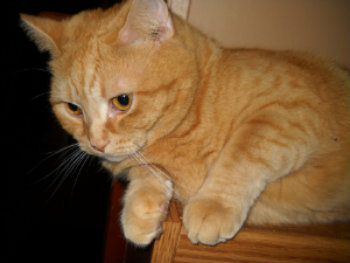 cats hold a special place in my heart.
cats hold a special place in my heart.
Last year, as many of you who’ve read this column before know, we rescued two kittens, an orange tabby named Riley, and a dilute torte called Holly. The two joined our family of three older cats and were officially adopted by us at the age of 4 months. Brother and sister, Riley and Holly are as unalike as two cats can be.
Riley, the orange cat, enjoyed a rapid growth spurt that left him considerably bigger than his sister Holly. Holly, a subtle blend of grays, blacks and tans, remained petite. Both still retain kitten-like facial features, and “play” remains their primary objective. Both are also the most loving of any cats I’ve ever known.
During the day, Riley sleeps much more often than his sister, but when he’s awake, he’s difficult to avoid. He is constantly in my face, wanting…no, demanding…to be part of whatever project I happened to be involved in at the moment. The other morning, I was sitting in my den attempting to pull on a pair of socks when, from seemingly out 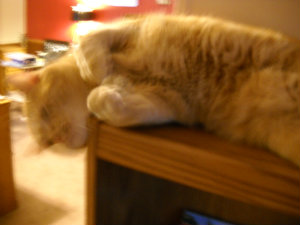 of nowhere, Riley magically appeared. He scrambled up into the wingback chair and pushed himself under my left arm, snuggling in as closely as he could. I had a hard time trying to finish pulling on my sock and still keep from strangling the poor feline.
of nowhere, Riley magically appeared. He scrambled up into the wingback chair and pushed himself under my left arm, snuggling in as closely as he could. I had a hard time trying to finish pulling on my sock and still keep from strangling the poor feline.
I guess I must have let out a little whoop because wife Jo had called from the kitchen inquiring as to what happened. As occurs with both of us, we seem to have trouble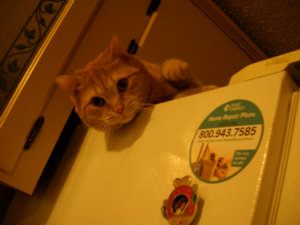 remembering Riley’s name and constantly refer to him as “the orange cat.” Which I did then, recounting Riley’s overzealous affection and registering mock outrage.
remembering Riley’s name and constantly refer to him as “the orange cat.” Which I did then, recounting Riley’s overzealous affection and registering mock outrage.
Another favorite ritual of Riley’s is to climb up onto a high ledge, such as the top of a bookcase, or the fireplace mantle, or even the fridge, drop down on his side and hang his head over the edge. He would then wriggle around and seemingly come dangerously close to losing his balance and falling.
Riley also expects to be attended to when I’m sitting at the computer keyboard, such as right now. It’s not 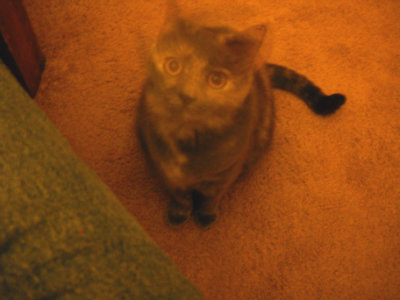 enough for him to sit quietly on the side and observe. No, Riley has to be standing in my lap while I try to type and balance him simultaneously. It’s a great way to write a column. Not.
enough for him to sit quietly on the side and observe. No, Riley has to be standing in my lap while I try to type and balance him simultaneously. It’s a great way to write a column. Not.
Holly, as implied earlier, is the exact opposite of the orange cat, although she does follow me around for much of the early morning. She sleeps next to me in bed at night, and rises with me when I stumble my way into the bathroom and then the kitchen. She usually jumps up onto the countertop while I’m brushing my teeth and does her best to set up a furry roadblock to prevent me from rinsing and expelling the mouthwash.
Unlike the orange cat, Holly is content to sit quietly on a kitchen counter and watch while I go through the motions of making coffee and preparing the cats’ food dishes. By this time, Sparky, our 12-year-old tabby/Maine Coon and Cali, our 11-year-old semi-longhair calico (yeah, I know, but she’d already been named when we rescued her) had joined us in the kitchen.
I placed two of the dishes of cat food on the floor mat and Sparky and Cali responded immediately, lapping up the food hungrily. I placed a dish of turkey cat food on the counter in front of Holly, who 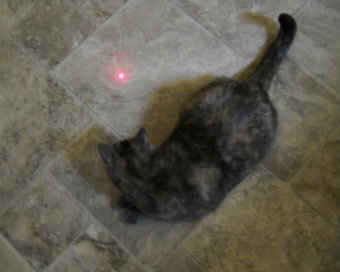 nibbled at it briefly. There are several bowls of high-nutrition dry cat food that are always available for anyone who wants it. Riley and Holly started out in life with the dry variety of cat food and therefore it remains the heart of their diet.
nibbled at it briefly. There are several bowls of high-nutrition dry cat food that are always available for anyone who wants it. Riley and Holly started out in life with the dry variety of cat food and therefore it remains the heart of their diet.
Cisco, our nearly 9-year-old Bengal, also spent the first four years of his life subsisting on a regiment of dry cat food, namely Iams. Like the kittens, he will occasionally eat wet food, but his diet consists mostly of Iams.
Cisco is usually the last to rise and shine, mostly because he is the last to retire at night and spends much of the early wee hours roaming the house. He lets us know this by wailing loudly not long after we get under the covers and drift off to sleep.
Getting back to Holly, she stayed perched on the kitchen counter as I poured my initial mug of coffee. Following my first sip of the hazelnut-flavored brew, Holly dropped lightly to the floor and looked up at me with rapt attention. This is when I slipped my left hand into my jeans pocket and took out the small laser pointer. I pointed it down near my sneaker and Holly immediately pounced on the little red dot. I moved it slowly away and into the middle of the kitchen floor. Holly followed it tightly with her eyes, and then shot forward, again pouncing on the little red dot. I moved it back and forth, letting the red light dance provocatively around the kitchen linoleum.
Holly never missed a beat as she darted back and forth around the kitchen, constantly catching up with it only to watch it dart away elusively. When I turned it off and replaced it into my pocket, Holly, as she always did, looked up at me as if to say, “Where did the spot go?”
Holly and the orange cat, as well as Cisco, Sparky and Cali, continue to enrich our lives. I truly believe they keep us young. Yes, they can be “in the way” sometimes, and cleaning the litter boxes is tough on our backs, but it’s a small price to pay for so much unconditional love and joy.
I can’t imagine life without them. #
Addiction Eviction (11/11/14)
The year was 1985, but I’m not sure exactly which month. We were in our 13th year residing in what had been a sleepy little village called Mohegan Lake in the upper reaches of New York’s Westchester County. At least seven or eight years had passed since I had first started dealing with my addiction to alcohol. Certainly I could claim full sobriety by then, but I still smoked two to three packs of cigarettes a day.
I was a chain smoker who most of the time had a lighted cigarette hanging out of my mouth. For me, I think, it was mostly an oral habit. Oh, at times I would take a drag and blow the smoke out through my nose, but I didn’t actually inhale very often.
I don’t remember exactly why I had decided to undergo a full physical exam. I didn’t have any noticeable ailments at the time, and actually felt pretty good. I guess I just decided that at age 46, it would be a good time to get myself checked out.
To say I was surprised at the outcome would be the understatement of the year.
First, a check of my blood glucose level, taken more than a couple of hours after eating, showed a reading of 240 mg/dL. The normal range is 80-120. Second, after I had blown into a machine for a few minutes, the doctor was able to determine that I had “diminished lung capacity” and the beginning of emphysema.
The doctor didn’t mince words. He said I had adult onset diabetes, now officially referred to as type 2 diabetes. He also referred me to an ophthalmologist to have my eyes checked. Meantime, he advised me to immediately lose ten pounds, follow special diet guidelines, and begin a daily exercise regimen.
When I asked him about my diminished lung capacity and what I should do about it, he looked directly into my eyes and said, “You figure it out.”
And I did.
I walked out of the doctor’s office that day and never even had a “last cigarette.” Truth be told, I was really scared.
I later saw the ophthalmologist and he found an early cataract in one eye, at the same time determining that same eye was glaucoma suspect. But that’s another story.
That same week I purchased a stationary exercise bike and worked up to an eventual 30 miles a day on it. I put so much mileage on it that the main bar actually broke in half. I soon lost the ten pounds the doctor wanted, and then some. But that, too, is another story.
The story at hand is one of smoking addiction and how I handled stopping it. As I had just stated, I never did have a last cigarette. But believe me when I say quitting a 34-year-old addiction wasn’t easy.
Now, I should get points for working hard at establishing that addiction. I was probably around 11 or 12 when I experienced my first cigarette. Back in the ’50s, tobacco products were very acceptable and readily attainable. Not 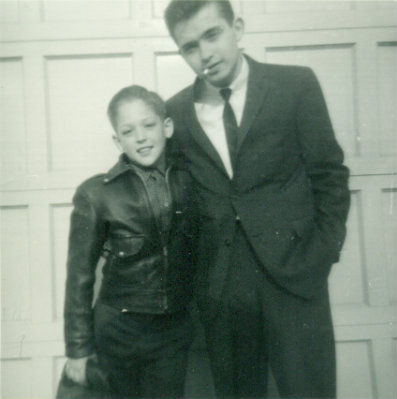 like today when cigarettes and tobacco products are kept under lock and key, with security akin to that of Fort Knox.
like today when cigarettes and tobacco products are kept under lock and key, with security akin to that of Fort Knox.
In the 1950s, smoking occurred all around me. Although my mother had never taken up the habit (and lived into her 90s), my father, and my stepfather, both smoked. And my Aunt Louise would certainly have been unrecognizable without a cigarette poking out of her mouth or jutting from her fingers.
I don’t mean to imply that a lad of 12 could just go up to the counter and order a pack of cigarettes. But there were at least a dozen ways in which a youngster could get his hands on a pack, not the least of which was stealing them – which is probably how I obtained my first pack.
I remember I was with another boy my age and we had snuck off into the woods to sample our first experience with “forbidden fruit.” I recall a lot of coughing and outright choking, but when we were done with the experiment, we had patted each other on the back and heartily agreed how great it was.
What the hell, it was one of our rites of passage and it showed we were growing up, right? I had felt the same way after I had experimented with my first bout with alcohol. I remember at age 16 standing in the middle of a street in Forest Hills, New York, holding a bottle of Thunderbird or some such cheap wine and drinking it all right down. I had immediately thrown up, violently and profusely.
I couldn’t wait to try it again.
Same with smoking. I would smoke a cigarette every chance I got after that first coughing, choking encounter. More importantly, with that white stick hanging from my lips, I certainly looked grown up. Or so I thought.
As I grew older, the habit became an addiction. And it really wasn’t an expensive habit. Retail, a pack was about 18 cents. After I joined the Navy at 17, I was assigned sea duty aboard a destroyer. I quickly learned that once outside the three-mile continental limit, we were allowed to purchase cartons of cigarettes duty-free from the ship’s store, which were a dollar a carton. And if you smoked the shorter Camel or Lucy Strike cigarettes, a carton would run you a staggering sum of 85 cents.
Come to think of it, most cigarettes were not encumbered with filters. I can only remember two, maybe three brands, Viceroy, the fancy, boxed Parliament, and Benson & Hedges, I think. I believe I started smoking the shorter “Luckies,” then graduated to Pall Malls because they were bigger and lasted longer.
By the time I had reached the ripe old age of 22, I couldn’t do anything unless I had a cigarette hanging out of my mouth.
My dad initially smoked “Sano” cigarettes, which were supposed to be “healthier” than the regular brands, then switched to small cigars before quitting altogether. But despite my father’s health-conscious efforts, he later succumbed to prostate cancer at the young age of 63.
My stepfather smoked Chesterfield regulars for many years, eventually switching to Raleigh cigarettes because they offered coupons redeemable for various products. I used to kid him that if he saved enough of them, he’d be able to get his own iron lung.
He never did get the iron lung, but he did develop throat cancer and wound up with a hole in his throat.
So when the doctor told me the bad news about my own health, I quit cold turkey.
At first, it was quite difficult. I almost went nuts trying to come up with a substitute. I decided chewing on toothpicks would be a good, clean oral replacement. It wasn’t. I wound up with a mouthful of wood splinters.
Following the toothpick fiasco, I took up chewing on pencils – and almost got lead poisoning.
Despite my aversion to gum chewing, I eventually turned to sugar-free gum as a substitute for the lethal cigarette habit. Needless to say, I chewed an awful lot of gum over the years before stopping even that.
Today I am completely free of any chains to alcohol or tobacco. My one vice is buying baseball cards. I can’t seem to stop.
Intervention, anyone? #
Author's Note: The 1961 photo shown here features yours truly at age 22 trying to be Joe Cool. Standing alongside me is Edward, one of my two younger brothers. Quite evident is the lighted cigarette that seems to be a permanent fixture of my face.
Cleaning in the Fast Lane (11/4/14)
Before I expound on the significance of this Election Day, lemme tell you about today, Sunday, and what’s gone down while I searched my brain for an idea to spur me into a writing frenzy.
Now, despite my wife’s insistence that I never dust, I do once in a while take a dust cloth and wipe away some of the obvious residue resulting from the dander of five indoor cats and four litter boxes, three of which lie in the laundry room where the furnace happens to be. Hey, if I see dust, I don’t hesitate to clean it up.
And yes, I do take hold of the vacuum cleaner and zip through the living room, office, hallway, and bedroom every so often. And when I physically recover from the uncomfortable act of exertion, I also vacuum my den. I leave Jo’s two rooms alone so she can attend to them herself.
Following an irregular schedule of dusting, vacuuming, sweeping, and general straightening up, the two of us manage to maintain a modest degree of clean in the approximately 2,000 square feet of living space in which we reside.
But today I was introduced to a whole new phase of cleaning I didn’t even know existed. While sitting at the computer engrossed in Word Grid, I was suddenly aware of clamoring behind me. 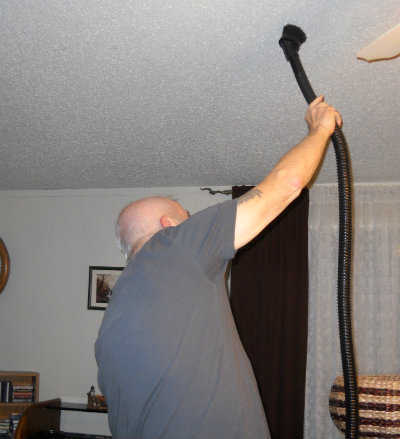 I turned around and looked up to see Jo awkwardly attempting to maintain her balance on the footstool while wielding the hose section of the vacuum cleaner.
I turned around and looked up to see Jo awkwardly attempting to maintain her balance on the footstool while wielding the hose section of the vacuum cleaner.
“What the hell are you doing?” I asked, trying unsuccessfully not to sound confrontational.
“I’m trying to clean the ceiling,” she replied. “Look how dirty it is.” She pointed to an area of the ceiling near the overhead fan.
“No, no, no,” I said, getting up from my chair. “I don’t want you falling and hurting yourself.”
And that, dear friends, is how I spent a good part of my Sunday, vacuuming the living-room ceiling. I know it sounds simple enough, but believe me it became somewhat more involved than that.
First, the footstool did not put me up high enough. The project would require the stepladder, which of course was in the shed out in back. Since the outdoor temperature was in the 30s, I had to retrieve my jacket from the closet in my den and put on a pair of gloves.
When I got out on the deck, I found myself ankle deep in leaves, another project-on-hold for me. I grabbed a broom and quickly swept them out of the way, but I still had to wade through more leaves to reach the shed.
During the first couple of years of living out here in the country, with trees all around us, I would rake, blow, mulch and vacuum the tons of leaves that continued to fall every day for weeks on end. I would get up on a ladder and scoop out the leaves and mud in our gutters, but it was like shoveling…well, you get the idea. The next day, the gutters would again be filled and more leaves covered the yard in every direction.
Now, I wait until the trees are nearly bare before I start what eventually becomes “Project Backache.”
Anyway, after nearly killing myself trying to avoid tripping over the gas mower and weed eater, I managed to drag the stepladder out of the shed and into the house. Then, for the first time in my life, I began vacuuming the ceiling.
Meantime, Jo went on and on about how the dust was killing her, pausing periodically to blow her nose, which prompted me to check the furnace f ilters after I finished the ceiling. Naturally, they were loaded with dust. I knew I didn’t have any replacements as the used filters were in the shed waiting to be washed. I made a mental note to buy several more new filters and proceeded to vacuum the current ones for the time being.
ilters after I finished the ceiling. Naturally, they were loaded with dust. I knew I didn’t have any replacements as the used filters were in the shed waiting to be washed. I made a mental note to buy several more new filters and proceeded to vacuum the current ones for the time being.
Following the filter clean-up, I began vacuuming my den, but it wasn’t long before I realized I was tired and put the vacuum cleaner aside. I made another mental note to begin an exercise regimen that would tone up my aged body and not wind up so tired after a few household tasks.
I returned to my computer and began writing this essay. And now I remember that I wanted to put down a few words about this election. Watching the news on TV, and from what I read online, the pundits have decided the Republicans will regain control of the Senate.
At first I was horrified at that possibility – until I remembered that President Obama still has two years left in office. Besides, the pundits aren’t always right. May I refer you to 1948 and how the experts, and even early newspaper headlines, had Thomas Dewey winning that election. And then the next morning the country woke up and Harry Truman was President.
Mid-term elections generally don’t go well for the presiding administration, but with registered Democrats far outnumbering registered Republicans, if the voter turnout is large enough it will be status quo in the Senate.
Of course, by Wednesday we’ll all know which political party prevailed. What we won’t know is what’s going to happen over the next two years.
Scary, huh? #
Making It in the ’50s (10/28/14)
It’s readily apparent that most people who read this weren’t even around in the 1950s. Nevertheless, such a decade did exist and it figured quite prominently in my life.
Things were a lot different then. Money, for example, went a lot further. In February 1950, I turned 11 and for at least the next five subsequent years I did everything I could think of to earn a buck.
Now, I didn’t do the smart thing and save what I earned. Don’t be silly. I needed to make money in order to purchase the things I held dear to my heart: baseball cards, comic books, 25-cent paperbacks, chocolate egg creams and, later on after I discovered girls, Playboy magazine. Oh, and for those of you who were around in the 1950s but didn’t live in New York City or New Jersey, a chocolate egg cream consisted of chocolate syrup, a little milk and a healthy spritz of carbonated water.
Along the way, I learned every trick I could to make what I did earn stretch farther. More often than not, my methods weren’t always legal. Using a pay phone, for instance, cost five cents back then. But I soon learned how to circumvent that and make calls for free. All it took was a bobby pin and the use of a pay phone in the subway/Long Island Rail Road station complex at 61st Street and Roosevelt Avenue in Woodside, Queens.
One simply pulled the bobby pin apart and stuck one end into a hole in the mouthpiece and the other end touching the metal lock box on the pay phone. Jiggling it around for a few seconds 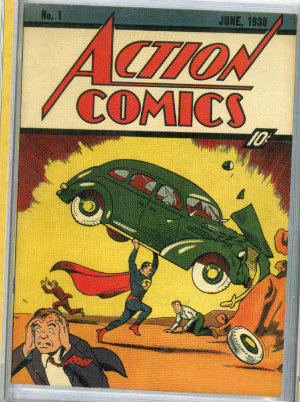 would cause an electrical short that eventually produced a dial tone. The gimmick endured for quite a while until the phone company got wise to it and plugged up the center holes of the mouthpiece.
would cause an electrical short that eventually produced a dial tone. The gimmick endured for quite a while until the phone company got wise to it and plugged up the center holes of the mouthpiece.
Of course, I’m not really sure who we called back then. We didn’t have a phone at home, and neither did most of my friends. But it was fun anyway to “beat the system.”
We also used slugs the same size as nickels in both pay phones and other machines accepting nickels. We obtained them by scouring various construction sites. The slugs were the result of punch-outs from electrical boxes and would be lying all around the sites.
Incidentally, construction sites were also great places to pick up empty soda bottles that we would turn in for quick cash. Some empty bottles paid two to three cents, even five cents for their return. They added up quickly.
I think I was 12 when I took on a paper route, doing it for about a year. The problem was the winter weather. Sloshing through ice and snow, my young fingers ready to snap off in the frigid cold, just wasn’t for me.
Shining shoes was another way we learned to earn money. My best friend and I saw this relatively inexpensive shoeshine box on display in Woolworth’s and decided to each buy one. We had some small success shining shoes in front of the subway/railroad station, but the most lucrative sites were inside bars. And in Woodside, for the most part a lower middle-class Irish neighborhood, there was no shortage of pubs.
There was a law on the books that stipulated x number of feet had to exist between each alcohol-serving establishment. Whatever that stipulation was, a tavern was opened, leaving at least four booze emporiums per square block. Today, that no longer is the case. I took a virtual tour of the old neighborhood recently and couldn’t find any bars.
As I’ve written here before in earlier blogs, we frequented these bars nearly every night. True, we’d eventually get chased by the bartender in every one of them, but we’d get to shine the shoes of at least one or two patrons before the bartender spotted us. And at the end of the week, on, say, a Friday night, when a lot of the workers got paid, the pubs would be so crowded that the bartenders would be just too busy to toss us out.
My buddy Richie and I wouldn’t go into a tavern together but would instead take turns. We charged ten cents to shine a pair of shoes, but when the tip was figured in we would usually net a quarter. And a quarter went a long way back then.
Now here’s the rub. We worked hard to earn this money so we could purchase the aforementioned luxuries such as comics and baseball cards and en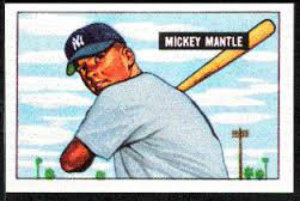 joy them in the moment. What we didn’t have any idea about then was what the value of these items would be in the future.
joy them in the moment. What we didn’t have any idea about then was what the value of these items would be in the future.
If only.
If I had held on to even half of all the comics I had bought and read I’d be set for life today. I’m sure many of you know that this past August a copy of Action Comics No. 1, featuring the first appearance of Superman, sold at auction for $3.2 million. This comic was produced a year before I was born, so I know I never owned a copy. But my dad brought comics home during the mid- to late 1940s, many of them featuring Superman or Batman, and those comics, in decent condition, are still quite valuable.
As for baseball cards…sigh. From 1951 to 1955, I had multiples of them all, including the 1951 Bowman Mickey Mantle, his true rookie card. A recent sale of this card in gem mint condition sold for more than $600,000. I also owned multiples of the Topps 1952 Mantle card, which some consider Mantle’s rookie card, as well as hundreds of other baseball cards.
Back then we’d flip for the cards, letting them drop to the ground and matching each other. Or we’d toss them against a wall. But we also kept a separate set or two in mint condition, usually in an empty cigar box.
I’ve also read that some kids would place a card in the spokes of their bike in order to make a certain “motorized” noise. I don’t know who these kids were, but this would have been unthinkable to us back then.
We had no idea how valuable some of these cards would become, but to us at the time the cards and the comics gave us great joy and were the most prized possessions in our young lives.
I wouldn't trade that for anything. #
Train Travel Memories (10/21/14)
I’m not really sure when my love affair with trains began, except I can’t remember when I didn’t love trains. I did have the advantage of growing up in an era when trains were near the peak of their popularity. Air travel was still in its infancy and people in the U.S. who wanted to get from point A to point B simply boarded a long-distance train and enjoyed the luxury of the ride.
Each of us has certain memories that remain vivid in our heads. There was an extended period in my young life when I stayed with my grandparents in Illinois. The train station couldn’t have been  more than ten or fifteen minutes away from the house. I remember lying awake listening to the resonant, moaning train whistles piercing the nighttime air, picturing the steam-belching locomotives as they chugged toward their exotic destinations.
more than ten or fifteen minutes away from the house. I remember lying awake listening to the resonant, moaning train whistles piercing the nighttime air, picturing the steam-belching locomotives as they chugged toward their exotic destinations.
During the day I would sit atop a nearby hill, peering down on the railroad tracks below, watching intently as if living in an Andrew Wyeth painting. Every now and then, a sleek streamliner would zip by in a blurry, multi-colored streak. But it was the 25 tons of black metal sending white clouds of steam billowing into the air as it chugged along silver ribbons of steel that excited me the most.
My dad, who began his career as a newspaperman, first as a reporter then later as an editor and rewrite man, eventually morphed into public relations. This led to his signing on with New York’s Long Island Rail Road (LIRR), basically a commuter rail service, as publicity director. This position in turn enabled him and his family to travel by train throughout the country at a much reduced rate. (I’m not 100 percent sure, but I believe the cost to him was simply the tax on whatever the going fare was for whichever his destination.)
Since Dad was born and raised in Geneva, Illinois, a small town outside Chicago where for a long time my paternal grandparents still resided, and his brother and his wife lived and worked in Washington, D.C., there were quite a few trips by train to th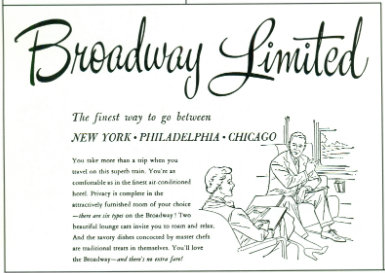 ese locales. And I was often taken along.
ese locales. And I was often taken along.
On my mother’s side, her sister and her family lived in Santa Monica, California, and so there were a number of train trips to the West Coast as well.
A trip to Geneva from New York City back in the late 1940s and early 1950s was an overnight affair. When we traveled as a family, our accommodation was a “drawing room” that included facing seats that turned into two double berths, upper and lower. This accommodation also included a small bathroom with stainless steel sink and commode. Back in those days, showers were not generally available, but I understand some long-distance trains today do offer that amenity.
The train I remember riding most often back then was the famous Broadway Limited. Upon arriving in Chicago, we would have to switch to a commuter railroad, the Aurora and Elgin, in order to travel the last leg of the journey to Geneva.
Even if our destination was the West Coast, we would still have to travel by train to Chicago. We would then connect with another long-distance train to California. The entire trip would take four days and four nights. I remember one particular trip in which we rode aboard the Santa Fe’s legendary “Super Chief” to Los A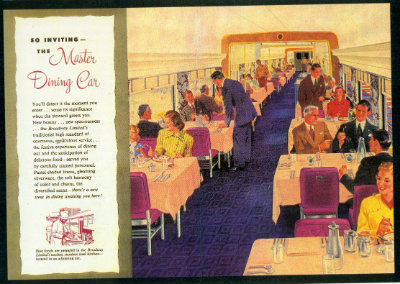 ngeles.
ngeles.
Unlike in Europe, long-distance train travel in the U.S. has been on the decline for many years, though I understand there has been a recent resurgence. Today, traveling coast to coast by rail, whether in the U.S. or Canada, is a costly affair. I don’t have exact pricing for this kind of excursion handy, but should the mood strike you, you’d better have at least five grand to fork over for the experience.
Railroads were initially created for commerce, not tourism. However, today’s rail system apparently survives because of tourism. To be sure, there are still freight lines hauling commercial goods, but special passenger trains in key areas keep the romance of the rails alive.
I’m not sure how old I was, but I especially remember one particular time being placed on board the Broadway Limited by my parents to travel to Chicago alone. I would be picked up at the other end by my grandfather. It was a glorious time. My accommodation was a roomette where I spent half the night looking out the window. On other trips with my family, my mom would wake me up when we got to the famous Horseshoe Curve near Altoona, Pennsylvania, usually around 3 a.m. One could gaze out the window and see the last half of the train as the front half rounded the severe curve. This time, I stayed awake until we got there.
Having dinner in the well-appointed dining car was a luxurious experience I will never forget. Immaculate white tablecloths and accompanying linen napkins complemented  the spectacular food. Starting off with a perfectly chilled shrimp cocktail, I can still taste the superbly prepared filet mignon I had ordered that evening. As far as I’m concerned, you couldn’t dine any better if you were in a five-star restaurant.
the spectacular food. Starting off with a perfectly chilled shrimp cocktail, I can still taste the superbly prepared filet mignon I had ordered that evening. As far as I’m concerned, you couldn’t dine any better if you were in a five-star restaurant.
The service on those trains was just as first-class as the rest of the experience. When you were ready to retire for the evening, one button push and a porter would arrive to make up your berth. If you wanted your shoes shined, it was customary to leave them out in the passageway in front of your door.
The observation or lounge car was always fun too if you wanted to play cards or sip on a soda as you reclined in a plush easy chair and enjoyed the beautiful scenery rolling by. As far as traveling is concerned, I can’t think of any other way to really enjoy life on the move.
Incidentally, there was quite a competition between the Pennsylvania Railroad’s Broadway Limited and the New York Central’s Twentieth Century Limited, eventually developing into the most celebrated rivalry in the history of North American railroads. Each strove to outdo the other in upgrading their service, speed and luxury.
According to what I’ve read, the only real difference between the two trains was the route each took to get to Chicago. The Broadway’s path was more direct, but involved traversing the rugged Appalachian Mountains. The New York Central, on the other hand, had its flagship train take what they touted as the “Water Level Route” – due north to Albany, then due west to Chicago. This implied that passengers would enjoy a more restful ride and better night’s sleep.
Both trains personified that golden age of train travel, a treasured period that will remain a part of me for as long as I live. #
Authors Note: Shown here are a couple of ads produced by the Pennsylvania Railroad promoting some of the finer attributes offered aboard their trains. Also included is a photo of Pennsylvania Station’s majestic interior, one of New York City’s architectural wonders until it was torn down in 1963.
So You Wanna Own a Cat (10/14/14)
First of all, there’s no such thing as owning a cat. If you already have one or more cats living in your home, you already know that. Some say a cat owns you. We’re not sure about that, but we do know for a fact that cats – whether feral and roaming the countryside, or domesticated and residing within a private home – are free spirits who come and go of their own free will.
To be sure, one can set rules for cats living within their home. For example, we don’t allow our cats to go outdoors for safety reasons, despite Sparky, our Maine Coon/Tabby mix, making periodic attempts to escape into the surrounding woods. Dry cat food is available to them at all times, but canned cat food is provided twice daily. Snacks and treats are offered at our discretion, although Cisco, our purebred Bengal, let’s us know in loud and no uncertain terms when he expects to receive a treat.
Unlike dogs, every cat I’ve owned, er, had staying with me, instinctively knew what to do with a litter box. And before I’m accused of dog bashing, the first thing I did when I initially got 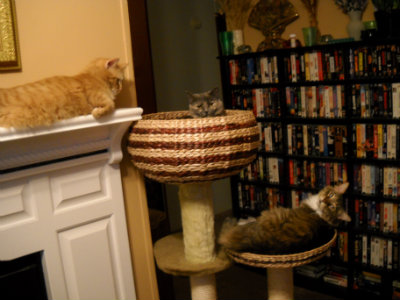 married was to go down to the local pet store and purchase a puppy. I obviously couldn’t wait to have children.
married was to go down to the local pet store and purchase a puppy. I obviously couldn’t wait to have children.
Anyway, the puppy, a mutt that definitely had traces of German shepherd in his lineage, had yet to be housebroken. We weren’t aware of this until the very first morning, a Sunday, when my wife and I called him into our bed. He came scrambling up into the bed, peeing as he went. The puppy, whom we named “Onion” because he would eat anything placed in front of him, including onions, also was destructive.
We both had jobs in Manhattan, so we left him in the kitchen and blocked the doorway with a clothes hamper in the furnished, two-room basement apartment in Jackson Heights, New York. Basically, during the course of the day, the puppy ate the hamper. I mean, he chewed on it, he scratched on it, he ripped it to shreds, and the landlord and his wife who lived upstairs, were rightfully outraged. They immediately raised our rent, forcing us to move.
The owners of the next place we moved to, a private residence in Bayside, Queens, offering a four-room, unfurnished apartment on the second floor, adamantly opposed any pets, especially canines. The rent was extremely reasonable; the neighborhood was safe, quiet and readily accessible to public transportation; and the fact that we were just starting out in the early 1960s with entry-level jobs and no car made the decision easy. We would give the puppy away to a nice family with a farm out in the wilds of Pennsylvania. We were fond of Onion, but we knew he’d be happier and safer romping about on a farm.
Unfortunately, we were wrong. Two weeks later Onion was hit by a car and perished.
Meantime, the landlady’s cat, a back-and-white male named Johnny, began paying us regular visits. Johnny was free to roam about the neighborhood but would come by the side entrance every evening around dinnertime and the landlady would feed him a carefully boiled portion of delectable calves’ liver. This was also our entrance and Johnny would often co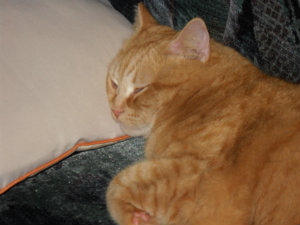 me up our steps and visit us. He was the only cat I ever knew to actually enjoy eating corn on a cob.
me up our steps and visit us. He was the only cat I ever knew to actually enjoy eating corn on a cob.
The kids loved Johnny and so eventually we purchased a Calico kitten for our daughter. [Up to that time, we still weren’t aware of shelters from which one could adopt or “rescue” a cat or dog.]
Thus was the transition from dog fancier to feline lover. We love all animals and realize that both dogs and cats as pets offer us unconditional love right back. Of course, most everyone is readily aware of the drawbacks to dog ownership. Come rain or come shine, summer or winter, a dog has to be taken outside to do his business. It is more difficult in an urban setting, where the canine’s waste must be picked up and discreetly disposed of. But even in the country, despite brutally hot or cold weather, most dogs have to be “walked.” Farm canines are an exception.
And unlike cats that are constantly licking themselves clean, dogs have to be bathed regularly.
Dogs are loyal pets that generally are mindful of their owner’s likes and dislikes and will usually do their bidding. Cats, on the other hand, may or may not sense the whims of their owner, but they will still do as they please.
If you haven’t lived with a cat for any period of time, then you don’t know how much love they can give you back. They are just as loyal as dogs, but they do so “on their terms.”
Drawbacks on having a cat live with you do exist. Besides providing meals “promptly” on time every day (and they will let you know if you’re late), you must keep their litter boxes clean. Simple enough on the face of it, but when you have more than one cat, as we do, cleaning the litter boxes several times a day can be quite a drudge. My aching back will attest to that.
be quite a drudge. My aching back will attest to that.
You must also be ready to contend with a cat’s idiosyncrasies while using the litter box. We once owned a cat that would step into the litter box with his front legs, dig furiously in the sand, and then leave a neat little pile for us on the laundry room floor. That got old real fast.
And too, you really can’t bring any kind of flowers into the home. A cat will definitely munch on them as soon as they become aware of their presence. The few times I’ve brought my wife flowers, she’s had to put them in the bathroom and keep the door closed. Even then, sooner or later, a cat will find a way to get to them. There’s nothing like nearly having to take out a small mortgage to pay for a dozen long-stem beauties, only to find that one of your cats has made a 12-course meal of them. To make matters worse, you soon discover that the feline decided to return the meal…all over your newly reupholstered wingback chair.
And that’s another thing about cats you can make book on: Whether you have just one or a dozen, sooner than later, one or more is going to throw up. And they always, ALWAYS do so on your new carpeting or furniture. Never will they do it on your easy-clean-up kitchen floor.
When you have cats living with you, especially kittens or younger cats, you have to take precautions as if you had toddlers running about. You actually have to “childproof” your home. Expensive bric-a-brac, valuable china and delicate mementoes all have to be tucked away for safekeeping.
And don’t kid yourself into thinking you can put something out of the reach of a cat. Trust me, no such place exists. Cats are great climbers and can get to anywhere they choose, no matter how high up.
In a manner of speaking, having dogs or cats around is much like having children around. However, unlike children whom you can teach to behave, or dogs you can train, you just have to learn to live with cats – on their terms.
That said, I have to confess – God love ’em – they’re still worth all the trouble. #
Author’s Note: As you no doubt guessed, the last photo shown here has nothing to do with this installment. The flower simply popped out here a few days ago and is our October-blooming “last rose of summer.”
Evocative Provocative (10/7/14)
Well, I was going to write about cat ownership this week (I know, you can’t “own” a cat), but a subject currently in the news has become so hotly debated it demands this writer’s immediate attention.
The topic in question involves the sexy way in which some young girls dress today and whether it invites sexual harassment or even rape. A friend of mine feels that today’s teenaged girls not only wear clothing that too often exposes much more of their young bodies than current decency standards would allow, their behavior and the way they carry themselves around young boys is both suggestive and far too provocative.
“I’m concerned for these girls,” says my friend. “I don’t think they’re aware that dressing and behaving the way they do can lead them into a lot of trouble.”
My friend’s stance on the subject is that for young teenaged boys whose hormones are already flying in every direction, the sight of a young girl shamelessly displaying her body parts is enough to instantly arouse and incite them to sexual harassment, if not outright molestation.
Unfortunately, this is the same outlook of many women, but it is absolutely ludicrous to presume that every male, young and old alike, would be so moved by a female’s scantily clad body that they would force themselves on the woman. If that were the case, it would imply that all men are a threat and that going to the beach would be out of the question for a woman.
As a male, I can tell you that we have a lot more control over our urges than that. I can remember back when I was a teenager and certainly I was no different than today’s young men. At times, my hormones were boundless, but not enough to lose control. True, young girls did not dress as provocatively then as so many do today, which is certainly a sign of the times. But it didn’t take much for any of us to become aroused.
Truth is, a girl could be wearing a snowsuit parka with a hood and a ski mask, and just a glimpse of, say, an earlobe could instantly trigger sexual thoughts for me. It really didn’t take much exposure on the girl’s part for me to become sexually aroused. However, I never once entertained the thought of molesting the girl.
The idea of sexy attire possibly leading to rape is all over the media today. But not everyone supports this viewpoint. I have to agree with CNN’s Carol Costello who wrote an opinion piece on CNN.com that refuted the idea that the wearing of “sexy” clothes can often leave a woman open to sexual harassment or even rape.
First of all, rape is not a sexual crime. It is an act of violence. Statistics bear this out. According to Carol’s article, citing the U.S. Department of Justice, 1 in 4 rapes occur in the victim’s home. Two in 10 rapes take place at the home of a friend, neighbor or relative. And almost two-thirds of all rapes are committed by someone the victim already knows.
Rather than being turned on by a short skirt, the average rapist is usually moved to action for two reasons: vulnerability of the potential victim, and the opportunity to commit the act. In most cases of rape, according to what I have learned over the years, the rapist is usually someone who is obsessed with achieving compete power over his victim.
Carol Costello also points out that “in a rapist’s twisted mind, the woman he brutalizes is always to blame.” She goes on to quote Linda Fairstein, who prosecuted sex crimes in New York City for 30 years: “Sexual assault is the only crime in the book, literally, where the offender repeatedly blames the victim. I’ve…had men who attacked 5-year-old girls who’ve said, ‘she climbed on my lap and she was very sexy and I thought she was inviting me to touch her.’”
Rebelling against authority, experimentation with dress, trying to act ten years older than they are: To me, it's just an updated version of the rites of passage we’ve all gone through in one way or another.
To be fair, it might be helpful if parents sat down and had a heart-to-heart with their girls, explaining how it just might be a better idea to dress smarter. While I don’t agree that dressing “sexy” will cause widespread molestations and outright sexual harassment on the part of teenaged boys, I do realize that many students and most adults will judge you by your attire.
A good example of this, as shown on CNN, is the scene in the film Pretty Woman in which Julie Roberts, holding a limitless credit card from her temporary suitor (Richard Gere) and dressed in her hooker outfit enters a high-end Beverly Hills clothier and is rebuffed by the attending staff. After the hotel manager sees to it that Roberts is given a complete, classy makeover, she returns to the clothing store, waving the credit card, and says to the stunned attendants, “Remember me from yesterday and how you wouldn’t wait on me?” She pauses, and then smiles. “Big mistake,” she says, and departs the store.
Yes, there’s always the chance that one lone boy might get the wrong impression and decide a young girl’s licentious dress translates into a green light for his sexual advances. That’s why it’s important to prepare the girl by explaining how certain actions can have certain consequences.
Certainly it’s a better way to do it instead of the manner in which a Utah high school handled it. Authorities there turned away about a dozen girls from attending a homecoming dance due to their “immodest dresses.”
Seriously? Like that’s going to make them dress genteelly. #
The Sun Behind the Clouds (9/30/14)
Editor’s Note: The following guest blog was written by my wife and co-author of Stardust Dads, Josephine C. George. Photos shown here are of Josephine at age 4, and at age 12 with her family.
About a week ago it was suggested that I submit another piece for the Second Thoughts weekly blog. I was asked to touch on the sexual trauma in my childhood, but also focus on what I had done over the years to overcome the psychological damage resulting from those events and become an emotionally healthy woman.
As I stared at the blank screen on my laptop, I began to wonder why I found this to be such a difficult assignment. I knew the downside to recovery was a journey that lasted a lifetime; the upside, of course, guaranteed the sun would come up tomorrow, even if it hid behind a cloud. And so today, at the age of 70, I must first acknowledge that I do not have all my psychological ducks in a row.
Indeed, the memory of my uncle touching me inappropriately will never go away. I was only 12 years old when it first happened, and I had convinced myself it was nothing more than an accident.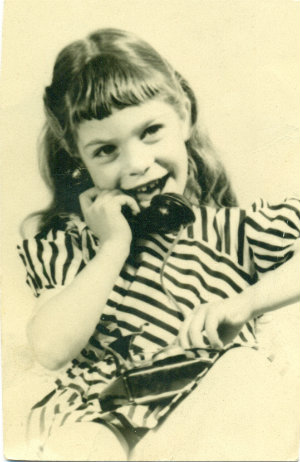 But, in spite of my naiveté, I had instinctively gotten angry when he touched me again the following weekend.
But, in spite of my naiveté, I had instinctively gotten angry when he touched me again the following weekend.
I’d been taught to never be disrespectful to my elders, but there I was yelling loudly, “No! Don’t touch me like that!” I won’t ever forget my uncle’s unrelenting smile that alternated with the baffled look he’d given me, how he had stood his ground, determined to discredit not only my anger but my instincts. My demand had fallen on deaf ears, and that terrified me. I turned and ran to the far end of the house, locked myself in the bathroom, and waited for my mother to get home from the grocery store.
Whatever had possessed me to think this two-time event would soon be over and done with? When I heard mom’s car pull into the driveway, I unlocked the bathroom door and ran outside to tell her what had happened.
Mom kept questioning what I was trying to tell her. “He put his fingers over here,” I whispered. My mother still didn’t understand. That’s when I actually touched myself.
Mom’s face turned to stone. “Oh my God, your uncle would never do such a thing!” I was horror-struck by her response. How could she blatantly refuse to believe not only what I’d just said, but even what I had shown her? I involuntarily burst into tears, trying to think of what else I could say or do to convince her otherwise. She had to understand I was telling the truth. I needed her to fix this.
Instead of detailing the heated interchange with my uncle, I told her about him touching me in exactly the same way the week before. That’s when Mom bit her bottom lip. (I had an instant flashback. At least this time Mom and I weren’t in the kitchen where she could get her hands on a butcher knife.)
Tears ran down my face as I quietly listened to Mom speak what would be her final words on the subject. Her speech was halting and deliberate: “That’s enough! Do…you…hear me? I don’t want to hear another word out of your mouth about this. Not a single word…not later, not tomorrow or even next week…not ever! Do…you…understand me?” I nodded.
Mom abruptly turned, grabbed her bag of groceries and headed toward the back door. I couldn’t move. I lingered briefly in the driveway until my subconscious sucked up all the trauma and drama of that day. My mind was left empty and numb, as though it had all mysteriously vanished into thin air.
It was absolutely necessary that my mind go blank because my uncle had been living with us at the time. He and his first wife had recently separated and were getting a divorce. My father had set up a bedroom for him in our attic, and the doorway to the third-floor attic was located in my bedroom, just a few feet away from my bed.
It would be at least twenty years later 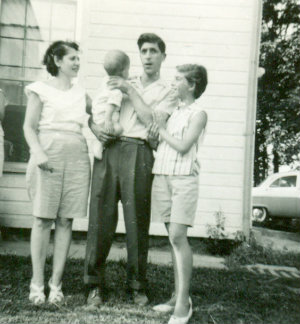 before my subconscious would release its contents. I began to have visions of my uncle going to that bedroom in our attic, walking past my bed night after night while I had been sleeping. Those visions would take my breath away. The medical term: panic attacks. What if he…? Was that possible? I wondered. I worried. I wanted to die.
before my subconscious would release its contents. I began to have visions of my uncle going to that bedroom in our attic, walking past my bed night after night while I had been sleeping. Those visions would take my breath away. The medical term: panic attacks. What if he…? Was that possible? I wondered. I worried. I wanted to die.
My “inner child” is a little girl who lurks silently in the corner of my mind.
I’m becoming more aware of this little girl. Is she here to stay?
I admit it. It’s true. I continue to deliberately avoid her.
Wherever I go, whatever I do, she continues to watch. And wait. But for what?
I can sense she’s shy. So am I.
I can sense she’s frightened. So am I.
I can sense she feels lost and alone. So am I.
But how can this be? After all, I’m married and the mother of three. I’m so busy with grownup problems.
The little girl inside me continues to watch. And wait. Her image becomes sharper, more apparent. I can see her clearly. She is me.
I wonder. What does she want? What does she need? What can I say? What can I do? I’m so confused.
And the past begins to haunt not only her, but me. “I won’t go back. I can’t go back,” I cry to myself. “I can’t change what happened. What they said. What they did.”
Again and again I awake with the same old questions, the same fears and anxieties, the same doubts.
And then my inner child comes to me in tears. “Don’t cry,” I whisper. “You’re safe now. I’m here. We’ll work through this together. We are one…forever.”
Even back in the 1970s, when I was by then the mother of three precious young boys, there were various avenues available for me to begin my search for a semblance of serenity: therapy, books, self-help groups, etc. However, the first time I sought help with a therapist, I left his office feeling victimized once again. I had shared with him what my uncle had done and how my mother had reacted. The doctor’s only advice was for me to look back on what had happened and appreciate the attention.
The path from a damaged childhood to that of an unbroken adult demanded great courage. It was a journey of flashbacks, confusion, anxiety and guilt. It commanded great strength to live from day to day, often hour by hour, to find perspective on anger and fear.
For me, writing about anything and everything enabled me to recognize my strengths and weaknesses. Too often I would read an entire self-help book and walk away with only bits and pieces that I knew in my heart would be of benefit to my own recovery.
And just this past week, TV’s Dr. Phil had a teenager on his show who wanted her mother to stop nagging about her choice of clothing. The mother, however, felt her daughter’s outfits were too provocative. I understood Dr. Phil’s concern that if the mother was not willing to back off, her daughter would most likely tune her out completely.
Because of my own unexpected sexual encounter with my uncle, I was disappointed that Dr. Phil did not find it important enough to also enlighten the daughter about sexual predators and how to protect herself from them.
Today, I not only honor the value of my journey through life, but the value of my imperfect self as well. #
Collections (9/23/14)
Today has been a typical Sunday for me. First, I’m once again wondering what in the world I can write about for this weekly blog. Second, waiting for a rain-free day in which to mow the lawn has resulted in an out-of-control, high-grass field that will be a challenge for my non-self-propelled mower. Third, there are a number of self-interested projects I would prefer to be involved with awaiting attention in my den.
Working backward, the third item can, unfortunately for me, be approached anytime. As for the second item, the longer I wait to attend to the lawn, the more difficult it will be to complete the task. At my current rate, I mig ht have to wait for the snow to melt before accomplishing it.
ht have to wait for the snow to melt before accomplishing it.
Which of course brings us to the first item, writing the weekly blog, as the top priority of the day. Nothing new there. Family and friends have often said to me, “Why don’t you write about…?” Easy enough to come up with a topic, but it isn’t that simple. To begin with, when I write about anything, I have to be comfortable with or passionate about the subject. In other words, chances are I’m not going to write about fire engines and fighting fires when I know nothing about either.
While the purpose of “Second Thoughts” is to draw potential readers to the website and ultimately encourage them to purchase our book, Stardust Dads, I’m not being paid to write the blog. This allows me the luxury to write what I please. But again I still have to come up with an idea, which for me is the most difficult part of writing. Sometimes I have an idea on my own, or something happens in our day-to-day life that leads to fodder for my journalistic mill.
For example, wife Josephine turned on a TV channel earlier today that featured back-to-back-to-back episodes of something called “Extreme Collections.” I found myself compelled to stare at the wide screen as one collector after another displayed his unique collection of everything from harmonicas; old, restored cars; dolls; super-hero action figures; toy cars; and video games. At the end of each episode, an expert estimated an approximate value for that particular collection.
collection of everything from harmonicas; old, restored cars; dolls; super-hero action figures; toy cars; and video games. At the end of each episode, an expert estimated an approximate value for that particular collection.
As I watched, Josephine gave me her familiar “What-about-your-collections-of-books-and-baseball-cards-and-what-are-you-gonna-do-with-them?” look. She followed this up with an actual, well-thought-out question.
“Seriously, honey. And this goes for both of us. What would happen if one of us were to suddenly not be here? Would you have any idea as to what to do with the stuff in my dollhouse room? Would you know the value of any of the miniatures I’ve collected? What about the dollhouses themselves, or what’s in them?
“And I’d have the same problem if something happened to you. I wouldn’t know the first thing about what’s in your den. I know you’ve got hundreds of books, maybe thousands. Not to mention magazines and old comics, and those [expletive deleted] baseball cards. I can just imagine having someone come in to give me an estimate and being robbed blind.”
I responded by asking her not to talk about either of us not being here anymore.
“I’m just being realistic,” she said. “I think what I’m trying to say is that both of us need to take an inventory of what each of us has in our respective collections and the estimated current value, maybe do a spreadsheet.”
Prior to retiring, Jo had been responsible for accounts receivable. She was always setting up and maintaining spreadsheets on a daily basis, a process she actually enjoyed. If I asked, she’d happily prepare a spread sheet for my socks and underwear drawer, or anything else I wanted.
I told her I would certainly think about it, although such an undertaking for me would be tedious and time-consuming. It would take many months to complete. I’ve currently got 11 bookcases chock full of books and magazines. I’ve got three large loose-leaf books bulging with my collection of New York METS baseball cards, which includes half a dozen nine-card pages of autographed cards. Additionally, I’ve got at least 30 large loose-leaf books filled with baseball cards I sell on eBay. That also includes a number of autographed cards of players for teams other than the METS that I haven’t bothered to count. In boxes in front of my desk and in my closet are more magazines and comics, as well as untold numbers of low-value cards.
cards I sell on eBay. That also includes a number of autographed cards of players for teams other than the METS that I haven’t bothered to count. In boxes in front of my desk and in my closet are more magazines and comics, as well as untold numbers of low-value cards.
These are the numbers. There is so much more to my collections. I hadn’t even mentioned several additional loose-leaf books filled with non-sports cards, or signed art hanging on my walls, or certain books signed and annotated to me personally.
While I’m not in denial about my mortality, I’m certainly not eager to sell or give away everything I’ve collected and simply wait around for the Grim Reaper to pay me a visit. I can’t explain why I collect things. I don’t think any hard-core collector can. All I can say about it is that I enjoy the hunt and the rush of finding and acquiring an item. I do know it would cause me pain to part with certain books and other items in my collection.
I remember my mother’s decision to pass on some of her precious antiques to my sister and me many years before she would leave us. She purchased and “collected” these antiques when she was much younger, art and articles of furniture my sister and I grew up with. When she insisted I take the grandfather’s clock, whose inner workings were more than 300 years old, I asked her if she were sure about parting with it. She responded that the clock and other antiques were just “things,” and that she wanted to be alive to enjoy my enjoyment of what she had previously owned and enjoyed.
When I sold the clock years later, I again asked her if it was OK with her before I did so. She again responded that the clock and other antiques were just things and that she was fine with whatever I needed to do.
Since I’ve been estranged from my two adult children for many years [their choice], I don’t feel I have the option of passing any part of my collections on to either of them. However, much as I’d rather not admit it, Jo probably has a point about taking inventory.
After all, if we don't, we might be considered just hoarders. #
Recall Recoil (9/16/14)
My sister Barbara, who lives a few states away, called today to let us know the good news regarding her recent surgery. Pathology results indicated no sign of additional cancer. This follows her first bout with cancer about 18 years ago, which had also included surgery. Although chemo and radiation treatments nearly ended her life then, Barbara’s strong constitution and will to survive got her through the ordeal.
Barbara and I continued chatting on the phone as we usually do, recalling events from our past while growing up. We also discussed current events, in particular the controversy over child discipline and whether or not to use corporal punishment.
A news report this morning about a football player beating his child to the point of drawing blood had also indicated that about 90 percent of parents today discipline their children in much the same way they themselves were brought up. In other words, if a mother or father today was spanked as a child, then nine times out of 10, those parents would spank their child.
Not so with me and my children, but I don’t want to get ahead of myself. My childhood was mixed. During my early years, I don’t remember much in the way of corporal discipline. My mom may have swatted me a few times, but my father never laid a hand on me. Violence just wasn’t in his makeup. I don’t remember Dad even raising his voice. When I misbehaved, and I’m sure I did more than once, Dad might admonish me with a polite “Now, David….”
Life abruptly changed after my mother divorced my father. Barbara and I were placed in a boarding home out on New York’s Long Island for at least a year or so. No corporal punishment there, though there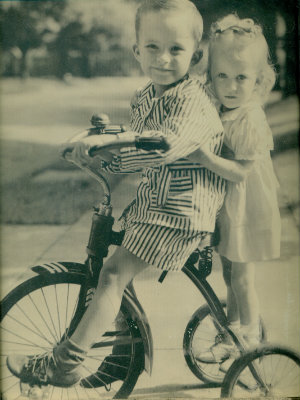 certainly was mistreatment in other ways, which I’ve touched upon here in earlier blog installments.
certainly was mistreatment in other ways, which I’ve touched upon here in earlier blog installments.
When Mom remarried, we were brought back to live with her and our new stepfather, Arthur. Life for my sister and me changed yet again. Our new stepfather certainly did not believe in sparing the rod and spoiling the child. I don’t remember Arthur hitting Barbara, but he offered no restraint when it came to me. Whenever I broke the rules, out would come the belt. No simple spanking for Arthur. The belt was his implement of choice, and he wielded it with gusto.
But that was when he was sober. When he was drinking, everyone was his target, including my mom. And that was what my sister and I wound up discussing after referencing the news story about the football player beating his son.
One particular evening stands out vividly in my memory banks. Mom and Arthur had been out drinking. Arthur was in an especially argumentative mood, which added fuel to the obvious fire. One thing led to another and before long Mom and Arthur were embroiled in a heated argument. I don’t remember what they were arguing about, but eventually my mother told Arthur to leave, pushing him toward the front door. This was the point at which Arthur crossed over the line and swung at my mother, hitting her hard.
I became enraged. Despite being in my early teens and not very big, I remember leaping at Arthur and trying to wrap my arms around his neck in an effort to bring him down. My stepfather was close to six feet tall, a muscular Swede, and it was a classic case of a mosquito trying to take down an elephant.
This scenario had taken place in the long hallway leading to the front door, eventually spilling into the lone bathroom. I know Barbara was there, but I’m unsure of her exact location. As for me, Arthur flung my short, lightweight body into the bathtub at the rear of the bathroom, the tub’s faucet tearing into my head.
Somehow, all of us survived, which was a miracle. But when the reminiscing brought us to this point, Barbara and I decided that was enough of our traveling down memory lane. Some memories, we decided, were better left alone.
When it came to raising our children, I vowed to myself never to hit them as a form of discipline. When they were very young and misbehaved, which wasn’t often, I would make them stand in a corner for five minutes. My mother called me “a Hitler” for doing this, but I felt it was a lot better than hitting them.
In my mind, hitting a child, even if it’s a hand spanking on the behind, humiliates them and causes them to lose a certain amount of self-respect. I can remember only one instance when I did spank one of them, my daughter Jennifer. She apparently had been playing with matches and reportedly tried to set fire to the woods. I decided at the time that the seriousness of her actions required a serious response on my part.
I believe she was about 8 years old at the time, and although I spanked her as lightly as I could, she wound up bruising easily. I regret the act to this day.
For the record, my children became mature, successful adults. Did they suffer any consequences for being spared the rod? You’d have to ask them.
I know the debate for and against corporal punishment will go on. Whichever direction in which the parents choose to go, one thing is certain: that decision will impact both the children and the parents. #
Author’s Note: Photo shown here is of my sister and me circa mid-1940s.
CATalog (9/9/14)
Cats, like dogs, all share certain characteristics. But every cat, like every dog, has its own set of individual traits or habits unique to that particular animal. And, as with humans, it’s not always readily clear why an individual does something, or why he/she does it in such a unique manner.
It was unanimously decided in the George household to hold an open forum to try and determine why each feline does what he/she does, beginning with the oldest:
Sparky  – 12 Years, 6 Months. Male Tabby/Maine Coon, semi-longhair.
– 12 Years, 6 Months. Male Tabby/Maine Coon, semi-longhair.
Why, after all this time, do you still run right up to anyone who comes through our front door and start purring and rubbing up against them? No matter whether they’re family, or friends, the furnace guy, or even complete strangers, your response is basically always the same.
Sparky’s response: I don’t understand your question. All those nice people come to see me, and I react accordingly.
All right, then what about at mealtime. Why do you insist on going over to another cat’s plate containing the same exact food and begin eating theirs before you’ve taken more than a few bites of your own?
Sparky: Well, first of all, you don’t always keep the portions exactly even and I need to make sure I get my fair share. Secondly, it’s not always the same food and I might like it better, if you catch my drift.
One last question: Unlike the other cats in the house, why do you try to escape into the woods whenever the opportunity presents itself?
Sparky: Because sometimes I feel like I’m a prisoner, a captive. I’m not; I’m a free man.
No, you are not. You’re a cat.
Sparky: Whatever.
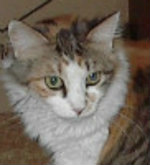 Cali – 11 years, 5 months. Female Calico, semi-longhair.
Cali – 11 years, 5 months. Female Calico, semi-longhair.
Why are you so friendly with humans, yet so unfriendly toward other felines? You hiss and carry on whenever another cat gets near you, and then wonder why you’re eventually chased or attacked by the others.
Cali’s response: Humans appreciate my beauty and sensitivity. The other cats are like dogs. They all drool. If I were alone here, I’d rule.
No, you’re mistaken. We’re the ones in charge. Can’t you be just a little bit friendlier?
Cali: Nah.
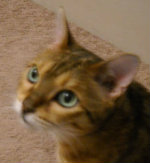 Francisco (Cisco, for short) – 8 years, 8 months. Male Bengal, full pedigree.
Francisco (Cisco, for short) – 8 years, 8 months. Male Bengal, full pedigree.
Why is it that sometimes you’re so loud, you can be heard in the next county, and that’s with the windows closed? And why do you do your most howling at night after everyone has retired for the evening?
Cisco’s response: What do you expect me to do? You all are a bunch of flat-leavers. I get my rest here and there during the day, and then just when I’m getting revved up and want to play, you all go to bed and leave me high and dry.
Do all Bengal cats have large eyes? Your eyes are huge, as if they were the eyes of an alien being from another planet.
Cisco’s response: And you’ve seen an alien being lately? Seriously, how the hell would I know, dude?
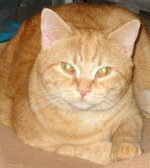 Riley – 1 year, 9 months. Male Tabby, orange shorthair.
Riley – 1 year, 9 months. Male Tabby, orange shorthair.
Unlike your brother Sparky, whenever someone knocks on the door, you run away and hide. What are you afraid of?
Riley’s response: You guys are too trusting. You never know who’s gonna be at the door. It could be a big cat-eating monster for all you know. Running away and finding a good hiding place is the safest thing to do.
You’re always watching for moths, and when I go outside and catch one for you, letting it loose in the house, you’re pretty adept at snagging it. After you play with it for a few minutes, you gobble it down. That’s pretty yucky, isn’t it?
Riley: Are you kidding me? Those things are delicious. Tasty! Yum!
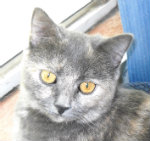 Holly – 1 year, 9 months. Female Dilute Torte shorthair.
Holly – 1 year, 9 months. Female Dilute Torte shorthair.
You seem to be the most unique of all five feline residents here. Sparky’s in my face mostly around mealtime, but when you’re awake, you follow me around for quite awhile. I know one of the reasons you do it is waiting for me to use the laser pointer, which you love to chase. But why do you enjoy it when I pour sand into the litter boxes? You’re one big dusty mess when you step out of the box. Why do you love to jump in and swing at each grain of sand?
Holly’s response: I love it when that sand is pouring over my head. It’s such great fun to try and catch each granule.
One more thing. When we go to sleep at night, you jump into bed and place your head under my hand so I’ll pet you. You do the same with Josephine. But during the day, when either of us reaches down to pet you, you duck and try to avoid our caress. And when we do manage to pet you, you lick furiously at the spot we touched, as if to scrub away imaginary germs. What’s up with that?
Holly: Hey, don’t take it personally. One can’t be too careful. Germs are everywhere. I see you and Josephine washing your hands all the time.
I guess you’re right. You’re all amazing! Thanks, everyone! #
Social Angst (9/2/14)
Last week we had broached the subject of certain fears people have, of what terrifies, frightens or at the very least causes severe uneasiness for them. One not uncommon complaint among many individuals is social anxiety.
Heading the list of social anxieties is of course agoraphobia, which as translated from the Greek means “fear of the marketplace.” This involves an intense fear and anxiousness of any place or situation where escape may not be so readily available. So-called agoraphobics will go to great lengths to avoid situations where they would be alone away from home; traveling in a car, bus or airplane; being in a crowded area; or being on a bridge or in an elevator.
According to Psychology Today, “…Endurance of such situations can put a person with agoraphobia under great stress, and a panic attack may result. Such high discomfort and stress may require another person's company in such situations.
“Agoraphobia often accompanies another anxiety disorder, such as panic disorder or a specific phobia. If agoraphobia occurs with panic disorder, the onset is usually during the 20s; women are affected more often than men. Approximately 1.8 million American adults age 18 and over (about 0.8 percent of people in this age group in a given year) have agoraphobia without a history of panic disorder.
“In panic disorder, panic attacks recur and the person develops an intense apprehension of having another attack. This fear – called anticipatory anxiety or fear of fear – can be present most of the time and seriously interfere with the person's life even when a panic attack is not in progress.”
For the record, wife Josephine and I are not agoraphobics. One might better classify us as homebodies. We derive much pleasure and comfort staying at home and playing with our five kitties, as well as pursuing our respective hobbies. Sometimes, however, situations arise in which we find ourselves obliged to “go out into the world” and mingle with others.
The other day, our friends Chris and Dan dropped in on us unexpectedly for a social visit. Despite the lack of a heads-up, we were happy to see them and quite enjoyed several hours of catching up.
From time to time Brian, Jo’s youngest, along with his main squeeze Michelle, will also come by for an impromptu visit. Their heads-up is usually a phone call originating from our driveway.
But I digress.
During our recent visit with Chris and Dan, who reside in Hendersonville, I inquired as to when the Hendersonville  Apple Festival would take place. When they responded that it was this Labor Day weekend, we all agreed to attend the event together, and did so yesterday, Sunday, which is why I’m writing this blog today, on a Monday.
Apple Festival would take place. When they responded that it was this Labor Day weekend, we all agreed to attend the event together, and did so yesterday, Sunday, which is why I’m writing this blog today, on a Monday.
With attendance in high gear and many private parking lots already full, we parked on the street a few blocks away and walked up the hill to Main Street. The crowds were already thick with activity as we made our way past the numerous vendors to the Mast General Store, where we had arranged to meet Chris and Dan.
While not an agoraphobic, I do generally try to avoid crowds. This is hardly possible when attending a festival. Main Street was closed to vehicular traffic, and the throngs of people had already filled the area. With different food aromas wafting in the air, melodious sounds of outdoor bands competing with the droning of an overhead biplane, and various vendors hawking their wares, one could literally feel the excitement.
Reminiscent of t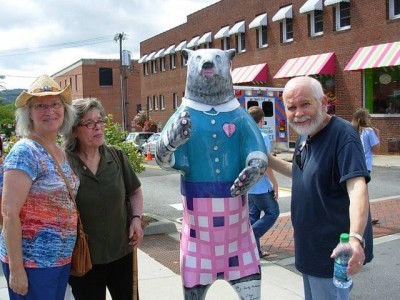 he now defunct Bele Chere music and arts festivals held in downtown Asheville for 35 years, Henderson’s Apple Festival was in full swing yesterday. Adults young and old strolling from vendor to vendor, children of all ages darting here and there, the 68-year-old fest was jam-packed as we joined Chris and Dan for our slow journey through the crowds. Face-painting, balloons, leather crafts, misting stations, foods on a stick, homemade cider – you name it – were available…and of course apples of every variety.
he now defunct Bele Chere music and arts festivals held in downtown Asheville for 35 years, Henderson’s Apple Festival was in full swing yesterday. Adults young and old strolling from vendor to vendor, children of all ages darting here and there, the 68-year-old fest was jam-packed as we joined Chris and Dan for our slow journey through the crowds. Face-painting, balloons, leather crafts, misting stations, foods on a stick, homemade cider – you name it – were available…and of course apples of every variety.
Dan purchased a hand-tooled, genuine leather belt, while Chris admired a beautiful, turquoise-colored heart necklace. Silk-screened, multi-colored T-shirts depicting the event were offered by many of the vendors, which reminded me of my Bele Chere T-shirt lost somewhere in my closet at home. Second photo here shows Chris, Jo and yours truly posing with friendly bear person. Dan, obviously, took the picture.
After buying a small bag of locally grown Gala apples, the oppressive heat finally got to us and Jo and I said our goodbyes. The peaceful, happy crowds along with the music, arts and crafts were enjoyable, but it was good to get back home.
I feel bad for those people who are so riddled with social anxiety that they could never even consider attending an event such as the Hendersonville Apple Festival.
Perhaps someday medical science will be able to change that. #
Fear (8/26/14)
Most of us are afraid of something. Some of us are afraid of more than one thing. And a few of us are afraid of just about everything. I haven’t given it a whole lot of thought, but off the top of my head I’d say I fit the second category. Conversely, my late ex-father-in-law seemed to be afraid of nothing.
For as long as I knew him, John never showed any fear of anything. My first wife told me stories of his fearlessness. For example, as a young boy, he was hit by lightning. The folks around him at the time, according to my ex, quickly dug a hole and buried him up to his neck in order to “ground” him. He later emerged and promptly went about his business as if nothing had happened.
Another time, according to my ex-mother-in-law, a flying insect burrowed into his ear canal and stayed there for a very long time. She was vague as to how the insect was finally extricated, but claimed John never complained once.
The stories about John’s lack of fear are too numerous to fully recount here. However, there is one amazing incident in his life I must include since it was also claimed by his family and all who knew him that John was impervious to pain. Proof of that was never clearer than when John visited the dentist. Before the morning was over, every one of John’s remaining teeth (at least 15) were extracted without benefit of an anesthetic.
As for me, as a child of maybe 5 or 6, I developed a fear of something hiding in the attic adjoining my bedroom. Apparently, after accompanying my parents to see a grownup movie, The Spiral Staircase, a 1940s film that featured several close-ups of the human eye, I became terrified of what I conjured up in my young mind as a crawling eye. I vaguely recall my dad taking me into the attic during the day and showing me that there was nothing sinister lurking among the rafters. However, I wasn’t convinced. I would worry each night for weeks that there was indeed a deadly eye hiding in that attic.
I am also deathly afraid of spiders. Normally, I’d say my fear could be classified as arachnophobia, except in addition to being scared as hell of the creepy-crawly arachnids, I’m also fascinated by them.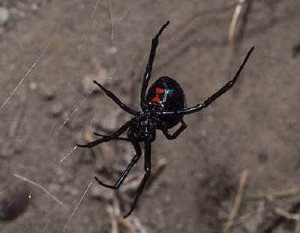 As a kid, I would locate one of those funnel webs in hedges and drop an ant into the sticky trap and watch the spider go through his routine.
As a kid, I would locate one of those funnel webs in hedges and drop an ant into the sticky trap and watch the spider go through his routine.
My Uncle Lloyd may have been the one who instigated this. Lloyd, who’d served in the CIA from its inception, advised me to face my fears.
“Go out and track them down,” he once said to me. “Find ’em and put ’em in a jar. Prove to yourself that you’re in control. Eventually you’ll lose that fear.”
He was wrong about the latter. Despite my fascination, I’m still as fearful as ever of the ugly critters. But I tried to follow my uncle’s advice. I recall one of my science teachers in high school stating unequivocally that black widows do not reside in the eastern part of the U.S. I of course knew better and decided to challenge him.
I visited the so-called “projects” near LaGuardia Airport, an area in which they had torn down a group of Quonset huts set up during World War II. Left strewn all over the ground were large sections of metal. I learned in my efforts to satisfy Uncle Lloyd’s advice that underneath those slabs of metal would be scads of insects, along with black widow spiders. I should point out that all this took place in the mid-1950s.
In an effort to disprove my high school science teacher, I caught a dozen or so of the shiny black spiders with the distinctive red hourglass on their bulbous underbellies and dropped them into a glass jar. I took the jar home, back to the three-room apartment in Queens, New York, where I lived with my mom, sister and stepfather. I punched tiny air holes in the lid and placed the jar atop my dresser.
I monitored the jar from time to time, becoming aware that the spiders were attacking each other, injecting their deadly venom until there were only one or two remaining. Never mentioning what I had collected in the jar to my family, I took it to school Monday morning.
The look on the skeptical science teacher’s face when I handed him the spider-inhabited jar was priceless. Horrified, he backed away and raised his arms defensively.
“Okay! Okay!” he said. “I was wrong. Please take the jar down to the lab.”
Vindication is sweet.
Later, they sent up one of the spiders preserved in a translucent block of some sort of plastic and passed it around in class. When I think about what I did as a kid, I shudder. Today, I can deal with a small spider outside, but it gets a little dicey for me if the spider is inside the home. Let the arachnids do their job outside, catching and eating gnats, mosquitoes, flies, etc. But inside, they have to go.
When current wife Josephine encounters the eight-legged creatures, she sprays them to death with anything handy, such as perfume, hair spray, white vinegar, whatever she can grab. When I meet up with one, I just use a fly swatter.
I’m writing this Sunday evening, August 24. Tomorrow, at 8:50, I will undergo laser surgery on my left eye, after which my vision will supposedly improve exponentially. What I’m feeling I refuse to label fear.
Would you believe apprehension? #
Author’s Note: I underwent the needed laser surgery Monday morning, August 25, which was finished almost before it started. The purpose was to clear out the membrane that had gradually morphed in to cloud my macula following cataract surgery last year. My vision is now better than ever. No more fears. Well, except for spiders.
OCD and Stuff (8/19/14)
Once again we find ourselves on a Sunday facing another deadline for the Second Thoughts blog. And as usual, whatever force controls the universe again marshals its collective agents to conspire putting one obstacle after another in the way of getting the blog written.
First, during the night an animal of unknown origin left its feces on one of two sets of wooden stairs leading to our deck. After checking on the web, it was determined that the odd-looking excrement was undoubtedly left by a raccoon. This is important to know because a raccoon’s waste can carry ringworm, which is harmful to humans. (Please note that the photo of the raccoon feces shown here is not of the actual waste left on our stairs.)
was undoubtedly left by a raccoon. This is important to know because a raccoon’s waste can carry ringworm, which is harmful to humans. (Please note that the photo of the raccoon feces shown here is not of the actual waste left on our stairs.)
Removing the feces immediately became my No.1 priority. This has to be carefully done wearing gloves. Using disposable pieces of cardboard, I tossed it deep into the woods. However, there were still two dark stains on the stairs that could carry the ringworm eggs. Despite learning that most chemicals will not destroy the eggs, I sprayed the stains with antibacterial Spic and Span. If nothing else, it made me feel better. Heat will kill the eggs, so I heated up a teakettle full of water and poured the boiling liquid over the stains.
I would have been ready to start writing the blog, but current wife Josephine wanted me to give her back the pole lamp she had left in my den. We had two pole lamps when we left Nevada in 2010, but the movers managed to break the heavy cement bases of both. So when I picked up the lamp, most of the cement pieces dropped to the floor. And again, the top priority was to heave the heavy fragments into the woods, which I did.
back the pole lamp she had left in my den. We had two pole lamps when we left Nevada in 2010, but the movers managed to break the heavy cement bases of both. So when I picked up the lamp, most of the cement pieces dropped to the floor. And again, the top priority was to heave the heavy fragments into the woods, which I did.
One would think I now had clear sailing to begin writing the blog, but they would be wrong. Wife Jo reminded me that they were calling for rain for the week beginning tomorrow, Monday, and that the lawn was already overgrown and needed to be mowed ASAP.
“Which do you want me to do,” I asked her, “the lawn or the blog?”
“Both,” she replied. “You gotta do both!”
“Wait!” I said. “Lemme go to Lowe’s and buy a riding mower. That way I can rig the laptop to sit atop the mower so I can write and cut the lawn simultaneously.”
She didn’t laugh.
Now it was time to break for lunch, which I did. Following that, I spent the next three hours cutting the lawn using my non-self-propelled power mower. Along the way, I would stop and cut out a weed or encroaching vine here and there that was choking our evergreen shrubs and trees.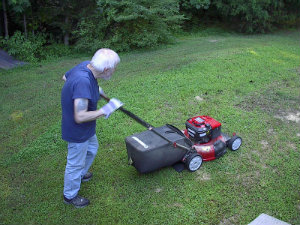
After I finished mowing, I continued to weed and prune. And then Jo was outside and in my face.
“It’s past seven and I’m starving,” she said. “When I didn’t hear the mower anymore, I assumed you’d be right in. But you’re still out here.” She paused then, probably for effect. “I’m gonna finish the leftover pasta; you’ll have to fend for yourself.”
I told her to go ahead, it’d be okay. I’d grab a TV dinner. And I did, after which I began this blog. I finished it today, Monday, 8/18.
I couldn’t help going above and beyond simply mowing the lawn. I’m a perfectionist. How could I just cut the lawn and not do something about all the weeds” It’s part of my OCD, I guess.
We all have it to a degree, you know. OCD, or Obsessive-compulsive disorder, is characterized by unreasonable thoughts and fears (obsessions) that lead you to repetitive behaviors (compulsions).
Most of us don’t let it control our lives, myself included. But I do insist that labels on whatever I have in my bathroom medicine chest all face left. When I take any of the drops I have for my eye pressure, I knock twice with the vial on the counter before applying to my eyes. You can imagine how much I laughed when I watched Jack Nicholson go through his bathroom ritual in the film, As Good As It Gets. His behavior certainly was excessive, but I did relate.
I’m sure each of us has a few rituals we go through on a daily basis. As long as we don’t let it take over our lives and govern our every move, no harm done.
Aforementioned wife Jo 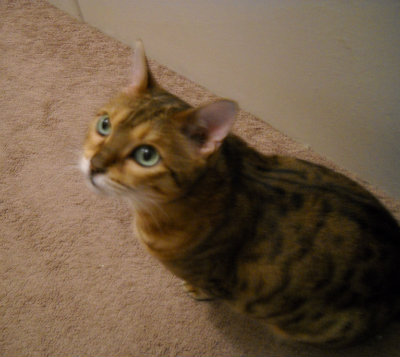 accuses me of causing her OCD. She claims I make her put items back in the cupboards, refrigerator and pantry closet in the kitchen in exactly the spots they were taken from. While this is first of all a stretch because there is no way I can “make” her do anything she doesn’t want to do. Over the years, I’ve simply asked her not to put things I use in different places, which may make it difficult for me to locate.
accuses me of causing her OCD. She claims I make her put items back in the cupboards, refrigerator and pantry closet in the kitchen in exactly the spots they were taken from. While this is first of all a stretch because there is no way I can “make” her do anything she doesn’t want to do. Over the years, I’ve simply asked her not to put things I use in different places, which may make it difficult for me to locate.
Jo does other things that might be construed as OCD, such as the way she takes her meds, but she maintains that what she does is just following her doctor’s instructions or suggestions by the pharmacy.
Frankly, seniors – old coots like us – need all the help we can get. At the risk of being placed in the same category as TV’s “Monk,” it’s important to keep a set routine for where we put things we use regularly. We also try to maintain a set routine for mealtimes. We try to have dinner no later than 7 p.m., though for one reason or another, we’re not always successful.
The other evening we decided on takeout. It wasn’t planned, just a spur-of-the-moment thing. As a result, I never brought out my pillbox and consequently failed to take my nighttime pills. This occurred despite the fact that I have to inject insulin before each meal. Once again this verifies how important it is to stick to a routine.
Jo also claims one of our five cats, Cisco the Bengal, has OCD. She may be right about that. Cisco constantly patrols the kitchen and bathroom floors, licking up and eating every little speck he finds, no matter what it might be. Quite simply, he likes a clean floor and will not tolerate any unauthorized “spots.”
Yes, Cisco might have been more aptly named “Monk.” #
Vinnie the Contractor (8/12/14)
I am writing this installment of Second Thoughts on Sunday, August 10th, which happens to be not only our 18th wedding anniversary but also my sister Barbara’s birthday. Barbara is two and a half years younger than me and claims to be celebrating her 39th, which creates a dilemma since I’m now 75.
In any event, Barb and I got to talking and somehow my first house in Mohegan Lake, New York, came up. Barbara waxed poetic over what had been essentially a modest cottage with three bedrooms, one of which was a converted enclosed porch, and a pine-paneled living room with vaulted ceiling. The land totaled less than a quarter of an acre, but foliage-rich landscaping surrounded the home, which included a large, wrought-iron-railing-enclosed patio connected to the back. Incidentally, when I went to Google Maps to snap a picture of the house off the computer monitor, I was surprised to see that the current owners got rid of a lot of the rich foliage and put in a driveway. It still looks deceiving from the front as it is much more spacious than it appears.
It was wonderful that first year bringing in a really tall Christmas tree, knowing we had enough room that we didn’t have to cut it down to fit. A far cry from the snug four-room apartment we had lived in for so many years back in Flushing, Queens.
Anyway, our conversation got me to talking about how I had a lot of  work done to make the small house more livable for a family of four. This of course brought to mind Vinnie the contractor. I don’t recall the chain of events that led to my hiring Vinnie. This all took place sometime in the early to mid-1970s. There were no home computers, no Internet, no Angie’s List. All we had besides word of mouth was the local newspaper, something called the Pennysaver, and various bulletin boards located around town. However I got Vinnie’s name, I did indeed hire him as my contractor.
work done to make the small house more livable for a family of four. This of course brought to mind Vinnie the contractor. I don’t recall the chain of events that led to my hiring Vinnie. This all took place sometime in the early to mid-1970s. There were no home computers, no Internet, no Angie’s List. All we had besides word of mouth was the local newspaper, something called the Pennysaver, and various bulletin boards located around town. However I got Vinnie’s name, I did indeed hire him as my contractor.
From the beginning, Vinnie was a piece of work. A short, stocky man originally from Italy, what he lacked in fluent English, he more than made up for with his knowledge and expertise. Essentially, I hired Vinnie to put in a stairway to the full basement, which I then had him panel. The home, which was built on a small hill, had been a small cottage in which the original owners lived during the summers only, returning to their primary home in Yonkers for the winter. If one wanted to go to the basement, they had to go outside and walk down along the side of the house around to the rear and enter through a back door.
In addition, I wanted half of the large attic turned into a room that would be my den. Since the only way one could access the attic originally was through a trap door in the hallway ceiling where two bedrooms, kitchen and living room all met. To get to the third bedroom (enclosed porch), one had to go through the second bedroom.
The space under the enclosed porch (converted bedroom) was open on two sides. We later asked Vinnie if he would be able to enclose this space by adding walls and pouring a cement foundation.
“Si, si!” Vinnie happily assented, gesturing wildly in the air. Withdrawing a small notebook from his back pocket, Vinnie proceeded to do some brief scribbling with a stubby pencil he kept tucked behind his ear.
“How much more is that gonna cost me?” I asked, trying hard not to show concern. Vinnie just smiled and shook his head. “You no worry,” he said. “I do good job.”
After that there was a flurry of activity. Everywhere one turned, it seemed there were workmen. All at once there were large, gaping holes in the floor and ceiling. The place was a veritable beehive of activity.
And then, suddenly, one morning there were no workmen and no Vinnie. I called the number I had for Vinnie. No answer and no message. I kept calling, day after day. There were still huge holes in our main floor and ceiling. At one point, I stood in the center hallway where most of the rooms met and looked up through a jagged hole in the ceiling and into the eyes of one of our cats who stared down at me from the attic, thrilled at being able to romp around in previously unexplored territory.
We were exasperated at the disappearance of our contractor. What a mess. Where was Vinnie? What in the world had happened to him and his crew? We were at wits’ end.
And then one morning I woke up to the sound of multiple hammers banging away, and saws buzzing through wood. Vinnie was back! I thought. I threw on my clothes and ran down the hill to find Vinnie barking orders in Italian.
“Vinnie!” I said loudly, almost shouting. Vinnie turned and smiled. “Mister David! How you doin’?”
“Whaddya mean, how am I doin’? What the F– Where the hell you been?”
“Oh. I take leetle vacation. Go to Vegas. It okay...me do good job here. Finire.”
It was difficult staying angry. Vinnie was one of those naturally lovable people you just can’t stay mad at…like a playful little puppy that had just peed on your favorite chair. At a point midway through the contract period, one of the workmen dropped something that cracked the toilet bowl in our main bathroom. Vinnie assured me that it would be taken care of and replaced, and it was. But I noticed later in the bill’s itemization that we actually paid for it. Of course, with lovable Vinnie, I let it slide.
True to his word, Vinnie and his crew did a lot of work, most of it excellent. At one point he called me down to the space he was enclosing. He pointed out that they had discovered access to our septic was directly underneath the enclosed porch, which was now my son’s bedroom. I was horrified, but Vinnie said he would make sure a circle of dirt was left to provide access should it ever be needed. I knew that wouldn’t happen for a very long time, especially in light of our having had new fields recently put in.
I had paid Vinnie a lot of money up front, and again during the time he was working there. Thousands. When he was nearly done, we owed him maybe $800. My last request involved paneling the master bedroom, which included new window frames. However, when I inspected the job, I noticed a crack running through the windowsill of one of the two windows that looked like the San Andreas Fault.
I still owed Vinnie a few hundred dollars more and used this as leverage when I called to tell him we had a problem with the last work he did. He said he’d be right over. Later, when I took him into the bedroom and showed him the windowsill, he responded by saying “No problem. I fix.” He then whipped out his hammer from his hip and drove a huge nail into the sill.
“There!” he exclaimed, grinning proudly. “All fixed!”
“What the hell is that, Vinnie?” I said.
Vinnie just kept grinning, leaving shortly after that. I held back and never paid him the several hundred we owed him, and as far as I know that big nail is still embedded in the cracked windowsill.
Vinnie did a lot of work on that little bungalow, most of it exceptional. Despite his eccentricities, he actually transformed it into something that, when we sold it years later, tripled our investment.
When I think about the cracked windowsill nail today, I consider it his signature. #
The Y Chromosome (8/5/14)
Editor’s Note: Time for a break. This week’s blog reprises the premiere installment of Second Thoughts that initially ran in March 2012.
It’s a funny thing about memory, how it can barge in on one’s thoughts without warning. I’ll be sitting here in front of my computer monitor, for example, typing away and – Wham! – there’s my late father, his smiling face and affable personality engulfing me with a familiar warmth I can still experience today.
Or I’ll be tooling along in my old Hyundai Sonata, or standing in line at Ingles in Mills River, or picking blackberries in the yard, or taking a shower, and suddenly, without notice, my son has taken over my head.
Sometimes I see my son as a little boy, racing backward to catch a baseball I’ve thrown too far; or speeding down the sidewalk on his tricycle, defying gravity as he executes sharp turns into neighbors’ driveway s; or sitting up in bed on Christmas Eve, his young eyes opened wide as he talks to the neighborhood “Santa,” telling him how he’s been “an excellent boy.”
s; or sitting up in bed on Christmas Eve, his young eyes opened wide as he talks to the neighborhood “Santa,” telling him how he’s been “an excellent boy.”
Fathers and sons. There is a very special bond here, a bond that goes beyond science. The so-called Y chromosome is passed only from father to son, but there is a connection between the two that transcends the science of genetics, a copula that really is spiritual in nature. A mother and son, a father and daughter – these are strong family ties. But a father and son are forever linked by a seemingly magical cord that can never be broken.
My father died in 1976. It has been nearly 38 years since I last saw him alive, but when I think of him, it’s as if he were bigger than life, filling my head and my heart with his buoyant spirit.
My son and I have been apart without contact for many years now, for reasons – real and imagined – that should never be. But often I let his spiritual presence fill my heart and mind. I see him at all ages. He is, in my own virtual reality, a child seriously at play, and then an adult, intelligent, quick-witted, insightful, opinionated, sure of himself.
My dad is gone, and my son has gone his own way, which makes me the father-son in the middle, bereft of any meaningful contact with either end of the Y chromosome.
This is difficult to bear.
There are goals in life all of us hope for, strive for, work hard for to achieve. Some are harder than others to realize.
I cannot bring back my father. He has moved up to the next plateau in the collective destiny of humankind. But I will never give up the hope that someday, somehow, my son will come back into my life.
I remember all too clearly when he went away to college. I drove him to the station and we said our goodbyes. I stood back and waited until the train lurched into movement. I looked for him in a window, to see him one more time before he embarked on that important leg of life’s journey, but I could not find his face.
I remember a panic feeling in my stomach as I ran back to the car. I drove like a madman to the next railroad crossing in an effort to beat the train. And I did.
I got out of the car and stood there, watching every window as each car rolled past the crossing gate. Standing there, I watched the train shrink into the distance. I never did see his face in a window that day.
He never saw the tears of love in my eyes, either. #
Cost of (Gasp) Living (7/29/14)
Browsing the meat section of our local supermarket, I was somewhat surprised to see that the prices had jumped from the last time I had been there. Now, one of the ways we try to maintain our good health these days is by not eating a lot of red meat. However, every once in a while I get the urge to sink my teeth into a thick T-bone, or bite into a juicy hamburger. After all, how often can one dine on chicken? Yes, there are a number of ways in which to prepare it, but in the end chicken still tastes like chicken.
I remember back in the ’50s, my mother used to send me to the butcher shop around the corner from where we lived. I’d be playing in the street, either stickball or curve ball, or maybe touch football. She would holler my name out from the window of our third-floor apartment and I’d stop whatever game I was playing and run over to the sidewalk just below our window.
“Yeah, Mom,” I would yell back. “You want me?”
“Yes, dear boy,” she’d reply. “I want you to go to the butcher’s and get  a pound of ground round.” Mom was always fussy about food. She would never buy just plain chopped meat. Ground round was more expensive, but it did have a better taste, and it was leaner.
a pound of ground round.” Mom was always fussy about food. She would never buy just plain chopped meat. Ground round was more expensive, but it did have a better taste, and it was leaner.
“Here’s the money,” she would call down to me, dropping maybe four quarters wrapped in a wad torn from a paper bag. In 1952, the price of a pound of ground beef was around 59 cents. Ground round was maybe 10 cents more. After I retrieved the wad of quarters, Mom would always add some more specific instructions.
“Make sure he grinds it in front of you,” she’d shout. ”Don’t let him go in the back. And tell him to put it through the grinder twice!” I’m not sure what the purpose of grinding it twice was all about, but Mom was adamant about that. And the butcher was just as adamant about being annoyed.
In the summer of 1952, I was 13, but I was certainly aware of what things cost. A comic book was 10 cents. Try and find one today for less than $2.95, and many have a price tag exceeding that. The cost of living was of course considerably less than what it is today, but the average salary is considerably higher today than it was then. However, some would say salaries have not kept pace with the cost of living. I’m not going to try and do the math, but I suspect they may be right.
In 1952, you could purchase a modest house for an average price of $17,000. That same house today would set you back around $144,000.
The average annual wage in 1952 was somewhere between $3,000 and $4,500, depending on which source you use. Today’s equivalent is about $25,000.
You could buy a new car in 1952 at an average cost of $1,700. That new car today would cost you about $14,000. Gas for that car in 1952 was 20 cents a gallon. You needn’t be reminded of what gas costs today.
The price of a gallon of milk in 1952 would run you 96 cents. A loaf of bread was 16 cents, and a pound of coffee was about 37 cents. The word “pound” is emphasized here because today’s prepackaged coffee weighs less than that. The house brand we purchase at $4.78 is sold in a can weighing 11.5 ounces.
And if you mailed a letter in 1952, the first-class stamp would cost you a whopping 3 cents!
At 13, I remember buying Pepsi because you got a full 12 ounces in the bottle, for a nickel. I also liked Coca-Cola, but the original bottle was much smaller than other sodas. And for another nickel, I could get a large bread pretzel that was filling and lasted a long time.
Life was different in the 1950s, not only because things cost less, but different in that we didn’t function day to day as we do now. We didn’t have the big superstores like Wal-Mart in which to do all our shopping, including non-grocery items. True, there were some small so-called supermarkets that sold various groceries, from meat to vegetables. But in the early ’50s, if you wanted meat, you went to a butcher. And in our New York neighborhood of Woodside, Queens, if you wanted fresh vegetables, you went  to Smiling Bros., a small chain that sold nothing but fresh produce.
to Smiling Bros., a small chain that sold nothing but fresh produce.
This reminds me of a true story my mother related to me. She said she had gone to the Woodside Smiling Bros. store on Roosevelt Avenue (the recently taken photo shown here is not of Smiling Bros., but is approximately where Smiling Bros. was back in the early 1950s) to purchase some fruit and vegetables. She had wanted some bananas but felt that those on display were a little too ripe. She asked one of the clerks, all of whom wore these long white “butcher” coats, if they had any greener bananas in stock. The man disappeared into the back room of the store, reappearing a few minutes later carrying a large “stem” of green bananas. To my mother’s utter horror, when the clerk turned to place the fruit into the bin, a huge black tarantula crawled its hairy way across the man’s back.
Mom said she apparently went into shock, unable to speak. She finally jabbed at the man as she shrieked a loud warning. The clerk glanced over his shoulder and actually laughed, brushing the large multi-legged creature to the floor. He mumbled something about “pests” as he smashed it with his boot.
Like I said, day-to-day life back then was a lot different. #
There’s a Cat Fight in My Head (7/22/14)
Editor’s Note: The following guest blog was written by my wife and co-author of Stardust Dads, Josephine C. George.
Some folks swear there’s a miniature devil in red who sits on their shoulder, whispering and encouraging them to behave in ways they shouldn’t. I used to think those folks had quite an imagination. But that was before I found myself listening to a pair of high-spirited cats who have settled inside my head. It all began when I was professionally advised to quit smoking.
“You can do this,” I heard one cat state with passion. She’s the feline who thinks I can do anything and everything. She constantly harasses me to strive for perfection, and even demands an occasional miracle or two. Her intentions are admirable, but more often than not, way beyond my control. I call her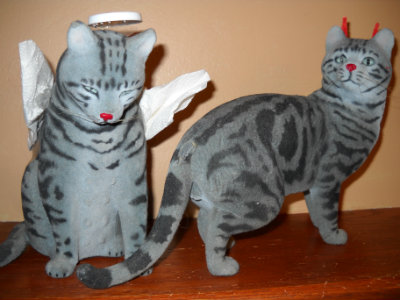 Candy, though choosing the name of You-can-do-thisa would have worked just as well.
Candy, though choosing the name of You-can-do-thisa would have worked just as well.
“I can quit smoking,” I answered, responding to her sugar-sweet words of encouragement, forgetting that my response would most likely provoke the other cat.
Sure enough, Nickie, the one I named after my long-term addiction to nicotine, shouted, “Hello? So how many times have you tried to quit smoking...and failed?”
I remained silent, knowing Nickie would have more to say. And she did.
“Let’s see,” she said with a mocking tone, “you went the cold turkey way...gobble, gobble; tried hypnosis...woo, woo; and acupuncture...ouch! You plastered nicotine patches on your arm for three months...for nothing, and even failed the five-day withdrawal program back in the ’70s. Hah!”
With that old news brought blatantly to my attention, I momentarily questioned my goal to quit smoking and wondered what I could possibly do differently today to overcome those previous failures. Wouldn’t the fact that I had been diagnosed with an inherited and incurable medical condition be reason enough for quitting?
Candy began shouting and cheering, “Yes. Yes, you can quit. You can do it.”
Nickie shouted back, “No-o! I just proved she can’t!”
I put my hands over my ears, hoping I could block out their bickering. “I have to quit smoking,” I cried. “Are you listening to me, Nickie? It’s time. I have to let you go.”
“But...but, I’ve been with you for almost fifty years. Why that’s longer than you’ve known your three adult sons. And your current husband. I’ve been with you through everything. Are you hearing me? I’ve always been there for you.”
“Nickie...please. I know you’ve been with me for most of my life. I remember when we met. I was twelve. My father kept a carton of cigarettes in a wood-stained box that hung on our dining room wall. And when I pulled out a pack from the opening at the bottom, the next pack would drop down. That’s when you first seduced me, Nickie. I’d take a pack when no one was looking and then go off into the woods to smoke with my friends.
“You made me feel like I fit in with my peers. But if you recall, when the graduating class of 1964 celebrated their thirty-year reunion, I didn’t attend. Why? Because it was you, Nickie, who insisted you were my only everlasting friend; and it was you who claimed I couldn’t cope with the nonsmoking airports, airplanes, and hotels... or be comfortable in the company of nonsmokers.”
“Ah-hah! And the truth will set you free,” Candy cheered. “Free from nicotine. Free from Nickie.”
“Aw...you won’t give me up,” Nickie snapped back. “You know how much I mean to you. Why you can’t even admit to yourself that you really ‘want’ to quit. I only hear you saying that you ‘have’ to quit.”
“Do you hear yourself, Nickie? Don’t you care about my well-being, my health?” I asked. “You don’t, do you? It’s all up to me now. Me against you, Nickie. And which one of us do you think is stronger, smarter, more determined? Me or you? The answer is: It won’t be you. Never.”
“Shall I remind you again of your failures?”
“No, Nickie, that won’t be necessary. I’m beginning to see those failures as stepping stones. Like the time when I was involved with the ‘cold turkey’ program. My first-born son had been running a high fever on and off for weeks until he finally had to have surgery. I only conceded to your nicotine because I chose to focus all my attention on him. In my mind, that was an indisputable decision, but a stepping stone nonetheless.
“As for my experience with hypnosis, you know damn well it turned out to be more than what I’d paid for. The hypnotist turned out to be a sex offender. Even his receptionist admitted to me that I wasn’t the only one he’d made sexual advances to. And you remember what the attorney told me after I’d tried to get this pathetic pervert put away. She told me that I couldn’t do a damn thing about it because it was his word against mine; and he could even sue me for damaging his reputation if I pursued the matter. That experience was nothing but another stepping stone.
“And what about the time I tried acupuncture? It just might have worked if I hadn’t been left alone in that room with all those long needles sticking out of me, and my not understanding how the tingling sensation and my feeling as though I was going to pass out was a normal reaction. But this wasn’t explained to me and I’d panicked. I didn’t fail. They failed to communicate. Another stepping stone? You bet.
Nickie was careful not to mention the five-day withdrawal program again. He knew how I had attended that program right after my father was diagnosed with cancer. I wanted to be there for him as a nonsmoker because it was the healthy thing to do...for both of us. But right after Dad’s surgery, the cancer spread rapidly and within weeks, the doctor gave him only 48 hours to live.
“You needed me badly then,” Nickie replied. “I was there for you.”
“Damn it, Nickie. You knew I was vulnerable and my grief was unbearable. How dare you make me think that satisfying my nicotine addiction was all I had left to lean on.
“And I almost got away from you when I wore those patches day in and day out. I lived without you for three months. Not one puff of you did I take, though you tried like hell to seduce me. So I ate...and ate...and ate until I’d gained more than 10 pounds. You knew when my supply of nicotine patches ran out, and I could no longer fit into any of my clothes, that I’d go back to smoking again.
Indeed, I believe all my yesterdays were stepping stones. I’m no longer a two-pack-a-day smoker. And aside from the madness of nicotine addiction, smoking only half a pack of cigarettes today costs more than when I smoked two packs a day fifty years ago. Yikes!
Today I’m ready. I quit! I’ve smoked my last cigarette!
And, tomorrow…yes, tomorrow…I’ll do it again! #
A Cat’s Tale (7/15/14)
Editor’s Note: The following guest blog was written by our oldest cat, Sparky, a 12-year-old Tabby/Maine Coon, in his own words.
I have to go all the way back to the beginning, to Las Vegas, Nevada, where I was born and raised. The earliest moment in my life that I can remember was being tossed around like a football among a bunch of kids. Next thing I know, I’m being carried in the arms of a heavyset woman through a pet store. She  wasn’t trying to hurt me, but I don’t think she knew her own strength because it felt like she was holding me way too tight.
wasn’t trying to hurt me, but I don’t think she knew her own strength because it felt like she was holding me way too tight.
I kept yelling as loud as I could, hoping someone would hear me and save my little kitten body from being squeezed to death until my eyes popped out. That’s the first time I ever laid eyes on the man and woman who would later adopt me and become my mom and dad.
The man had a white beard, and when he spoke to me for the first time his voice was soft and gentle. The lady had this long dark hair, and the kindest brown eyes. I took to them both right away.
Anyway, it looked as if the heavyset woman was taking me to the section in the store where they find homes for stray or abandoned animals. I dreaded being locked up in a cage and was relieved when the man and woman said something to the heavyset woman and took me from her.
Next thing I know, I’m in the dark-haired lady’s arms and we’re in this big cage that moves very fast. I looked out through a window and saw trees and buildings and people all moving by very quickly. I was really scared.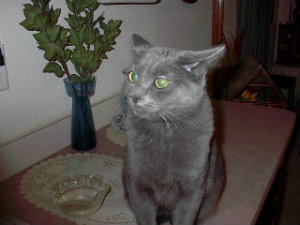
Then we were in a nice, beautiful house where they put me in this room and closed the door. I didn’t much like being locked up, but it was a lot better than being a football. I also noticed a bowl of water and a dish with dry, crunchy morsels. I realized I was hungry as I gobbled up some of the food, and then washed it down by lapping up a bit of the cold water. There was a section of floor in the room that was very soft. I curled up on it and went to sleep. It had been a long day.
I was startled awake by this loud scratching on the door. That’s when I learned that there were two other cats living in the nice house: a big, dark cat they called Cricket, and a beautifully colored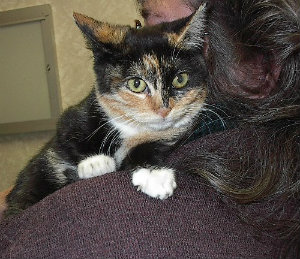 Tortoiseshell they called Ashley.
Tortoiseshell they called Ashley.
I sniffed both of them from under the door and liked the way they smelled. The bearded man, Dad, opened the door then and I came face to face with Cricket. He kind of nudged me and I rubbed up against him. We became instant friends. The other cat, Ashley, not so much. I mean, she wasn’t aggressive or anything, so I didn’t have to worry about being attacked by her, but she was kind of standoffish, if you catch my drift.
Mom and Dad started calling me “Sparky” and that became my name. My life was good after that. Plenty of tasty food and treats, and cold water was always available. The following year, another cat joined our group. Cali was a cute little abandoned Calico that Mom and Dad rescued. As she grew, she began bulging out at the sides. Her semi-long fur coat always seemed to need grooming and she took on this scruffy appearance. She kept to herself and wasn’t very friendly with the rest of us. She did, however, seem happiest when Mom or Dad would stroke her, comb her fur, and generally pay attention to her.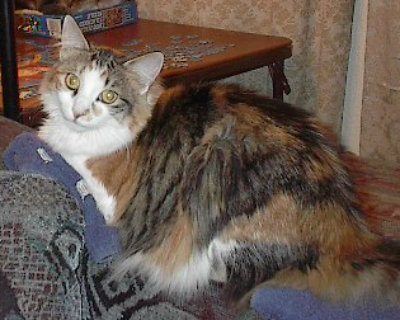
And that’s the way things went for several years, until the day Dad brought the Bengal cat home in a carrier. They called him “Cisco,” a full pedigree Bengal. He smelled funny, different from what a regular cat smells like. I didn’t mind it at all, but Cricket was beside himself. He hissed and growled if Cisco got anywhere near him, and wound up staying under this one chair in the living room and not moving anywhere else except to eat and use the litter box. Ashley had taken a shine to Cricket and followed him everywhere, so the two stayed together in the one spot while Cisco roamed the house.
And then, suddenly, Cricket and Ashley were gone. A good thing, too, because I think at some point the Bengal and Cricket would ultimately have battled each other to the death. I learned later that they were given to a local farmer who needed some good mousers for his barn. I felt better after hearing that because I know they’d both be in their element chasing barn mice on a farm.
Right after that, things felt a lot different. Not only because there were just us three cats left, Cisco, Cali and me, but because I felt something was in the air, something about to happen that was life-changing.
It was sometime in late November 2009. The semi-long fur on the back of my neck stood up when I realized  that almost overnight, piles of boxes started showing up in every room. As I lay there stretched out on the beige carpet of the living room, near the vent that gently blew a stream of warm air, I tried to figure out what was happening. I heard strange words like “retirement,” “cross-country trip,” and “dog cages.” I found it difficult to sleep as I wondered where “North Carolina” was.
that almost overnight, piles of boxes started showing up in every room. As I lay there stretched out on the beige carpet of the living room, near the vent that gently blew a stream of warm air, I tried to figure out what was happening. I heard strange words like “retirement,” “cross-country trip,” and “dog cages.” I found it difficult to sleep as I wondered where “North Carolina” was.
I finally realized we were moving, not just to another house but to another state in another section of the country. My cat brain found it difficult to fully absorb all of this. The three of us cats started getting locked up in the big bathroom every day. There were lots of strange noises, lots of shouting and banging. We didn’t know what was going on exactly, if you catch my drift.
I knew that fateful day had arrived when I was taken out to a strange-looking car and placed in this cage. There was a water bowl and dry food and a small litter box. Each of the other two cats were placed in their own cages, also with food, water and litter box. Good thing, too, about the litter box ’cause I had to go right after we left.
Mom and Dad seemed a little upset by my constant meowing, but I couldn’t help but let them know I wasn’t happy about riding in a car. I guess my being upset was why I was always having to evacuate my bowels.
That first night we stayed at a motel in a place called Arizona, wherever the hell that is. Mom and Dad brought us in along with the cages and we were able to move 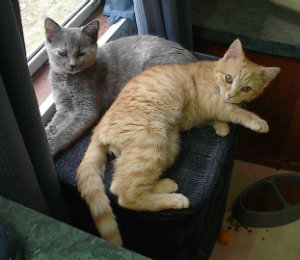 around the room freely. In the morning Cali was missing. Mom and Dad ransacked the room searching for her, finally finding her stuck inside the metal coils of the box springs of one of the beds. Apparently she had slipped through a hole in the bottom of the bed. Mom had to use scissors to cut away the rest of the lining so Dad could retrieve Cali. What a dingbat cat, if you catch my drift.
around the room freely. In the morning Cali was missing. Mom and Dad ransacked the room searching for her, finally finding her stuck inside the metal coils of the box springs of one of the beds. Apparently she had slipped through a hole in the bottom of the bed. Mom had to use scissors to cut away the rest of the lining so Dad could retrieve Cali. What a dingbat cat, if you catch my drift.
The trip seemed endless. Day after day, the same routine: driving for hours and then stopping for the night at a motel. The most exciting adventure we had occurred in a place Dad referred to as “Shawnee, Oklahoma,” wherever the hell that is. The room looked to be like all the other rooms we stayed in, but Cisco discovered something great – a hole in the wall under the dual sinks just outside the bathroom. There was a thin piece of sheetrock covering the hole, but Cisco understood something called “leverage” and was able to pry it loose, exposing this hole large enough for us to squeeze through. I followed Cisco through it and we discovered a whole ’nother world of noisy pipes and other clutter behind the rooms that seemed to go on forever. I couldn’t wait to explore.
We returned to our room many hours later, no worse for wear. Mom and Dad  were so relieved to see us that they forgot to scold us. It was a wonderful night, but I don’t think Mom and Dad were too happy about our little foray, if you catch my drift.
were so relieved to see us that they forgot to scold us. It was a wonderful night, but I don’t think Mom and Dad were too happy about our little foray, if you catch my drift.
I think it was the sixth night of the trip, the last night before we arrived at our new home. Dad decided to upgrade and rented a suite of rooms in a place called Tennessee, wherever the hell that is. The living room had a large rocker recliner, and during the night Cali crawled up inside the inner workings of the chair and, shades of Arizona, Mom and Dad had a helluva time extricating her. Like I said before, one dingbat of a cat.
We finally got to our new home in Mills River, North Carolina, wherever the hell that is, and it was stunning! Trees and grass everywhere. The house was much like the one we had in Las Vegas, but the surrounding woods around the home made the place special. I kept trying to sneak out in the months following our arrival, and then one day I finally succeeded. Dad was beside himself, chasing after me as I scooted into the woods, yelling and pleading for me to come back. That’s when I saw this huge raccoon that seemed to be coming right after me. That was all it took for me to turn around. I ran back through the dense woods, right up into Dad’s outstretched arms.
Things calmed down after that and life was good – until the arrival of the two kittens last year. Holly and Riley are sister and brother and had been slated to be euthanized. A volunteer at the local animal shelter decided to take the two under her wing until they were old enough to be neutered. At that point, Mom and Dad adopted them and my life has been hectic ever since.
Don’t get me wrong. Riley is an orange Tabby and very friendly. Holly, who’s what they call a “Dilute Tortie,” is just as friendly, but both have way too much energy. I’m 12 years old now, a senior cat, and I need my long naps. That’s hard to do with the two kittens around, if you catch my drift. #
Stupidstitions (7/8/14)
You may or may not have someone in your family who is superstitious, but certainly you’ve known someone in your life that was. Perhaps it was a close friend, or even a friend of a friend. But relative, friend or simple acquaintance, you’ve certainly come across someone at some point in your life that held an obsessive belief in bad and good luck.
The dictionary defines superstition as a belief or notion, not based on reason or knowledge, in or of the ominous significance of a particular thing, circumstance, occurrence, proceeding, or the like. Advocates of this sincerely believe that Friday t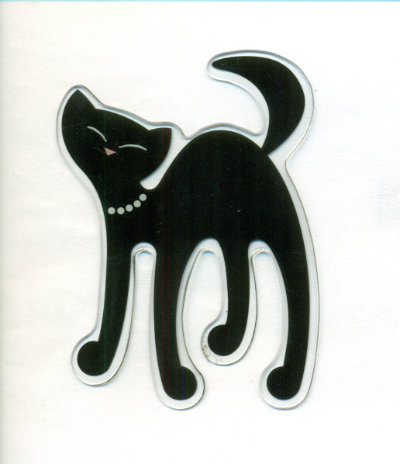 he thirteenth is an unlucky day; or that a rabbit's foot brings good luck. They’ll go into fits if a black cat crosses their path, for surely it will cause horrible things to happen. Conversely, these same people believe that finding a four-leaf clover will bring one much good luck in the days ahead.
he thirteenth is an unlucky day; or that a rabbit's foot brings good luck. They’ll go into fits if a black cat crosses their path, for surely it will cause horrible things to happen. Conversely, these same people believe that finding a four-leaf clover will bring one much good luck in the days ahead.
This reporter has had the dubious distinction of having been blessed with two such people in his life: my mother and my current wife, Josephine.
Jo is pretty calm about most common superstitious infractions. For example, she doesn’t seem to get ruffled when I bring a wet umbrella into the foyer and leave it open on the welcome mat to dry out. My mom, on the other hand, would go into a conniption fit if I were so much as to even start to open an umbrella in the house.
My wife won’t get excited if I should happen to toss a hat onto a bed, but my mother would spring into action with a reactionary time usually associated with Major League third basemen. She’d snatch up the hat and scold me for at least five minutes, warning of the misfortune I may have brought to our family.
However, there are some beliefs Jo hasn’t been able to let go of. For instance, when she is introduced to someone’s baby, or even shown a photo of a baby, if she praises the baby, she must be careful to also say “God Bless you!”
The roots of this practice may well lie in Jo’s Catholic upbringing. She can’t pass a Catholic church, for example, without making the sign of the cross.
Several other superstitious oddities Jo can’t seem to shake include throwing salt over her left shoulder if she spills some (the devil is always behind your left shoulder); or never sitting on a cement step (it may cause, gulp, hemorrhoids).
Jo and Mom would certainly agree about not standing or walking under an open ladder. In this case, we have to concur since the bad luck might indeed be an object falling on one’s head.
One of the silliest notions Jo seems to embrace is when someone drops a spoon or other utensil on the floor. Her response is always immediate: “Company’s coming.” More ominous is her strongly held belief that if an owl is facing your house, it’s a sign of an imminent death. Yikes!
Jo also believes, as my mom did, that breaking a mirror means seven years of bad luck. We have no doubt that this belief is widely held, but the reality is that it has no basis in fact.
Believing in superstitions is certainly not unheard of in the corridors of Washington, D.C., either. It’s no secret that Nancy Reagan consulted an astrologer on just about everything. According to President Reagan’s Chief of Staff Donald Regan, much of the comings and goings of the President were controlled  by the alignment of the stars.
by the alignment of the stars.
Mom was just as convinced about things and actions that brought good luck as well as bad. She invested quite a bit of her time searching for four-leaf clovers. There was one particular time when we lived in Old Westbury on New York’s Long Island. The home had a nice, large expanse of lawn sprinkled with lots of clover. Mom had gone out to the side of the house where there was a large patch of plush grass, sitting down and propping herself up with one arm while she combed through the clover. And she would inevitably find a few four-leaf varieties.
I remember that day because I had joined her to help in the hunt. I couldn’t have been more than 5 or 6 years old, but I actually found a six-leaf clover! I don’t think I ever saw my mother so excited. One would have thought she had found a million dollars. She hugged and kissed me, and held the little piece of green as if it were a diamond. She was so happy that day.
were a diamond. She was so happy that day.
As for avoiding bad luck, well, I can’t remember all of the many superstitions Mom supported, but I’m sure if I cited just a few, she’d be able to raise her hand more than once.
It’s bad luck to put shoes on the table.
Going out through the same door you entered may be a risky proposition.
Don’t ever put your bread away upside down.
Don’t place your pocketbook (purse, handbag) on the floor, or watch out!
An itchy left palm means money’s coming your way.
If you want to avoid bad luck, don’t cross your legs when you’re pregnant,
Never tell about a dream before breakfast or it will come true. (I suppose if it were a good dream, you should go for it!)
You’re asking for trouble if you set up a baby crib before the baby is born.
If you’re relocating to a new house, don’t bring that old broom with you.
Never put money on the bed if you want to stay on the good side of luck.
An inside-out shirt is good luck.
According to American folklore, dreaming of a white cat is good luck. However, should you dream of two cats fighting, expect illness or a quarrel.
In any event, Jo may be on to something when she says it is good luck for me to write Tuesday’s blog on a Sunday. Writing it on a Monday, as I’m doing right now, might not result in such good luck, she says. Needless to say, I’ve had a rough patch today. Of course, I’m not superstitious and I don’t believe in luck.
Still… #
Life… (7/1/14)
You wake up and you see the bell tower and you’re afraid, very afraid. The danger is unknown. You wonder who you are, what you are, what you are doing here. Fade…
You’re in the school yard, on a swing. The cute little girl is on the swing next to you. Sue. Sweet young Sue. This is fun. You feel close, but you’re not sure to what, or why. At home, in bed, your mother tucks you in. She sings a song…Sue City Sue…you are embarrassed, but you don’t know why. You think of Sue and you feel good. You smile. Fade…
You are outside the house, in your yard. The young boy from down the street grabs for the toy metal gun in your hand. You try to resist, try to keep him from taking it, but you fail. He is much bigger than you. Most boys are bigger than you. You try to take the gun back and wrestle with the neighborhood boy. He pushes you violently and you go down. You look up at him as you sit there on the ground. He staggers back suddenly and throws the toy metal pistol at you hard. The metal sight piece on the gun rips into your cheek, tearing the flesh away. The blood spews forth and you feel a stinging. You almost pass out. Fade…
You have no choice. The entire 4th grade class has to go to pay its respects. You remember Adam, the identical twin of George, both in your class. You are not sure what rheumatic fever is. You go into the room and file past the casket. Adam is lying there very still. You take note of how very pale he is, despite the attempt to color his cheeks with rouge. Someone hands you a card with a religious image on one side, a prayer on the other. You spend weeks and weeks reciting the prayer on the back of the card. The image of Adam lying in his coffin is engraved into your brain, into your subconscious. Fade…
You are aware of the empty feeling in your stomach. The hunger never stops. Even when they give you a stack of bread slices and a mug of hot chocolate, you still ache for more in the morning, something to make you feel satisfied. Lunch seems to never come. You pray it is Italian bread instead of sliced white bread. Victory! It’s Italian bread, at least half a loaf smeared with peanut butter and grape jelly. You tear into it with your young teeth, hoping when you’re done that the hunger feeling goes away. It is your favorite meal at the private, family-owned boarding home. It satisfies you for a little while, but dinner doesn’t help. As always, it is lentil soup with a stack of sliced white bread. You sustain a growing hatred for lentil soup. Fade…
Free at last. A happy escape from the boarding home. Mom has a new husband, and you and your sister will now live with them in his apartment. With your mom doing the cooking, you know you will never walk around hungry again. The apartment is small and cramped, and the three flights of stairs to gain entrance challenges your young leg muscles, but you are out of the boarding home and ready to be happy again. You miss  your real dad and sometimes you see his smiling face, remember his friendly, affable manner, and you wish fervently that things could be the way they once were. You try to have a good, positive attitude, but you soon find out that this new stepfather likes to drink, and when he drinks, he gets mean. He hits you, hard, for the slightest provocation, and you remember that your real dad never, ever hit you. The drinking gets worse and you run away. You do not get very far and you return. The mental and physical abuse continues. He batters your mother and you try to defend her, only to get hurt yourself. Another kid in the neighborhood just a few years older than you has come home on leave from the Navy. He looks fit and very happy. You consider the Navy. Fade…
your real dad and sometimes you see his smiling face, remember his friendly, affable manner, and you wish fervently that things could be the way they once were. You try to have a good, positive attitude, but you soon find out that this new stepfather likes to drink, and when he drinks, he gets mean. He hits you, hard, for the slightest provocation, and you remember that your real dad never, ever hit you. The drinking gets worse and you run away. You do not get very far and you return. The mental and physical abuse continues. He batters your mother and you try to defend her, only to get hurt yourself. Another kid in the neighborhood just a few years older than you has come home on leave from the Navy. He looks fit and very happy. You consider the Navy. Fade…
You hang out with the wrong crowd and you get into trouble. You find out what it is like to spend several nights in jail. It is terrifying. You think about the Navy and suddenly you find yourself early in the freezing cold morning, marching endlessly. It is not for you, but you persist. Sea duty aboard a destroyer in a fierce storm in the North Atlantic scares the hell out of you. You and the rest of the crew are all dead, for sure. But you manage to survive. Liberty in foreign ports of call is fun. Drinking is fun. However, you are tired of being told what to do and what not to do. Fade…
You are out of the Navy and working in an office in New York City. This is much better than anything you have done so far. You work hard, even late at night and on weekends. You start writing freelance on the side. The thrill of your name in print is wonderful, if fleeting. There is a marriage, and then two children, and now you think you know what it’s all about. Fade…
When your paternal grandmother dies at age 90, your father informs you that he is going to the funeral in his hometown just outside Chicago. You jump at the chance for some alone time with your dad and tell him you’d like to join him, that you’ll pay your way. You don’t tell your dad you’re broke. You go to a finance company and borrow enough to purchase a train ticket. You both share a roomette aboard the Broadway Limited. The next day, at the funeral home, you help your dad select a casket. The funeral home director tells your dad to look around in the casket room and see if something catches his eye. When the director steps away for a moment, your dad rolls his eyes and wonders out loud, “How does a coffin ‘catch your eye?’” In the morning, you are forced to stand up close and view your grandmother lying in her casket. Your childhood experience viewing your deceased classmate pops into your head. You are uncomfortable and can’t wait for all of it to be over. Years later, at your father’s funeral, it is a closed casket, and you are thankful for that. Fade…
You work ever harder, write more, and even take on a second job at night. Somehow, you even manage to fit night school in. The pressure is great, but drinking helps you to cope. The drinking eventually takes its toll, but with help you are able to overcome the addiction. Your schedule is now more than full. However, you are sober and there are rewards. The children are growing, blossoming into bright young adults as they pursue college and what lies beyond. Fade…
With the children out of the nest and doing their own thing, you sell the house and move to another state. You set up your own publishing business and work harder than you ever had before. Unhappiness prevails. There is a divorce, along with an estrangement from your adult children. Life has become painful but you go on, working harder and harder. The publication you produce every month is well-received and appreciated, but the rewards are still not there. Many of the small businesses don’t pay you for their ads, and ad sales are not what they should be. In desperation, you shut down the business, remarry, and relocate to yet another state. Fade…
You sign on with another company and find yourself working again for someone else. It is better this time. The new company treats their employees well. You throw yourself into the job and once again work hard. This time, however, your efforts are recognized. After a few years, you find time to join with your wife and write your first novel. A couple of years later, the recession hits. Your wife is laid off. To make matters worse, at five years past normal retirement, you find yourself needing eye surgery, which you go through more than once. There is a major infection and problems with the one eye, which is when you decide it is time to retire. Fade…
You return to North Carolina, setting up home amid lush woodlands. You are surrounded by white squirrels, wild rabbits, wandering turtles, hungry raccoons, scavenging field mice, and a host of other wildlife, some of them such as snakes not so appealing. The air is clean, the water clear, and the countryside comfortingly quiet, save for the chirping crickets, buzzing katydids and occasional bird calling. Fade…
In your mid-70s, you now find yourself a fully qualified senior. There are those who would claim you are elderly, but you will dispute this. Elderly will always be someone a few years older than you, even should you reach 90. You stand on your deck and look out into the mass of trees bending in the breeze. You reflect back on your life and you wonder who you are, what you are, what you are doing here.
Fade… #
Jailbird (6/24/14)
I spent most of yesterday outside mowing the lawn and doing general yard work instead of writing this blog. The reason being that yesterday was the first full day of having no rain in quite a while.
I did, however, take close to an hour for a lunch break, during which I watched a movie my current wife had on. It was a Hitchcock film I remember from the 1950s, The Wrong Man, a movie based on the real-life story of a married man who is mistaken for an armed robber.
The film is not your typical Hitchcock fare and is rather low key, yet quite compelling for its realistic approach. The Queens, New York, man accused and later convicted of armed robbery, portrayed by Henry Fonda, was a down-on-his-luck musician with a wife and two children who visits his insurance company to inquire how much he can borrow on his wife’s policy so she can get urgently needed dental work.
Two women who work at the insurance company later misidentify the man as the one who robbed them at gunpoint in a previous visit. Some of the film is shot on location in Queens, namely the Long Island City Jail.
The film gave me an instant memory jolt since I had done some “time” at what in 1955 was called the Long Island City House of Correction. The “time” I did, in addition to one night in a precinct jail, actually lasted just overnight, but it had been a scary, awful experience.
Let me take you back.
In 1955 I was 16 and, as with most 16-year-old youths, mixed up and trying to discover who I was and where I was going. In the evenings I would hang out with a group of other kids about my age. Mostly, we would just hang out in a candy store/soda fountain and listen to the jukebox, sharing imaginary exploits and relating to each other stories of incredible feats of sexual daring that would no doubt cause the Marquis de Sade to blush.
One night, for no particular reason, we spontaneously decided to take a walk through the neighborhood, an area near Yellowstone Boulevard in Forest Hills, Queens. Our haphazard route happened to take a direct path toward Queens Boulevard, on the way passing a lot partially filled with parked cars. Among the cars was a bakery truck. A couple of the older boys spotted the truck and decided it would be a grand idea to break into the vehicle and swipe a few goodies.
I think if memory serves, there were five of us. So, while three of us stood on the sidewalk playing “chickie” (watching out for the cops), two of the boys broke into the truck and grabbed a couple of armfuls of filled cookie tins. They came back out and passed the cookie tins around so that each of us carried at least two tins.
We reached Queens Boulevard a few minutes later, a major thoroughfare in Queens and much of it today 12-16 lanes wide. As I recall, we didn’t look too suspicious, hootin’ and hollerin’ as we hopped and jumped along one of the Queens Boulevard sidewalks at 1 or 2 o’clock in the morning. Two of the boys wore black motorcycle jackets, all the rage in the ’50s. My parents couldn’t afford a motorcycle jacket for me, and I doubt they would have bought me one anyway, even if they had been rich. I wore my usual uniform of the 1950s, a black turtleneck, faded Levis, and an equally faded denim jacket.
Small wonder that a black-green-and-white police patrol car, lights flashing and siren wailing, suddenly pulled up alongside us. One of the cops yelled for us to stop as he swung his door open and charged out at us, hand on his still-holstered revolver.
We all stopped dead in our tracks.
“Where’d you get all this stuff?” the red-faced cop barked as he yanked one of the cookie tins out of the tallest kid’s arms.
“We found ’em,” said one of the kids. I stood silent, by now shaking in abject fear. In my reasonably short life, I had not, up until then, ever been this close to a cop.
Two more police cars pulled up behind the first, and more cops joined the cluster. One of the cops, seemingly bigger and for some reason angrier than the others, stepped forward and smacked me across the face. Despite my face stinging from the assault, I refused to visibly or audibly react. My inner rebel would not give him that satisfaction, which obviously enraged him further and he slapped me again. Teeth clenched, I again stood there defiantly.
It was then that they hustled us into two of the patrol cars and whisked us away to a nearby police station. There, they took down our names and told us to empty our pockets. One of the guys in our clique, who hadn’t come with us, worked part-time in a drug store, and earlier that evening had given me a handful of prophylactics he had swiped. When I emptied my pockets, I had to include the handful of Trojans I hadn’t had time to stash.
“Looka here, fellas,” the desk sergeant said, “we got ourselves a regular Romeo.” I was totally humiliated. Later, they tossed us into a cell and contacted our parents. Eventually, parents of the other four boys showed up and took their kids home. But they couldn’t reach my mother and stepfather who, without a doubt, were out drinking in a local pub. I also seem to recall them not having a phone, primarily because when they did, Mom would constantly call her sister in Santa Monica, California, and run up the bill to a point where my stepfather couldn’t pay it.
I didn’t get much sleep in the cell that night, partly because of my fear and partly because of a few older youths in the next cell who’d been drinking and fighting, and were loudly boasting of their pugilistic prowess.
The next morning is a bit hazy in my memory. I vaguely recall a ride in a police van to another police station, and an interview with a detective. I remember sticking to the story that we found the cookies. I also remember being in court and seeing my mother in the court audience, pale and white as a ghost. I remember feeling guilty about what I had done to her.
Somewhere along the line, I was handcuffed to another kid I didn’t know and whisked away to the Long Island City House of Correction. There, they had me disrobe, after which they searched every inch of my body. I had put my clothes back on and was issued a blanket and small, flat pillow. One of the scariest  moments, I recall, was when I was ushered into this huge room in which there were several tiers of cells. There were prisoners standing outside their cells, draped over railings, catcalling, whistling and just generally hollering at the new prisoners coming in. It reminded me of movie scenes I had seen, but there was nothing glamorous about it.
moments, I recall, was when I was ushered into this huge room in which there were several tiers of cells. There were prisoners standing outside their cells, draped over railings, catcalling, whistling and just generally hollering at the new prisoners coming in. It reminded me of movie scenes I had seen, but there was nothing glamorous about it.
I was placed alone in a cell. Later that night, I realized the mess I was in, and I cried quietly. The guy in the next cell was telling me that the guard would come by later and ask me if I wanted it soft or hard. I’ll leave it to the reader’s imagination as to what he meant. But nothing happened that night. The next day I was back in court. I believe we had been informally charged with receiving stolen goods. But no one wanted to press charges, and we were all set free. It was my understanding that the whole incident would be expunged and I would receive a certificate of disposition. In other words, I wouldn’t have a record.
Later that year I was accepted into the Navy without incident, but in boot camp following testing in which I scored very highly in radio and sonar, I was assigned to duty as a communications technician at Imperial Beach, California; a dream assignment, to be sure. Unfortunately, when they did a background check, they had no problem determining that I had been arrested and I was reassigned to sea duty aboard a destroyer. My first job in the Navy was chipping paint. So much for certificates of disposition.
And that’s the story of my time in the “Big House.” #
Time Mismanagement (6/17/14)
Somewhere along the line I’ve lost the ability to manage my time properly; although I’m not at all sure I ever had that ability to begin with. One would think that when one has the opportunity to retire, they would also have plenty of time to organize that time.
I’m afraid that’s not the case with me.
First of all, my current wife Josephine insists I have too many hobbies. I’m not sure about that. I mean, I enjoy reading, but I wouldn’t call reading a hobby. I read a lot for information. I read a lot for enjoyment, but it takes me a long time to finish even one of the half dozen or so books I’m always starting. Not so much because I’ve started so many books, but because I’ve got so many other tasks to complete.
We have five cats and four litter boxes. The cats, when they’re not sleeping, demand rapt attention. And clean litter boxes. So when I’m not playing with one or more of the cats, or petting them, I’m cleaning t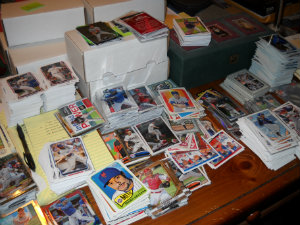 heir doo-doo boxes. Cleaning the boxes is hard on my back, really hard. Sometimes after I’ve cleaned the boxes, I have to lie down and rest my aching back. The terminology for that activity is “nap.” My current wife Josephine seems to think I take too many of them, although she hasn’t as yet decided to classify them as another hobby.
heir doo-doo boxes. Cleaning the boxes is hard on my back, really hard. Sometimes after I’ve cleaned the boxes, I have to lie down and rest my aching back. The terminology for that activity is “nap.” My current wife Josephine seems to think I take too many of them, although she hasn’t as yet decided to classify them as another hobby.
I’m kind of a news junkie, but I wouldn’t call that a hobby. I just have this persistent need to know what the hell is going on in the world. Years ago, before the advent of the Internet, newspapers were the order of the day. Today I catch some of the headlines on television, but get the meat of the news online.
I collect baseball cards of the New York Mets, and that indeed is a hobby. It takes up a lot of my time because I buy and sell on eBay to help pay for some of the costs. However, it’s not a business since I surely don’t make a profit.
I also enjoy watching Mets baseball, usually on the computer. Every now and then there’s a Mets game on TV. Games usually take at least three hours to play, so that takes a big chunk of my available time. I guess there’s no denying this being construed as a hobby.
I collect older paperbacks from the 1940s and ’50s, although I think I’ve already acquired most of the titles I want. In my pursuit of this hobby – and there is no way I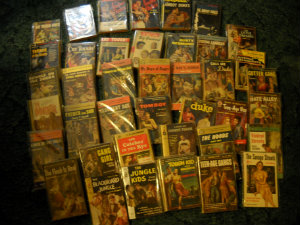 can safely state it isn’t a hobby – I’ve picked up a great many older paperbacks I don’t particularly want for my collection, but they’re neat enough to resell on eBay. (Pictured here is just a fraction of my older paperbacks collection.)
can safely state it isn’t a hobby – I’ve picked up a great many older paperbacks I don’t particularly want for my collection, but they’re neat enough to resell on eBay. (Pictured here is just a fraction of my older paperbacks collection.)
I used to collect so-called Golden Age comics – 1930s through the 1950s – but I gave that hobby up as it has become way too expensive. When I did collect them, they were usually available at auctions, flea markets, thrift stores, and yard sales, but not so much anymore. However, if you have the money, they’re easy enough to find at comic-book conventions, some comic-book stores, and on eBay.
I still have a few boxes of older comics left, extra titles that were not part of my collection, and once in a while I’ll sell one on eBay. I also still keep up with the industry, reading the monthly PREVIEWS to see what they’re publishing today. And every now and then I’ll even purchase an issue or two of The X-Files or, just for ha-has, Mars Attacks. But I wouldn’t call it a full-fledged hobby. Let’s call it a hobby in remission.
Every Sunday, as I’m doing today, I sit down and write this column, or essay, or blog, or whatever the acceptable terminology is today. After I’m done, I’ll run through it once and proof it, smooth it out, then pass it on to Josephine for criticism, positive or negative, fixing whatever needs fixing. Then in the morning I’ll go over it again and polish it some more.
Tuesday morning before noon is the deadline. That’s when I’ll post it to our website, Stardustdads.com, and I’ll add photos if I found time earlier to cobble some together. It is a self-imposed deadline and after more than two years of posts, I still haven’t missed one. The purpose is to drive traffic to the website, which in turn promotes our novel, Stardust Dads.
But lately every week there have been roadblocks that threaten to shut down my progress, which is why I don’t think I’m managing my time as efficiently as I should. Yesterday, Jo informed me that her car shuddered and shook all over when she turned it on. This prevented her from doing what she had planned, since I was out shopping with our other car.
This morning I wrote a few paragraphs of the blog you’re now reading, and then put it aside in order to go out and see if I could determine what was wrong with her car. I turned it on and it shuddered and shook like a harpooned whale. I turned it off and then on again, noticing a light with a definitive shape that stayed on when it should have gone off. At first glance, I thought it was the oil.
I turned the car off again and pulled the hood-release knob. I got out and trudged back to my tool shed to retrieve a cloth I use to check the oil in my mower. I checked the car’s oil level. It appeared to be fine.
I got back into the car and turned it on again, making careful note of the lighted symbol on the dash. I withdrew the car’s manual from the glove box and looked it up. It pictured a malfunction light that indicated a problem with the exhaust system.
That means that tomorrow I’ve got to call AAA and arrange to have the car towed to the Hyundai dealership, and before I do that, I have to call Hyundai and alert them to the imminent arrival of Jo’s crippled car.
Meantime, I have to wrap this blog up because the cats are all screaming for their dinner. Following that task, I have to bring the checkbook up to date, wrap a baseball card I sold on eBay so I can take it to the post office tomorrow, and check eBay to make sure I haven’t sold anything in the past few hours.
Oh yeah, if I get time before it gets dark, I need to run up to the garden and check on how the corn, snap peas, string beans, and tomatoes are doing. And tomorrow, after I call AAA and Hyundai, I need to cut the grass – unless, of course, it rains.
Monday note: I alerted the Hyundai dealership that AAA would be towing my wife’s low-mileage 2003 Hyundai Sonata to them sometime that morning, briefly describing the problem. I then called AAA and arranged for them to have the car picked up. Later that afternoon, following the morning’s tow, Hyundai called to inform me that the problem was not with the exhaust system, but rather with two failed ignition coils. They had to order the second coil, so the car would not be ready until Tuesday at the earliest.
It did rain today, so the grass did not get cut. Jo’s car may or may not be ready tomorrow (Tuesday). I did finally get to the post office, but I sold another baseball card and will have to go back to the post office tomorrow, after I’ve posted this blog.
Maybe I do have too many hobbies. #
Father’s Day Lament (6/10/14)
It’s difficult enough emotionally to miss someone who has left this world, but it’s a lot harder to endure the emptiness of missing someone who is still alive and only a few thousand miles away.
My dad has been gone since 1976. It took me years to stop grieving for him. I still have him in my thoughts often, and if I could have him back here among the living, to embrace him, to converse with him, to share my thoughts and experiences with him, to tell him how much I love him, I would give up any and all material possessions I own.
My son and daughter are very much alive, and I hope well, but they are indeed as much gone from my life as i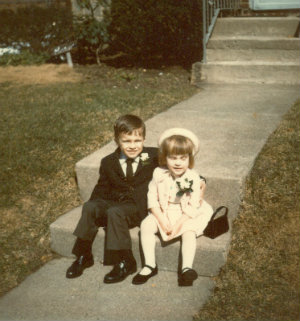 f they had been placed aboard a spaceship and rocketed off to another planet. The word “estranged” does not seem strong enough to describe the hole I feel in my heart when either of them is in my thoughts, which is also often.
f they had been placed aboard a spaceship and rocketed off to another planet. The word “estranged” does not seem strong enough to describe the hole I feel in my heart when either of them is in my thoughts, which is also often.
It has been so many years since I last saw David or Jennifer, so many that I actually can’t remember the exact number. The pain is much like being homesick, except a lot more acute.
I often think about how, if I could travel back in time, I would change some of the events that led up to our disengagement. Except I’m not really sure exactly what I would do. The split with both children began with the separation from my first wife. My son certainly voiced his opinion regarding the breakup, though I’m a little fuzzy about the details he offered as to why he was disassociating himself from me.
My daughter was not vocal at all about the split, except to say she was surprised it didn’t happen sooner. To my recollection, she never stated that she, too, was breaking up with me, yet she clearly made a point of keeping her distance from me. The rift with both adult children went on for several years. Finally, at one point, I made a concerted effort to bring my son and daughter back into my life. Jennifer responded soon after I wrote to her. (This was well before the Internet/email were firmly established.)
David responded later after he found out that his mother, along with some of my so-called friends, were reluctant to divulge his address and contact information to me. Living and working in North Carolina at the time, I was able to resume a relationship with my daugh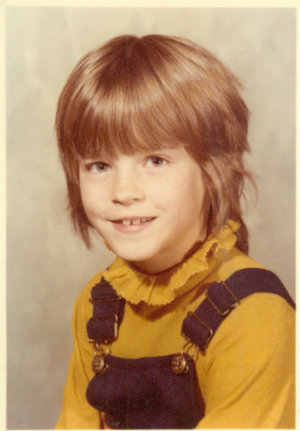 ter, who lived in nearby Virginia. But David lived on the West Coast, so we had to work at renewing our relationship via regular mail and the phone.
ter, who lived in nearby Virginia. But David lived on the West Coast, so we had to work at renewing our relationship via regular mail and the phone.
I soon remarried and relocated to Las Vegas, where eventually David and his wife would visit. By then David had sold a script he had co-written to Paramount for the Star Trek Voyager series, and published his first novel, based on the Star Trek Deep Space Nine genre. One of the Vegas hotels opened a Star Trek-themed attraction, which provided my son the opportunity of an appropriate venue for holding a book signing for his first novel.
David also continued to play baseball for fun, traveling to different cities to play other teams in his league. This brought him to Las Vegas on several occasions, which of course enabled us to get together.
Meantime, I received a call from Jennifer and the conversation seemed to go well, at the end of which she asked me for my Social Security number, mentioning something about an insurance policy.
I never heard from my daughter again.
Later on, I received a letter from my ex-wife demanding I pay her what our separation agreement called for, plus interest. This was based on a publishing venture here in western North Carolina that we finally had to shut down after eight years of effort. I had lost everything I had put into it, and then some. The agreement I had signed had been drawn up by my attorney, stipulating that if I sold the business, she would get a certain amount, and if I continued on with the venture, she would also get a certain stipend, plus interest. It neglected to m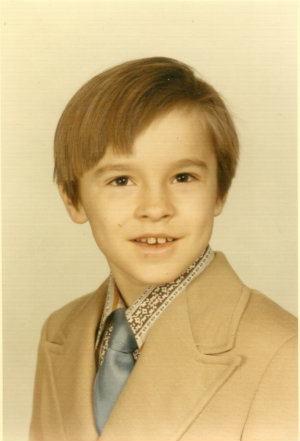 ention what would happen if we just went belly up, which is what happened.
ention what would happen if we just went belly up, which is what happened.
In the interest of brevity, my ex waited for a number of years, and when she apparently heard I had a job and had received a good raise, she sent the demanding letter, threatening me with legal action if I didn’t pay up.
I had no money to pay her then, and today I have even less. And I don’t respond well to threats.
That’s when my son called me and told me he couldn’t have someone in his life who didn’t honor his commitments.
I later sent him a birthday card, which he returned to me unopened with a letter again telling me he didn’t want me in his life. For David, there is no gray area. It’s either black or it’s white, period.
Later on, I came across a copy of the film, Paper Moon, starring Ryan and Tatum O’Neal. There had been a 1970s TV series of the same name, about a con man and his daughter on the road during the Great Depression, which Jennifer and I had enjoyed watching together. I bought a copy and sent it to her, hoping to possibly rekindle our relationship. She never responded.
This is where I am today as the country once again prepares to observe Father’s Day, a father bereft of both his adult children.
I think back to when they were young children, how amazingly precious and gifted they both were. Jennifer, the little girl with an artistic talent that so impressed my art director back in the late 1960s; who grew up and almost simultaneously tried standup comedy while earning her CPA. And David, the little boy who became unbeatable at every game he was taught; who grew up to earn his master’s in mathematical sciences, then mastered the art of the written word so well that I’ve lost count of how many Star Trek novels he’s had published (I think it’s 14). He’s even made the bestseller list of the New York Times.
As international writer Lafcadio Hearn put it:
“No man can possibly know what life means, what the world means, what anything means, until he has a child and loves it. And then the whole universe changes and nothing will ever again seem exactly as it seemed before.”
I miss my kids. #
Country Zoo (6/3/14)
Sometimes I do think we live in a kind of zoo.
Don’t get me wrong. I’m not implying that anyone’s in a cage or locked up or anything like that. No one’s on display for visitors to gawk at or feed peanuts to. But outside in the surrounding woods and in our yard, we are home to a variety of critters. Of course, for protective reasons, the cats aren’t allowed to go outside.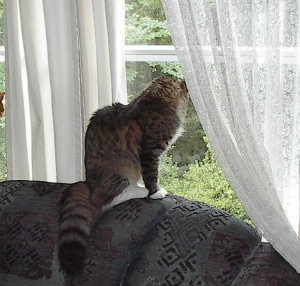 And this is just fine for most of our feline residents. Sparky is the exception.
And this is just fine for most of our feline residents. Sparky is the exception.
Sparky is our 12-year-old part tabby, part Maine Coon who lives to escape to the great outdoors. Probably the biggest reason for this is his being spoiled when we lived in Las Vegas. In that town, many of the individual properties are separated by walls. Sparky, born and raised in Las Vegas for the first eight years of his life, made it his daily top priority to slip outside and jump the nearest wall. And I guess we were pretty lax about keeping him confined, letting him do an end-around through the door on too many occasions.
One year, maybe when Sparky was about 2 years old, someone didn’t fully close the laundry room door and Sparky got out. Within a minute he was over the seven-foot cement block wall and standing eyeball to eyeball with a small puppy about the same age. Sparky had never seen a puppy, nor any canine for that matter, in his young life, and my guess is that Sparky was the first feline the puppy had ever laid eyes on.
Fortunately, I just happened to glance out through the kitchen window and spot the drama as it was about to unfold. I never hesitated. I ran out through the laundry room door, which by then was wide open, and hurried next door. Not worried whether anyone was home, I unlatched our neighbor’s gate and went inside their patio. Sparky and the puppy were still frozen in place, transfixed by each other’s unexpecte d appearance.
d appearance.
Again never hesitating for a second, I swooped up Sparky and disappeared back through the gate before the puppy could utter one bark.
Another time, Sparky got out and jumped the wall on the other side of the house, only to come face to face with another large cat of dubious heritage. Fortunately, the Spark was smart enough to realize he was on the other cat’s turf. He turned and high-tailed it back over the wall to safety.
The situation grew much more dangerous in Vegas, however, when Sparky began jumping over more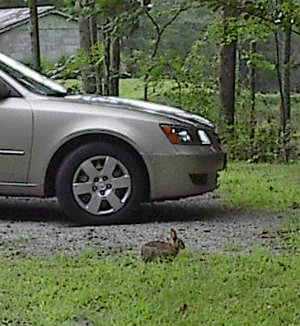 than just the wall next door. That’s when we clamped down and made sure he didn’t escape again. He had gone over the wall, and then the next wall, and then the next wall, and, well, he didn’t come back for hours.
than just the wall next door. That’s when we clamped down and made sure he didn’t escape again. He had gone over the wall, and then the next wall, and then the next wall, and, well, he didn’t come back for hours.
I drove around block after block, trying to spot him, and anxious wife Josephine went from house to house, describing Sparky to neighbors and asking if they’d seen him. Hours later, the two of us at wit’s end and worried sick, Sparky returned home. He strolled in through the door nonchalantly, looking up at us as if to say, What’s all the fuss? I was just getting some exercise.
Once we retired and relocated back to western North Carolina, Sparky got out only once. There are no walls around our house here, just one two-lane road and the woods.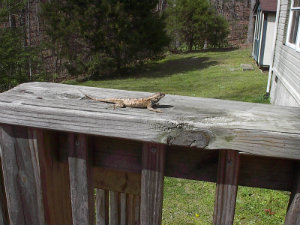 And that’s where Sparky headed, right smack into the woods, with me close behind him, calling his name over and over, pleading with him to come back. And he did! He came thrashing back through the thick underbrush and jumped right into my arms, something he’s never done before or since. Obviously he had met up with a critter he wanted no part of.
And that’s where Sparky headed, right smack into the woods, with me close behind him, calling his name over and over, pleading with him to come back. And he did! He came thrashing back through the thick underbrush and jumped right into my arms, something he’s never done before or since. Obviously he had met up with a critter he wanted no part of.
Sparky still cries through the screen door, indicating his desire to frolic outdoors, which brings us back to the central theme of this essay – living in a country zoo.
First and foremost are the squirrels, both the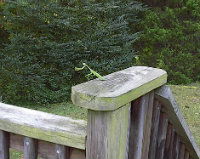 traditional gray and the more unusual white. As we have noted on these pages more than once, the squirrels come up onto our deck every morning, expecting to find roasted peanuts in the shell. They are seldom disappointed.
traditional gray and the more unusual white. As we have noted on these pages more than once, the squirrels come up onto our deck every morning, expecting to find roasted peanuts in the shell. They are seldom disappointed.
Sharing the peanuts with the squirrels are a variety of different bird species, including bright red cardinals, tiny wrens and starlings, and huge crows, which swoop down on the banisters of our deck and flutter off with their tasty bounty. One bird has even set up housekeeping under our shed’s overhang in a half-empty bag of Miracle Grow topsoil. (See Second Thoughts, 5/13/14, “Bird Watcher, Turtle Wrangler and Hapless Head Banger.”)
Also horning in on the act is a wild baby rabbit who apparently lives in a briar patch just behind one of our ev ergreen trees. He mostly dines on clover and such, but we’re sure he would just love to get into our vegetable garden for a nutritious snack or two. So far we’ve been unable to take a good photo of the young hare, but included here is one of an adult rabbit who may well be one of the baby bunny’s parents.
ergreen trees. He mostly dines on clover and such, but we’re sure he would just love to get into our vegetable garden for a nutritious snack or two. So far we’ve been unable to take a good photo of the young hare, but included here is one of an adult rabbit who may well be one of the baby bunny’s parents.
Occasionally, a chipmunk will skitter across the deck, peanut in mouth, and disappear as quickly as he had come.
Various lizards drop by from time to time, and an orange newt will make a rare appearance on the same deck, though it’s doubtful that peanuts are what it’s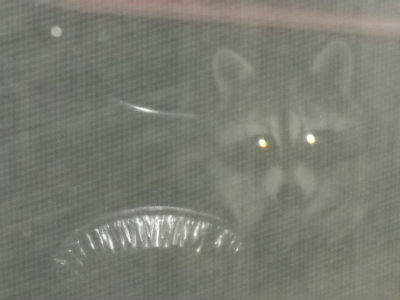 after. A more frequent visitor than the newt is the blue-tailed skink, which often shows up on the outer walls of our cement foundation. Their primary diet consists of insects and worms, which is fine with us.
after. A more frequent visitor than the newt is the blue-tailed skink, which often shows up on the outer walls of our cement foundation. Their primary diet consists of insects and worms, which is fine with us.
We also provide a home for an occasional box turtle that remains as one of our yard guests. Not so sought after is the once-in-awhile snake. Imagine this writer’s surprise when one of them chasing a mouse slithered up a pipe into the rear bathroom late at night and got caught on a sticky-trap. Yikes! (See Second Thoughts, 11/27/12, “Of Mice and Men, and Snakes.”)
Another local denizen not so welcome is the raccoon. We haven’t had the pleasure of one of these critters for at least a year or so. I always know when they’re around because I have to keep our trash cans locked up in the shed. Otherwise, these hungry scavengers will go rummaging about for food and I’ll find our garbage scattered all over the yard in the morning.
Twice we’ve spotted deer crossing our road and heading into the woods, but we won’t include them in our private zoo tally as they weren’t actually on our property.
Additional members of our country zoo, unwelcome or not, must be counted. Arachnids and insects come in all sorts of shapes and sizes. I just now stopped writing this to make a visit to the bathroom and spotted a large bug zipping across the floor. It had wings but didn’t seem as if it did any flying. I mean, this insect was almost large enough to take dancing. If we were living back in New York City, it’s a cockroach. Here they’d probably refer to it as a June bug. Well, it’s now June.
Yeah, let’s call it a June bug. #
Third-Generation Miracle (5/27/14)
Editor’s Note: The following guest blog was written by my wife and co-author of Stardust Dads, Josephine C. George.
Dear Son…
It was 1965, the year you were conceived. I remember it well.
I gained an ungracious 35 pounds, wondering why, tucked away inside me, you kept rejecting those pickles and ice cream bars.
Was it because of your impending silver-spoon taste buds? Heaven knows, you were the only kid on the block who would grill himself a sirloin steak as an after-school snack.
I recollect those first four-hour feedings, the constant changing of diapers, and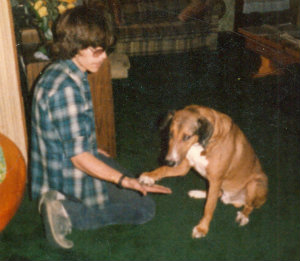 my diligent efforts to decode your cries.
my diligent efforts to decode your cries.
And I was there when you walked at 10 months of age; when you stacked rectangular blocks, long ways, at a year-and-a-half; when you recited your first nursery rhyme at the age of 2.
I look back upon our casual discussion concerning your conviction to be a fire engine when you grew up.
And I remember your dedicated decision to build a spaceship that would take you and your friend David C to the planet Mars. Every evening as you left for David C’s house, you would kiss me goodbye, suggesting that this might be your last night on Earth.
And, of course, you may well have gone off into space had not David C decided to reapply his energies to learning the guitar – which you also promptly took up.
I remember your hiding a 37-pound snapping turtle in the master bathtub….
And that reminds me of your black snake, a 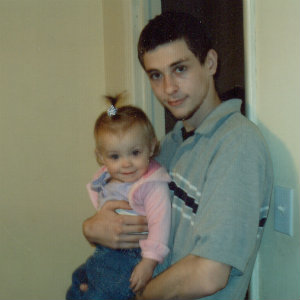 sweetheart of a serpent that slumbered in the fish tank in your bedroom. Then she had 52 little live-born snakelets that slithered one by one through the holes in the metal grid cover, until there were only 16 left.
sweetheart of a serpent that slumbered in the fish tank in your bedroom. Then she had 52 little live-born snakelets that slithered one by one through the holes in the metal grid cover, until there were only 16 left.
I recall your prematurely leaving home with Sam, your faithful dog companion; an old sleeping bag; and a cash life savings of $15. I waded through swampy terrain in the dark with nothing but moonlight and a fading flashlight to find you sound asleep, nestled between two of the most beautiful pines in the area.
The constant change and growth tested the tempo of that rock-’n’-roll era. For me. For you. For everyone. And I could almost see your cells doubling and dividing right before my eyes.
Well, wasn’t it yesterday when you were so small, so young, and so innocent? And today you are a man, still young, but not so innocent.
Thank you, son, for letting me be your mother. I will treasure the memories forever.
With a tear in my eye, a lump in my throat and a song in my heart, I responded to your phone call and the news of your imminent first child.
Grandma! Grandmother? Yes, I like it.
It was December 26, 1980, the year your son was born. I remember it well. You called me and insisted I meet you at the hospital. I rushed right over, never expecting to have so much trouble locating the 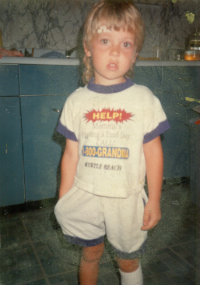 maternity ward. Go right, then left; go down the hall and take the staircase to the third floor. That staircase ended on the second floor!
maternity ward. Go right, then left; go down the hall and take the staircase to the third floor. That staircase ended on the second floor!
But I finally found another staircase that took me to the third floor.
I recall hearing my grandson’s first cry while I anxiously paced back and forth in a near-by waiting room. Indeed, it was a joy, an honor and a blessing to be invited into the labor room to meet that precious newborn and his proud but worn-out parents.
And for the next short-lived six years, while you and your wife faced the ups and downs of parenting, I enjoyed the role of grandparent. I also reaped the rewards as an official babysitter. I turned my sofa into a sleepover tent. We baked cookies; we watched cartoons on television; we even made trips to the circus and an occasional carnival.
I still have that photo on display; you know…the one where he’s wearing the T-shirt that says, “HELP! Mom is having a bad day. CALL 1-800-GRANDMA!”
Our relocating more than two thousand miles away was a heart-sickening experience. I’m grateful for all the emails and photos you sent of my grandson’s love of nature, his school pictures, etc. Your emails were all I had until my grandson’s roller hockey team flew out to San Diego when he was 12.
San Diego when he was 12.
It was a wonderful but all too brief reunion. And spending an extra day at the Zoo and Sea World was an unexpected added bonus. Saying goodbye, once again, was so difficult.
As my grandson raced through his teenage years, the volume of your emails had diminished. I never anticipated nor will I ever forget your long-distance phone call. My heart sang and then cried when I found out you had earned the title of “grandfather.”
My great-granddaughter was born May 24, 2007. She came into this world after her mom had been pregnant for only 23 weeks and five days. Weighing in at only one pound, six ounces, this beloved newborn was identified as a “micro-preemie.”
Back in my day, a premature baby this small had little chance of survival. Today, with a full-term pregnancy based on a 40-week scale, more than half of premature babies born between 23 and 24 weeks will survive delivery and are now considered viable. Thanks to advanced medical technology, and a mandatory long stay in the NICU, the rate of survival can now be as high as 66 percent.
And, of course, my daily prayers from across the miles didn’t hurt.
Once again, dear son, you began sending photos via email of this sweet little survivor.
And, after our relocating back to western North Carolina three years later, I finally got to meet your beautiful granddaughter. That was in the summer of 2010. She is now 7 years old!
Indeed, family is what it’s all about. #
Holly (5/20/14)
We all know that cats have similar traits. We’re familiar with the way the feline species, male and female, is obsessed with self-grooming, licking away at their silky pelts in a seemingly endless effort to remain immaculate.
Their independence of spirit is also well-known. A cat does not live in your home with you; you live with him or her.
And all cats have that air of mystery surrounding them. I’ve always felt that every one of our cats I’ve shared our home with at one time or another was in on some big secret.
Back in the ’80s, we owned a large house close to a hundred years old, with high, wooden ceilings and three working fireplaces. I was alone one evening, sitting on the sofa in front of a warm fire. 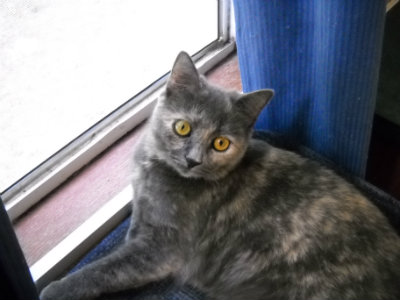 Suddenly, our two cats looked up and their eyes widened as they stared at something directly behind me. The hair on the back of my neck literally stood up as I slowly turned my head to see what it was, expecting the worst.
Suddenly, our two cats looked up and their eyes widened as they stared at something directly behind me. The hair on the back of my neck literally stood up as I slowly turned my head to see what it was, expecting the worst.
There was nothing there, or at least I didn’t see anything. The cats, however, continued to stare for a little while longer. I am dead certain to this day that there was something or somebody there. From another dimension, a parallel universe, the future, the beyond…who knows? And the cats weren’t telling.
Holly is a 14-month-old dilute tortie who seems to fit perfectly that “mysterious” category. She is one of a brother-sister pair of kittens we rescued last year. She of course shares all the mannerisms and traits of other cats, but as with all animals and humans, she is unique in her individual personality.
One thing I have learned during the years I’ve lived with cats is that females seem to be much more territorial than males. Not so with Holly. She seems to be content to share the house with the three other males, Sparky, Cisco, and Riley, her brother. She keeps her distance from Calie, our other female, not because she’s territorial but because she seems to be aware that Calie wants no part of her or any of the other cats.
When we had decided to adopt a kitten, we 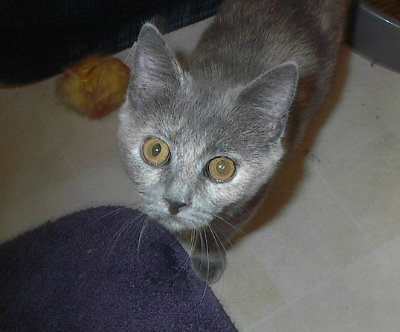 wanted a male companion for Cisco, our Bengal, as Sparky was just too old and not interested. We very pointedly did not want another female. However, when we learned Riley had a sister, we felt compelled to keep them together and took them both in.
wanted a male companion for Cisco, our Bengal, as Sparky was just too old and not interested. We very pointedly did not want another female. However, when we learned Riley had a sister, we felt compelled to keep them together and took them both in.
Another etched-in-stone trait of cats is that sooner than later they will surprise you. Sure enough, Holly and I bonded the day she arrived. I don’t know what it was, but that first night she scampered into bed with me, and hasn’t missed a night since. I can’t claim that for some other women I’ve known in the past.
Let me tell you about Holly’s personality. She is fascinated and obsessed with the sand in the litter boxes. She can be anywhere in the house, napping or otherwise engaged, and she will hear me begin to pour the sand into one of four litter boxes we keep on hand in both the laundry room and our large bathroom. She’ll come running and show up alongside the litter box as the first granules of new sand cascade into the box. She’ll wiggle her behind as I pour the sand, and then she will suddenly dart forward until she is directly under the stream, swiping wildly at the fragments of material falling into the box. No matter how quickly I react and stop pouring, Holly manages to get her head covered with the sand.
This action takes place at least once a day, and I haven’t yet figured out how to keep her from taking part in her daily sand shower. I’ve tried to refill the litter boxes when she’s sleeping, but her uncanny sense of hearing has no limits.
During the cooler months, when our kitchen is the target of an invading hungry mouse, it is Holly who will sit patiently outside our cabinets and let us know we have an unwanted visitor under the sink. Meanwhile, th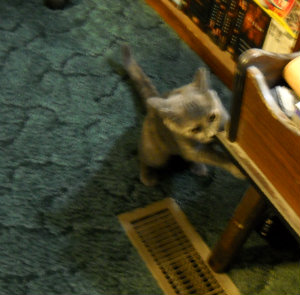 e other cats, including Holly’s brother Riley, are clueless.
e other cats, including Holly’s brother Riley, are clueless.
One night at about three in the morning, I awoke to a light apparently coming from the office section of our double living room. A light! What?! Who? I looked over to see if Josephine had gotten up. No. She was sleeping soundly. My mind raced. The shotgun was in my den at the other end of the house. My heart was thumping wildly as I toed into my slippers, grabbed my flashlight and baseball bat, and stumbled down the hallway, ready to do battle with invading burglars.
As I emerged into the now lighted room, there was Holly, standing alone on the desk, furry chest seemingly puffed up, proud to have pulled the long chain to the ceiling fan/light.
“No, Holly,” I half-whispered, half-yelled in an admonishing voice. I reached up and turned the light back off. “This is sleep time for everybody.” Holly crouched low on the desk, apparently aware from the tone of my voice that I was not in the mood to play.
I went back to bed, feeling a little guilty for chastising Holly. However, a few minutes later I felt the bed quiver and then Holly was snuggling back in next to me, purring loudly.
Holly is also a fan of “the spot.” Whether it’s a laser pointer or sunlight reflecting from my watch, she is instantly excited by a spot of light dancing on the wall, the floor,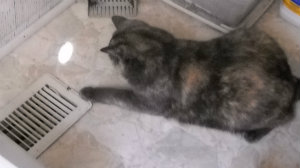 or anywhere else. Our dearly departed calico, Bratly, featured extensively in our novel, Stardust Dads, also loved going after the spot. Not all cats are so inclined. Our Bengal Cisco and Holly’s brother, Riley, will occasionally make a mild effort to chase the spot, but none of them is as dedicated or obsessed as Bratly was, and Holly is.
or anywhere else. Our dearly departed calico, Bratly, featured extensively in our novel, Stardust Dads, also loved going after the spot. Not all cats are so inclined. Our Bengal Cisco and Holly’s brother, Riley, will occasionally make a mild effort to chase the spot, but none of them is as dedicated or obsessed as Bratly was, and Holly is.
Every morning, at a certain time, when I’m at the sink in the kitchen and preparing my breakfast, the sunlight will bounce off my watch and create a dancing spot on the wall. Holly will be waiting for it and will jump around and paw at it with unrelenting determination. When it rains or is otherwise a cloudy day without the sun, I’ll take the laser pointer out of my pocket and create my own red spot. Holly will go after it with as much zeal as if it were a sun-generated spot.
Unfortunately, the batteries have apparently died in the laser pointer, and it happened during a dark, rainy period, which has Holly moping around in disappointment. If I do nothing else today after finishing this blog, I will seek out the special, round LR44 batteries and restore life to Holly’s folly.
It’s the least I can do for this little tyke who provides so much love and joy in my life. #
Bird Watcher, Turtle Wrangler and Hapless Head Banger (5/13/14)
If you think this headline is somewhat bizarre, it’s nothing compared to the kind of Sunday experienced yesterday. To begin with, it was Mother’s Day, and some of wife Josephine’s family showed up to help her celebrate the day.
Jo’s oldest son Michael called early to wish her all the best for the day, briefly explaining why he was housebound. This call was soon followed up by one from youngest son Brian, telling her he wanted to give us a heads up before showing up with significant other Michelle.
“Where are you now?” Jo asked, still in her pajamas.
“In your driveway,” he said innocently enough.
That was probably the last time the day had even a trace of normalcy.
Brian and Michelle had come over with a strong desire to help with the vegetable garden we had already started. After quickly pulling on clothes, Jo ran out to greet them. I went out on the 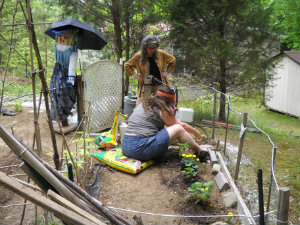 deck and offered a quick hello before returning to the computer to finish up with the work I was doing on eBay. I told them I’d join them later.
deck and offered a quick hello before returning to the computer to finish up with the work I was doing on eBay. I told them I’d join them later.
Michelle had brought several trays of marigolds with her and immediately started planting them in strategic spots around the garden. It’s long been generally thought that marigolds repel insects, despite studies that have not turned up any evidence to support this idea.
What has been established is the attraction by these marigolds of beneficial insects such as ladybugs, lacewings and parasitic wasps. These insects prey on harmful insects and as such protect vulnerable vegetables.
I decided to cut it short on eBay and walked up the short hill to the garden. Brian was already toiling away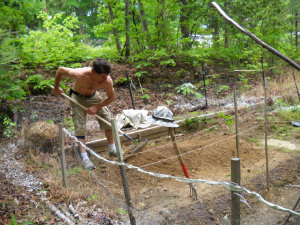 with both shovel and pitchfork, churning up the soil in an effort to expand the garden without the benefit of a gas-powered tiller, something we’ve had the use of in the past.
with both shovel and pitchfork, churning up the soil in an effort to expand the garden without the benefit of a gas-powered tiller, something we’ve had the use of in the past.
Michelle and Jo were also busy, with Jo pulling weeds right and left, mumbling that the weeds were growing faster than her vegetables. Meantime, Michelle finished planting the marigolds and starting putting the herbs Jo had started indoors, into the ground.
I had carried my camera with me to take a few candid shots of our garden crew, shown here, and then had looked around for other photo opportunities. I noticed the leafless, low-hanging branch from our large white oak tree, something that 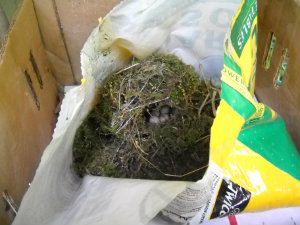 has annoyed me for several years. I took a few pictures of that, and then walked back into the house, mulling the branch over in my mind and how I might cut it off.
has annoyed me for several years. I took a few pictures of that, and then walked back into the house, mulling the branch over in my mind and how I might cut it off.
Not long after, Jo came running back in to inform me that Brian had found an egg-filled bird’s nest inside the half-used bag of Miracle Grow garden soil. I went back outside and checked out Brian’s find, making sure I snapped a few shots of the nest and its little eggs.
I once again returned to the house to try and finish up on eBay, at the same time trying to figure out what I was going to write about for Tuesday’s blog. Mother’s Day had  kind of delayed my writing schedule because Sunday is usually the day I do the weekly blog. Jo’s middle son Billy and his wife and family would show up a little later and that would clinch my not doing any writing that day.
kind of delayed my writing schedule because Sunday is usually the day I do the weekly blog. Jo’s middle son Billy and his wife and family would show up a little later and that would clinch my not doing any writing that day.
Jo ran in again excitedly to tell me that the mother bird had come back to the nest. I grabbed my camera and followed Jo out to the side of the shed where Brian and Michelle stood motionless, watching the bag of soil with the bird’s nest. Brian whispered to me as he pointed, telling me to take a picture of the mother bird. I crept closer and brought the camera up to my eye, but before I could go any further, the mama bird shot out of the nest and flew into the  woods. Disappointed, I went back inside.
woods. Disappointed, I went back inside.
Later, I finally wrapped up my eBay work and went outside, heading straight for the shed. I unraveled a coil of new quarter-inch twine I had recently bought and looked around the cluttered workbench for something I could use to add some heft. I picked out a midsized wrench and tied it to one end of the twine. I had considered a larger, heavier wrench, but decided that would be overkill.
I left the shed and tried to toss the wrench over the low-hanging tree branch, succeeding on my third attempt. I grabbed the double lines of twine and pulled hard, trying to break it off. Apparently the branch was still very much alive and not the dead tree limb I had expected. It bent way back but did not snap off as I had hoped. I finally gave up and tried to pull off both lines of twine along with the wrench. I moved back up the short hill and pulled hard.
Big mistake.
In retrospect, it was one of the dumbest things I’ve ever done, and I’ve done a lot of stupid things in my relatively long life. The wrench broke loose and came flying back, hitting me square on the top of my head. I heard it hit with a “ding!”
Of course I went down. I’m not sure but I think I uttered “Uh-oh.”
Jo related later that she was unaware of it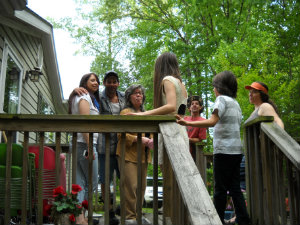 happening at the time. She said Michelle had suddenly said, “That thing hit him in the head.”
happening at the time. She said Michelle had suddenly said, “That thing hit him in the head.”
The three hurried down the short hill toward me. I was by then bleeding badly, streams of red pouring down the sides of my head. I took my hand away from the top of my head and looked at it. My own blood scared the hell out of me, my anxiety building. I vaguely remember Jo holding me and placing her hand on my head. I stood up right away and headed back toward the house. Brian held on to my right arm, making sure I didn’t stumble. Jo said later that she was trying to hold back the flow of blood so I wouldn’t see it and become more frightened.
I moved quickly to the kitchen sink and turned on the cold water. Jo secured a washcloth while everyone including me was yelling, “Put cold on it!” I kept thinking, we need to buy one of those screw-top baggies in which you put ice cubes. Actually, we do have an ice pack, but Jo says her main concern was to stop the bleeding, whi ch of course she did succeed in doing by applying pressure to the wound with the cold washcloth.
ch of course she did succeed in doing by applying pressure to the wound with the cold washcloth.
I kept yelling to anyone who would listen, “How does it look?” Michelle looked at the top of my head and tried to reassure me that it looked just fine. Someone had used the term “Urgent Care” at one point, but I displayed no symptoms that would call for such action. The bleeding stopped very quickly, especially considering my status as a diabetic.
I sat on the couch and held the washcloth to the top of my head. I stayed there for awhile, resting and trying to stay calm. Brian and Michelle returned to their work in the garden, with Jo joining them once she was sure I was okay.
Not long after that, Brian yelled that he had found a turtle in the garden. The small box turtle was the very one Michelle had discovered near the outdoor hose hookup two years ago. Jo had named him Tommy. Yes, she had. Michael had told her turtles will dig in and hide, or crawl under a building such as the shed and that she should look for him after each time it rained. And sure enough, two years ago, Jo would find Tommy after each time it rained.
But last year, it rained just about every day and Jo never saw Tommy…until now. “Take a picture!” she yelled, and I did.
Soon after Tommy’s discovery, Bill showed up with wife Lena and Jo’s grandchildren, Jasmine and Jacob. Brian and Michelle finished up in the garden and left, Brian eager to watch hockey’s championship Game Six between the NY Rangers and Pittsburgh Penguins. Yes, New York won, forcing a Game Seven.
Bill and the fam stayed on until about 9 or so, with Jo enjoying a happy visit with her grandchildren.
A nice Mother’s Day for Jo.
As for me, it shows just how far I’ll go to find blog material. #
Scarecrow in Drag (5/6/14)
My current wife Josephine has a number of dollhouses for which she fashions all sorts of miniature accoutrements, everything from various desserts to floral arrangements to tiny beds made from sponges.
So it was somewhat out of character for her when she decided to tackle creating something about as big as she is: a scarecrow in a dress. The result would probably make Dr. Frankenstein shudder. I know the thing – someone decid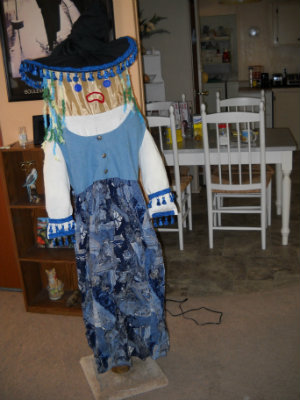 ed to call the scare-woman “Mamacita” – gave me the creeps. After bumping into it during a nighttime excursion to the bathroom, I insisted on its relocation outside as soon as possible.
ed to call the scare-woman “Mamacita” – gave me the creeps. After bumping into it during a nighttime excursion to the bathroom, I insisted on its relocation outside as soon as possible.
Of course, I was the one who had to carry it up to the garden. It wasn’t all that heavy, just unwieldy because of the way Jo put it together. Basically, the “monster” consisted of one cat scratching post (forever ignored by our cats) nailed to the top of another unused cat scratching post. An eight-by-four-inch piece of plywood was then nailed to the top of the second cat scratching post, upon which Jo hot-glued a cardboard box.
Next, Jo covered the cardboard box with a plain white plastic bag. The so-called “face” consisted of two blue bottle caps hot-glued into place, under which she hot-glued a red pipe cleaner for the mouth.
An old dress was draped over the cat scratching posts and hand-stitched to the cardboard box. Jo then hot-glued at least 25 individual 12-inch strands of multi-colored knitting yarn to the top of the box to add the appearance of “hair.”
On top of all of this Jo affixed a black, pointy witches’ hat salvaged from an old Halloween costume. The female scarecrow is now open for business. Of course, it will be awhile before we can assess the scarecrow-in-drag’s viability. Seedlings begun indoors have just been planted, thus there is nothing ready to beckon hungry birds.
Birds are just some of the scavengers one has to watch out for. Two years ago we had planted several rows of corn, started indoors from seed. In this postage-stamp-sized garden, with not a lot of exposure to sunlight, the corn seeds had taken root and grown quickly. Before we knew it, we actually had small ears of corn on the stalks. Jo was ecstatic and proud of her miniature farm – until the raccoons showed up.
With a three-foot chicken-wire fence protecting the growing crop of corn, tomatoes, green peppers, zucchini, butternut squash, yellow squash, string beans, snap peas, radishes, lettuce, white onions, red onions, strawberries – along with herbs basil and thyme – it was a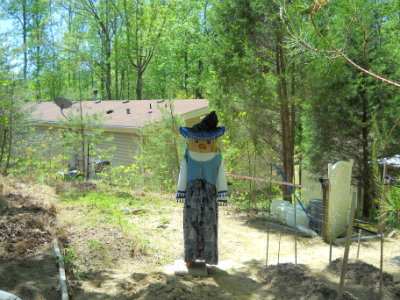 n ambitious garden, to be sure. The harvest: not so much.
n ambitious garden, to be sure. The harvest: not so much.
There were two major reasons for this. First, the soil had not been worked in some time, and second, exposure to the sun was extremely limited due to the number of trees surrounding the area.
The string beans and snap peas flourished. The tomatoes did quite well, as did the herbs. We got a few strawberries, but until we covered them with mesh, many of them were plucked by birds at the first hint of red.
The short fence certainly worked well keeping the wild rabbits away from what did grow, but no one figured on the raccoons. We already know from experience that the raccoons are quite brazen, and having fingers with an opposable thumb gave them an edge over the other critters. We watched in horror one night when an entire “family” of raccoons came up on our deck and ate all the cat food we had put out for some of our feral feline visitors. One of the cats was actually there when the raccoons invaded, watching quietly from atop the banister while her food was gobbled up. (See Second Thoughts, 12/4/12, “Critter Jitters.)
The major crime, though, was when one or more of the raccoons jumped the fence and one by one pulled off and ate every single ear of corn. Now, this didn’t happen all at once, or all on the same day. It started one day in early July. Josephine had walked up to the garden to check the corn, knowing many of the ears already had tassels on top and were at least half a foot long. When Jo discovered one of the young ears had been ripped off its stalk, with most of the kernels chewed off, she was heartbroken. She had grown this corn from seed and, in her mind, it was as if someone had killed one of her babies.
Taking a cue from something I read online, I immediately went out and bought a package of cayenne pepper. We sprinkled it all around the corn, hoping it would deter the raccoons.
It didn’t.
Every day, Jo would hike up to the garden and find one of the stalks of corn had been violated. It got worse. Soon the raccoons, obviously emboldened by their successful, unpunished crimes, were attacking several plants at a time. They were pulling the stalks up altogether and stripping off multiple ears, most of which were strewn about the garden with wild abandon.
Jo would come back to the house in tears.
Last year we again planted a small garden. The raccoons were not to worry about. As most people living in the Southeast knew, it rained just about every day throughout the summer. The only living things benefiting from the deluge were the insects. I am not exaggerating when I state that neither of us could take more than a couple of steps outside without getting bitten by something.
That’s why Mamacita is now standing guard in the garden. We haven’t planted the corn yet, but we probably will very soon. Jo also added a few bells and wind chimes to the female scarecrow, attaching them under her skirt. Hopefully, a jingle-producing light breeze will be enough to discourage a hungry raccoon.
I also was told by my pest-control guy that his daddy used to sprinkle red fox urine randomly around the corn to ward off the raccoons. I’m going to look into it, although I’m not even sure where I would purchase this product.
I’m just glad it’s not my job to collect the stuff. #
Are You Smarter Than a 5th-Grade Mouse? (4/29/14)
Following a bit of a cold snap these past few nights, we found a mouse on a sticky-paper trap – officially known as a glue-board – on two consecutive mornings. As usual, in both instances, our intrepid dilute torte, Holly, fresh out of kittenhood after turning 1 year old, alerted us to what lay behind the set of kitchen drawers.
On the third morning, Holly again held vigil in front of the kitchen drawers. To our shock and dismay, when we pulled out the bottom drawer and focused the flashlight on what should have been yet another mouse stuck on a glue-board, we found instead a mouseless glue-board chewed all the way around, and devoid of the peanut-butter bait.
Chalking it up to perhaps a larger mouse, we replaced the ragged glue-board with a new one, again baiting it with a glob of peanut butter. Next morning, the peanut butter was again gone and the glue-board badly chewed up. Figuring this may have been the same large mouse returning for another meal, we placed yet a third  fresh glue-board, properly baited with Skippy’s finest, into the area behind the set of drawers.
fresh glue-board, properly baited with Skippy’s finest, into the area behind the set of drawers.
In the morning, Holly again returned to her self-appointed post in front of the kitchen drawers, silently stating the obvious. We pulled out the bottom drawer and again found a chewed up glue-board – but no mouse!
That’s when I called our pest-control company. They said they’d contact Tommy, the guy who services us on a quarterly basis, and have him call us. Shortly thereafter, Tommy called back.
“Those traps you left us with are no longer working,” I said, giving him the short version of what had taken place the past few nights.
“Okay,” Tommy replied. “I got off to a late start today, so I’m running behind. If you’re agreeable, I’ll swing by late today after I make my calls and see what’s goin’ on.”
We signed on with the pest-control company four years ago, figuring with the woods nearly surrounding our home, we’d have more than our share of uninvited guests. We weren’t wrong. A good example occurred several years back. A field mouse had apparently managed to crawl up a pipe under the sink in my bathroom, followed by a three-foot nonpoisonous snake that had slithered up after him. (See Second Thoughts, 11/27/12, “Critter Jitters.”)
In that case son Brian had come out, retrieved the small, imprisoned snake from under my sink, carefully removed it from the glue-board, and cleaned it up. He later released it into the woods where it could slither on through the rest of its natural reptilian life. I had first called the pest-control company to report the snake, only to be told they “didn’t do snakes.” However, I did get a call the next day from the man who was assigned to us at the time, and he said he would have taken care of it. He said whomever I had spoken to at the company’s office was simply misinformed.
We also without fail wind up with a hornets’ nest under one of the eaves of our tool shed at least once every summer. It’s located close enough to the house that pest control takes care of it. We also are infested with armies of ants every year, which they help to eliminate.
Brian came back a couple of days later and did some carpentry work in the cabinets under my bathroom sink. As a result, no critter will ever be able to invade my bathroom again. The kitchen, however, remains critter-friendly.
It should be explained that when we first signed up with the pest-control people, we agreed to purchase four bait traps, two of which are placed outside in front and back of the house, and two under the home in the crawl space on either side.
The traps are loaded with one to three blocks of “bait,” which is poison. After a critter finds its way into one of the traps and ingests the poison, when it leaves and next drinks water, it dies. For those rodents that don’t wander into the poison traps, there are the glue-boards.
As promised, Tommy showed up around 5 p.m. I once again explained what we had found, showing him the mutilated, mouse-less glue-boards. He looked at the sticky-paper traps knowingly.
“What’s going on, Tommy?” I asked. “Is it a larger mouse, or, gulp, a rat?” I had opened one of the drawers by then, indicating the mouse droppings.
“Nah,” Tommy said, smiling. “Those droppings’d be a lot bigger if it was a rat. What you’ve got here is a mouse that’s smarter.”
“Smarter?” I couldn’t believe what I was hearing.
“Yeah, these critters learn from experience. Let me go out and check the bait traps right now.” He returned about 20 minutes la ter, informing us that all of the bait traps were bone dry.
ter, informing us that all of the bait traps were bone dry.
“I normally put in one block of bait when I come out, which will take care of about eight mice. This time I loaded them up with three blocks each. This is as much as each trap will hold.”
“What do we do about inside?” I asked Tommy.
“I’ve got you covered on that too,” he said. “These are two or three times as thick as the regular boards, almost like rat traps.” He handed me a ‘set’ of two thicker boards joined together. “Put those away somewhere just in case.” With that he carefully placed two other thick glue-boards back under the kitchen sink, one of them behind the set of drawers where the “smart” mice stole the peanut butter bait and then chewed their way to freedom, the other next to the dishwasher.
“I think that’s where they get in. Must be a hole somewhere.” He went on to elaborate how some mice learn from experience. “I’ve seem some get stuck to a board and chew all around the contact point. They’ll take off with a piece of the trap still clinging to them. Hell, I’ve known some to chew off one of their own legs in order to escape.”
“Let me go back out to my truck,” he said. “I’ve got something else that might help you. When he returned, he was carrying a metal box about 11" x 6", with a small window on top. He showed me how a mouse can enter through a small opening at one end. When it does, a trap door shuts down behind it, keeping it imprisoned until it dies.
“We usually charge for this, but you can use it gratis.”
“I appreciate it, Tom. But let me ask you, wouldn’t so-called smarter mice eventually figure this one out too?”
“Maybe,” Tommmy said, “but one thing's for sure - they can't chew this trap.” #
Blackout Blues (4/22/14)
In recent years there’s been much discussion – and even actual activity by select groups – concerning various possible apocalyptic events and how best to survive them. The imagined disasters include everything from deadly meteors, major earthquakes, massive power failures, invasion from [insert here: Russian, North Korean, Iranian, Red Chinese] armies to a full-scale, all-out attack by marauding aliens from outer space.
Back in the late 1960s, these groups were referred to as “survivalists.” Today they are more popularly known as “preppers.”
But on Tuesday, November 9, 1965, no one was prepared for “The Great Northeast Blackout” that began at 5:16 p.m. I had just finished work as a magazine editor in Manhattan and along with Carl, a friend and colleague, had just reached the subway platform in preparation for the trek to our respective homes in Queens. As usual, Carl and I had a standing wager on whose train would arrive first. Carl’s train was the double R to Forest Hills, and mine was the No. 7 Flushing line that became elevated once it cleared the tunnel under the East River.
According to official reports, the massive power failure started at the Ontario-New York border, near Niagara Falls. A single transmission line from the Niagara generation station tripped (opened). Within 2.5 seconds, five other transmission lines became overloaded and tripped, isolating 1,800 megawatts of power at Niagara Station.
After their isolation, the generators became unstable and tripped off-line. The Northeast power system in turn became unstable and separated into isolated power systems (islands) within four  seconds. Outages and islanding occurred throughout New York, Ontario, most of New England, and parts of New Jersey and Pennsylvania.
seconds. Outages and islanding occurred throughout New York, Ontario, most of New England, and parts of New Jersey and Pennsylvania.
The massive blackout left more than 30 million people without electricity for as long as 13 hours. This was “the big one” and it all started with the operation of a simple over-current relay on a transmission line. There were other credible reports recorded of UFO sightings during this time and near the Ontario-New York border, but that’s another story.
My train rolled into the station first. I let out a victory whoop directed at Carl as I boarded the jam-packed train. Carl just smiled as we pulled away, neither of us remotely aware of what was about to happen minutes later.
We were about halfway through the tunnel under the East River when the train suddenly lurched to a stop and the lights went out. The dimmer emergency lights took over and we all simply waited. New Yorkers, after all, are used to subway trains stopping. Delays are all part of the system and no cause for alarm. Still, it was more than an hour or so of waiting in subway cars packed chin to ankle with humanity before many of us began to grow restless.
The intercom static preceded the train motorman’s voice, uttering the understatement of the year. “We seemed to be a little weak on power.” The usually stoic, jaded passengers laughed in unison, which at that point broke the ice. Uncharacteristically, people in the train cars began conversing with one another. I made small talk with a couple of guys about my age who were standing next to me. Also standing behind me was a young, slender, very tall woman who appeared to be nervous and somewhat fearful.
Another hour passed uneventfully. The tall woman behind me suddenly leaned in and asked me if I would stay with her while all this was going on. It was in no way a sexual overture. Rather, she was by this time quite frightened. Despite my own growing anxiety, I tried to reassure her that there was nothing to worry about. That’s when the intercom clicked on and the motorman informed us that the power blackout was widespread and involved the entire Northeast.
That startling tidbit of information apparently shot through the powerless train as if it were an electric current. Speculation was rampant. Were we under Russian attack? What was going on? Panic had not yet set in, but a general uneasiness had very definitely swept through the passengers.
The motorman continued to advise, informing us that we were very near mid-tunnel and a point at which there was a 130-foot ladder that went straight up to Welfare Island. Passengers who wanted to could de-train and walk carefully alongside the track until they reached the ladder. From there they could climb up to Welfare Island and access a bridge that would take them into Long Island City, Queens.
I looked at the two young men next to me and didn’t hesitate. “I’m all for trying the Welfare Island route. How ’bout you?” They both nodded in agreement. At that point I turned to the fearful young woman, who managed to murmur a barely audible “Okay.” With that, the four of us joined a procession of other daring souls and with the help of one of the conductors got down alongside the train and proceeded to follow the flashlight, Tall Woman holding my hand tightly.
We were able to climb the ladder without much difficulty and breathed a sigh of relief when we reached the cool night air of Welfare Island. We walked for what seemed like half the length of the island after that, finally reaching the small bridge that connected the island with mainland Queens.
It was hard to believe what we were seeing. Apparently there had already been some looting, and police had commandeered a bakery truck to serve as a jury-rigged paddy wagon. There were small bands of people running out and about, with the overall scene taking on an almost otherworldly ambiance. Tall Woman and one of my other subway companions discovered they both lived in the same area and decided to share a cab. My other train sidekick, who didn’t live anywhere near me, also managed to flag down a taxi.
Knowing another cab would be along shortly, I looked around for a phone booth, hoping to call my wife who was home with my not-quite-3-year-old son, and my daughter not yet 1. Hard to believe in today’s tightly connected Internet/smart-phone era that in those days the cell phone hadn’t even been invented yet.
When I finally did arrive home sometime after midnight, my wife was relieved. In order to avoid frightening the children, she had tried to make a game of the lighted candles and cold peanut butter and jelly sandwiches. Young Jennifer was fast asleep, but David was still awake when I began to climb the stairs. I tried to suppress a giggle when I heard him exclaim excitedly:
"Shssh! Don't tell Daddy!" #
Aging Lament (4/15/14)
I just finished reading an essay in the AARP magazine, which I did, I must admit, at my wife’s urging. It was written by world-famous neurologist and best-selling author Oliver Sacks, who waxed poetic on his life an d reaching the age of 80.
d reaching the age of 80.
“I’m glad I’m not dead,” Sacks admitted having said sometimes when the weather was perfect. In essence, I believe Dr. Sacks is quite pleased with the path his life has taken, and the way in which he has proceeded. After all, his many accomplishments include a host of books written about his patients and their pathological conditions. His works include Awakenings (the basis for a film starring Robin Williams and Robert De Niro), Seeing Voices, and (I love this one) The Man Who Mistook His Wife for a Hat.
In addition to his books, Sacks is a regular contributor to The New Yorker and The New York Review of Books, as well as to other medical, scientific, and general publications. Well, I could go on and on about Dr. Sacks, whose life and what he has done with it is certainly worthy of intense examination and reflection. However, AARP magazine’s short essay by Dr. Sacks got me to thinking about my own life and the path it has taken, which is the reason why my wife touted the article to me. She thought it might spark an idea or two, for I have this weekly affliction known specifically as “WhatthehellamIgonnawriteaboutthisweek?”
I’ve not yet turned 80, but I am getting close. As I’ve noted here earlier this year, I turned 75 in mid-February. That’s right, three-quarters of a century. Frightening, would be one way to look at it. Average life expectancy for a male in t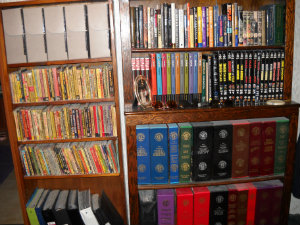 he U.S. is 76, so I may not have much time.
he U.S. is 76, so I may not have much time.
As Dr. Sacks wrote: “I often feel that life is about to begin, only to realize it is almost over.”
This is something I just won’t accept. I feel I have not yet accomplished much of anything. Oh, I’m certainly not going to persist forever. But I’m nowhere near ready to pack it in at this point. I feel that I as a writer have so much more to offer. I have a couple of ideas for future novels, and even one for a children’s book. And, of course, I plan on continuing with Second Thoughts, which I feel helps to keep my journalistic abilities well-honed.
What have I done so far in the field of journalism? Well, when I worked as an editor in the genre of men’s adventure magazines, I also kept my hand in as a freelance writer, penning more than a hundred articles, and over 200 columns. I used to keep multiple copies of the magazine issues in which I had a story or column, or both. In some cases, an issue might even run two of my stories plus a column. Mainly, I did it for the money. My base salary wasn’t much, and the freelance articles helped to cover the cost of raising two children and a cat.
penning more than a hundred articles, and over 200 columns. I used to keep multiple copies of the magazine issues in which I had a story or column, or both. In some cases, an issue might even run two of my stories plus a column. Mainly, I did it for the money. My base salary wasn’t much, and the freelance articles helped to cover the cost of raising two children and a cat.
I had also compiled a list of all the stories and columns I did, and when and where they appeared.
Sometime during the 14 years we lived and worked in Las Vegas, I did a few shows in which I sold comic books, hardcover books, magazines and paperbacks. As I have also noted here, I have been at times an incurable collector of comic books, hardcover books, magazines and paperbacks. Although I will never pass up an opportunity to pick up an old comic book or two when the price is right, and I still have a few boxes of various titles in my closet, I gave up actually collecting comics a few years ago. What I buy today, I resell on eBay. My hardcover book and vintage paperback collection, however, continues to grow.
book or two when the price is right, and I still have a few boxes of various titles in my closet, I gave up actually collecting comics a few years ago. What I buy today, I resell on eBay. My hardcover book and vintage paperback collection, however, continues to grow.
My point here is that while doing one of the collectible shows in Vegas, one of the dealers at the show made me an offer for my men’s magazines that I couldn’t refuse. Apparently, the men’s magazines have an intrinsic collectible value because of the illustrations used in them. Thinking only of the needed money at the time, I sold them all to the dealer. And somewhere along the  line, the list I had compiled of what I had written and when and where it had been published disappeared.
line, the list I had compiled of what I had written and when and where it had been published disappeared.
Regretfully, I made a mistake in not keeping at least one copy of each magazine I wrote for. While I’ve managed to pick up a couple of the issues with my stories on eBay, I think evidence of most of my journalistic output is gone forever. Oh, I suppose if one had enough money and time, and reason to do it, one could seek out and acquire copies of many of the titles I wrote for from 1964 through 1977, but it would be a costly, time-consuming, and most likely incomplete effort. I also wrote a few more articles for various other magazines, but even with these I would have to give it a lot of thought as to what the articles were about and where they appeared.
Along with my wife Josephine, I of course co-wrote the novel Stardust Dads; an effort we are both extremely proud of. And with the exception of three “guest” columns by Josephine, I’ve penned more than two years of weekly Second Thoughts blogs.
All things considered, a less than impressive body of work for the 50-odd years I’ve been writing. I’m not complaining about my life so far, which certainly has had its share of ups and downs. But I feel I still have some important writing ahead of me. It’s not success I’m looking for, but rather a sense of fulfillment.
As for giving up the collecting of hardcover books, magazines and old paperbacks – and I hadn’t even bothered mentioning the baseball cards – well, that day will come.
Just not today. #
Get My Goat…Please! (4/8/14)
Editor’s Note: The following guest blog was written by my wife and co-author of Stardust Dads, Josephine C. George.
My three sons always had one pet or another: gerbils, hamsters, rats, mice, dogs, cats, guinea pigs, parakeets, parrots, rabbits, snakes, even a Columbian squirrel. So when we moved into our new country home in North Caro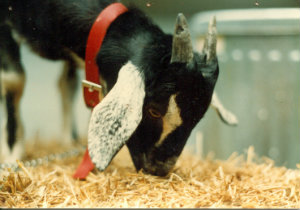 lina the first time around, we adopted a baby goat. The concept of experiencing an “outdoor” pet sounded so convenient.
lina the first time around, we adopted a baby goat. The concept of experiencing an “outdoor” pet sounded so convenient.
We named the little, hollow-horned fellow Pork Chop, although it would have been more fitting to call him Head-Butt, Rocky II or Rambo III. It didn’t take long to grow accustomed to the scent of musk that mingled with the mountain air. However, by the time Pork Chop had celebrated his first birthday, I could no longer accept the new look that had taken over a large part of our scenic view.
The quaint, silver-fox-gray, doghouse-like abode with the matching shingles, built by hand especially for this new member of the family, now looked as if Hurricane Gilbert had taken a detour through our yard. Brian, my youngest son, who had recently graduated from T.C. Robertson, had replaced the roof shingles so many times that he could easily have gotten a job as a professional roofer.
Anyone who hadn’t visited us for a while might very well have noticed the large gap in landscaping in front of the house, where three of our once-upon-a- time azalea bushes were completely devoured. Every single blade of grass – and everything else that used to grow in a 15-foot circumference – was gone! Nothing was left but dirt, except when it rained. Mud wrestling, anyone?
time azalea bushes were completely devoured. Every single blade of grass – and everything else that used to grow in a 15-foot circumference – was gone! Nothing was left but dirt, except when it rained. Mud wrestling, anyone?
One rainy morning, their dad had gone out to feed the goat. He slipped on the slippery hillside and had to grab hold of Pork Chop’s horns to protect his body parts from becoming after-dinner mints. Need I say more?
Indeed…the word p-e-t had taken on a whole new meaning. I thought about how a goat’s horns could be used for crafting knife handles, his fat for fashioning candles and his hide for producing leather goods. But most of all, I couldn’t shake my own disappointment when I had discovered that male goats don’t produce four quarts of milk a day. In fact, they don’t give any milk at all.
I had never put any of our animals up for adoption before, but the day Pork Chop had tried to charge through the sliding glass doors to our family room, hoping to become an “indoor” pet, I knew it was time. Time to find him a home where he had more room to roam. Time to trade our future of Kodak moments with Pork Chop. Time to find someone who also had some experience in hog-tying, bronco-riding…and, of course, mud wrestling.
And so we did! #
What Makes You Anxious? (4/1/14)
There are many situations that can normally produce anxiety in a person. Preparing for surgery, taking a test, or visiting the dentist … these are all just a few of the things that can raise stress levels and produce anxiety.
When you sense danger or something that might have a negative effect on you, your nervous system responds by releasing a flood of stress hormones, including adrenaline and cortisol. These hormones rev up the body for emergency action.
Your heart beats faster, muscles tighten, blood pressure rises, breathing accelerates, and your senses become acute. These physical changes pump up your strength and stamina, quicken your reaction time, and enhance your focus – preparing you for either fighting or fleeing from the danger at hand.
This of course is a good thing in that the body’s physical responses help you to better deal with the challenge at hand.
However, many of us experience a shot of this anxiety or stress under which would be considered normal circumstances.
I am one of those people. When I was much younger, in the late ‘60s or early ‘70s, I was diagnosed as having an anxiety reaction. A tranquilizer was prescribed for me, nothing super powerful such as those we have today. Xanax, which was introduced in 1981 and is today’s anxiety drug of choice, hadn’t even been thought of yet. I believe what was given to me was a low dose of Valium.
In any event, the very first day I took it, I felt as if I were on seven-second delay. I had taken a taxi from Grand Central Station in Manhattan to my job farther uptown on Madison Avenue. When I got out of the cab, I seemed to move in slow motion. As a result, I left my hand in the cab’s door. I walked into the office building leaving a trail of blood dripping behind me. When I got upstairs and into my office, they quickly patched me up. But it was the first and last time I ever tried taking a tranquilizer of any kind - except maybe for alcohol, but that’s a whole other story. I was determined to deal with my anxiety head on, without any help from the pharmaceutical industry.
The events and situations that would normally trigger anxiety and stress, things previously mentioned, certainly affected me. But so would seemingly stress-free events. To this day, I still feel extremely anxious when I have to enter an actual brick-and-mortar bank to conduct business. Thankfully, thanks to Direct Deposit and drive-through banking, I rarely have to do so.
As a type II diabetic, I normally visit my doctor every three or four months; the same perhaps a tad less often with my ophthalmologist. My anxiety level definitely shoots up on those days, but maybe the experts would consider that a normal response.
Another example of needless anxiety occurred just the other day. I had purchased a “hub” for my wife Jo’s laptop so that she could plug in up to four devices such as a mouse, flash drive, keyboard, etc. Everything she read indicated complete compatibility, but when she hooked everything up, the cursor went nuts and began jumping all over. Jo asked me to return the obviously defective device to Best Buy where I had bought it a month ago.
Everything she read indicated complete compatibility, but when she hooked everything up, the cursor went nuts and began jumping all over. Jo asked me to return the obviously defective device to Best Buy where I had bought it a month ago.
I immediately froze, conjuring up all kinds of scenarios, none of which would be helpful to me. The receipt indicated returns were accepted up to 15 days, which convinced me that the store would never exchange the item or issue me a refund since a month had passed since I purchased it.
Needless anxiety. I got to the store and they bent over backward to accommodate me. They took back the device smiling all the way. I asked if they had a different brand, and they did. I was in and out of that store in less than 15 minutes.
Using the phone is another stressor for me. Earlier today, for example, I had to order refills for my insulin. I did a whole number on myself stressing over the call I had to make. Why it was producing anxiety, I’m not sure, but I procrastinated for more than half the day before finally placing the call.
Perhaps having to deal with a robot had a little to do with it, although if a live person were involved, I believe I would still have experienced anxiety. The robot actually just makes me angry.
As I understand it, people with a generalized anxiety disorder tend to pay attention to anything that seems threatening and incorporate a vague sense of danger into all their thinking. They worry constantly in an attempt to define and describe their problems, reducing anxiety temporarily but in the end maintaining the feeling that they lack control.
I wouldn’t say that describes me today, though. I’ve mellowed considerably. Back in the day, I would have severe anxiety and occasionally full-blown panic attacks. I remember when I lived and worked in Las Vegas. I had taken to walking after lunch as a means of regular exercise. One day I set out at a normal pace, going about eight long blocks before feeling anxious. I immediately convinced myself that I was experiencing a heart attack. The more I stressed over it, the more anxious I became.
I slowed down but kept walking, trying to convince myself that it was all in my head. And of course it was. When I got back to the office, I seemed to be in control again, my heart still fully functional. Until now, I had never shared that with anyone.
What causes this needless anxiety I’ll leave to the experts to explain. I’m sure if I were to time-trip back to my childhood and carefully relive some of those experiences, I’d come up with the root cause.
Actually – because I had a number of other important tasks to complete – I didn’t write this blog yesterday, Sunday, which is when I most often complete the task. This pushed my anxiety level to the ceiling, worrying I would miss my deadline for Tuesday. That’s when I decided on anxiety as this week’s theme, and now I’m done and it’s still Monday.
Have a stress-free week, everyone. #
Thatsa No Meatball (3/25/14)
It wasn’t the first time Josephine has asked me to drive to the store for something unusual or elusive. Sometimes it would be for an item that the manufacturer had discontinued. Or maybe the store had decided to stop carrying the item. Other times, no one ever heard of the item.
It didn’t make any difference whether the item was animal, mineral or vegetable. I just wouldn’t be able to find it. And of course if I didn’t return home with the item, most times Jo would try to assign blame to me. “Well, you’re just not looking in the right place,” she’d assert. Or “I’ve gotten it there before. Didja ask someone?”
But last week was a real disaster. Jo wanted to prepare pasta for dinner, but instead of hot Italian sausage (my favorite weakness) “which is very bad for you, young man,” she had decided on braciole (usually pronounced “bra’zhul” in the U.S.).
The dish can be made with any kind of meat such as beef, pork or chicken, but Josephine prefers beef, which is basically a cut of top round pounded thin and well-seasoned with garlic, parmesan cheese, extra virgin olive oil, etc.
Those who watch TV’s Everybody Loves Raymond, now in reruns, would know that braciole was the one thing Deborah could make better than Marie.
Basically, each piece is about 5 inches long and about 1-1/2 inches thick after being seasoned, rolled up and secured by toothpicks. They are then pan-fried in olive oil and wine and served with marinara sauce. The dish is often stuffed with cheese or other ingredients, and can be prepared in an infinite number of ways. Tasty, to be sure, but for me just not as exciting as hot Italian sausage.
marinara sauce. The dish is often stuffed with cheese or other ingredients, and can be prepared in an infinite number of ways. Tasty, to be sure, but for me just not as exciting as hot Italian sausage.
Getting back to the story, Jo sent me off to the supermarket with instructions to look for a package of thinly sliced beef. When I reached the meat section, the closest thing I could find was a package of breakfast steaks, which were at least a quarter-inch thick. This was not thin in my mind. Best thing to do, I decided, was to consult the butcher.
I forgot for the moment that this wasn’t New York, that we lived in the South.
The butcher was a young lad obviously not long out of his teen years, if that. I asked him if he knew what braciole was.
“It sounds familiar,” he said smiling, which of course means he didn’t have a clue. I tried to describe it but without much luck. However, when I mentioned braciole being “rolled up,” he produced a package of meat labeled “flank steak.”
“I think this is what you’re looking for,” he said proudly.
Thankful to be done with shopping and eager to get home, I breezed though checkout and hurried back to the house. “Here you go, darlin’,” I said to Jo, handing her the large roll of flank steak.
“What the hell is this?” Jo asked.
“What you told me to get.”
“This isn’t it. I told you to get a package of thinly sliced beef.”
“That’s what the butcher gave me.”
“And what kinda price is this? Sixteen bucks? I’ve paid a lot less than that for flank steak. You take this back and tell them to slice it real thin, or ask for a refund.”
I started to argue but stopped, realizing there would be no good outcome if I did.
When I got back to the store, I hunted down the young butcher and found him talking with the assistant manager, a heavyset woman who looked to be in her 50s.
When I told the young butcher that my wife wanted the meat sliced thin, he shook his head saying that wasn’t possible. At that point the assistant manager wanted to know what it was all about.
Forgetting again that we were in the South, I explained how my wife had planned on making pasta and wanted something besides meatballs or Italian sausage. I asked her if she knew what braciole was.
“Pasta fazool (actually spelled pasta e fagioli)?” she asked.
“No, no,” I said. “That’s pasta with beans.” I then went on to explain, again, what braciole was.
“Well, this flank steak actually unrolls into a thin piece of meat (she indicated a thickness with her fingers). Tell your wife to look at it after it’s unrolled, and if she’s not happy with it, bring it back and we’ll return your money.”
In my heart, I knew Jo would be less than thrilled when I brought home the same piece of beef. But I went ahead and “rode back into the valley of death.”
“What?” Jo screamed, probably loud enough to be heard in the next county. The cats all scattered in different directions.
I explained what the assistant manager said, and how the guy in the meat section (I decided I couldn’t in all good conscious refer to him any longer as a butcher) told me it wasn’t possible to slice the meat thin in that way.
Jo had stopped speaking then and proceeded to open the package of flank steak. Her silence was not a good sign for me. However, the beef did indeed unroll into a thinner piece, but I knew it still was way too thick for braciole.
Josephine and I both tried to slice it into thinner pieces. It was a mess.
After Jo seasoned the beef and did the best with it that she could, she proceeded to pan-fry her efforts.
Later, after dinner, Jo and I just looked at each other and sighed. How did it taste? There’s no point here commenting on that. Suffice to say it would have been easier to chew my wallet than it was the meat.
Hot Italian sausage, anyone? #
The Life of Riley (3/18/14)
Riley is the orange tabby half of the brother-sister set of kittens we adopted last April. His sister, Holly, is a dilute torte. Together, the 15-month-olds have the run of the house, amusing the resident adults as they entertain themselves in an endless romp of play, play, play.
Only mildly amused, if at all, is Sparky, our 12-year-old tabby/Maine Coon, and 11-year-old Cali, our anti-cat calico. Our 8-year-old Bengal Cisco, on the other hand, er, paw, maintains a rapt interest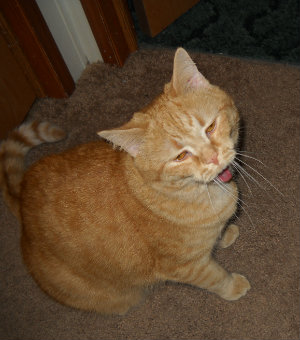 in the two grown-up kittens and keeps close tabs on them, especially Riley. All in all, we were one big happy family of people and felines.
in the two grown-up kittens and keeps close tabs on them, especially Riley. All in all, we were one big happy family of people and felines.
Until last Wednesday.
The day had started off unseasonably warm, with a slight breeze. But as the day progressed, the winds picked up. Late in the afternoon, a strong gust of wind roared through the area, bending the trees at right angles.
“Didja hear that?” Josephine asked as she came in from the garden. “Sounded like a freight train!”
Not long after that, there was another gust of wind even stronger and louder. And then the wind subsided. There was still a strong breeze, but at a more normal level, which is why I was shocked when I went into my bathroom and discovered the wind had ripped out the screen. I grasped the windowsill and looked out to see the screen lying in the middle of the grass.
I experienced a moment of actual fear thinking about Holly and Riley. The two kittens, as we still referred to them, hung out a lot in my bathroom, with one or the other usually sleeping atop my clothes hamper just below the window.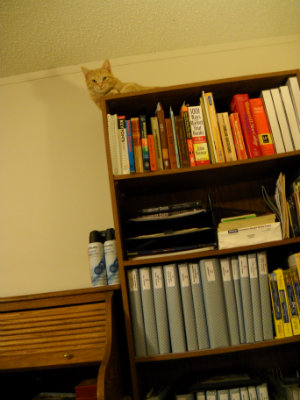 That’s when I ran through the house, yelling to Josephine about the relocated screen.
That’s when I ran through the house, yelling to Josephine about the relocated screen.
“Count cats,” I hollered to Jo, peering into our bedroom and seeing a cat sitting up in a box in front of the window. From a distance, it looked like Riley. Cali was sleeping in her usual perch on the dining room table, Sparky was coiled up on our bed, and Cisco was sitting quietly on a table in Jo’s crafts room. I’d already seen Holly crouched in the middle of the long hallway.
“Looks like everyone’s here,” I said, and Jo nodded in agreement, satisfied that our indoor cats were indeed indoors. “I’ll run out and get the screen if you’ll go into my bathroom and help me get it back into the window.”
Later, after dinner, as we sat watching a movie, Jo suddenly asked if I’d seen Riley. I paused the DVD. “No,” I said, realizing it had been about the time the orange cat would usually climb up the rear of my wingback chair and drop down to tuck himself in alongside me to nap.
Calmly at first, we began to search the house, checking out Riley’s favorite resting places. We looked into closets, checked under the bed, opened dresser drawers, peered into cabinets, pulled out chairs from the dining room table…everywhere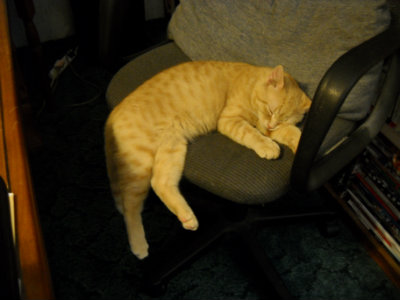 a cat might tuck into. Remembering the nightmare of Holly getting stuck behind the washer-dryer, we looked there too. No Riley.
a cat might tuck into. Remembering the nightmare of Holly getting stuck behind the washer-dryer, we looked there too. No Riley.
We stepped up the search, combing every single inch of the 2,000-square-foot home. The fear was back, flooding my whole body as I realized Riley was not inside. By this time it was almost dark. The warm day had cooled off considerably, the cold night air taking over.
I threw on a jacket, grabbed a large flashlight and went outside. I circled the house slowly, calling out Riley’s name. When I got to the rear of the house, I moved over to the shed and tried to peer into the dark crawlspace underneath. This was a favorite hiding place for the local squirrels to stash their nuts, and in which many a wandering outdoor cat would seek refuge. Even an occasional raccoon would use it as a shelter from the elements.
I searched the area alongside the shed, which was protected by a lean-to roof. This is where I kept our wheelbarrow and assorted bags of topsoil and mulch. Next to this were a couple of trash cans, an old wooden chair and some other odds and ends. Marmalade, a stray cat we had fed for years, used to sleep here. In fact, this had been where we found her when she died.
Still no Riley.
I went back inside. Jo had gone online to see if anyone had found an orange tabby. Of course, it was probably too soon for that.
I felt a knot in the pit of my stomach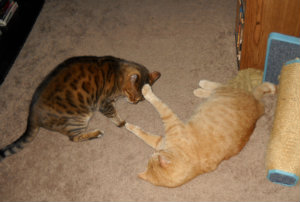 as I thought of how this adorable, gentle, affectionate cat may have been lost forever. I imagined him trotting along the country road, of maybe getting struck by a speeding car or truck.
as I thought of how this adorable, gentle, affectionate cat may have been lost forever. I imagined him trotting along the country road, of maybe getting struck by a speeding car or truck.
I went back outside and again circled the house, calling Riley’s name into the now cold night air. After awhile, I would go inside and check with Jo, then back outside, again and again circling the property.
Still no Riley.
Jo took her turn outside, actually walking up to the road and surveying for as far as she could see. I had not done so primarily because I figured he’d be afraid of the cars. Another reason, I have to admit, is that I don’t think I could have handled seeing him if he had been hit by a car.
It was late into the night when Jo and I, by now exhausted, crawled into bed, our hearts heavy with grief. Holly had wandered the house, going from room to room seemingly looking for her brother. Cisco just sat near the front door, staring into space, as if mystified by Riley’s absence.
As I drifted off to sleep, I conjured up scenario after scenario of what Riley was doing at the moment, none of them good. All I could think of was this poor little cat, barely out of his kitten days, cold and hungry, tucked away somewhere, trying to protect himself from the wind. What could he be thinking? One minute he’s 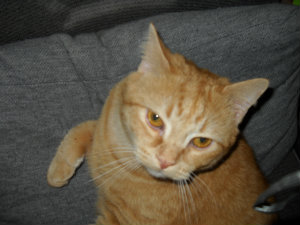 sleeping soundly on my hamper, the next he is jerked outside. Fear and sadness gripped my whole being.
sleeping soundly on my hamper, the next he is jerked outside. Fear and sadness gripped my whole being.
The next morning, I got up early as I usually did and fed the four cats. Jo, who usually slept in a little longer, had already gotten dressed.
“Coffee’s almost ready,” I said.
“I can smell it,” Jo said, “but first I wanna go out and look for Riley.” She finished buttoning her coat and pulled on her gloves.
It felt as if someone had stabbed me in the heart as I thought about this poor little cat shivering somewhere out in the cold. I had checked the outdoor thermometer when I got up and it was in the 20s.
I’ll join you in a few minutes,” I said. “I need to get a shot of coffee into me first.”
Jo grabbed the large flashlight and left, closing the front door behind her. I spooned some powdered nonfat dry milk into my mug and poured in the coffee. Stirring the dark liquid until it turned beige, I went into the living room and sat down, barely hearing the newscaster as he spoke about the mystery of the missing jumbo jet and all those people.
All I could think about was Riley huddled somewhere outside, cold, hungry and scared. I certainly could relate to what the families of the passengers on the missing plane were feeling.
Suddenly the front door swung open and Jo cried out, “David…I found him! Riley! Hurry….”
I slammed the coffee mug down and  ran for the door. Stumbling down the deck steps, I hurried after Jo as she ran toward the shed.
ran for the door. Stumbling down the deck steps, I hurried after Jo as she ran toward the shed.
“I called his name over and over,” Jo said breathlessly, “and then I shook the bag of treats. That’s when I heard him…. Let him hear your voice now.”
“Meew.” There was no mistaking Riley’s muddled, plaintive cry from under the shed. Jo turned on the flashlight and tried to show me where he was. I called his name out several times and that’s when I caught a glimpse of his face. A sense of relief flooded over me as I realized he was safe, that he had survived the cold, windy night.
Jo sounded panicky. “He won’t come out! Let him hear your voice again! He loves your voice!”
I tried to reassure Jo we’d have him inside in a few minutes. I called out to Riley again and again as I stretched out my hand under the shed. Slowly, Riley inched closer to my hand, still scared and wary of his surroundings. That’s when I grabbed him by the scruff of his neck and pulled him slowly out.
Riley was confused and still scared. He wriggled and fought as I tried to pull him into my arms. Jo took him then and pulled him close to her heavy coat.
“He’ll scratch you pretty bad,” she said. “All you have on is a thin T-shirt.” She held him tightly and bolted for the front door. I scrambled after her, suddenly aware of the cold.
Inside, Jo let Riley go. Cisco and Sparky were there to greet him. So was his sister Holly, who started hissing loudly. Obviously, Riley had picked up a plethora of different animal smells; much like a pet does after a visit to the vet.
I went into the living room and sat down, taking a sip of my by now cold coffee.
I didn't mind at all. Riley was back home, safe and sound. #
Things My Mother Used to Say (3/11/14)
As I matured into adulthood and beyond, I found myself uttering some of the same expressions I remember my mother using. As a father I would catch myself using clichés she would often say, such as “You’ll understand when you’re my age and you have children of your own.” Perfectly understandable.
But as I think back to when I was younger, there were a number of expressions she used that I’m not sure I understand today anymore than I did back then. Things like “I could eat that till the cows come home.”
What cows? Where? We didn’t live on a farm; we lived in the city. There were no cows. Mom was from Baltimore. Baltimore is a city. Are there a lot of cows in Baltimore? I think not. Certainly not any that had to do with my mother.
A favorite of mine that I never quite understood until later in life was my mom’s off-the-cuff assessment of my appearance as a child after playing in the dirt: “You look like the wreck of the Hesperus.” Like what? In those days I had no clue. Oh, I figured the Hesperus was a ship of some kind. But that’s as much as I bothered to conjecture.
A number of years ago, as an adult, I decided to research it. Had I been a student of poetry and Henry Wadsworth Longfellow, I would have known the basis for this expression much earlier in life. Apparently, Longfellow liked using local history and lore in his poems, and “The Wreck of the Hesperus” is based on two events: an actual shipwreck off Norman’s Woe – a rock reef on Cape Ann in Gloucester, Massachusetts – after which a body like the one in the poem was found, and the real wreck of the Hesperus, which occurred near Boston.
“I have a bone to pick with you,” was another one of the most common expressions my mother would use when prompted by my either doing something I shouldn’t, or not doing something I should. I still don’t know the origin of this one, and maybe I don’t want to know.
“Don’t make me have to get up and come in there,” she would warn if I happen to be quarreling with my sister in the next room, or behaving badly and loudly in some other area of the house. I guess she was implying that she was quite comfortable where she was and doing what she was doing, perhaps watching TV or reading a book, and if she had to stop what it was and expend her energy to come and discipline me, well, there would be hell to pay.
And one of her favorite expressions, which she shared with my dad, and then later my stepfather, was: “Money doesn’t grow on trees, young man.” This obviously would be in response to something I had asked for, perhaps a horn for my bike, or a new baseball glove. This obviously rhetorical statement used to irritate the hell out of me and probably is yet another reason why I got a paper route, and later shined shoes in bars.
How about “Shut the door! Were you raised in a barn?” Now why would she say that to me? OK, I realize I may have left the door ajar and she was just reminding me to close it, but did she really need to ask me if I were raised in a barn? I mean, she raised me and to my memory none of us had ever been near a barn. And yet, she must have issued this query several dozen times or more during my teenage years.
And of course one of Mom’s favorite follow-up responses to my usual “Why?” in regard to her negative response to one of my numerous requests for whatever, was: “Because I said so, that’s why.” Hard to argue with that one.
There was another expression Mom used whenever she caught me picking my nose as a youngster. “David,” she would suddenly blurt, “pick me a balloon tire!” What? In my childhood imagination, I pictured a huge balloon shaped like a tire, and wondered how it could fit inside my nose.
And then there was the dinner table. The drill was always the same: “Napkin in your lap, elbows off the table!” I guess it worked because after awhile, she stopped saying it.
Speaking of the dinner table, I’m sure I’m only one of many whose parents admonished them for picking at their food by reminding them of the “children starving in ___ (country optional).”
And if I happened to be hungry and wolfed down my food, Mom would advise me: “David, don’t be a p-i-g, hog.”
There were quite a few phrases and clichés Mom would use over the years while I was growing up, no doubt many easily shared with thousands of others. But there was one warning she would often impart when tucking me in at night. “Don’t sleep with your shoulders on the pillow, otherwise you may become round-shouldered.”
To this day, I’m careful not to let my shoulders touch the pillow. This despite not really quite knowing what being “round-shouldered” is. As an adult many years later, I reminded her of her cautionary advice at bedtime, which she promptly denied. As a matter of fact, in her later years (and Mom lived until the age of 93), whenever my sister Barbara or I would call her on some of the things she did or said while we were growing up, she would just fold her arms and say, “I deny everything.”
My paternal grandmother, although not in competition with my mother, also had her own set of catchphrases, slogans and admonitions, many of which I seem to have forgotten. Although I lived with Grandma George for only part of one year, I do recall one particular expression she used that still has me scratching my head when I think about it: “If I weren’t home, I wouldn’t be here.”
Huh? #
Dreams at 11 (3/4/14)
A few months ago I received a large envelope from my sister Barbara in which she had included a handful of photos and various papers that belonged to my mother. Mom, who was under the caring, watchful eyes of Barbara in my mother’s final years, had apparently saved a whole lot of things for a very long time.
Among the assorted documents Mom had held onto was a three-page story I had written at the tender age of 11. I had been mulling over possible ideas for this week’s Second Thoughts column (excuse me, blog), and at the suggestion of my current wife Josephine, I had been rummaging around in a box of old photographs and ephemera hoping for an inspiration.
When I read my childhood story aloud to Josephine, she said she thought it was adorable and that perhaps I should share it with my readers. At first, the thought of anyone else seeing this embarrassing attempt at creative writing had horrified me. It isn’t even good enough to be considered poorly written.
Jo insisted that people would get a kick out of it. So, since Josephine almost always gets her way, I decided not to attempt a losing battle. That’s right, I caved.
What follows here is an exact copy of what my 11-year-old self had typed, all of it inexplicably in caps. Misspellings, missing punctuation, and appalling syntax remain. I have also scanned the pages (date-stamped Nov 11, 1950) and included them here to record my equally humiliating drawings. Esto perpetuum (Let it be everlasting.)
A TRIP TO THE PLANET VENUS
ONE DAY TWO MEN WERE TALKING TO EACH OTHER, THERE NAMES WERE J. SANAN AND DR. H. PEPSON. YOU KNOW SAID HARRY LETS GO TO VENUS. ARE YOU NUTS HOW COULD WE GET THERE? BY ROCKETSHIP. OH, JUST LIKE THAT HUH. YES JUST LIKE THAT. OK SEE YOU LATER JIM. YEH. A FEW WEEKS LATER JIM CAME RUSHING INTO THE OFFICE. WHAT IS IT SAID HARRY, THE GOVERNMENT JUST GAVE US A PAPER SAYING WE CAN START ON THE ROCKETSHIP NOW. THATS WONDERFUL. TWO YEARS LATER THEY WERE DONE, THE CREW WAS HARRY, JIM, AND A DR. TOM HORNSBERRIES IT WAS TWO MINETS BEFORE LAUNCHING TIME THEY SAID GOODBYE TO EARTH AND CLIMED ABOARD THE SHIP. 8 SECONDS 7654321 THERE WAS A LOUD BOOM, THEY WERE OFF TO VENUS.
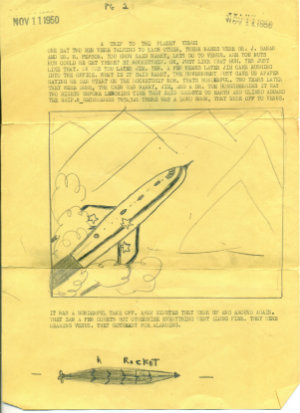
IT WAS A WONDERFUL TAKE OFF. A FEW MINUTES THEY WERE UP AND AROUND AGAIN. THEY SAW A FEW COMETS BUT OTHERWISE EVERYTHING WENT ALONG FINE. THEY WERE NEARING VENUS. THEY GOT READY FOR A LANDING.
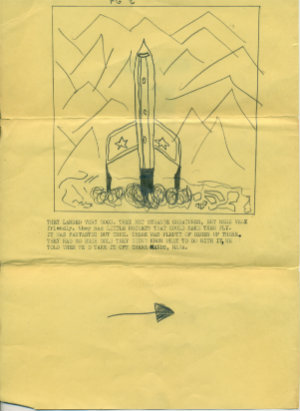
THEY LANDED VERY GOOD. THEY MET STRANGE CREATURES, BUT WERE VERY friendly. They had LITTLE ROCKETS THAT COULD MAKE THEM FLY. IT WAS FANTASIC BUT TRUE. THERE WAS PLENTY OF OXGEN UP THERE. THEY HAD SO MUCH GOLD THEY DIDN’T KNOW WHAT TO DO WITH IT, WE TOLD THEM WE’D TAKE IT OFF THERE HANDS, HAHA.
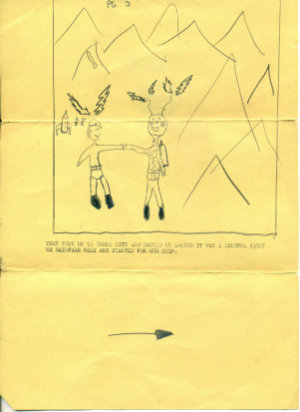
THEY TOOK US TO THERE CITY AND SHOWED US AROUND IT WAS A BEAUTIFUL SIGHT WE SAID FARE WELL AND STARTED FOR OUR SHIP.
Judging from the last line, there may have been a fourth page. Certainly the arrow at the bottom of the page would seem to indicate that. However, if there were another page, it’s been lost forever. I’m afraid purveyors of youthful journalistic endeavors will have to be content with the three pages replicated here. #
Mother Lode (2/25/14)
I’ve written here before about the affliction I suffer from called “collecting.” When I was very young and had no money with which to purchase things, I would collect items I found on the street. Things like ice cream sticks and bottle caps.
As I got older and was able to make a few bucks with a newspaper route, or delivering meat for the local butcher, or shining shoes in neighborhood bars until I got tossed out by the bartender, I would invest my hard-earned dimes and quarters in baseball cards and comic books.
Oh, there was a brief period when I pursued the loftier hobby of collecting commemorative U.S. plate blocks, but it occurred to me after awhile that the U.S. Postal Service was issuing new stamps just about every week, gobbling up my money faster than I could make it.
I also pursued the even loftier hobby of coin collecting – until the government stopped minting coins with silver content after 1964. Shortly thereafter, it seemed like everyone had become involved in searching for pre-1965 dimes, quar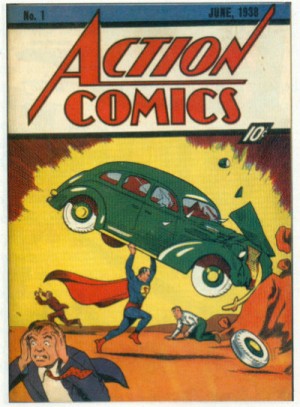 ters and 50-cent pieces. All of a sudden, the only way in which one could acquire an older coin was to buy it from a coin dealer.
ters and 50-cent pieces. All of a sudden, the only way in which one could acquire an older coin was to buy it from a coin dealer.
I sold my stamps and coins and concentrated on baseball cards and comic books, not that I had ever given up the latter two. In addition to baseball, I also collected several kinds of non-sports cards such as Wild West; Freedom’s War; and Jets, Rockets, and Spacemen.
I used to keep the various sports cards and non-sports cards in cigar boxes, which were easy enough to come by simply by visiting any store that sold cigars and tobacco products and asking them for a few empty cigar boxes. They were happy to accommodate anyone who asked for them as it meant that much less trash they had to have picked up.
Collecting baseball cards was a very active hobby in that not only did we put away the various annual sets in mint condition, we either traded or “flipped” the doubles we got. This of course aided us in building sets more quickly.
With comic books, we couldn’t “flip” them, but we did do some trading in order to read as many titles as we could. In the 1940s, I read Donald Duck and Superman, along with Little Lulu and Batman, and so many others. But then in 1950 or 1951, I discovered the comics of a company called Entertaining Comics, or EC, which included the wonderful Science-fiction titles of Weird Science and Weird Fantasy. These comics were extremely well-written and edited, along with some of the best artwork ever done in the field.
Other comics included the best-selling horror titles of Tales From the Crypt, The Vault of Horror and The Haunt of Fear. Their two war titles, Two-Fisted Tales and Frontline Combat, were painstakingly factual and actually featured mostly anti-war themes.
Cri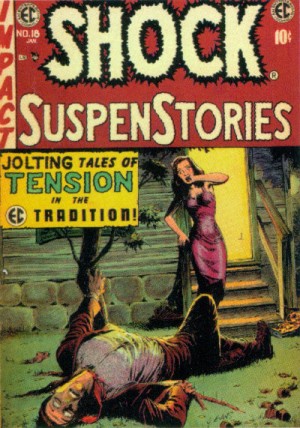 me SuspenStories and Shock SuspenStories were also part of EC’s “New Trend” era. Later MAD and Panic were added to the fold. MAD was a regular 10-cent comic book for 23 issues, morphing into the magazine format still popular today.
me SuspenStories and Shock SuspenStories were also part of EC’s “New Trend” era. Later MAD and Panic were added to the fold. MAD was a regular 10-cent comic book for 23 issues, morphing into the magazine format still popular today.
The point here was that with the introduction to EC, my “collecting disease” kicked in and I became fanatical about not only reading each issue of every EC comic book as it was published, but also placing each one in a separate stack in my bookcase. At one point, I began haunting the secondhand book stores and buying the earlier issues I missed. Once the book store owners figured out what I was looking for, the price started to increase. At first they charged $1.00 for an issue. That quickly multiplied two and three times that amount. Keep in mind that money went a lot further in the 1950s.
Then, as fate would have it, in late 1955 or early 1956, I decided to put aside all childish things and sold my collection prior to joining the Navy. I think I sold it for about $500.
But in the late 1970s or early 1980s, I picked up a battered copy of Shock SuspenStories #18, the final issue of that title, at a local flea market for about $10.
I was off and running.
I’m not sure why, but I decided it would be a good idea to re-collect my beloved ECs. And I did, scouring the secondhand bookstores, thrift shops and flea markets. My daughter Jennifer bought me a subscription to Comics Buyers Guide (CBG) and I successfully pursued copies of EC comics through mail order.
In order to pay for my new hobby, I began setting up at local flea markets on weekends and selling various issues of non-EC comics that I had picked up here and there. I had purchased a huge collection of Marvel comics in mint condition at one point, mostly multiple copies of different issues from the 1960s and early 1970s. I paid a low price and was able to off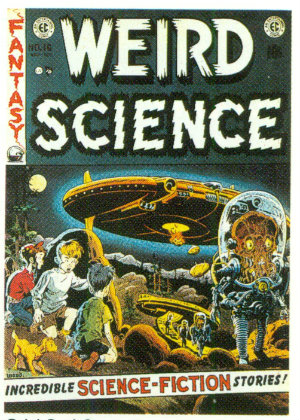 er them at an equally reasonable price. They sold fast and furious.
er them at an equally reasonable price. They sold fast and furious.
This, in turn, led to my setting up at the Stormville, New York, flea market, a huge, sprawling affair at the Stormville Airport held only twice a year on holiday weekends. Antiques and collectibles dealers came from all over the country to offer their wares. I did quite well myself, but more importantly was what happened as a result of the man who stopped by my table eager to chat.
He was an auctioneer from the Albany area who explained that he had a number of boxes of Golden Age comic books in his garage and would be willing to sell them to me for half of Guide. He was referring to the Overstreet Comic Book Price Guide, the accepted “bible” in the comic book field.
Long story short, my wife and I took a two-week vacation that would include stopping to see this auctioneer near Albany. We were headed to Niagara Falls, and then continuing into Canada on up to Montreal and then back into the U.S. through New England.
When we arrived at the man’s home, he immediately led me to his garage where, true to his word, the three or four boxes of comic books from the 1940s and ’50s sat on a table. This was the dream of every collector, to find a concentration of whatever they collected in one place, with a price that was within reach. This was the so-called “Mother Lode.” The comics were in high grade, with beautiful white pages and sharp colors. I know I must have salivated as I pored over the collection. There were indeed some beautiful ECs, which I did eventually select.
But it was what I didn’t purchase that still gnaws at me today. There were issues of Superman numbered in the single digits, for example. All of the comic books in those boxes appreciated rapidly in the ensuing years. Comics such as Batman and Wonder Woman, etc. I don’t think Action #1, published in June 1938, was there, the comic book that featured the first appearance of Superman, but its value today is an example of what I may have passed up. A high-grade copy of this comic book recently sold at auction for more than $2 million. It happened to have been owned by Nicolas Cage, the actor and well-known comic-book collector.
I spent $500 with the auctioneer, buying mostly ECs. Now don’t get me wrong, I eventually sold my second collection of ECs to a dealer a few years later for about half Guide, which totaled about $6,500. But had I been better capitalized that day and wise enough to concentrate on the superhero titles, well, that would have been our retirement annuity.
Unfortunately, Paris will have to wait. #
Good Drug, Bad Drug (02/18/14)
Editor’s Note: The following guest blog is another excerpt from the forthcoming book, Silent Tears, written by my wife and co-author of Stardust Dads, Josephine C. George.
Two months before we moved out to the country, in November 1972, my 5-year-old was running a temperature of 102 degrees. “Bring him over,” the nurse said cheerfully. “We’ll have the doctor take a look at him.”
Two hours later, I was giving Grandma all the details about our visit. “Billy has a sore throat. The doctor gave him two shots of penicillin and I have to call back tomorrow to get the results of the throat culture –”
I was still talking when Billy ran over to me and whined, “Mommy … my mouth … it’s burning!”
I could see the area around his mouth and nose was slightly red and swollen. I bent down to his level to take a closer look and asked, “What happened? Did you get hurt?”
In a confused, high-pitched voice, Billy cried out, “No!” And then he coughed several times. He brought a finger to his mouth. “It feels funny, Mommy … it hurts.”
I’d never seen anything like this before and repeated the same question, “Tell Mommy. Did you get hurt? Did you fall down and hurt your mouth?” Again he cried no. But this time he sounded annoyed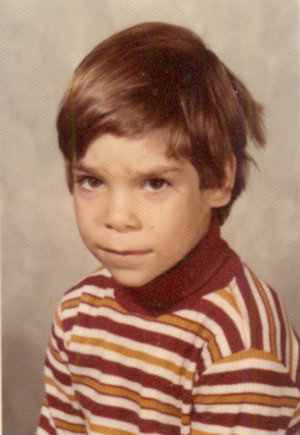 with me. Just seconds had passed and I could see that the swelling was more noticeable.
with me. Just seconds had passed and I could see that the swelling was more noticeable.
Grandma tried to calm him down while I dialed the doctor’s office. I didn’t have an ounce of understanding that Billy’s cough indicated the swelling was also going on internally, or that his throat was closing up. I had no idea that he could stop breathing completely … and die!
The receptionist answered. But before I could get a word in, she told me to please hold. I heard a click. And then there was a hum. I paced back and forth. Billy was crying persistently now, and coughing more. I stroked his back. “Mommy’s calling the doctor. It’s gonna be okay. Don’t cry.”
At least a full minute had passed when the receptionist clicked back on and said in a monotone voice, “Westchester Pediatric Group. May I help you?”
In one continuous breath I said, “This is Mrs. DeVaynes. I was just there at the office with my son Billy … we saw Doctor Peterson about an hour ago. Billy has a sore throat, but now his face is all red and swollen. Something’s wrong. Can I speak to Doctor Peterson?”
With the same even tone, she replied, “Hold on, Mrs. DeVaynes, I’ll ring his line.”
My eyes were focused on Billy when the receptionist returned. “Hello? Mrs. DeVaynes? The doctor’s line is busy. You’ll have to hold.”
By the time my mind unscrambled her words to an understanding, I was listening to the dull hum over the phone again. My legs were trembling as I moved closer to Billy. The swelling was definitely worse. I could see puffiness under his eyes that I knew had absolutely nothing to do with his incessant crying.
“What’s the matter?” Grandma asked.
“The receptionist's got me on hold. The doctor's line is busy. Come on, come on!” I cried, talking into the dead receiver. A split second later ... click. “Hello, Mrs. DeVaynes, I'm trying him now.” Startled by her voice, I took a step backward to listen for the phone to ring. But I heard nothing. Seconds later, the receptionist was speaking again. “Sorry, his line is still –”
This time I quickly broke in and snapped, “Please, this is an emergency! I have to talk with the doctor now. My son’s face is swollen … and it’s getting worse.”
This time her voice held a spark of concern. “Hold on, let me try him again.”
But the line was still busy.
That’s when I heard someone knocking on Grandma’s front door. My husband Richard had apparently finished work early that day and had come looking for us. Without the usual hello, and the receiver still pressed to my ear, I said, “Keep your coat on … something’s wrong with Billy.” I was halfway into the details when the receptionist got back on the line.
“Mrs. DeVaynes? I’m ringing him now.”
But that wasn’t true. The line was still busy. And I felt a surge of panic. Angrily, I interrupted the receptionist and asked her to break into the doctor’s phone conversation. Her reply was negative. I felt desperate and raised my voice. “This is an emergency! If you can’t cut in on the line, then I want you to run in to the doctor’s office and get him.”
“Hold on. I’ll try him again.” Her voice remained emotionless. And then she came back on. “Sorry, it’s still busy.”
“I can’t wait any longer,” I screamed. She tried again and this time the phone was ringing. The doctor said he would meet us at the emergency room.
Richard swooped up Billy in his arms, carried him out to the car and placed him in my lap. He drove like a madman, breaking the speed limits, passing cars and beating a red light by a split second. Billy wasn’t crying anymore. He was limp now, and listless. His face was distorted. I recognized him only by the familiar closeness we’d shared. As in the past, I comforted him as he now lay motionless in my arms.
Richard pulled into a “no parking” zone directly in front of the emergency-room door. He took Billy from me and we raced through the corridors together. Several nurses ran toward us, obviously responding to the orders our doctor called in just minutes earlier.
As my husband lifted Billy into one of the nurse’s arms, he cried out, “Mommy! Mommy!” Tears ran down my face as I watched them rush off and disappear behind a white curtain. I could hear Billy crying, and then scream … again … and again … and then again.
At least twenty minutes passed before the doctor emerged from behind the curtain. I picked up bits and pieces as he spoke, trying to reaffirm that my son was alive, and then to satisfy my hope that his awful disfigurement was only temporary.
“I was prepared to do a tracheotomy on Billy,” the doctor said. “He was barely breathing when you brought him in. We gave him three shots of adrenaline and he responded quickly to it. He’s going to be all right now, but we do have to keep him here at least overnight. You never know when someone’s going to have an allergic reaction to penicillin."
“Repeat after me: ‘My name is Billy DeVaynes, and I’m allergic to penicillin.’” This became our daily mantra. But was my son really allergic to penicillin? We weren’t about to consider that he wasn’t. This question came up when Billy had the same serious allergic reaction after eating a raisin cookie, and again when we all had eaten at a fast-food restaurant with an all-you-can-eat salad bar.
Trips to an allergist and many tests later did not identify the problem, but only left us with a long list of what Bill was allergic to, which included everything from grass and nettles, to bees and horses. “But my son has never in his life come face-to-face with a horse!” I cried. We left the doctor’s office with a prescription for some EpiPens.
“Promise me you’ll use this EpiPen if you ever have another allergic reaction and Mommy’s not nearby to do it for you.”
“No! I won’t stick a needle in my arm. No! No! No!”
I left an EpiPen with the nurse at school. Billy had his next serious allergic reaction during the lunch hour, while he was out on the playground. But the nurse refused to give Billy the shot to slow down the reaction. Instead, she called me at work and insisted I pick him up at school and quickly get him to the nearest hospital. Apparently, no one including the nurse at school was authorized to “stick” my son with the EpiPen because his sudden facial swelling and cough indicated he was in a potential life-and-death situation.
I couldn’t believe it! Protecting school personnel from the possibility of getting sued was more important than my son’s life. Fear and rage consumed me.
Will I ever forget that my son’s cough was a critical symptom to his allergic reaction?
Not in this lifetime. #
The Feline Side (2/11/14)
Someone asked me recently what exactly defines my life. Now, I’m not one usually at a loss for words; just ask anyone. But I found that question not so easy to answer. Editor, writer, reader, collector, husband, father, son, brother – all of these and more, but not necessarily in that order. As I said in my last column, I’m not sure what exactly defines my life; I’m still doing research.
Maybe the cats and dogs I’ve loved for the better part of it. All during my childhood, when I was given a pet, it was inevitably taken from me soon after. There was the Mexican Chihuahua that caught pneumonia after I placed him in a shallow pool on a warm day thinking he’d be able to cool off. My mother gave the shaky pup to the next-door neighbor to nurse back to health and I never saw him again.
When I lived for the better part of a year with my grandmother in Geneva, Illinois, I was given a kitten that I named “Mischief.” When my parents brought me back to New York at the end of that summer, I had to leave Mischief behind.
Even before Geneva, when I was very young and living in Old Westbury, I was 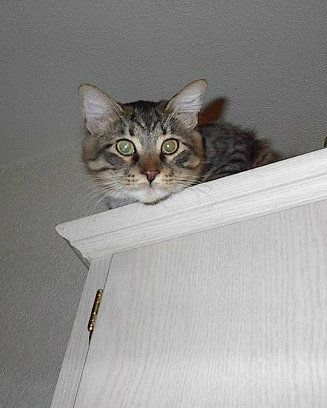 presented with a kitten, which I at once adored, but my mother couldn’t handle the effort it took to look after it. I had him for maybe two days before he was suddenly gone.
presented with a kitten, which I at once adored, but my mother couldn’t handle the effort it took to look after it. I had him for maybe two days before he was suddenly gone.
As an adult, shortly before I first got married, I just couldn’t wait to have children, so I went down to the local pet store and purchased a puppy of dubious heritage for $10. You can just imagine the look of surprise on the face of my wife-to-be when I walked through the door of our furnished basement apartment with a small, short-haired, black-and-brown bundle of nervous energy.
In the ensuing days, I found out that puppies don’t come housebroken or pre-trained. That first morning after I had brought him into the apartment, the puppy jumped into bed with us and peed all over everything, including us. Putting newspapers down came next.
We also quickly discovered that the puppy would eat anything and everything, and seem to be particularly fond of onions, raw or cooked. The name “Onion” seemed appropriate and it stuck.
Obviously, Pat and I both had to work, which meant leaving Onion alone in the apartment for the entire day. To minimize the damage the puppy might inflict on the furniture that wasn’t ours, we put newspapers down and kept Onion confined to the kitchen by placing the clothes hamper in such a way as to block the door-less doorway.
Yes, you guessed it. Onion ate the hamper. Or at least it appeared that way as the dog literally tore it to shreds. Long story short, the landlord, who lived upstairs, was furious about the damage, not to mention being upset with us for bringing in the puppy in the first place. He raised our rent immediately, which of course we really couldn’t afford.
We found an unfurnished, four-room apartment in Flushing, out near Bayside, and pets were not allowed. Despite our increa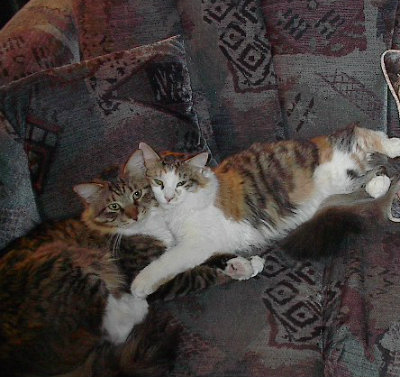 sing fondness for Onion, we agreed to let Pat’s mother take him to Pennsylvania and give him to some friends who had a big farm where the dog could romp around freely.
sing fondness for Onion, we agreed to let Pat’s mother take him to Pennsylvania and give him to some friends who had a big farm where the dog could romp around freely.
A week later, Onion was hit by a car and killed.
We moved into the four-room apartment, which actually was the second floor of a private residence, with the landlord living below us this time. After we got married, we initially made do with furniture odds and ends given to us by each of our families. It wasn’t long before David was born, and Jennifer a couple of years later.
We weren’t allowed pets, but the landlady’s cat, “Johnny,” would wander up into our apartment on a regular basis. The children loved and enjoyed him, which eventually led me to make another trip to a pet store, this time with my daughter, and purchasing our own cat, a calico we named “Scourage,” who lived until she was 17. We came up with that name after the Siamese cat of a friend visiting us scurried across the kitchen floor. One of the children described that action as “scouraging” across the room.
There were many cats after that. We had purchased our first house by then, a modest bungalow in upper Westchester, in Mohegan Lake. We still had Scourage, who was Pat’s cat all the way. Oh, she tolerated me, but in general she didn’t like male humans. A friend of mine, Gary, would come by from time to time, and Scourage not only wanted nothing to do with Gary, she actually would hiss and try to claw him whenever he was around – except when shrimp were involved. If Gary was visiting, and we had shrimp, Gary would hand-feed Scourage without incident. Later, he would attempt to pet Scourage, and the calico would hiss and try to scratch Gary’s eyes out.
One day, David and Jennifer came running into the house gasping for breath, with Jennifer clutching the tiniest of tabby 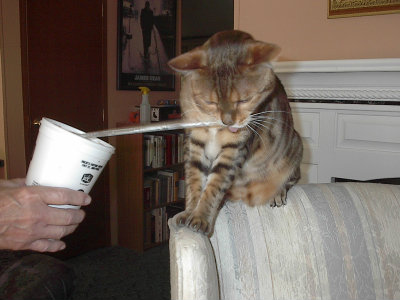 kittens, and with huge ears.
kittens, and with huge ears.
“We found him in the middle of Cooper Street, Dad,” David said. “He’s all alone and hungry.”
“Can we keep him, Dad?” Jenn pleaded. “Please.”
“We’ll see,” I said, knowing full well that the little guy was in. The kids named him “Prounce,” also based on a mispronounced word used by one of them. The oversized ears were a tip-off, but we didn’t know it then. Prounce grew quickly into the ears, soon weighing in at 23 pounds.
Scourage resented the kitten from day one, and never did accept him as a member of the family. Unfortunately, at age 7, Prounce was diagnosed with FIP (Feline Infectious Peritonitis) and had to be put down.
We replaced Prounce by adopting a semi-longhair kitten the children named “Flutter.” When we found out he had a sister, we went back to the animal hospital and also rescued “Thumper.”
All three cats made the trip with us when we moved to western North Carolina, settling into a large house nearly 100 years old and wonderfully refurbished. Scourage roamed the 3,000-square-foot house, enjoying the spacious home with 10-foot-high ceilings and three working fireplaces, but eventually expired of old age at 17.
When Pat and I separated prior to being divorced, I decided to remedy my loneliness by once again rescuing a kitten. “Bratly” was a calico who became my “separation cat.” She talked to me incessantly, at times holding her breath and dragging out her meows in a kind of singsong delivery. She was a brat much of the time, doing things she shouldn’t. I added the adverbial “ly” so that the name came off the tongue better.
Since Flutter and Thumper had remained with Pat, Bratly filled the void they had left until I remarried five years later. The little tyke flew with us when we made the move to Las Vegas, braving the baggage compartment the whole trip. She spent several wonderful years with us before succumbing to a thyroid storm. We immortalized her in our first novel, Stardust Dads.
Today, as many of our regu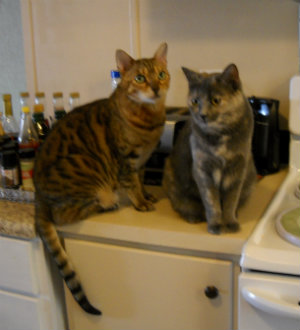 lar readers know, Josephine and I share a home with five adult cats. Sparky, a tabby-Maine coon mix; Cali (we didn’t name her, honest), obviously a calico; Cisco, a full-blooded Bengal; and the kittens, now a year old: Riley, an orange tabby; and Holly, a dilute tortie.
lar readers know, Josephine and I share a home with five adult cats. Sparky, a tabby-Maine coon mix; Cali (we didn’t name her, honest), obviously a calico; Cisco, a full-blooded Bengal; and the kittens, now a year old: Riley, an orange tabby; and Holly, a dilute tortie.
Holly hops into bed and sleeps with me every night, purring loudly for the first half hour. Riley’s claim to fame is his ability to catch anything I toss to him. When I give him treats, he catches them individually in his mouth. If I toss a small toy to him, he’ll leap into the air to catch it with his paws. He is incredible. One of these days I’ll figure out how to take a quick video of him in action with my lousy phone/camera and run it here.
Cali will be 11 next month, and Sparky will be 12. Both mature cats nap a lot, like their daddy. They occasionally play, but mostly they eat, sleep and use the litter boxes. The Bengal, Cisco, is devoted to his mommy, Josephine. He is with her constantly. At times, he will terrorize Sparky or Cali, but he adores the kittens and watches over them with a parental eye.
These wonderful animals are a major part of my life today. They are quite demanding and take up a lot of my time.
I wouldn't have it any other way. #
The Breadbox (2/4/14)
Editor’s Note: The following guest blog is actually an excerpt from the forthcoming book, Silent Tears, written by my wife and co-author of Stardust Dads, Josephine C. George.
I learned early on how the written word can have a positive effect on someone. I also learned how it can wield an indisputably negative influence. That lesson came not from my fourth-grade teacher, but from my mother…on Mother’s Day. She and my father had been arguing more than usual all that week, and it was the first time Dad hadn’t offered to take me out shopping to buy Mom a gift.
I was at the top of my fourth-grade class and perhaps my father assumed I wouldn’t have any trouble coming up with something creative. Why not? All I needed to do was take a piece of colored construction paper, fold it in half, and then crayon a few flowers near the words, Happy Mother’s Day. But I decided this wasn’t good enough because I had been a firsthand witness on too many occasions when Dad’s carefully selected gifts brought out the worst in Mom.
Real flowers…now that would make a great gift. My parents were still in the kitchen when I slipped out the front door and wandered over to our next-door neighbor’s chain-link fence. A chill went through me. What if old Mister Nick caught me peeking through the metal loops? The garden in his backyard was nothing  but vegetables anyway. I moved on to Mrs. Labella’s fence and peered at the kaleidoscope of colorful flowers. Her car wasn’t in the driveway. Of course; it was Sunday. She had probably gone to a later mass at church.
but vegetables anyway. I moved on to Mrs. Labella’s fence and peered at the kaleidoscope of colorful flowers. Her car wasn’t in the driveway. Of course; it was Sunday. She had probably gone to a later mass at church.
Stealing was a sin. I knew this. And, I figured it a greater sin if you did it on a Sunday. Without further hesitation, I turned away and headed back home empty-handed. This was a mistake. I froze at the doorway between the dining room and kitchen when my eyes locked with my mother’s. I wrinkled my forehead, trying to read what was coming next. The look on Mom’s face spelled trouble. But I hadn’t been gone more than five minutes. And I hadn’t stolen anything.
“Well, young lady, don’t you have anything to say?” Her eyes held me in place.
I was scared. I didn’t know what she wanted me to say. I didn’t know the answer to her question. What I did know even then was how my naked mind could turn her anger into rage. Dad looked down at his empty, egg-stained plate when Mom cried out, “It’s Mother’s Day … and my God … my daughter doesn’t love me … I don’t deserve this … dear God, are you listening … this is the worst day of my life.”
My cheeks burned. My tears were on fire. I felt hopeless. Helpless. Ashamed.
“Dear God…help me,” Mom continued. “What am I going to do?” she yelled. I watched her bite the bottom of her lip and clench her fists, trying to hold back from lashing out at me. “I know. I know,” she repeated to herself, as though she were responding to a voice inside her head. She turned away from me, grabbed a pad of white paper and tore off a sheet. Reaching for the soup can that held some pens and pencils, her trembling hand tipped it over. “Son of a bitch!” she swore, grabbing one pen and sweeping all the rest from the counter to the floor.
Mom voiced each word with a deliberate, angry tone as she scribbled furiously about her shameful daughter on this particular Mother’s Day. And when Mom finished writing about what I did to her and the horrendous pain she’d felt, she placed the documented details into an old tin breadbox.
Her actions left me with gut-wrenching pain and humiliation.
Indeed, my writing experience as a child began on this frail foundation. If only I could have found the words within me to ease my mother’s anguish. If only my unwritten words could have made me feel my mother’s love and approval was still there.
I didn't realize it then, but memories of the words in the breadbox would haunt me for a very long time to come. #
Milestone (1/28/14)
Next month – February 19, to be exact – I will have reached my 75th birthday. This means I will have lived on this planet for three-quarters of a century. During that time, I’ve seen and experienced quite a bit of living.
My earliest memory was of being frightened, of looking out through a window and seeing an ominous bell tower with a clock face staring at me. When I mentioned this to my mother a few years ago, she said she found that hard to believe – primarily because she was familiar with such a view. It was from their apartment in Brooklyn in 1939 when my dad worked for the now defunct Brooklyn Eagle newspaper. And that for me to have a memory of this would mean I was able to remember when I was merely months old.
Today, of course, I have trouble remembering what I said or did five minutes ago. But that’s another story.
My early childhood consisted of growing up on New York’s Long Island, living in various houses in Merrick, Garden City, Lindenhurst, and Old Westbury. The interim between leaving Brooklyn and living on Long Island is far from being crystal clear, but I do know we lived in an apartment briefly because my sister Barbara, who is two and a half years younger, inadvertently slammed the apartment’s front door on the index finger of my left hand.
I recall my mother running out into the building’s hallway in which I was running back and forth screaming at the top of my lungs. I still remember the intense pain and the shock of seeing my own blood gushing from my finger, the tip hanging by a thread of flesh. She grabbed me and hustled me back into the apartment, thrusting my hand under cold water.
I’m not sure what happened after that. I guess she had to leave me briefly to call my father. My next memory was of being in the hospital where they treated me. I found out later that my dad was beside himself, pleading with the surgeon to save my finger – which they did. They sewed the tip back on – no mean feat in those days – which today retains an odd appearance. It’s pretty much like any of my other fingers today, except in cold weather it is the first to become numb at the tip.
Obviously, I can’t run through my whole life in even the sketchiest detail in one essay, just maybe recount a few of the highlights – and lowlights – as they occurred. As I already have in the past, I will write about some of them from time to time as this blog continues. Last week, for example, I wrote about one of the highlights of my life, the birth of my son on New Year’s Day.
Another major highlight of my life was the birth of my daughter, Jennifer, on January 10th, two years after my son was born. It was nowhere near as dramatic in that it didn’t happen on a national holiday, and I wasn’t hung over, but certainly it was a significant event in my life nonetheless. How wonderfully fortunate, we thought at the time, to have been blessed with both a boy and a girl.
I was only 16 when I took my physical down at Whitehall Street in Manhattan prior to entering the U.S. Navy. The day after my 17th birthday, 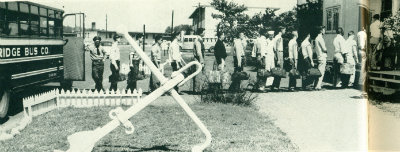 February 20th, I was sitting on a Trailways bus barreling along the New Jersey Turnpike heading toward Navy boot camp in Bainbridge, Maryland. That nine-week period of my life in and of itself is worthy of a couple of blog posts.
February 20th, I was sitting on a Trailways bus barreling along the New Jersey Turnpike heading toward Navy boot camp in Bainbridge, Maryland. That nine-week period of my life in and of itself is worthy of a couple of blog posts.
During this early phase of basic training, we underwent extensive testing, including a GCT (General Classification Test). With the usual test score being in the range of 45 to 55 out of a possible 72 points, my score of 63 was considered high enough to be officer material. My test scores in sonar and radar were even higher at 68 and 69 respectively, thus I was tentatively assigned as a Communications Technician, with my next duty station following graduation slated to be Imperial Beach, California. I was excited and perhaps my life would have been a lot different had that taken place. But as fate would have it, a background check revealed my juvenile delinquent days, which included an arrest and brief jail time (two nights). I had not b een convicted and had received a certificate of disposition from the court. But that wasn’t enough to give me secrecy clearance by the government.
een convicted and had received a certificate of disposition from the court. But that wasn’t enough to give me secrecy clearance by the government.
As a result, following basic training, I was assigned duty aboard the USS Norfolk, a ship described as “a destroyer leader.” Basically, it was a destroyer built on a frigate (cruiser) hull. Having no identifiable skills, I was assigned to the “deck force,” which means chipping and scraping paint, and of course painting.
I reported to a soft-spoken Southern bosun’s mate 3rd class, a guy named Levy, who handed me a can of paint, a paint brush and a lifejacket and instructed me to climb over the side onto a wooden plank held by thick ropes where two other sailors would lower me down to the area needing painting.
I remember vaguely telling Levy that wasn’t for me and did I have something else I could do that didn’t involve hanging over the water on a piece of wood. Levy never flinched and said, “Come with me.”
I followed Levy below decks and as far forward as one could go, into the forecastle compartment, pronounced “fo’c’s’l” and now usually spelled that way. Levy slammed the hatch shut, turned, and punched me squarely in the face. I went down fast. When I got back up, he asked me if I was ready to go over the side. I nodded and that was that.
However, before the year was up, I had gone AWOL for a few days, got court-martialed and did some brig time, and was later reassigned to another tin can (destroyer), the USS Robinson. After that, I squared away and got my act together. I eventually made 3rd class petty officer as a Storekeeper, as well as creating and publishing several issues of the ship’s newspaper, “The Word” (mimeographed).
During my three-and-a-half-year hitch, I traveled all over the world, to Cuba, Jamaica, Europe, through the Suez Canal, Pakistan, etc. And believe me, the stories are endless.
What defines my life so far? I'm not sure. I'm still doing research. #
Negative Run (1/21/14)
I knew right away it wasn’t gonna be the best Sunday I ever had. The tip-off came when I tried to flush my toilet. I had flipped the handle and…nothing. I turned the faucet handles of my bathroom sink, first the cold and then the hot and…also nothing. I went into the kitchen and tried the sink faucets there and…again, nothing.
Next, I checked the house circuit breakers, which are in the laundry room. Nothing had been tripped. I went outside and checked the circuit breakers specific for the well pump. The fact that they were still on indicated the pump was viable.
A week prior to this event, I had noticed that our water pressure had begun to fluctuate widely, something it had not ever done before. It was most noticeable when the toilet tank was refilling. And it seemed to be getting worse. Taking a shower was less than an enjoyable experience.
I had gone online and Googled the question: What could be making my water pressure fluctuate? Among the numerous responses, the most compelling answer had to do with the filter. I had mentioned this to stepson Bill, who came out the next day with some filter cartridges. The only problem: After thoroughly examining  the entire area surrounding the pressure tank, he concluded that there was no filter. Since this was an area in which Bill had minimal experience, I decided to sleep on it before calling someone who dealt with this kind of thing on a daily basis.
the entire area surrounding the pressure tank, he concluded that there was no filter. Since this was an area in which Bill had minimal experience, I decided to sleep on it before calling someone who dealt with this kind of thing on a daily basis.
That following Sunday the water stopped flowing and I was suddenly wide awake. My wife Josephine had an early Monday morning medical appointment, and she let me know more than once that she had better be able to shower beforehand. I decided to call Travis, who had installed our new well pump back in April 2011, 10 months after we had moved into the house.
To my surprise, Travis came right out that Sunday morning. He checked everything I had checked, including what I hadn’t known about: flicking the switch on the tank a few times. He told me to go in and try turning on the water, which I did. And the water flowed once more.
“It’s a miracle,” I yelled, grinning from ear to ear. Travis, however, was not as elated.
“It’ll just go off again,” he said, explaining that the pressure tank was “busted” and had to be replaced. “Got one on the truck,” he said. Later, he had to run to Lowe’s to pick up a few parts he needed. But before the day was over, we had a new holding tank and water with pressure that didn’t fluctuate.
We were also $711.26 poorer.
Still, I was grateful that the problem had been resolved. I never figured that we’d get the water back on so quickly, and on a Sunday at that.
Travis explained that he didn’t have any pipe  wrap on the truck, but that I needed to wrap some protection around the pipes ASAP since we were expected to have a few more cold snaps in the days ahead. The previous owners had just slapped some regular household insulation around them and taped it tight. Which I guess worked OK, but pipe wrap is much safer to use.
wrap on the truck, but that I needed to wrap some protection around the pipes ASAP since we were expected to have a few more cold snaps in the days ahead. The previous owners had just slapped some regular household insulation around them and taped it tight. Which I guess worked OK, but pipe wrap is much safer to use.
When I had Josephine call Bill back and ask him if he had pipe wrap, he said he did and that he’d bring some over Monday, today, and put it on for us. Best-laid plans, however. After getting up before dawn and taking Jo to her medical appointment, Bill called to say he was slammed with work and hard-pressed to come out today and instead sent Brian, Jo’s youngest.
Brian started to put the pipe wrap on when he noticed a drop of moisture forming under the section of horizontal PVC where it was connected to a brass fitting. I called Travis, who was on another job several counties away, and he said a little drop of water wasn’t gonna hurt anything, but he’d send someone out Tuesday to tighten it. Brian had tried, but was afraid something would snap if he tightened it too much.
Sooo, I dragged out some unused R11 insulation I had stored in our shed and Brian fashioned something to cover the pipes temporarily. And then, without being asked, he washed our two cars and blew the rest of the pesky leaves (you remember the pesky leaves) into the woods.
Up until now the New Year has not started out so well. You might remember my blog a couple of weeks ago in which I recounted New Year’s Day evening during which Sparky scratched Cisco on the nose, and Cisco’s nose wouldn’t stop bleeding. Then Jo encountered a possible medical problem, which so far has turned out to be less than serious. But not before she had to undergo some very painful testing.
I, too, did not escape unscathed. Sitting at the computer the other evening, I suddenly coughed and either broke a rib or tore some ligaments. All I know is that I still hurt severely. And when I sneeze or cough, the pain is awful. In bed, I find it next to impossible to turn over without experiencing pain.
Now, where the pain is worse, there is some bruising, which is to be expected. But lower down, across the right side of my stomach and around my side to the back, some very dark purple bruising suddenly appeared. There is no pain there, but I’m not sure if it’s related to the previously mentioned bruising. If it isn’t, well, yikes!
I have a doctor’s appointment Friday and hopefully will get some answers. Meantime, I’m sure of one thing:
So far, 2014 sucks. #
New Year’s Surprise – Part II (1/14/14)
As I said last week in Part I of this essay, you never know what’s going to happen on any given day, much less the first day of a new year.
I remember the morning of New Year’s Day in 1962 as if it were yesterday. The first clue I got that it would not be an ordinary day was when my first wife Patricia woke me up very early to inform me that she was having contractions and that we needed to call the doctor and head for the hospital.
I remember I had instantly panicked. We’d gotten home just a few hours earlier and I was a bit hung over. Our first baby was not yet due, but we had been to a holiday party the night before and I’d gotten it on 8mm film of my wife dancing the polka with freewheeling abandon.
In those days, I was working two jobs, going to night school, and had no car. My close friend and former Navy shipmate Skodt-Nielsen lay out cold on the floor of what was to become the baby’s room. Skodt’s car was parked out in front of our four-room apartment, the second floor of a private residence in Flushing, Queens, New York. Our landlord and his wife lived downstairs.
I attempted to wake Skodt up, but he may as well have been in a coma. I went through his pockets until I found the car keys. Pat had called the doctor who said he would meet her at the hospital. I was a mess. All I could think of was asking Pat if I should wear a tie.
While Pat was getting ready, I went downstairs and turned on Skodt’s car. The gas gauge needle was on E, which I knew right away did not stand for “Enough.” I turned off the car and ran back upstairs. Realizing I had only a one dollar bill in my jeans’ pocket, I asked Pat if she had any money. She shook her head.
We went downstairs and got into the car, my mind racing. Where am I gonna find a gas station open on a holiday? I thought. I drove down to Northern Boulevard and headed toward the hospital. Luckily, it wasn’t long before I found a station open. I don’t recall the price of gas at the time, but it was well under a dollar per gallon. A dollar’s worth would net me a few gallons, more than enough to get us to the hospital and back.
When we reached the hospital, there were no parking spaces anywhere. Obviously I wasn’t thinking too clearly as I double-parked in front of the hospital and told Pat to run in. Run in with a baby about to emerge at any moment.
Pat hurried across the street and into the hospital while I drove around searching for a parking space. When I finally found a spot a few blocks down the street and walked back to the hospital, a nurse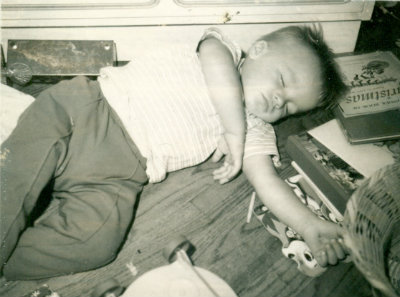 handed me a paper bag with Pat’s clothing and told me to go home, that they would call me when the baby was delivered. I complied, remembering that I was due for work at my second job as a sales clerk at the Whelan’s drugstore in Flushing at noon.
handed me a paper bag with Pat’s clothing and told me to go home, that they would call me when the baby was delivered. I complied, remembering that I was due for work at my second job as a sales clerk at the Whelan’s drugstore in Flushing at noon.
I drove back home and finally managed to shake Skodt-Nielsen awake. He refused to believe that Pat was in the hospital and about to give birth. He searched the apartment, mumbling, “Here, Patsy, Patsy.”
A little later I got him to drive me to work in downtown Flushing. After he dropped me off, I gave him directions to the hospital. I wasn’t there much more than an hour when I got a call from Skodt. “Congratulations, buddy, you’re the father of a baby boy, six pounds, seven ounces.” He paused, waiting for his news to take effect. I didn’t disappoint him. Speechless at first, I soon let out a loud “whoop” that was probably heard by everyone in the store, and those halfway down the block. (Photo included here is of my son as a young child taking time out to rest from his busy play time.)
“I’ll come get you,” he said.
I informed my boss, Mr. Saltzman, who immediately whined that he couldn’t afford to let me go. They were too busy, he said. I remember looking at him with thoughts of my wife in a hospital bed with our brand-new baby. Without hesitation, I said, “Watch me!” and left for the hospital with Skodt-Nielsen.
Much later, I returned to the drugstore and was surprised that I still had a job, and kind of an apology from Mr. Saltzman, who I think realized he’d been a total ass.
It didn’t matter, though, if I still had a job or not. It didn’t matter if Mr. Saltzman saw the error of his ways. Nothing else in the world mattered at that particular time because a miracle had just occurred:
My son David had been born. #
New Year’s Surprise – Part I (1/7/14)
No matter how well you plan things out, you never know what’s going to happen on any given day, much less the first day of a new year.
This New Year’s Day, in the evening, my current wife Josephine informed me that Sparky, our 11-year-old Maine coon/tabby, had taken a swipe at Cisco, our 8-year-old Bengal. “Cisco’s bleeding pretty badly,” she said to me excitedly. “He’s dripping blood all over.”
Cisco kept walking around shaking his head, making it difficult for me to get a good look at his nose. Jo suggested we try to get him into the large dog cage we happened to have set up in a corner 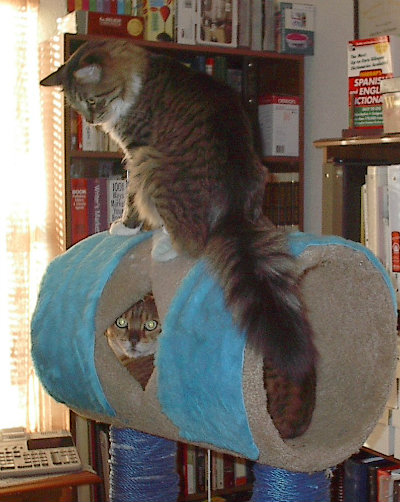 of the office area.
of the office area.
“Let’s move the cage into the middle of the kitchen,” she said, “so he doesn’t get blood all over the new carpet.” Jo was visibly upset, but still mindful of the new carpeting her sons Bill and Brian had recently installed.
We picked up the large, bulky cage and carried it over to the middle of the kitchen floor where we set it down. All of the cats gravitated to the kitchen, curious to know what we were doing. We grabbed hold of Cisco and with much difficulty finally managed to push him into the cage.
Cisco continued to shake his head rapidly back and forth, sending flecks of blood all over the kitchen floor. I went to the linen closet, brought out a white wash cloth, and ran it under cold water. I rinsed it out and handed it to Jo. She kept holding it to Cisco’s nose, trying to keep pressure on the wound to stop the bleeding. To do this effectively without keeping him from breathing was literally impossible.
Abandoning the washcloth, which was now soaked in blood, Jo tried to keep Cisco calm. He was breathing heavily, and loudly wailing his discomfort. We both took turns on the computer, trying to find a vet who might be open on New Year’s Day evening. It soon became apparent that there was only one such veterinary ER open and it was in Asheville, about 20 miles away.
We also tried to determine if there was any way we hadn’t thought of to stop the bleeding. Finally, I called the Asheville ER and asked them, but couldn’t answer their question regarding exactly where on or in the nose the wound was. They suggested we bring Cisco in.
Now, understand that Jo’s vision with cataracts is not the best, and especially at night. I had one good eye, but both of us try to avoid night driving when we can. Unfortunately, that was no longer an option. With difficulty, we transferred Cisco from the large cage into the smaller cat  carrier. Cisco wanted no part of the carrier and voiced his objections loudly. Despite the sound effects, we packed up and went out to the car, Cisco wailing his misery loudly in the cold night air.
carrier. Cisco wanted no part of the carrier and voiced his objections loudly. Despite the sound effects, we packed up and went out to the car, Cisco wailing his misery loudly in the cold night air.
Fortunately, it was not raining or snowing, but the long night ride was filled with tension.
When we finally arrived at the vet hospital, the place was packed with distraught animals and their owners. Cisco suddenly was quiet as he listened to the other animals, mostly dogs. We were ushered into a small room where an assistant had me fill out a long form. After I was done, she asked us additional questions as she took Cisco’s temperature. By this time, the bleeding had apparently stopped. She left the room, telling us the doctor would be in shortly.
It turned out to be the better part of an hour before the veterinary doctor finally came into the room. He made a cursory examination of Cisco’s nose and immediately determined that there wasn’t much they could do at this point. “Someone will come in and clean him up,” he said. “And we’ll give you an antibiotic to administer to him, and some pain medication.”
at this point. “Someone will come in and clean him up,” he said. “And we’ll give you an antibiotic to administer to him, and some pain medication.”
After the doctor left and the assistant returned, I asked her if she would give Cisco the initial antibiotic tablet and pain medication, the latter of which was in liquid form in a syringe. She had no problem with my request and showed us how to open Cisco’s mouth, into which she plopped the pill. She then pried open his mouth again and with the syringe squirted the pain medication into it.
Easy peasy.
It was close to midnight when we got back home. Cisco whimpered a few times, but for the most part was quiet during the return trip. The other cats were visibly upset when we came in and set the cage down in the living room. No doubt he had picked up the scents of various animals, which the others quickly detected.
Cisco crawled up under a plant stand between the wall and the sofa, which made it difficult for the other cats to get to him. Nevertheless, they sat nearby and continued to stare at him. We finally turned out the lights and retired for the evening. It had been an eventful day.
The next day, Jo and I remained out of sorts, unable to do much of anything except those tasks that had to be done. Holly, one of the kittens now a year old, was still spooked. She followed Cisco around, even hissing at him once or twice, but kept her distance.
Things are much better today as I write this. Cisco is sleeping right now. Earlier, he wandered all over the house, letting us know, loudly, that he was back and feeling better. Unfortunately, we were not able to get Cisco to open his mouth to take his medication, yesterday or today. Believe me; we tried a number of times, using different tricks such as hiding the pill in a treat. But Cisco wasn’t having any of it. Perhaps tricks work for dogs, but not our smart-as-a-whip Bengal.
Bottom line: When a 14-pound Bengal doesn’t want to do something, he doesn’t.
Happy New Year! #
Shortsighted (12/31/13)
I just returned from taking my wife Josephine to pick up her new eyeglasses. She has cataracts in both eyes but still sees well enough to hold off having extraction surgery. The doctor had given her a prescription to improve her vision and she hopes she’ll be able to get by with the new eyeglasses for a few more years. Of course, there’s no way to tell when either of her eyes will become worse.
And this brings me to thoughts of what has happened with my eyes over the years. For me, I’ve been nearsighted for as long as I can remember. I hated having to wear glasses when I was a child, but really had 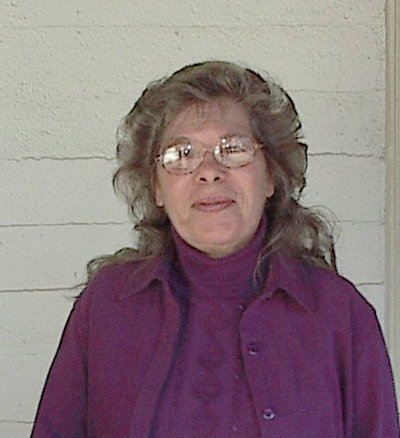 no choice if I wanted to see the blackboard in school. When I would inquire as a young man about wearing contact lenses, I was told my eyes wouldn’t allow that.
no choice if I wanted to see the blackboard in school. When I would inquire as a young man about wearing contact lenses, I was told my eyes wouldn’t allow that.
And then, in the mid-’80s, when I was about 46 and learned I had type II diabetes, they told me I had a cataract in my right eye. Later, they also told me I might have glaucoma. The cataract grew worse rather quickly and it was decided I would undergo extraction.
Now, in those days, they didn’t believe in giving diabetics implants. And so they fitted me for a special aphacic contact lens. Naturally, to keep things balanced, they also gave me a regular contact lens for the left eye. So much for not being able to wear contacts. The aphacic lens was more expensive, but years later I was able to start wearing a normal lens in the right eye as well.
Through the years, I did just fine with the contact lenses. When we sold our home in Mohegan Lake, New York, in 1986, we relocated to Leicester, North Carolina, a residential area near Asheville. After trying four different ophthalmologists in Asheville, I finally settled on one. Each of them said the aphacic eye’s capsule was intact and that it would really be a good idea if I had an intraocular lens put in. I resisted the suggestion.
In 1996, we relocated to Las Vegas, Nevada, where I accepted an editorial position with a major advertising agency. I signed up with a large ophthalmology clinic to look after my eyes. One of the doctors there immediately pointed out that the capsule in my right eye was fully intact, and that I should consider having an implant. Again, I resisted. And somewhere along the line, I learned that a cataract had developed in my left eye as well.
In 2007, I became dissatisfied with the crowded, assembly line ophthalmology group I’d been going to and decided to change eye doctors. Another group headed up by a woman was recommended by my optometrist. Like all the other doctors, she at once made note that the capsule in my right eye was fully intact, and that I should consider having an implant put in. “One or two minutes to just slip the lens in,” she said. “Nothing to it.”
I don’t know what it was that changed my mind after all those years. Perhaps I was blinded by the slender, attractive physician sitting in front of me, pun intended. Maybe I was just tired of everyone telling me the same thing. In any event, I finally agreed to have the surgery done and a date was set.
They gave me something that made me relaxed 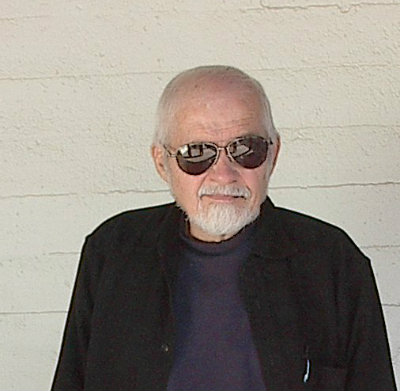 and a little drowsy, but I was never unconscious. I couldn’t actually see anything, but certainly there was no pain involved. I was aware of my surroundings and could hear everything. I did not like hearing the doctor murmur, “Oh, dear, it’s not staying in place. It slid right down.”
and a little drowsy, but I was never unconscious. I couldn’t actually see anything, but certainly there was no pain involved. I was aware of my surroundings and could hear everything. I did not like hearing the doctor murmur, “Oh, dear, it’s not staying in place. It slid right down.”
I knew she was referring to the lens. I also knew that the capsule everyone had mentioned was most assuredly NOT fully intact. But I was relaxed and not worried at the time. Had I not been sedated, I would have been a nervous wreck and caused quite a commotion in that ER. I don’t remember even flinching when I heard her say something like, “Guess we’ll have to go to Plan B.” I believe she then said to me that she was suturing another lens in place.
Now, place me in my usual state of mind, with no drugs to hold me in check, and the word “suturing” would have ripped through me like a chain saw. But I remained calm and a little later Josephine drove me home.
I of course was all bandaged up and couldn’t see with that eye right after surgery, so I followed post-op directions, completing a number of follow-up visits for the next several months. I’m not sure exactly when the doctor realized an infection had taken hold of the eye, but I continued with my visits, taking various eye drops and following all directives until, at some point, the female surgeon gave up and turned me over to a cornea specialist.
I continued in the care of the cornea specialist who reduced the severity of the infection, but I still could not see out of the right eye. Oh, I could see a little bit, but certainly not well enough to drive a car or even read a book if I had to do it with just that one eye.
And then, just when I thought things couldn’t get any worse, they got downright ugly. The cornea specialist was quick to point out that a portion of my right eye’s visual field had sustained damage. Obviously, the glaucoma had progressed. He said if I didn’t have surgery soon, I could go blind in that eye. He said he was sending me to another doctor who could help me. When I inquired as to why he didn’t do the surgery himself, he replied that he wasn’t a surgeon. I’d been seeing a cornea specialist who didn’t do surgery. As Moms Mabley used to say, if it weren’t for bad luck, I wouldn’t have any luck at all.
To make a long story a little shorter, I signed up with another ophthalmology group and a surgeon eventually performed “tube shunt” surgery on the right eye to relieve the pressure in that eye, which it did. A year later, the “tube” became exposed and more surgery was done to re-cover it. So far, I haven’t gone blind in the right eye.
In 2010, Jo and I retired and relocated back to western North Carolina. I immediately hooked up with a damn fine eye surgeon who eventually removed the cataract in my left eye and replaced the lens with an implant. I now have 20/20 in the left eye, a visual acuity I’ve never before had in either of my eyes, but I still can’t see much with the right eye.
I saw him last week for my four-month checkup and he noticed that the right eye, the eye that had been so traumatized, had developed a calcium buildup. He said not to worry about it, but if it started to bother me, a cornea specialist would “scrape it off.”
I can hardly wait. #
Doing Unto Others(12/24/13)
Every area of our country can lay claim to its own merits, whether it’s scenic beauty, a preponderance of cultural treasures, or a lower cost of living. Western North Carolina is no exception in that it can boast a generous amount of all of these. This, despite a newly elected state government that has already proved to be a giant step backward for all of us.
But we won’t go into that at this time since the message here is apolitical and strictly about the people. We’re talking about some of the warmest, friendliest, most kind-hearted individuals on the planet. Not necessarily Bible-thumping, church-going, shout-hallelujah people, though there are plenty of those. We’re speaking of men and women who will literally offer you the proverbial shirts off their backs if it would help your well-being. These people will go out of their way to be kind.
In New York, where I was born and grew up, people are abrupt and to the point, which gives them the bad rep they have in other parts of the country. New Yorkers are known to be “rude,” which is a misnomer. It’s just that they come right out and say what’s on their collective minds. There’s no guesswork involved when you’re dealing with a New Yorker. They don’t sugar-coat anything, preferring to tell it like it is. They are a serious-minded people who don’t generally walk around wide-eyed and grinning like Cheshire cats.
Because my first wife was a Civil War buff and enjoyed visiting Civil War battlefields and landmarks, and the fact that my son had chosen Clemson University in South Carolina to get his Masters, I got a chance to study the change in expressions on people’s faces as we traveled farther south. Up north in New York, New Jersey, Pennsylvania, people’s facial expressions took on a more determined, serious look. But in the South, people, for the most part, did a lot of smiling. Quite frankly, their expressions reflected a happy, upbeat demeanor that seemed to be contagious.
My current wife Josephine and I lived and worked in North Carolina back in the 1980s and ’90s, before eventually flying out to Las Vegas where I accepted a fairly lucrative editorial job offer with a major ad agency. After 14 years living and working there, we returned to western North Carolina where we retired.
The return trip here was by car, and the first indication that we were back among the friendliest, kindest people occurred when we were looking for the home we had purchased while still in Las Vegas. We were only a few miles from our destination and driving slowly on an unfamiliar two-lane road, trying to get our bearings. The rented Ford Explorer SUV we were driving did have a GPS system, but with three constantly meowing cats in dog cages and a host of other logistical obstacles to deal with, we just didn’t have the motivation to learn how to use it.
Another car had been directly behind us, which prompted us to pull over at a gas station and let him pass. Instead, he pulled over alongside us and rolled down his window. Now, if we were still in New York, we’d probably roll up our windows and lock the doors. But this was friendly North Carolina.
“Noticed you folks were driving slow and looked like you might be lost. Maybe I can help you with directions.” And he did, going out of his way to help us find our new home within minutes.
That first summer back in North Carolina, I purchased a lawn mower and a gas container, the latter of which I took to a gas station in order to obtain fuel for the mower. I sat on the passenger front seat of my car with the door open, trying to figure out how to get the familiar red plastic container ready to accept the gas. I was puzzled by the apparently new federal regulations that involved the pouring spout, and how to 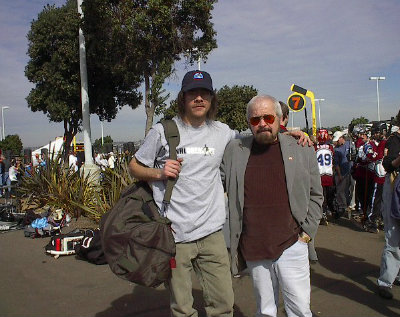 secure it once it was filled with gasoline. It was at that moment that a middle-aged guy in T-shirt and jeans pulled up and noticed my dilemma. He muttered something about “confounded new government regulations. Here, lemme help you with that.” He pulled out a large penknife and proceeded to cut something, then showed me how it now has to be used. If not for him, I might still be there trying to figure it all out.
secure it once it was filled with gasoline. It was at that moment that a middle-aged guy in T-shirt and jeans pulled up and noticed my dilemma. He muttered something about “confounded new government regulations. Here, lemme help you with that.” He pulled out a large penknife and proceeded to cut something, then showed me how it now has to be used. If not for him, I might still be there trying to figure it all out.
Another time, and just recently, I again was in a gas station. The light that indicates low air pressure in one or more of the tires had gone on. Following the filling of my tank, I pulled over to the free air unit and began checking and adding air to all four of my tires.
Now, at my age, crouching down and putting air in my tires is certainly not as easy as it had been when I was in my 20s and 30s. And the tire gauge I was working with was not as user-friendly as I would have liked. Every time I applied it to the thingamajig on the tire, I’d get a different reading. Certainly not reassuring by any means. And I suppose the expression on my face did not belie my frustration and angst.
A guy who also looked to be middle-aged pulled up behind me, obviously wanting to administer to his car’s tires. He got out and strolled over to me. “Looks like you’re having a hard time there, partner. Can I help?”
“Well, I think I just about got it,” I said, not entirely convinced myself. The front tires I had checked seemed to be OK, but the right rear tire needed a lot of air.
The stranger showed me his tire gauge, which was very different from mine and appeared to be a lot easier to use. “Let me have a look,” he said, getting down on one knee. He checked the recommended pressure indicated on the side of the tire and applied his gauge. “Couple pounds is all ya need in this’un. He proceeded to squeeze a few more pounds of air into the tire before standing back up.
I thanked the man profusely before driving off, still in shock and awe at how readily these people will offer help to someone they had never met before.
Which reminds me of another incident that took place in a local supermarket. I had been in the cat food section, tossing multiple cans into my cart, when an older woman began talking to me. This is not unusual as cat lovers seem to have an unofficial bond among them that prompts easy communication. One thing led to another and I mentioned that in addition to our own cats, we also feed several strays that are always coming up on our deck.
She said something about volunteering at a shelter and, for reasons I can’t recall now, said she had some extra cans of cat food she’d like to give me to help with feeding the strays. “I’ll bring them over to your car after we’re done here,” she said.
We lost track of each other after that and I never did get the cat food, but that’s beside the point. The fact that she was kind and generous enough to make the offer to a perfect stranger went far beyond the norm that exists back where I’m from.
However, in western North Carolina, doing someone a solid is very much par for the course. These are the people who fall through the cracks. Their small kindnesses may not earn them widespread fame as well-publicized heroes rewarded with a medal for their efforts. But their unselfish gestures toward their fellow man are legendary, and just as heroic.
I can only hope to get into the habit of returning the favor. #
A Fair Shake (12/17/13)
I’ve always looked young for my age, which is obviously why I was carded or proofed until I was nearly 30. People have remarked to me that I always seemed so serious-minded or unhappy, primarily because I didn’t smile very much.
This, of course, has been deliberate on my part. Partially because I did look so young, I wanted to appear at least my true age or older. I also felt that by smiling, I would look like a grinning idiot.
All of which leads me to the topic of age. I am 74, soon to be 75 in a couple of months. I am quite concerned about it, and am quick to jump at any suspicious “change” in my health or the way I respond to anything. One might bring up terms such as “hypochondria,” or “having a morbid preoccupancy with one’s health,” but it’s more than that, I think.
Lately, within the past six months or so, I’ve become keenly aware that my handwriting has changed. Something so mundane as a shopping list stands out in that when I get to the store, I can’t decipher my own handwriting, mainly because I didn’t bring my reading glasses and I’ve written too small. Usually when I hold something far enough away, I can make it out, but not when I write as if I were a Lilliputian.
I have also made note that my signature has changed. Not only is it smaller, I also don’t sign my name the way I used to. I can’t seem to write the “G” the way I used to, even when I consciously try. And there seems to be a tremor in my right hand. I don’t seem to have it in my left hand, but then I don’t write with my left hand or do much else with it where I would notice such a change.
I immediately consulted the Internet and discovered that the tremor is a possible sign of Parkinson’s disease, as is the sudden proclivity to write smaller. Add to that the serious expression in my face, which is called “masking,” and you have the strong possibility of a Parkinson’s diagnosis. However, I’m still not a hundred percent convinced. Dizziness is another possible symptom, and I did wake up one recent morning with everything seemingly tilting to the right. But that’s the only incident of dizziness I’ve ever had in recent memory.
A few people, including my wife, have told me that my voice is very soft when I speak in a normal tone. I sometimes sound hoarse, or I lose my voice altogether. A change in one’s voice is another possible symptom of Parkinson’s disease, but I’m not sure I haven’t always had a soft voice.
Stooping, leaning, slouching or walking hunched over are yet more possible signs of Parkinson’s, and I certainly am guilty of that. But I’ve always walked that way, at least ever since I saw Montgomery Clift walk that way in the role of Private Robert E. Lee Prewitt in From Here to Eternity.
Another odd thing: I can hold out my hand and make it as steady as it can be, but put a dish in my hand, for example, and it’ll look as if I were trembling on purpose.
I’m going to make a concentrated effort to write larger, and I’m going to start practicing signing my name again before my bank begins rejecting checks I’ve signed. And I’m certainly going to mention it to my doctor when I see her again.
Frankly, I think the whole thing has to do with low self-esteem. But why all of a sudden now? If anyone has an idea about this, or can actually give me a sound explanation, besides the obvious diagnosis of Parkinson's, feel free to email me at the address listed at the beginning of this blog. #
Christmas Times Past (12/10/13)
It was the best of Christmas times; it was the worst of Christmas times. I’ve experienced some of both over the years, for a variety of reasons.
The Christmas morning that will always stand out in my memory banks occurred in the mid-1940s when I was just a tyke of maybe 6 years old. We lived on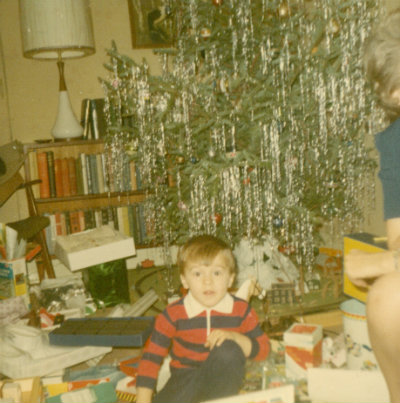 New York’s Long Island when it was still basically one big potato farm, in the quiet residential community of Old Westbury.
New York’s Long Island when it was still basically one big potato farm, in the quiet residential community of Old Westbury.
It was at a time in my life when I and my sister Barbara still believed fervently in Santa Claus, not to mention the Easter Bunny and the Tooth Fairy. I remember how we had both crept down the stairs ever so slowly, excitement building as we got our first look at the Christmas tree and what lay beneath.
Santa had indeed been there! The evidence was undeniable. The glass of milk we had left out for him the night before was half empty, and the accompanying cookies now just a few scattered crumbs.
With squeals of delight, we ran to the tree and began tearing open the dozens of carefully wrapped presents. I distinctly remember the red wagon with wooden sides, also filled with more brightly colored gifts. And the Flexible Flyer sled. Oh, do I remember that beautiful sled.
Mom and Dad sat in nearby chairs, obviously enjoying the fruits of their labors. Our joy that morning was their payoff for days of shopping, for hours of wrapping and hiding the many toys. For Mom and Dad, for Barbara and me, it was the very best of Christmas times.
Years later, after the divorce, after the boarding homes, I remember a Christmas Eve in a small, three-room apartment in Woodside, Queens, New York. Mom and our stepfather, Arthur, had nursed a few cans of beer, followed by an uncounted number of shots from a bottle of Hennessy cognac.
It was the first of a number of Christmas “incidents” in which a somewhat inebriated Arthur knocked over the fully decorated Christmas tree and promptly invoked the name of his first wife who had died prematurely, blaming her for the fallen tree.
Time-trip forward to the late 1960s. It was Christmas Eve and my young son and daughter had just gone to bed, prepared for the visions of sugarplums awaiting them in their dreams. The doorbell rang and the neighborhood “Santa,” a slightly underweight, over-liquored uncle on loan from the family across the street, extended holiday greetings from beneath his false beard.
Upstairs in the four-room apartment, young Jennifer had quickly fallen asleep. David, on the other hand, was wide awake and sitting up in his bed. The by-then bedraggled mock Santa made his way down the hall to the children’s room and sat at the foot of David’s bed. “Ho! Ho! Ho! Have you been a good boy?” the fake Santa asked.
David’s eyes widened as he tried to contain his excitement. Oh, Santa,” he exclaimed emphatically. “I’ve been an excellent boy!”
The next morning, there was the familiar scramble to be first under the Christmas tree in the small apartment living room in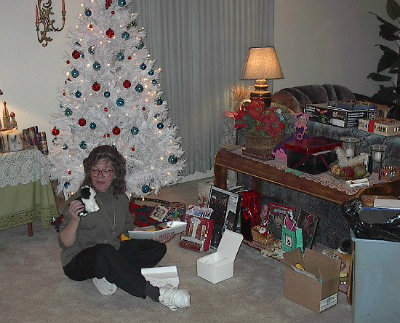 Flushing, Queens, New York. There were multiple presents, all colorfully wrapped and adorned with big bows. They tore into the pile of gifts, gleefully ripping the holiday coverings to reveal the treasures beneath.
Flushing, Queens, New York. There were multiple presents, all colorfully wrapped and adorned with big bows. They tore into the pile of gifts, gleefully ripping the holiday coverings to reveal the treasures beneath.
More of the same from the early 1970s through the mid-’80s, but with a difference: the children were older and slightly more reserved. Also, the confines of an apartment had given way to a more spacious house, with a vaulted ceiling in the living room that permitted the live tree to be taller.
The years passed until my own divorce, and the advent of estrangement with my two adult children. The laughter and fun times were no longer there. Christmas in the early ’90s had become a somber event.
The move to Las Vegas changed everything. For 14 years, my new wife Josephine and I observed Christmas alone. Quietly. Oh, there were presents under the tree, and it was fun buying and wrapping gifts for each other. And the live tree had given way to a beautiful white fake tree. And the cats had a ball diving into the piles of discarded wrapping paper. But it just wasn’t the same without family.
Today, back in western North Carolina for the past three years, we’ve visited Josephine’s family on Christmas Eve, and slept in on Christmas morning. However, this Christmas Eve, as we did on Thanksgiving, we are hosting the event and family will be coming here for dinner and gifts.
If it's anything like Thanksgiving, we'll probably sleep for a week. #
Train of Thought (12/3/13)
I was surprised and saddened to see and hear the news today about the Metro-North train derailment in the Bronx area of New York. With a Sunday complement of about 150 passengers, four died and dozens were injured, many of them critically. The investigation is still ongoing at this point, but speed and human  error appear to be behind the tragic event. What brought it close to home for me is that it was my train.
error appear to be behind the tragic event. What brought it close to home for me is that it was my train.
Oh, not anymore. I’ve lived in western North Carolina for the past three and a half years. And I’ve been retired since 2010 from my editorial job at a major ad agency in wonderfully sunny Las Vegas where we resided for 14 years. Prior to that, we lived for 10 years here amid the foliage-rich mountains of western North Carolina. But from 1972 through 1986, we lived in a modest cottage with lake rights in the Mohegan Lake-Shrub Oak community of upper Westchester County, New York.
Sometime around 1983, the small company I worked for sold their brownstone on Eighth Avenue and relocated the firm to Rye Brook in Westchester County, which necessitated my driving to work. But for 11 of those 14 years I worked as a magazine editor/writer in Manhattan and commuted every Monday through Friday on that very train. Oh, how I can remember and mentally relive those frigid winter mornings standing at the Peekskill station waiting for the 7:24 from Poughkeepsie as the icy wind blew in off the Hudson River and ripped right through me.
And when the train would arrive, screeching to a halt, steam billowing out from beneath the cars, I’d climb aboard and find a window seat looking out on the river.  A sudden lurch and the train would move forward again. Sometimes the car I was in would have some heat, but not always. More often than not, I’d be able to see my breath in the chilled car. I would keep my hands in my pockets and my arms close to my chest, closing my eyes and hoping I could sleep and not wake up until we had rolled into Grand Central Station.
A sudden lurch and the train would move forward again. Sometimes the car I was in would have some heat, but not always. More often than not, I’d be able to see my breath in the chilled car. I would keep my hands in my pockets and my arms close to my chest, closing my eyes and hoping I could sleep and not wake up until we had rolled into Grand Central Station.
In the evening, the cars usually would start off warm. Sometimes I would catch a break and be able to get a cab (we used to refer to them as “taxi crabs” or “crabs” for short) and arrive at Grand Central early. My train was usually there long before departure time, the lights dark until the conductor arrived to turn them on. I remember getting there really early one evening and sitting in the darkened car. When the conductor flipped the light switch, seemingly at least hundreds, maybe thousands of bugs, cockroaches if you will, swarmed all over the seats and backs, floors and windows. I recall my good friend and coworker John Tido freaking out and letting go with a shrill, piercing scream. I jumped up, brandishing my attaché case, ready to do battle with the insect horde, but they disappeared as fast as they had shown up.
John ran out onto the platform, flailing at his clothing as if to dislodge any bug that may have stubbornly clung to his attire. The conductor had simply laughed at my friend’s antics, obviously inured to the insect invasion that was no doubt commonplace on the trains. 
In those days of the early ’70s, the railroad was called “Penn Central,” obviously harkening back to the era of the two major Pennsylvania and New York Central railroads. Later, the name was changed to “Conrail,” which of course led to many comedic references to putting the “con” back in the railroads. I don’t know when they changed it to “Metro-North,” but obviously it was a wise decision. I’m not sure why, but I managed to save my monthly rail passes, a pack of which are shown here.
During the winter, the ride into Manhattan was usually uneventful, especially if there was heat. Because I’d be on the morning train for the better part of an hour, I’d usually read my copy of the New York Times, often completing the crossword before dozing off. Almost no one would utter more than a few words. It was simply way too early to conduct long conversations, or even small talk.
During the summer months, passengers seemed to be a little more comfortable chatting, but morning was morning, and it was still very early when I took the train, so reading the paper or sleeping were the two primary behaviors of most on the way in.
Nighttime was a very different story.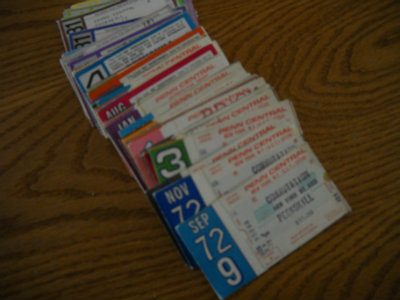 Oh, a number of people would still sleep, or read their paper, or a book or magazine, but some would play poker (yes, usually for money). And still others would go over the day’s activities with others.
Oh, a number of people would still sleep, or read their paper, or a book or magazine, but some would play poker (yes, usually for money). And still others would go over the day’s activities with others.
And then there was the bar car. Or as one wag used to refer to it, “a school bus for adults.” On any given evening, the car would be crowded with grown men and women behaving like out-of-control teenagers, laughing and yelling as they downed mixed drinks and cans of beer one after the other.
I would occasionally take part myself and have a drink or two there, but usually when I wanted a drink, I would stop off before getting to Grand Central and buy a handful of miniatures, little bottles of booze that I would stash away in my attaché case and partake privately in another, quieter car.
The train was always crowded with commuters during the work week, and there were many stories unfolding aboard the train as it rocketed along the Hudson. One didn’t have to look for very long to notice the obvious train romances going on. And I’ll never forget the “primal scream guy,” as I called him, who almost nightly would stand between cars as we neared the Peekskill station. Every once in a while, someone would open the door between cars and you could hear the man screaming out at the top of his lungs. As I said, this wasn’t a one-time event; it happened on a regular basis.
Just as the heat was often a problem during the winter, air conditioning during the summer months was a hit-or-miss situation. Half the time, there just wouldn’t be any cooling in some of the cars. Other times, the A/C worked too well and it was literally finger-numbing cold.
I remember calling the conductor over one night and asking him in my best gentleman imitation if it were possible to turn the A/C down just a tad. His response was typical NYC, tough-as-nails bluster: “It’s either on or it’s off!”
There were other events, delays, etc., that took place involving my commute, but in the 11 years I rode the commuter train, not once can I recall it being involved in an accident. Yes, there were times when I thought we might be going awfully fast, but to my memory it was never around a serious curve.
I guess I should consider myself lucky. #
Holiday Hustle (11/26/13)
The trouble started at around 8:15 this morning when the phone rang. It was Billy, one of my three stepsons.
“I’ll get her, Bill,” I said. “I was about to wake her up anyway.”
Bill replaced our kitchen floor not too long ago, and we’ve been talking for some time about also replacing the carpeting in most of the house. We suspect it’s as old as the house, at least 15 or 16 years, and the padding has probably disintegrated by now.
Bill’s rates are competitive, but what makes him stand out above all  the rest is his perfectionism. Bill takes pride in what he does, and anyone who has used Bill for various jobs can attest to that. Small wonder that it’s difficult to pin him down on when he has time to do a job.
the rest is his perfectionism. Bill takes pride in what he does, and anyone who has used Bill for various jobs can attest to that. Small wonder that it’s difficult to pin him down on when he has time to do a job.
I tried to wake Jo gently, handing her the phone as I did so.
“Wha–” Jo sputtered in the darkened room.
“It’s Billy,” I said.
“Oh,” she said, swinging her legs to the floor as she fumbled with the phone. “Hey, Bill, what’s up?”
I went back to the office area and resumed my morning computer ritual: CNN.com, eBay, Twitter and email, not necessarily in that order. Jo continued talking to Billy as she padded down the hallway.
Soon finishing with my computer routine, I shuffled into the kitchen and began assembling my breakfast of sliced fresh strawberries with whipped cream, orange juice, hardboiled egg, and a toasted whole wheat English muffin smeared with I Can’t Believe It’s Not Butter.
After taking everything into the living room, I sat down to watch the rest of the news. I hadn’t taken a second bite of my English muffin when Jo came into the room and hung up the phone.
“I have to call Billy right back. He’s talking about rounding up Brian and Sam and coming over to pull up the old carpeting and padding.”
“What? Today? Right now?”
“Well, he says they have a job slated for someone to install a fence, but because it’s so cold, he thought they’d all prefer working indoors.”
“No, no,” I said excitedly. “The blog is due in 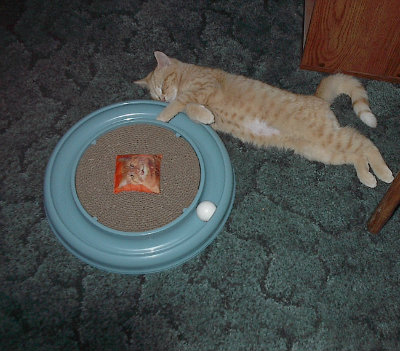 the morning and I haven’t even written one word. I’ve also got to do my laundry, take some packages to the post office…and you promised to cut my hair. I’m about to trip over it, it’s so long.”
the morning and I haven’t even written one word. I’ve also got to do my laundry, take some packages to the post office…and you promised to cut my hair. I’m about to trip over it, it’s so long.”
“Stop yelling,” Jo said. “Can’t we talk calmly like mature adults…where are you going?”
“I’m going to the bathroom to give back some of this coffee. I’ll be right back, okay?”
“All right.”
“Besides,” I said, coming back into the room a few minutes later and continuing the conversation, “they’re all coming here for Thanksgiving on Thursday and we haven’t finished cleaning the house and getting it ready for company. Not to mention I’ve still got to do something about the twelve billion leaves out there.”
“No, you’re right. This isn’t a good week for it. I was just thinking about how long we’ve been waiting to get this carpeting replaced and –”
“Wait a minute! We haven’t even ordered the carpeting or padding yet. We can’t pull up the carpeting without anything to replace it with. It’s bloody cold out there.”
“Okay! Okay! I agree. I’m gonna call him back now.”
“And did I mention the twelve billion leaves?”
“Twelve billion times.”
After breakfast, Jo cut my hair. Following that, I took a shower and got dressed.
“You’re going to the post office?” Jo said. “I need a couple of things from Ingles that we forgot to pick up Sunday.”
“Okay, but I gotta get this column done. I’ll have to put off my laundry till tomorrow.”
Just then the phone rang. It was Tom, the pest-control guy. “Any problem with me swinging by tomorrow?” he asked, referring to his quarterly visit. I said okay, forgetting for the moment that we were expecting three inches of ice by morning.
Which brings me up to the moment as I write this blog.
“Don’t forget the twelve billion leaves,” Jo yelled from the other room.
“Stuff the leaves in your turkey!” #
Eats, ’Chutes and Leaves…and Gutters (11/19/13)
I woke up this morning with a whole series of tasks running through my head, and an impossibly finite number of hours in which to accomplish these responsibilities. First and foremost is coming up with an idea about what to write about in my weekly column, “Second Thoughts,” which of course you’re reading right now.
Obviously, I settled on writing about the here and now. When I had approached my wife, writing partner and part-time muse, Josephine, about what topic to address, she had drawn a big blank at the time. This naturally led to a lengthy discussion of additional subjects pertaining to our current life in the bucolic wilds of western North Carolina, the first of which was Thanksgiving.
“Each of the boys will bring something to the table,” Jo explained. “Should we provide and cook the turkey?”
“That’d be fine,” I said, trying to picture a nicely browning bird roasting in the oven, but having difficulty keeping out thoughts of the bids on baseball cards I had listed on eBay.
“What else?” she asked. “What else can we contribute?”
My thoughts had already moved on to the 12 billion leaves we already had on the ground and overflowing in our gutters. “What?”
on the ground and overflowing in our gutters. “What?”
“What can we provide here?” Jo said.
“Whaddya mean?” I replied. “We’re providing the place, the house, the table, the dishes, silverware….”
“Don’t be ridiculous. We can certainly have mashed potatoes and some vegetables, pickles, olives…. And should we have candied yams or just plain sweet potatoes?”
“Wha–, uh, yeah that’s good.” The initial picture I had in my mind was of leaves piled high in the gutters of our home. Then, as Jo went on and on about what the Thanksgiving Day meal should be, suddenly an image formed in my head of mashed potatoes heaped sky high in the gutters.
“When I was talking to Michelle yesterday,” Jo rambled on, “she said something about her and Brian coming over the day before and preparing some Italian pasta dishes.”
“What?”
“Brian and Michelle would come over that Wednesday before the big day and cook up some pasta dishes. I mean, Brian is, after all, a sous-chef. They’d sleep over and help us pull stuff together in the morning.”
“Yeah, that’s fine,” I said, thinking now about getting the ladder out of the shed.
“I guess Billy could bring the ham,” Jo continued, totally immersed in thoughts of the holiday meal. “You know how Lena goes nuts over ham.”
“I know,” I said. “I remember a couple of years ago when we had Thanksgiving at Billy and Lena’s house. Michael was the designated ham bringer. I can still see the look on Lena’s face when Mike pretended to not being able to get a ham. I f he hadn’t been kidding, I think Lena might have stuffed him into the oven and cooked him as a ham.”
f he hadn’t been kidding, I think Lena might have stuffed him into the oven and cooked him as a ham.”
Jo laughed and continued on about who might bring what.
“I think this year Michael will bring something healthy to the festivities,” Jo said, reminding me of how Mike was into “natural” ingredients, and how he had decided to wage a one-man war on GMO products.
“Somebody else will probably volunteer to bring dessert,” she suggested. “We certainly can’t have Thanksgiving without pumpkin pie, pecan pie, and…”
“I need to get the ladder out and tackle the leaves in the gutter,” I said, interrupting Jo’s train of thought and bringing her back to the reality of now. “I don’t look forward to dragging that thing around. It would be a lot quicker and easier if I could just go up on the roof and clean out the gutters from there.”
Jo seemed to forget all about Thanksgiving as she launched into an animated speech about how dangerous going on the roof was. Flailing her arms almost wildly, she reminded me of how I wasn’t a young man anymore and if I ever fell off the roof, well, that would be the end. Period.
I stood by quietly, knowing from experience that objecting would be futile. She soon softened and mellowed out. I recognized the mischievous twinkle in her eye before she spoke again.
“You know,” she said impishly, “we could put a little parachute on you, and if you fell off, it would open immediately and cushion your fall.”
"Yeah, right," I said. "And next year I'm gonna run for Secretary of State." #
Say What? (11/12/13)
If you’ve ever tried to learn another language, you know how difficult it often can be. But if English were not your native tongue, and you were attempting to learn it for the first time, you would find the task seemingly impossible because of the numerous incongruities in the language. Many of the examples of this that I cite here have been anonymously included in lists circulated on the Internet from time to time.
For example, read the following sentences aloud and imagine the confusion they would create for a newcomer to our language:
- The bandage was wound around the wound.
- The farm was used to produce produce.
- The landfill was so full, they had to refuse any more refuse.
- Please polish the Polish furniture.
- He could be in the lead if he would get the lead out.
- The soldier chose to desert his dessert in the desert.
- Since there is no time like the present, it is time to present the present.
- A bass was painted on the head of the bass drum.
- When shot at, the dove dove into the bushes.
- I did not object to the object.
- The insurance was invalid for the invalid.
- There was a row among the oarsmen about how to row.
- They were too close to the door to close it.
- The buck does some strange antics when does are around.
- A seamstress and a sewer fell down into a sewer line.
- To help with planting, the farmer taught his sow how to sow.
- The wind was too strong for us to wind the sail.
- I shed a tear upon seeing the tear in the painting.
- I had to subject the subject to a series of tests.
- I need to intimate this to my most intimate friend.
Let’s face facts – English is a crazy language. There is no egg in eggplant, no ham in hamburger; neither apple nor pine in pineapple. English muffins were not invented in England nor French fries in France.
Sweetmeats are candies, while sweetbreads, which aren’t sweet, are meat. We take English for granted. But if we explore its paradoxes, we find that quicksand can work slowly, boxing rings are square, and a guinea pig is neither from Guinea nor is it a pig.
And can anyone tell me why it is that writers write but fingers don’t fing, grocers don’t groce and hammers don’t ham? If the plural of tooth is teeth, why isn’t the plural of booth, beeth? One goose, two geese is correct; so why not one moose, two meese?
How about one index, two indices? Is it not unsettling that you can make amends, but not one amend? If you have a bunch of odds and ends and get rid of all but one of them, what do you call it?
If a vegetarian eats vegetables, what does a humanitarian eat? Can anyone really disagree that the first “teachers of the language” should have been committed to an asylum for the verbally insane? How is it that people recite a play and play at a recital; ship by truck and send cargo by ship; have noses that run and feet that smell? Why is a “blue movie” risqué, but a “blue state” predominantly Democratic.
How can a slim chance and a fat chance be the same, while a wise man and a wise guy are opposites? You have to be in awe at the unique madness of a language in which your house can burn up as it burns down; you fill in a form by filling it out, and an alarm goes off by going on. And while we’re at it, why doesn't "Buick" rhyme with "quick"?
English was formulated by human beings, not computers, and reflects the creativity of the human race, which of course is not a race at all. This is why...when the stars are out, they're visible - but when the lights are out, they're invisible. #
Where Were You…? (11/5/13)
Probably most Americans can recall where they were and what they were doing at the exact moment they saw or heard about the planes smashing into the twin towers of the World Trade Center on September 11, 2001.
For hours, days after the actual horrific event, millions of people around the world sat glued to their TV sets as the ongoing tragedy unfolded.
I can remember the morning vividly. In fact, I remember watching at the exact moment when the second plane hit the second tower. We were living in Las Vegas at the time and I was watching the local news at around 5:45 a.m. (8:45 a.m. EST), drinking my coffee prior to taking a shower and getting ready for work.
ABC broke into the local newscast with a national bulletin. The picture on my TV screen showed a gaping, burning hole near the 80th floor of the 110-story skyscraper that was the north tower of the World Trade Center. Apparently an American Airlines Boeing 767 loaded with 20,000 gallons of jet fuel had crashed into the building, immediately killing hundreds of office workers and trapping hundreds more in the uppermost floors.
I sat horrified watching what I presumed to be a terrible accident. And then, about 18 minutes later, I couldn’t believe my eyes as a second plane, another Boeing 767 – United Airlines Flight 175 – seemingly came out of nowhere and sliced into the south tower near the 60th floor. As burning debris from the huge explosion rained down on the streets below, I realized that America was under attack.
Most news events do not have as huge an impact on the lives of a majority of Americans as this one did. For me, as I guess for most other adult U.S. citizens, the after-effects will be with me for as long as I live.
I remember running out and hunting down American flags to put on my car. Never before had I witnessed such mass patriotism as I did during the weeks following this tragic nightmare.
Of course, there have been a few other events, good and bad, that a majority of Americans can point to and tell you exactly where they were and what they were doing at the moment they heard about it.
I realize that there are adult men and women today who were not even alive when President John F. Kennedy was shot to death in Dallas, Texas, on November 22, 1963. I remember the day well. It was shortly after noon on a Friday. I was sitting at my desk at TRUE Magazine, making corrections on a set of galley proofs and thinking about lunch when one of the secretaries came into the room to announce that the office was closing.
At about the same time, my wife had called to relay the news of the assassination. Apparently, President Kennedy had been fatally shot as he rode in a motorcade through Dealey Plaza in downtown Dallas, Texas. I was stunned, trying to absorb what I had just been told.
I remember another editor coming in and telling me about TRUE’s editor-in-chief, Doug Kennedy, and how badly he had reacted to the news. He said Doug (no relation to JFK), who had apparently been Jack Kennedy’s CO in the Navy, instructed his secretary to tell everyone to just go home, and slammed his office door shut.
I remember packing up my things and taking the elevator down to the ground floor where I entered the restaurant and bar (I forget the name of the place) through the lobby door. I proceeded to get quite inebriated as I mourned the untimely passing of one of the most popular and beloved presidents in U.S. history.
Two days later on Sunday, November 24, I was working my second job at Whelan’s, a drug store in Fresh Meadows, Queens, New York, when my wife called to inform me that Lee Harvey Oswald, the alleged assassin of Jack Kennedy, had himself been shot dead. At the end of my shift, I went home and watched a replay of one Jack Ruby, a Dallas nightclub owner, fire his .38 revolver into Oswald’s stomach, fatally wounding him.
The ensuing funeral was televised nationally, with literally millions watching it as the country mourned. Collectively, I don’t think the country had ever been as saddened by a single event, until, of course, the events of Sept. 11.
Five years later, Jack’s brother Bobby was gunned down leaving a Los Angeles hotel where he had just given a campaign speech in his quest to follow in his brother’s footsteps. I remember it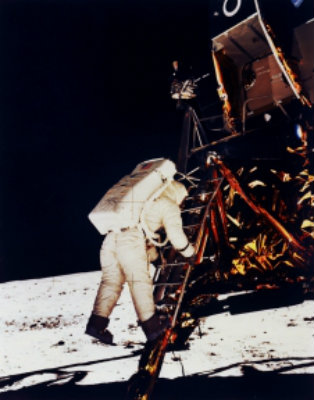 was early morning in New York when I first heard the horrible news. I was still in bed when my wife came running into the bedroom shouting, “They shot Bobby! They shot Bobby!”
was early morning in New York when I first heard the horrible news. I was still in bed when my wife came running into the bedroom shouting, “They shot Bobby! They shot Bobby!”
And who can forget the 21-car funeral train that left New York Saturday afternoon, June 8, 1968, bound for Washington, D.C., carrying Bobby Kennedy’s body. Thousands, maybe a million people lined the tracks to catch a glimpse of the train and pay their respects.
On a more positive note, do you remember where you were and what you were doing when America landed two astronauts on the surface of the moon? The memory of it is firmly etched in my brain, and it seems as if it had happened just yesterday. It actually took place July 20, 1969, more than 44 years ago.
I remember it was a Wednesday and my mother and Arthur, my stepfather, had come over to watch the event with us. It had been impossible to contain the excitement I felt. As far back as I can recall, I had been interested in outer space, the planets and the stars, and the possibility of traveling to other worlds. And Arthur had heckled me about it for years. Ignorantly, he had often stated that we would never leave this planet, and that space travel was science fiction, period. I had insisted that someday we would go to the moon and Arthur had just laughed at me, saying that would never happen in my lifetime.
The TV was on but there was nothing to see. All we could do was listen. At 4:18 p.m. EDT on July 20, 1969, I was vindicated. The landing module landed on the moon's surface in the Sea of Tranquility with only seconds of fuel left. Astronaut Neil Armstrong reported to the command center in Houston, "Houston, Tranquility Base here. The Eagle has landed." Houston responded, "Roger, Tranquility. We copy you on the ground. You got a bunch of guys about to turn blue. We're breathing again."
After the excitement, exertion and drama of the lunar landing, Armstrong and Buzz Aldrin spent the next six-plus hours resting, and then preparing themselves for their moon walk.
At 10:28 p.m. EDT, long after my mother and stepfather had gone home, Armstrong turned on the video cameras. As these cameras transmitted images from the moon, I imagined how half a billion people on earth were sitting in front of their TVs watching the incredible events unfolding hundreds of thousands of miles out in space.
Neil Armstrong was the first to leave the lunar module. He climbed down a ladder and became the first person to set foot on the moon at 10:56 p.m. EDT. Armstrong then uttered the now memorable line, "That's one small step for a man, one giant leap for mankind."
A few minutes later, Aldrin exited the lunar module and stepped foot on the moon's surface.
People old enough to remember this historic event know exactly where they were and what they were doing at the time.
News stories come and go, most of them occurring without much fanfare. Life goes on no matter what. It is only those rare events, either negative or positive, that are momentous in nature, events that transcend the ordinary. They are events that alter the course of history, that often change the lives of all of us forever. #
Scary Not So Much (10/29/13)
One of the so-called holidays coming up at the end of October is not one of my favorites. As a matter of fact, I find today’s Halloween (also known as All Hallows Eve) to be pointless and stupid.
The holiday’s origins reportedly date back to the ancient Celtic festival of Samhain (pronounced sow-in). The Celts – who lived 2,000 years ago in the area that is now Ireland, the United Kingdom and northern France – celebrated their new year on November 1. This day supposedly marked the end of summer and the harvest and the beginning of the dark, cold winter, a time of year that was often associated with human death. The Celts believed that on the night before the new year, the boundary between the worlds of the living and the dead became blurred. On the night of October 31 they celebrated Samhain, when it was believed the ghosts of the dead returned to earth.
My disdain for this pagan holiday has nothing to do with any religious beliefs. I simply find the occasion to be tedious and annoying. This, of course, is my opinion as an adult who’s been around quite awhile. My wife Josephine felt a little differently when we were living in Las Vegas. We didn’t get very many kids 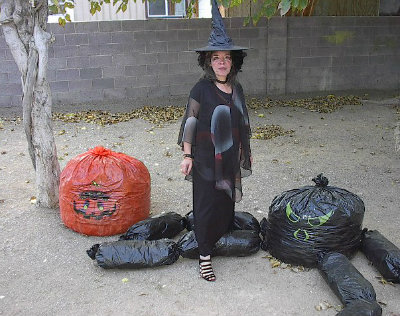 coming to the door for candy, but Jo decided she’d dress up anyway. She picked up a pointy witch’s hat somewhere and managed to look the part. Her cackle when she gave out sweet rewards to the few intrepid souls who came by scared the hell out of them.
coming to the door for candy, but Jo decided she’d dress up anyway. She picked up a pointy witch’s hat somewhere and managed to look the part. Her cackle when she gave out sweet rewards to the few intrepid souls who came by scared the hell out of them.
But that’s not the way it is today out here in western North Carolina, in the middle of the woods. Homes are much farther apart and we just don’t get any diminutive ghoulish visitors.
It was a different story back in the late 1940s in Old Westbury on New York’s Long Island. When I was 5 or 6 years old, and my sister Barbara a couple of years younger, our mother would “dress us up” using materials she had on hand, along with charcoal, lipstick, rouge and whatever else she could improvise with to change our facial features. Scary we weren’t, but we made up for that with a handcrafted “look” that was unique.
Mom would then take us out into the immediate neighborhood, along with a few of the other local children, and go trick-or-treating. I vividly remember one Halloween evening in particular. Mom had taken us down the street to a house where new residents had recently moved in. Apparently, the couple who lived there had no children. We stood on their front porch and waited while Mom rang the doorbell, our little treat bags at the ready. The door opened and a middle-aged woman appeared. We yelled in unison, “Trick or treat!”
We all stood transfixed, in shock as the door slammed shut in our collective little faces. We looked at each other, not quite understanding what had just happened. Mom could barely contain her anger. As we slowly walked away, Mom headed toward the garbage cans near the side of the garage. Without hesitating, she reached out and tipped one can over, dislodging the lid and spilling trash all over the driveway. Instinctively, we all started running back toward our house, with Mom laughing hysterically all the way.
“That’s the trick, and you asked for it!” she yelled.
One divorce and a new stepfather later, in the early 1950s, we lived in Woodside, a Queens, New York, neighborhood located in the looming skyscraper shadows of Manhattan. In those days, with pockets empty and childhood delights in short supply, Halloween provided a way in which to increase one’s largesse.
We might purchase a cheap mask from Woolworth’s, or use a black crayon to mark up our faces, but we wouldn’t spend a lot of money or invest much time in fashioning costumes.
With our appearances barely altered, we’d set out in the morning and walk all over the neighborhood soliciting every adult we encountered. And we didn’t shout “trick or treat.” We said, simply, “Anything for Halloween?”
As the evening progressed, we would hit the bars and taverns, confronting patron after patron as quickly as we could before being thrown out by an exasperated bartender. These dens of inebriation were the most lucrative of all, with tipsy patrons feeling no pain and plenty of generosity. The usual “treat” was never less than a quarter, and sometimes more.
Being small kids, and the bars crowded, it usually took the bartender a few minutes before he spotted us, but when he did, our stay in the darkened, jukebox-blaring confines of these watering holes would be abruptly over.
That’s when we would move on to the many apartment buildings in the neighborhood. Floor by floor, we would hit every apartment. Most people would be home from work by that time, and many unprepared with candy to give out. The fastest way to “get rid” of us would be to just reach into their pockets or purses and hand us a quarter.
One particular Halloween evening, while “working” one of these buildings alone, I met up with 13-year-old Peggy who lived on the first floor of my own building. We had been sworn enemies for no particular reason, and when I would come bouncing down the stairs from the third-floor apartment where I lived, we would usually greet each other with a sneer and a snarl.
This time, however, that didn’t happen. Peggy had smiled and inquired rhetorically if I were trick-or-treating. I responded positively in a friendly way, and then one of us, I don’t remember who, suggested we go around together.
Later, after knocking on the door of one very generous resident, Peggy and I scampered into the building’s small elevator and spontaneously hugged each other over the score we had just made. The coupling felt wonderful to this 13-year-old and it was a long time before we broke the huddle. The rest of the night was spent more in small elevators, hugging and kissing, than knocking on doors and begging for money.
Needless to say, it was the best Halloween I ever had.
As for today: Bah! Humbug! #
Mechanically Disinclined (10/22/13)
How many Davids does it take to change a light bulb? Well, just one, but only after working at it for several hours.
It happened about three years ago when we first moved back to western North Carolina after residing in Las Vegas for 14 years. There was a three-bulb ceiling light fixture/fan in an area we designated for our office and that now contains a large desk, filing cabinets, main computer, scanner and laser printer. The large desk had been moved directly under the light fixture. I noticed immediately that one of the bulbs had burned out and made a mental note to replace it first chance I got.
That chance came the next day. I got the kitchen stepladder and climbed up on the desk, careful to steady myself as I began unscrewing the darkened bulb. Or at least I tried to unscrew it. It moved a little bit one way and then stopped. I turned it the other way, with basically the same results. No doubt about it, it was stuck in the socket. I worked at it for quite some time, all the while mentally reciting the familiar humorous question, “How many idiots does it take….”
Finally, I called Bill, one of wife Josephine’s sons by a previous marriage, and solicited advice from the expert. (When it comes to the home, inside or out, Bill knows what to do, how to do it, and generally and specifically has already successfully done it many times over.)
“First thing you do,” Bill said, “is turn off the power. Then you have to carefully break the bulb and use a pair of needle-nose pliers to remove the bulb’s base.” And that’s what I did, using my hammer and a towel to break the bulb. With the power off on a cloudy day, it was not so easy to see, but I began to work at unscrewing the bulb’s metal base. It seemed to take forever, but I finally was able to loosen the base and unscrew it from the fixture.
A handyman I’m not. It’s not that I’m mechanically or electronically challenged. I can figure things out if I apply myself, but if I don’t have to, I’m reluctant to even try. And normally it’s not something I have to worry about. I mean, for the most part, if I have a plumbing problem, I call a plumber. If there’s electrical trouble, I call an electrician. But in the past, there were times when I didn’t have a choice. There were some lean times when we couldn’t afford to hire a professional and pay his fees.
We purchased our first house in 1972, a relatively small, unassuming bungalow in upper Westchester County. The previous owners were as cheap as they come, jury-rigging electrical repairs and cutting corners with everything else in the house. By the time I was ready and financially able to call in a professional to rewire the home and replace the fuses with circuit breakers, I had already replaced just about every electrical outlet in the place.
But my biggest accomplishment, at least in my mind, was replacing the entire toilet in my son’s bathroom. It wasn’t easy. I brought home books from the library and read up on the whole process. I don’t recall exactly how long it took me, but it’s safe to say, through trial and error, I labored long and hard for at least a week before successfully installing the commode.
Around that same time period, in the mid- to late ’70s, we decided to call in a contractor and effect some major changes to the house. We had a full basement, but to access it, one had to go outside and walk down an incline to enter it from the rear. That entrance was underneath my son’s room, which was an enclosed back porch. There was an open area below his room, so we had decided to have the contractor install a set of inside stairs down to the basement, and lay a concrete floor under my son’s room. This would include enclosing the area with cement walls. While we were at it, we also had the contractor put in a set of stairs up to the attic and finish off part of that area to become my den.
While Vinnie, the contractor, and his crew were laying the concrete floor, they discovered the septic tank was only a few yards from the back door. We decided to go ahead with the cement floor anyway, leaving a circle of plain dirt open in the cement should the septic ever have to be accessed. Years later, when we were told we had to have a CO (Certificate of Occupancy) in order to sell the house, what we went through to make sure the inspector didn’t notice the soft circle in the concrete floor is not to be believed. But that’s another story for another time.
A side note to all of this was that Vinnie disappeared right in the middle of the job. We were frantic as we had holes in both our ceiling and main floor, and the cats were having a field day exploring newfound spaces. We later found out that Vinnie had decided it would be a good time to go on vacation to Las Vegas.
When Vinnie and his workmen returned to finish the job, one of them dropped something heavy on the toilet in our main bathroom, and broke it. They replaced it, but I suspect that Vinnie somehow factored the cost of it into our final bill.
I had been paying Vinnie piecemeal, with most of his fee given to him up front. At the end, when I received a small balance due from him, I did a final examination of his work and discovered, to my utter horror, that one of the new window sills in our master bedroom displayed a crack on a scale relative to the San Andreas Fault. I told Vinnie I was not about to pay him any more money until he took care of this problem.
Vinnie came right over and examined the crack. “No problem,” he said in his broken English. He whipped out a hammer from his tool belt and whomped a huge nail into the fractured sill.
“There!” he declared. “That’s that.”
“That’s what?” I recall saying. “I’m not gonna pay for shoddy workmanship, or for the lousy mitering in the hallway.” Vinnie left without a final check, and we never heard from him again. But he did manage to get $13,000 all told from us. He and his crew did do a lot of work for us, I must admit. If the same home improvements were to be done today, the final tab would be closer to a hundred grand.
I had fully intended to replace the window sill myself, but never got around to it. I’m sure not having the needed self-confidence to effectively do the job had a lot to do with it.
One other light bulb event also comes to mind, again in our current house. When Josephine was having one of her “Let’s-see-if-we-can-move-an-entire-roomful-of bedroom-furniture-into-another-room” moments, she noticed that the overhead light fixture in our first master bedroom had gone dark. I got the stepladder out, removed the glass globe from the ceiling fixture, and replaced the burned-out bulb. I then quickly replaced the glass globe, hand-turning the screws until everything felt secure.
"There," I said, descending the ladder, "your own private handyman strikes again."
Jo waxed ecstatic, extolling the virtues of my accomplished handiwork. She could now begin to furnish what would soon become her new dollhouse room.
The next evening, while we were in the living room watching TV, there was a loud crash, an explosion if you will. For a fleeting moment, we looked knowingly at each other, then jumped up and hurried in to the new dollhouse room. The light globe had somehow escaped its hand-tightened screws and departed from its ceiling location, shattering into shards of glass all over the carpeting below.
Jo turned to me and summed it up succinctly.
"Handyman, my ass!" #
Laughable Labels (10/15/13)
I think it started for me when I read a consumer label on a small sack of granules packed inside a box to keep moisture out of whatever it was I had ordered online. The warning clearly stated the obvious: Do not eat.
Just in case anyone needed further proof that our society may be doomed through stupidity, here are some actual label instructions on consumer goods:
On a Sears hairdryer: Do not use while sleeping. (Gee, but that’s the only time I have to work on my hair.)
On a bag of Fritos: You could be a winner! No purchase necessary. Details inside. (Must be a shoplifter’s special!)
On a bar of Dial soap: Directions: Use like regular soap. (And that would be how?)
On a frozen dinner: Serving suggestion: Defrost. (But it’s just a suggestion.)
On a hotel-provided shower cap in a box: Fits one head. (But what about my other head?)
On Tesco’s Tiramisu dessert, printed on bottom of box: Do not turn upside down. (Too late. You lose.)
On Marks & Spencer Bread Pudding: Product will be hot after heating. (Really? Are you sure?)
On packaging for a Rowenta iron: Do not iron clothes on body. (Whose body? But wouldn’t that save time?)
On a bottle of children’s cough syrup: Do not drive a car or operate machinery while using this medicine. (We could do a lot to reduce the rate of construction accidents if we just kept 5-year-olds off those fork lifts.)
On Nytol sleep aid: Warning: May cause drowsiness. (One would hope!)
On a Korean kitchen knife: Warning: Keep out of children. (Or pets. What’s for dinner?)
On a string of Chinese-made Christmas lights: For indoor or outdoor use only. (As opposed to outer space or underground?)
On a Japanese food processor: Not to be used for the other use. (Now you’ve got me curious.)
On a package of Sainsbury’s peanuts: Warning: Contains nuts. (Duh.)
On an American Airlines packet of nuts: Instructions: Open packet, eat nuts. (Well, that clears that up.)
On a Swedish-made chainsaw: Do not attempt to stop chain with your hands or genitals. (What is this, a home castration kit?)
On a child’s Superman costume: Wearing of this costume does not enable you to fly. (Sure, destroy a universal childhood fantasy.) #
Furry Fam Update (10/8/13)
Anyone who lives with a cat knows full well that each pet has his or her own distinct personalities, including a few idiosyncrasies. We have two kittens and three cats who seem to be leaders in the latter.
We’ll start with Sparky, the oldest. Spark obviously has a generous portion of semi-longhair Maine Coon in him, with a side of Tabby. At 11-plus years, he’s very set in his ways – which are far from orthodox.
The first thing you need to know about Sparky if you ever visit our home is that he has an unchecked, unresolved obsession to escape to the great outdoors. If you let the outer screen door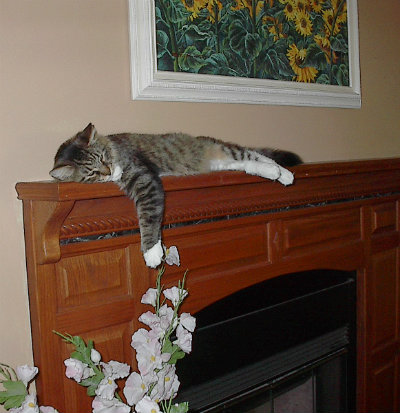 stay open a fraction of a second longer than needed, Sparky will bolt.
stay open a fraction of a second longer than needed, Sparky will bolt.
Now, we had a little Calico, Bratly, who also retained a passion for going outside, but Bratly was content to stop as soon as she found a patch of grass where she could graze. Not so with Sparky. If he gets out, he will promptly head for the woods. When we lived in Vegas, he would easily jump over the wall into our neighbor’s yard, and then over the next wall, and the next, and the…well, you get the idea.
Here, he has only escaped once, but it became abundantly clear that the surrounding woods would be his destination of choice if he should ever get free again. Fortunately, on the day that he did venture into the woods, he obviously met up with a critter that scared the whiskers off him. When I had gone into the woods after him, which by the way descends steeply down toward what used to be a creek, Sparky had come running back and jumped into my arms, something he’s never done before or since. Our best guess is that he was confronted by a raccoon, not the friendliest of woodland creatures.
But it’s doubtful if Sparky retained the memory of that encounter and would surely run into the woods again if he ever got a second chance. Fortunately, the rest of our cats are quite content to remain indoors.
Sparky also will run to the door if anyone knocks, while the other feline residents will scatter for their favorite hiding places. Sparky will rub up against any and all visitors, even if they’re strangers.
Sparky also likes to investigate dark places, which is why there are rubber bands on all the kitchen cabinets. And one has to be quite vigilant when going into a closet lest Sparky slip in unnoticed. I’ve lost count of how many times we’ve gone out, only to discover upon returning that Sparky had been locked in for several hours.
Most uncanny is Sparky’s ability to know exactly when it’s time to eat. And he lets me know it in not so subtle ways. Early in the morning, he manages to give me a heads up by strolling across my face. In the evening, he is suddenly everywhere I am. If I’m on the computer, he’s sitting on the computer, literally.
Second oldest is Cali, our 10-year-old roly-poly Calico. As probably mentioned here before, Cali is not a cat’s cat. She loves to be attended to by humans, and almost demands to be stroked. But she is fearful of the other cats and prefers to stay away from them.
Cali is quite vocal and will let you know what she’s feeling whenever she’s feeling it. For most of the day, she prefers staying on top of the dining-room table. Her reasoning obviously being that from this vantage point she can ward off imagined attacks from the other cats. Disappointing, since Riley, one of the kittens, has indicated he would love to cuddle up and play with her.
what she’s feeling whenever she’s feeling it. For most of the day, she prefers staying on top of the dining-room table. Her reasoning obviously being that from this vantage point she can ward off imagined attacks from the other cats. Disappointing, since Riley, one of the kittens, has indicated he would love to cuddle up and play with her.
Cali will come into the kitchen for her meals, apparently feeling safe with adults in the room. She’ll also take up residence on the sofa in the evening if there’s a spot open. She will also qualify as a lap cat if you let her, and she responds well to being groomed. Cali also produces hairballs with a regularity usually reserved for train schedules.
Francisco, aka Cisco, is our 7¾-year-old pedigree Bengal. He is obsessed with Josephine and follows her around the house day in and day out. He adores her as much as he loves treats, and will demand them if he feels he’s gone too long without them. And when Cisco is vocal, well, you can hear him in the next county.
Cisco likes to prowl at night, doze on and off during the day, and sleep on our bed during late day, early evening. He will then join Jo in her chair while she watches TV. Not in her lap, though; he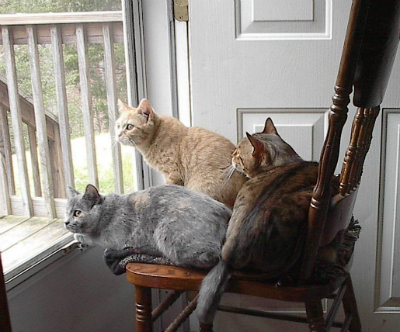 has her move over to make room for him to snuggle in.
has her move over to make room for him to snuggle in.
Cisco is quite paternal regarding the two kittens, Riley and Holly. He will lick Riley up and down whenever he gets a chance, and is very protective of both of them. This of course brings us to the two kittens themselves. Riley and Holly came to us in April. They were 4 months old, which makes them approximately 10 months old now. They are still very much “kittenish.”
Riley, an orange Tabby, and Holly, a dilute Tortie, will chase down anything that moves. Their primary objective in life is to play. They also enjoy eating, especially cat treats. However, like all our cats, they do like table scraps the most. We try to keep that to a minimum, but how easy is it to turn down those cute, begging, bewhiskered kitten faces?
Riley prefers to sleep on the highest dresser in the bedroom, occasionally leaping from there to our bed without even a quick warning. Holly, on the other hand, will often creep into bed and snuggle with me at bedtime. She’ll leave after awhile, only to return in the early morning hours. When she does, it’s usually a four-point landing on my stomach.
Holly hasn’t grown much since April, retaining her petite figure. Conversely, Riley has expanded his kitten length into a generous portion of cat, already as long as Sparky, and much, much heavier.
Each of these warm, wonderful kitties helps to make life worth living. #
Who Says You Can’t Go Back? (10/1/13)
At a time in our lives when remarkable events occur just about every day, sometimes one of these events that takes place is even more remarkable when one studies it more closely. I’m referring to the introduction of Google Maps.
I know a great many people are aware of this incredible feature that one can access online, but I’m sure there are more than a few who, even if they’re aware of the service, don’t really understand or take advantage of what one can actually do with it.
For me, I find I can go back in time and revisit locations where I had lived at one time in my life, places that even though they may have been slightly altered in appearance over the years, can often open up an explosion of memories.
For the record, all you have to do is punch in google maps and enter an address. Even if you don’t recall the exact address, entering something as simple as Main St. and the name of the city will get you into the area. The next thing you do, and here’s where remarkable sets in, you click “street view,” providing that option is available. If, for example, you live in a remote area in the country such as I do in western North Carolina, all you’ll get is a view from above. That can also happen in some non-rural areas, but give it time. The mapping is an ongoing project.
When we lived in Las Vegas, I was able to look at the top of my house, but a street view of the front was unavailable. I went back a few years later and the street view is ready to check out.
Remarkable doesn’t stop there. You can actually move along the street with a few deft clicks of your mouse, turn corners, and get a 360-degree view as you move along. Much to my chagrin, you cannot peer into windows or go into someone’s backyard. Not that I’m a peeping Tom. When I revisited my grandparents’ home in Illinois, there were a lot of changes and I wanted to verify if the goldfish pond was still out back. I couldn’t do this.
When I first started using this service a few years back, you could actually see people on the street in very clear detail. Because of a few accidents in which some people were captured sunbathing nude in their yard, or doing something embarrassing, it was decided to slightly blur facial features.
It’s important to note that some incredible moments have been captured by Google cameras. A stunning UFO incident, for one example, and recently someone’s grandmother sitting on the porch in front of her house a year after she had passed away. The son was delighted to be able to view his then contented grandmother, even though he knows the vi ew will eventually be updated and she will disappear.
ew will eventually be updated and she will disappear.
I was going through a box of mementos my mother had saved over the years, which my sister had sent me, when I discovered the Merrick, Long Island, address of the house Mom and Dad lived in when I was born. I punched it into google maps and there it was. It had just been sold, and for a hefty price at that. Being that I had just been brought into the world, I obviously have no memories of the house. I do recall that my mother had told me this was where she had ventured into the nearby woods and contracted a severe case of poison ivy that landed her in the hospital.
This led me to go to another area on Long Island, Old Westbury, where we had lived in the mid-1940s. The slate-gray house didn’t match my memory of it exactly because someone had painted it yellow, but everything else was quite familiar. And the flood of memories began.
because someone had painted it yellow, but everything else was quite familiar. And the flood of memories began.
We had lived there back in the days when Long Island was still basically one large potato farm. The neighborhood was a quiet little community of attractive residential homes. In the center was a circle of shrubbery and trees where I had played as a child. Facing that was a long tree-lined grassy mall where I had often climbed the crabapple trees there. I remember once being up in one of the trees shirtless and feeling something crawling on my bare back. When I saw the daddy longlegs, I let go of the tree branch I was clinging to in order to dispatch the arachnid, and of course fell right out of the tree. Luckily, I didn’t break anything.
I remember how the people who owned the farm around the corner from our house would give pony rides to the neighborhood kids. The pony actually pulled a cart in which the children rode. I’m not sure what spooked the horse, but it had suddenly taken off, the cart itself turning completely upside down. My memory fades after that. All I recall is it being pitch black and my crawling desperately forward to eventual safety. Luckily again, I didn’t break anything.
I went on to check out my grandparents’ house in Geneva, Illinois, and the grade school across the street, which I had attended for a few months. Gone are the tall, sweet-smelling lilac shrubs that had once covered at least half of the outer perimeter, now replaced with a carefully trimmed line of short hedges. I remembered only pleasant things, such as sitting on a grassy hill as if in an Andrew Wyeth painting, watching the sleek streamliners and steam-belching locomotives chugging by on the tracks below.
only pleasant things, such as sitting on a grassy hill as if in an Andrew Wyeth painting, watching the sleek streamliners and steam-belching locomotives chugging by on the tracks below.
Clicking the mouse carefully, I zipped along Franklin Avenue to South 3rd Street, turned left and moved up to the front of the old Kane County Courthouse. I virtually walked up to the statue in front of the building, which portrays a group of soldiers and displays below it the names of those brave souls who fought in the Spanish-American War, among them my granddad George. I couldn't get close enough to actually read the names, but I know they're there.
I continued up South 3rd Street to State Street, the main drag. The marquee is still there from the theater in which I once watched 1950s movies such as The Day the Earth Stood Still and The Blob, but it is just a sign for a business there now.
My grandfather’s dental office was located just off State Street, but I don’t remember the address, just that it was one flight up. I can still visualize his office as well as smell the “dental aroma” of the place.
I navigated back to google maps and tried to find the house we lived in for a year in Hollywood. In the ’40s, the neighborhood was strictly a quiet residential area. Not knowing the street number, just that it was on North Vista Street, I didn’t have much luck. The area was congested and nothing close to what I remembered. There were many memories from that time, such as Mom dropping my sister Barbara and me off at the Hitching Post, one of a chain of movie theaters that showed only Western films. On Saturdays, the theater would show a double feature, and at least five color cartoons.
I also remember hiking with the Boy Scouts in the Hollywood Hills and coming upon an obvious site for shooting a movie. There was a tunnel carved out of the mountain and we could see the imprint of train tracks that had obviously been temporarily laid down there. Someone had found a pile of shells where an actor in the movie had obviously fired off a .22. It was exciting to me at the time.
There were a number of other Hollywood memories that promptly popped into my mind, such as seeing William Boyd (Hopalong Cassidy) and his horse Topper in person at the Hollywood Christmas Parade. In those days, cowboys were what I was all about. I also remember a friend of my mother’s bringing home a live duck. I was so happy to finally have a pet and I followed it as it waddled all over the property. That Sunday, I remember, when we sat down to dinner, I didn’t recognize the taste of the main course. Yeah, you guessed it. I was both heart-broken and outraged at the same time.
One more memory was finally getting my mother to purchase a Daisy air rifle for me. I had really lobbied long and hard for it, promising I’d be very careful. Of course, the first thing I did was shoot at the garage door and the BB bounced b ack and hit me right between the eyes. I was real lucky once again, but that was the end of my gun ownership as a child.
ack and hit me right between the eyes. I was real lucky once again, but that was the end of my gun ownership as a child.
Retaining the exact address of my Aunt Louise and Uncle Lloyd’s house in which I spent an entire summer and then some in Washington, DC’s Georgetown, I punched it into google maps and there it was, bigger than life! Oh, the memories it brings back. Dinners outside on the patio on warm summer evenings; wonderful, informative conversations with my Aunt Louise; fishing out in the Potomac or on a secluded, private pond in nearby Virginia with my Uncle Lloyd; and playing ping pong or swimming in the pool at the playground located directly behind the Georgetown house.
I have purposely avoided googling back to the old neighborhood in Woodside, New York, as that was pretty well covered back near the end of August. And this installment is already long enough.
But I think I've made my point that, with all due respect to Thomas Wolfe, you can, remarkably, go home again, at least virtually and in your head. Memories, good or bad, are, after all, representative of who you are. The sum total of all the experiences each of us has had, the encounters with others, all of it is what has made me, me, and you, you. #
All in the Family (9/24/13)
I suppose you could say that writing is in my blood.
Prior to his eventual career as a senior official of the Central Intelligence Agency (CIA), my Uncle Lloyd (W. Lloyd George) had worked for 12 years for newspapers and magazines in Milwaukee, Chicago and New York. And even though upon his retirement he was awarded the Distinguished Intelligence Medal for “outstanding achievement as a pioneer in American intelligence” and for “contributions of major significance to the creative structure and functioning of the agency,” he managed to find time to author three books for boys: Air, Men and Wings; Trains, Tracks and Travel; and Grow Up to Fly.
My dad, David R. George Sr., logged in nine years as a reporter, rewrite man and Long Island editor for the Brooklyn Eagle before becoming publicity director of the Long Island Railroad. He was later named director of public relations for Newsday. During his younger years, Dad contributed more than 700 articles and short stories for national magazines, a great many of these in the true detective genre. Dad also penned a novel in 1944, Death Meets the Deadline.
My son, David R. George III, co-authored a screenplay for an episode of Star Trek Voyager, “Prime Factors.” He also is the author of at least 14 Star Trek novels (maybe more, but that’s how many I’ve read and placed in my bookcase so far).
I myself have been active in journalism since the early 1960s, working as an editor for Fawcett Publications, Magazine Management, and a number of other publishing companies. From 1988 through 1996, my wife Josephine and I founded, published and edited a forty-page seniors-oriented tabloid, Carolina Senior Citizen [later changed to 39 Plus] in western North Carolina, which integrated subscribers throughout the U.S. Before our novel, Stardust Dads, which Josephine and I wrote together, I also managed to knock out more than 200 stories, articles and columns for a number of different national magazines, most of which were in the men’s adventure genre.
I haven’t counted how many of these “Second Thoughts” columns I’ve written, but after more than a year and a half of these weekly installments, I would venture to say it’s becoming a sizable body of work.
Funny thing is, when I was in my early teens, I was sure I would become an illustrator. Despite a lack of any professional training, I bought some illustration board and spent many long hours rendering illustrations from comic books. I enjoyed copying the works of some of my favorite artists such as Al Williamson, Frank Frazetta and Wally Wood. And I did some original sketches of my own. I was pretty good, I think, and perhaps if I had gone to art school…well, what if….
Today, as a retired editor, I plan to continue writing this blog while Josephine and I work on the sequel to Stardust Dads. Apart from that joint effort, each of us is working on several individual writing projects, including a children’s book idea I have that so far has proven to be more challenging than I had expected.
A number of people who have read Stardust Dads have voiced the opinion that the novel could easily be the basis for a really good film if done right. Josephine has even gone so far as to select some of the song choices for the movie. And she has a pretty good idea who would portray the dads, as well as Danny and Allison.
If there is anybody reading this blog who has already read our book, maybe you’ve got your own ideas of who the actors might be. If so, we’d love to hear from you. Email us at: davidjo444@att.net #
Splitting Headache (9/17/13)
To say that it is hurtful for two married people to get a divorce is perhaps grossly understated, especially if the separation involves children from the marriage. The split is not only painful; it is often gut-wrenching.
I bring the subject up because it is all around me. Couples close to me have gone their separate ways in the past, while still others are currently thinking about a split as a way to end their unhappiness. And I know at least one couple, with children, who eventually may consider unhooking the marital link as a way to escape their discontent.
I speak from experience. My divorce occurred after 31 years of marriage, and even though our two children were adults, they were certainly affected by the split in a negative way. My mother divorced my father when I was about 8 years old, placing my sister Barbara and me in a boarding home on Long Island. I became heartbroken and homesick, blaming myself for the breakup. Mom eventually hooked up with another man, Arthur, and soon married him.
This led to our release from the boarding prison and our subsequent moving in with Mom and her new husband to his small, three-room apartment in Woodside, New York, at the time a lower middle-class Irish neighborhood in Queens. Unfortunately, there was way too much alcohol consumption that led to both physical and mental abuse. Not many days would pass before there would be yet another heated argument between Arthur and my mother. One particular night is forever etched in my brain.
alcohol consumption that led to both physical and mental abuse. Not many days would pass before there would be yet another heated argument between Arthur and my mother. One particular night is forever etched in my brain.
The two had been drinking in one of the numerous local neighborhood taverns, apparently engaging in an altercation that found my mother walking out on Arthur and coming home. He soon followed, banging loudly on the locked heavy apartment door. It was both terrifying and embarrassing to hear him alternately banging and kicking on the door in between loud strings of profanity. He was so drunk that he not only slurred his words, he became dyslexic.
“You goddam fluckin’ slut bitch!” he yelled. “You whore! You suckcocker!”
I don’t recall what happened next, but somehow Arthur got into the apartment and continued to berate our mother. At some point, he became physical and began to punch Mom. I remember the three of us were in the apartment hall between the front door and the bathroom. Barbara cowered in the lone bedroom next to the bathroom, by now terrorized by all the violence.
Despite my diminutive stature next to Arthur’s six-foot hulk, I was enraged by his vicious pummeling of my mother and leaped at him in a futile attempt to get him into a headlock. He in turn picked me up and flung me into the bathtub, my head ripped open by the tub’s spigot. The last thing I remember is Mom and Barbara screaming.
We didn’t have a phone in the apartment, and cell phones hadn’t even been invented yet, but obviously someone in the building had called the police. They showed up soon after the bathroom brawl and took Arthur away in handcuffs. Mom swore she would press charges, but she didn’t.
A bad situation grew much worse and Mom ultimately went back to Reno where she had divorced my dad, and obtained a divorce from Arthur. I, of course, immediately decided it was my fault, laying the blame on my own shoulders. After all, Arthur kept reminding me that it was my sister and I who were the root cause of all his and my mom’s troubles.
As fate would have it, Arthur didn’t really go away following the divorce. Something would break down and Arthur would be summoned to fix it. Household expenses would suddenly tighten up, and Arthur would be there to chip in with a few bucks. And aside from a few beers in the evening, they both kept the drinking to a minimum. Sooner than later, Mom remarried Arthur and he moved back in to what essentially was his apartment in the first place.
For a few months, maybe a year or so, things seemed okay. If there was an argument, it was over as soon as it started. But eventually the drinking began getting out of hand again. The details have kind of faded in my memory, but I decided to run away. The year was 1955 and I was 16 years old. It had to be in the fall, in October, because from what I could overhear on peoples’ car radios my beloved Brooklyn Dodgers were finally beating the high and mighty Yankees in the World Series. I had nothing but the clothes I was wearing and perhaps a dollar or two. I set out with this romantic notion in my head that I would go west and seek my fortune.
I hitchhiked my way as far as Bayonne, New Jersey, at which point deciding I would hop a freight. I still harbored the thought that all of it had been my fault, and maybe with me out of the way, Mom and Arthur would be happy.
The sun had gone down and it was dark as I hunkered down in the bushes by the railroad tracks, waiting for the next freight train to come. When it did, I jumped out and started running alongside the train, hoping it would slow down a little so I could grab a handle and pull myself aboard. Instead, it picked up speed and blurred right on by me.
I eventually wound up back home, enlisting in the Navy the following year at the tender age of 17. It was yet another way to get out of an unhappy situation. The dates aren’t clear anymore, but Mom did divorce Arthur a second time, only to remarry him yet one more time.
I’m sure a lot of it can be traced back to my mother’s insecurity at being alone. But I do know she was unhappy living with the man. Had she been financially more independent, I believe Mom would not have had to stay with Arthur. I know when he finally did pass on, Mom’s outlook on life brightened considerably.
There are so many reasons for why people split up, and often there's enough blame to be shared equally. As the song goes, breaking up is hard to do. It's certainly hard on both adults, and a lot harder on the children. But sometimes it's even harder to remain in the relationship. #
The Table (9/10/13)
About a year and a half ago I wrote about a game that’s played in our household. I still haven’t given the game a name yet, but the object of the sport is to see how many different ways the furniture in any given room can be rearranged. There are probably extra points to be had if one of the articles of furniture is so heavy as to require at least four linebackers on the New York Giants to move it.
We do indeed have such an article of furniture. It is a solid marble kitchen table and it took four of us to get it into the house. We positioned it in a kitchen alcove and placed the four white, wooden chairs around it. This is where it has remained for three years.
“I need your help with something,” Josephine said yesterday morning as I prepared my breakfast.
“What’s that?” I said, running the fresh cut strawberries under the cold water one by one.
“I want to put the marble table in the center of the kitchen,” she said breathlessly.
“What? Are you insane?” I couldn’t believe what she was saying. “We’ve already been through all that, remember?”
“I know,” Jo responded, “but I think this’ll work. You know I’ve always wanted a center island from where I can work when I’m in the kitchen cooking your dinner.” It’s funny how women always personalize it when they want something to make it seem as if they’re doing you a favor.
Now I have to tell you about this table. The top is solid marble and weighs a ton, which you can almost say literally. We bought it in a second-hand furniture store near Hendersonville in western North Carolina. At the time, I figured the store owner was just happy to make the sale when she practically jumped for joy at the time of purchase. We had no clue that the table weighed as much as it did.
North Carolina. At the time, I figured the store owner was just happy to make the sale when she practically jumped for joy at the time of purchase. We had no clue that the table weighed as much as it did.
Jo’s strapping son Bill volunteered his pickup to help bring it over to the house. We found out later that he needed a friend and another guy who worked at the store to help him load it into a pull-along dolly hooked to his truck. He was then able to detach the dolly and wheel it behind our house to the back door. It then took four of us, which included Jo and Lena, Bill’s wife, to heft it up the short stairway and into the laundry room. We then placed large moving paddles under the table’s legs to slide it into the kitchen.
“Okay,” I said, “after I finish breakfast. But I just know you’re not gonna be happy after we move it, and I’m gonna tell you I told you so.”
Now, while it’s true that we have these large moving paddles that help to move heavy furniture around, we still have to be able to lift the damn table high enough to slip the paddles under the legs.
I was ready for my first hernia.
I tossed the four paddles near each leg and together Jo and I grunted the table up off the floor, just enough to slide each paddle into place. Carefully, we pushed and pulled the table into the center of the kitchen. Obviously deciding the table wasn’t heavy enough, Sparky, our 11-year-old tabby-Maine Coon, jumped up on the table and watched as we swung it around into the center of the room.
We stepped back and surveyed the result. I pointed out how the hanging lamp from the ceiling now hung over nothing.
“And where you gonna put the chairs?” I asked.
“I thought I’d put the skinny table from my dollhouse room into the alcove and then two of the chairs at that table.”
“I saw that table. It’s too narrow, and you could never actually sit at it. And the other two chairs?”
“One at either end of the marble table.”
“I’m sorry, but the whole thing is dumb.”
Jo stood back and looked long and hard at the marble table in the center of the kitchen. Finally, she said, “You’re right, it doesn’t work.”
“Aha! I told –”
“Don’t say it!” Jo yelled. “Just help me move it back.” And we did, with Sparky taking another ride along with Holly, one of the kittens.
Later, I started to comment on the table and Jo cut me off again.
“Don’t you have a column to write?”
"Yes," I responded with a smirk, "and thanks for giving me the material to write it." #
Undead and Unscary (9/3/13)
Today is Labor Day, Monday, September 2, 2013. I just finished reading an online article at CNN.com tonight that got me a bit excited. The article, by Christian Duchateau, was about a novel now hitting the bookstores titled The Returned, which is also the basis for an upcoming TV series.
What got me excited is that the author attributes the idea for the book to a vivid dream he had of his late mother coming back. As I had written here in June, I stopped being a skeptic and became a possible believer in the afterlife shortly after my mother died in 2003. We were living in Las Vegas at the time and at a point not quite midway through the writing of Stardust Dads, July 21, 2003, to be exact, my mother passed away. In my grief, partly as a tribute, partly as a catharsis, I wrote her in as one of the characters, as Danny Wallace’s mother, who dies and goes to “Midway Manor.”
Later, I experienced an incredibly vivid dream in which my mother appeared, announcing she had returned. In the dream, her astonishingly bright blue eyes sparkled as she stood no more than a few feet in front of me and announced, “I’m back!” The surroundings were unmistakably real. It appeared that we were in the lobby of downtown Las Vegas’ Plaza Hotel and Casino, once known as the Union Plaza before the trains stopped running into Vegas. It had always been her casino of choice when she visited Las Vegas, which was automatic every time she flew from the East Coast to the West Coast to see her sister.
In the CNN article, Jason Mott, the author of The Returned, was asked what the idea was behind the book.
Mott: It actually started with a dream I had about my mother. Both of my parents have passed away, my mother in 2001 and my father in 2007. In the summer of 2010, I had this dream that I came home from work one day and found my mother sitting at the kitchen table waiting for me.
I came in and sat down with her, and we just talked about everything that had happened since her death. My going to college, friends that I'd met, it was this warm kind of cathartic dream where I was able to be with my mother again for the first time in almost a decade.
It was one of these really vivid dreams where you wake up and question whether it was real or not. I really expected to find her sitting on the couch when I came out of my bedroom but of course she wasn't. That dream stuck with me, I couldn't get it out of my head. I was talking to a friend of mine who's also a writer and we discussed it, [and] at some point in the conversation he said: What if that really happened and what if it wasn't just her?
I wrote a short story not long after about a couple whose son returns. I did a reading and the crowd really seemed to respond to it. People came up afterward and said how it reminded them of people they had lost. So after seeing that strong reaction, I started writing and about a year later, I had a manuscript on my hands.
It's still kind of hard to believe how it all happened, but it's been a lot of fun and I feel really special about it.
CNN: This could have been a horror story, but you took a much different approach. Why?
Mott: I tried to make the story as grounded as I could because I felt it was such a difficult topic to approach.
When I was working on the manuscript I talked to a lot of my friends, their parents, people that I knew, asking them what they would do if someone they loved who had passed away suddenly showed up again. The responses were really interesting. Usually people were very excited to hear about it, saying they would love to have so and so back, that it would be a really wonderful moment.
Then I would follow up with what would happen a year later, is it still just as exciting and wonderful? Sometimes the answers became really complicated. You had people who had changed dramatically since their loved one had passed away.
I'm not the same person as I was when my mother passed in 2001. I was 22 years old then, now I'm a 35-year-old adult. It's two completely different mindsets. So as much as I love her still, I'm much different now and that could create some friction. There were other people who had similar answers who had moved forward in life. That was the thing I tried most to carry into the novel, to be as realistic as possible.
CNN: What's behind the recent fascination in books, TV and movies with the undead?
Mott: It's the ultimate mystery: What happens after we die? If people are coming back, what does that mean to our beliefs?
The whole genre revolves around that idea as well as the emotional impact of someone you've let go of suddenly thrust back into the equation.
So how do you react to it? On a national level and on a personal level, I think it's everyone really trying to understand life and who they are versus people who have passed away. I think there's a lot of self-exploration going on right now.
People talk about their experiences with the paranormal and contact with loved ones who have passed on. Sometimes they say the contact took place in the form of a dream. Others claim they were wide awake when they experienced the presence of someone who had passed on. Certainly it’s a fascinating subject, of interest to a great many people.
I look forward to the TV series, and I may order Jason Mott's book. But one thing keeps nagging at me. How soon will there be a TV series, or better yet a movie, based on Stardust Dads? Judge for yourself by ordering a copy elsewhere on this website, or at any online site that sells books. It's available in hardcover, paperback, or as an e-book. #
Making Ends Meet (8/27/13)
Last week I wrote about my experiences with bullying back in the 1950s. This in turn led me to thinking about how we managed to survive economically back then.
Following my mother and father’s divorce in the late 1940s, my mom was forced to place my sister and me into a temporary boarding home while she worked as a waitress. In either late 1949 or early 1950, Mom remarried, moving into our new stepfather’s three-room, third-floor walkup apartment in Woodside, at the time a lower middle-class and predominantly Irish-Catholic neighborhood in Queens, New York. Soon after, my sister Barbara and I were taken out of the boarding home on Long Island and reunited with Mom, along with her new husband.
after, my sister Barbara and I were taken out of the boarding home on Long Island and reunited with Mom, along with her new husband.
In general, salaries were fairly low in those days, but so was the cost of living. Arthur, our stepfather, worked as a “business representative” for Con Edison, NYC’s mammoth utility company. His annual wage was around $100 a week, but the rent for the apartment was only about $52 a month. And one’s money had great purchasing power. One could purchase a loaf of bread for about 15 cents, and a pack of unfiltered cigarettes would set you back about 21 cents. The local movie theater, the “Deluxe,” let you watch a double feature for 14 cents.
I don’t know how much it took to have a few beers at the local pub, but Mom and Arthur apparently worked that into their budget as a necessary expense.
I have no idea what the law was in those days regarding the proximity of bars and taverns, but it seemed as if there was one located every hundred yards or so. Barry McCleary’s, for example, was situated across the street and just up the block from where we lived. If you walked up to the corner and turned right, you would see the Green Acres Bar and Grille, and if you walked the other way and turned left at the corner, you would run smack into the Black Horse Tavern, just past the empty lot where we used to play stickball until they chased us. I remember how we used to sit on the empty beer kegs waiting for our turn at bat.
There were many other bars located on surrounding blocks, but these first three I mentioned were where I would usually find Mom and Arthur in the evening, sometimes right after I came home from school.
Still, despite the low cost of so many items, the so-called extras for children, things like comic books, baseball cards and chocolate egg-creams, were difficult to come by. Which is why I first went to work delivering the local newspaper. It was not an easy job as much of the two routes I took on had included multi-floor apartment buildings, in addition to the private homes in outlying areas from where I lived.
I remember one stormy evening in which my bike hit a rock and sent me flying over the handlebars and onto the hard, skin-scraping pavement. I had taken over someone else’s route and the neighborhood was unfamiliar territory in which I had trouble finding the homes. The temperature had dropped suddenly that evening and the rain had turned to snow. I found myself cold and shivering, my arms bloody.
I quit the next day, deciding it just wasn’t worth the $8 to $10 a week in compensation. But I still wanted the comic books and baseball cards, and of course those delicious chocolate egg-creams. That’s when I discovered a shoeshine box for sale at the local Woolworth’s. I invested the $10 it cost and set out to shine shoes.
I first tried doing it in front of the Long Island Railroad station, which was juxtaposed with the IRT elevated subway station at 61st Street and Roosevelt Avenue.
Island Railroad station, which was juxtaposed with the IRT elevated subway station at 61st Street and Roosevelt Avenue.
Not having much luck with that venue, I decided to hit the bars. Bonanza! I would sneak into each pub and go from patron to patron. “Shine, sir?” I would ask. And I would do well at 10 cents a shine, since most would toss me a quarter. That is, until the bartender would order me out. Sometimes that would happen right away, but if the bartender was busy, especially, say, on a Friday evening, well, I’d usually get through three or four shoeshines before getting kicked out.
Pretty soon, my best friend and next-door neighbor, Richie D., also bought a shoeshine box and joined me in the shoeshine business venture. There were enough bars and bar patrons to accommodate both of us, and I welcomed the company. I still averaged at least $5 or $6 on each of the nights we went out, a hefty sum in the early 1950s. I believe we stayed home Sunday, Monday and Tuesday evenings. These had proven to be low-volume nights in which we would be immediately greeted with “Gedouttaheah, kid!” as soon as either of us walked through the door.
I remember one particular evening, around the Christmas and New Year’s holidays. A man who looked to be in his 30s, who was already feeling no pain, grabbed my shoeshine box and started going from patron to patron yelling, “Buck a shine! Buck a shine!” One customer flashed a dollar bill and the man knelt down and polished one of the guy’s shoes to a mirror-like finish. When he stood up, the patron complained, “What about the other shoe?” To which the inebriated, self-appointed shoe-shiner said, “OK. Where’s the other buck?” I walked out of that bar that night with at least $12, quite a haul in those days.
After several years had passed living in Woodside, my mother decided to divorce my stepfather. This certainly wasn’t a surprise for my sister Barbara or me, since Arthur was a nasty, abusive man when he drank too much, which was often. In any event, there was an extended period of time when things got even tighter economically for the three of us. There had been a small monthly stipend of child support from my real father, but that had abruptly stopped when his employment took him out of the country for 10 years.
During this period, the shoeshine job became even more important. Also, someone had given my mother several huge rolls of ribbons, along with a number of other paper rolls with one side shiny and gold-colored. Together with some other materials my mom had, she and Barbara fashioned a selection of holiday corsages, which Barbara then took to the street and sold for much-needed money.
I did other jobs after school, such as delivering for the local butcher. For me, for all of us, back then, survival depended on being resourceful and not afraid to roll up our sleeves.
It was a lesson that served me well then, and again later in life. #
Bully (8/20/13)
In today’s high-tech culture of smartphones and iPads, coupled with the emergence of social media, modern youth face a barrage of bullying tactics that can often overwhelm them, sometimes in extreme cases resulting in a teenager taking his or her own life. Not that self-inflicted fatalities such as this didn’t occur decades ago.
I can speak with authority on the subject since I was a victim of bullying as far back as the 1950s. I don’t think I ever considered the idea of taking my own life, but the ongoing harassment day after day certainly took its toll on my morale.
I remember one bully in particular, Richard F., who was on my case from fifth grade through eighth grade. Most of us moved on to the same high school, including Richard, but the bullying stopped when I began my freshman year since we didn’t share any of the same classes.
It was in fifth grade that the bullying took on an intensity that continued right through to graduation from elementary school. Much of it was physical in nature. One particular incident stands out with amazing clarity in my memory. Richard sat behind me that year, constantly needling me, belittling me and calling me names. I tried to ignore him, but Richard wouldn’t let up.
With the teacher talking and writing on the blackboard, he started pulling on my hair and jabbing me in the back of the neck with a sharp pencil, laughing as he did so. It was then that I had reached my breaking point. I suddenly stood up, spun around and swung my right fist into Richard F.’s laughing face as hard as I could.
Blood spurted from Richard’s nose and he started to cry. For a few brief moments, Richard F. had become the victim and I the inflictor. By the time the teacher turned around to see what the disturbance was, I had sat back down and sought refuge in my notebook. She noticed Richard’s bloody nose and asked if he was OK. She knew there would be no more information forthcoming from anyone because that was the way it was in those days.
Under his breath, but loud enough for me to hear, Richard informed me of what I should expect after school.
“You’re gonna get the beatin’ of your life, you little prick,” he said menacingly.
I spent the rest of the afternoon planning my escape. In elementary school in the 1950s, class was out at 3 p.m. Each individual class was led down the stairs and out of the building into the front schoolyard by the teacher. A monitor in each class was assigned at the beginning of the school year to bring up the rear of the line of students. 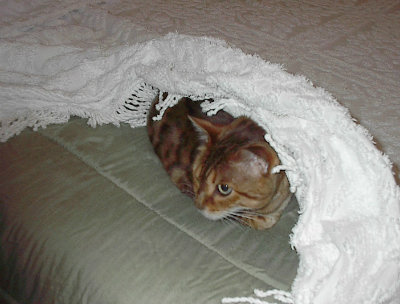
The monitor in my class was John Callahan, the tallest kid in the school. I’m not sure about today, but in the early to mid-1950s, a fifth-grader who exceeded six feet in height was quite unusual. Consequently, it was the biggest kids who were picked to act as monitors.
When our class of about 35 began to assemble to go downstairs, I purposely positioned myself near the end of the line. I whispered to John that Richard F. was after me and could he let me slip out of line when we got downstairs. John, of course, was one of the good guys, and he had no problem with that.
When the class got down to the building’s exit to the schoolyard, I had already dashed out the back door of the school and broken into a mad run for home nine long blocks away. Meantime, when Richard and his clique of wiseguys realized what I had done, they took off after me.
Now I was short for my age, and still am, but I was probably one of the fastest in the school. I was the target of more than one bully, and I never backed down from a fight, although I lost most of them. I knew I would eventually have to face Richard F., but I was determined not to make it easy for him.
I got home to our third-floor walk-up apartment and locked the door. As usual, no one was home. Richard and his little gang finally arrived and started banging on the door, whooping and hollering loudly. To this day, I still can’t figure out how they knew where I lived. They finally gave up and left, but not before they tore our delivered local newspaper into a thousand tiny pieces.
The next day, Richard called me out in front of everyone, calling me a chicken and a coward, until I agreed to meet him outside the schoolyard and fight him one-on-one. And I did, giving it everything I had. But Richard F. was bigger and tougher, and he won handily. His boys were there, however, and I’m sure if I had pulled off a miracle and won the fight, they would have stepped in.
I cite these examples of the abuse I suffered, but the real story is the anguish, the dread I endured day after day for many years. There were other instances in my youth when I was picked on and bullied, when I was called out to fight, but thankfully, social media and its electronic enhancements were far in the future. I can just imagine the taunts, the jeers, the lies I might have been subject to had technology moved more quickly.
I’m not a psychologist and I can’t begin to understand why certain people bully others. But I do understand what it means to be the one who is bullied. I do think we as a society are more aware of the problem today. Hopefully, we will come up with ways to lessen the impact of this behavior, and perhaps define and diminish its root causes.
Meantime, I can relate to today's targets of bullies. I really feel for those kids. #
Gripes of Wrath (8/13/13)
This week, I need to get a few gripes, complaints and annoyances off my chest. I’m sorry, but it helps me to cope.
I’m growing more and more annoyed with cashiers who, when I purchase just one item and it’s contained within its own bag or box or other esoteric wrapper, ask me: “Do you want a bag for that?”
Yes, I want a bag for that. I’m a customer who paid for that. Don’t ask me if I want something to carry it in. Did I ask you if you want me to pay for that? Just put the friggin’ thing in a bag and be done with it.
And speaking of cashiers, another thing that annoys the hell out of me is a cashier or checker who carries on an extensive conversation with the bag person, seemingly unmindful of my  presence. Hey, checker, pay attention to the items you’re waving haphazardly through the scanner. That way I don’t have to come back to the store and endure the grunts and groans of an overweight, underpaid store manager as I point to the register tape showing double or triple entries for the exact same item.
presence. Hey, checker, pay attention to the items you’re waving haphazardly through the scanner. That way I don’t have to come back to the store and endure the grunts and groans of an overweight, underpaid store manager as I point to the register tape showing double or triple entries for the exact same item.
And please don’t get me started on robots that answer the telephone:
“All right. Are you a registered member?”
“Yes.”
“You said yes. Is that right?”
“Yes!”
“All right. Please enter or say your 26-digit special code.”
“Representative!”
“I’m sorry, I did not get that.”
“Representative!”
“Did you ask to speak to a representative?”
“Yes!”
“You answered yes. Is that right?”
“Yes, you robot shithead!”
“Please wait while I connect you with a representative.”
Another thing that sets me off is the sales clerk obviously working on commission who pounces on you the minute you enter a store and asks if he can assist you.  This is particularly annoying when the store is one in which you have to browse around before deciding on your purchase. Even when you wave them off, politely saying you’ll let them know, they hover close by, watching your every move.
This is particularly annoying when the store is one in which you have to browse around before deciding on your purchase. Even when you wave them off, politely saying you’ll let them know, they hover close by, watching your every move.
Let me alone, damn it. I’ll know what I want when I see it.
Of course, you know when you finally do decide, there won’t be a clerk available anywhere.
As a homeowner, one of my biggest pet peeves are people who think nothing of tossing beer cans, sandwich wrappers, empty cigarette packs and, yes, even used condoms on to my property as they drive by my house. If I don’t patrol my property for more than a few days, it begins to look like the local landfill.
Another thing that’s starting to get to me is the weather. I live in the Southeast and I’m wondering if it’s ever going to stop raining. Oh, sure, the sun comes out for a few minutes. But then it’s gone and it’s raining again…hard. Several inches in a few hours is not unusual. A plan is beginning to form in my head for building a small ark.
I’ve signed on to the Do Not Call list, yet sales people call all the time. What drives me nearly insane is when you politely inform the caller that you’re not interested – and they keep right on talking. Click.
Satellite TV is another headache-producer. We invest almost two hours in an intensely interesting movie until, near the very last scene, the rain returns and the screen goes black, the TV searching for a signal. Yes, we miss the ending of the movie. Grrr.
And why is it that so many people have to preface a question with a question? May I ask you a question? Yes. That’s one question answered. Do you have another question?
Finally, I’m passworded and user-named up to my eyeballs! I’m having trouble remembering all of them, and when I write one down, I can’t find the paper I wrote it on. It’s a lost cause for me, for my wife Josephine, and for millions like us, but maybe there’s hope for the future.
At birth, everyone should be assigned a three-digit ID code that is unique to that individual and can’t be broken or assumed by anyone else. It will be part of that person’s DNA.
But the biggest annoyances, I guess, are bloggers who bitch about everything. #
One of Those Days (8/6/13)
Did you ever have one of those days when just about everything goes wrong? It doesn’t happen often, but today was one of those days. As usual, Holly, one of the two kittens we recently rescued, did her four-point landing on my stomach. At nearly the same time, I could hear the unmistakable sounds made by Sparky as he began throwing up somewhere in the darkened bedroom.
I groped for my small flashlight and turned it on, making sure my slippers were not part of Sparky’s target zone. Satisfied all was clear, I got up and moved to the kitchen, careful to sidestep various cat toys strewn about the interior landscape. In the dim light of early morning, the house took on the appearance of a war zone.
I made it to the kitchen fully intact, quietly rejoicing in my avoidance of any bruises, punctures or lacerations. My joy was short-lived, however, when I discovered that the water in the drip coffeemaker refused to drip. I opened the lid and peered in, horrified to see the paper basket containing coffee grounds filled to the brim with dark liquid. I shuddered at the thought of starting the day without coffee.
I shuddered again at the thought of what Josephine’s reaction to our coffee-less plight would be when she got up. Aware of the chorus of plaintive meows, I hurried to open the cans of cat food and dispense their feline breakfast. I remembered there were a number of items I had listed on eBay that were going off today. While the cats lapped up their smelly morning fare, I rushed to complete my bathroom ritual, making sure to take my eye drops and check my blood glucose.
The thought of preparing breakfast without coffee seemed pointless. I proceeded with the routine anyway, cutting up and rinsing a handful of strawberries, pouring half a glass of orange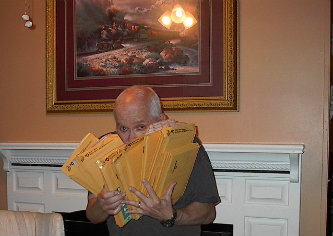 juice, opening a hardboiled egg, and toasting an English muffin. I also grabbed a container of apple-flavored yogurt and a spray can of light whipped cream. I gather it all up and placed it on my folding table in the living room so I could watch the morning news. I had eaten half my muffin when Jo walked into the kitchen.
juice, opening a hardboiled egg, and toasting an English muffin. I also grabbed a container of apple-flavored yogurt and a spray can of light whipped cream. I gather it all up and placed it on my folding table in the living room so I could watch the morning news. I had eaten half my muffin when Jo walked into the kitchen.
“Shit!”
Josephine had obviously discovered the dysfunctional coffeemaker and screamingly empty coffeepot. But unlike me, who unflinchingly succumbed to defeat and accepted the involuntary coffee drought, Jo scrambled through cabinets until she came up with some long-forgotten packets of instant coffee she had picked up a couple of years ago for just such emergencies. She also offered me a choice of some ancient tea bags she had pilfered from our stay at a hotel in Charlotte during a comic convention.
It wasn’t the worst coffee I ever had, nor was it the best, but it was a life-saving sustenance that got me through to the next debacle – which turned out to be eBay. I had offered a number of collectible baseball cards as fixed-price items that required immediate payment. This made it difficult for one buyer who wanted four of the cards. Consequently, he had to pay for each card separately, which included the $2 shipping fee each time. He messaged me with the last card, asking for help fixing the overpaying of the shipping fee as I can ship all four cards for one $2 fee.
This is where it got complicated as eBay’s automated system did not combine the cards and treated them as if there were four different buyers. I finally had to call eBay, which is on the West Coast. Unfortunately, the eBay agent’s headset malfunctioned and I could barely hear him. He had to email me the instructions, which included my having to tell the buyer he had to pay for the last card as well, and then I would issue a full refund for it. This would then cover the overcharge. Trouble is, the buyer disappeared and to date has not responded.
Meantime, I realized much to my horror that I was down to my last 6”x 9” bubble envelope and wound up using a much smaller one for the last buyer, which was barely large enough for the eBay label to fit. I printed the labels, wrote out some checks for bills, showered, dressed, packaged up the four cards, plus some other cards for other buyers, and drove to the post office.
I bought some stamps, processed the eBay packages, and removed the mail from my box. When I got back into my car, I noticed a letter from an agent at State Farm who was always soliciting me for home and auto insurance. I’ve been seriously considering changing companies, so I opened the envelope. Inside was a check for $3,000. For a moment, my heart skipped a beat, until I realized the check was for someone else. I took it back into the post office and returned to my car. That’s when I remembered I needed gas.
I drove over to my usual gas station, opened the lid to my gas tank and processed my debit card. I shoved the nozzle in and tried to pull the trigger. It wouldn’t budge. I finally gave up after several tries. I reinserted my card, but a message appeared telling me to see the cashier, which was at the other end of the station complex. As I hiked over to the cashier’s window, I wondered what was going on with the day.
The woman punched something up on her monitor and proceeded to explain exactly what I had just done, step by step. She had no explanation for the malfunctioning nozzle, but told me that she had cleared everything and I should try it again. I trudged back to my car and went through the ritual again. I squeezed really hard until my hand hurt, and finally I was able to fill my tank with fuel.
I decided to drive in to Brevard and visit the local Walmart to purchase more bubble mailers. I usually buy them at Dollar Tree, two for $1. The sign said five for $2.97. I thought, What a deal! I bought 30. When I got home and explained my good fortune, Josephine responded by pointing out how I had paid way more than 50 cents each for the envelopes.
Math was never my strong suit.
That's when Jo reminded me that I had a column due in the morning. There went my evening. So much for retirement. I need to go back to work and get some rest. #
Maniac Kittens Revisited…Again! (7/30/13)
I can’t help it because they can’t help it. I have to write about them again because they keep doing things that compels me to write about them…again. We’re referring, of course, to Riley and Holly, two recently adopted kittens who have pumped up our total feline population to an imposing five.
Between the two out-of-control kittens, the lead culprit changes from minute to minute. As I write this, both “little ones,” as we often refer to them, are sleeping, resting up for their next wild tirade.
This morning, at approximately 6:30, both kittens hurtled into our bedroom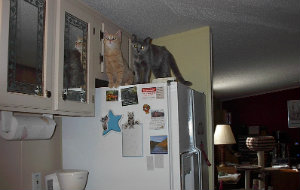 like two miniature cannonballs. Holly hit Josephine’s blanket-covered rump with a resounding thump. At almost the same time, Riley landed on all fours – on my stomach!
like two miniature cannonballs. Holly hit Josephine’s blanket-covered rump with a resounding thump. At almost the same time, Riley landed on all fours – on my stomach!
What can I say? It’s one way to greet the new day. I threw back the covers and foot-groped into my slippers. “C’mon, kitties,” I addressed the darkened room. “Let’s get you breakfast.” I stumbled down the hallway toward the kitchen, both small felines racing past me. I paused briefly to turn on the computer, and then proceeded to the kitchen.
After turning on the small corner lamp on the counter, I opened the window over the sink. Sparky and Cali, our two oldest cats, promptly meowed in unison, reminding me of my primary obligation to feed them. As I began filling the coffeepot with water, Cisco, our 7-year-old Bengal, joined the fray, meowing his two cents loudly from the marble table in the kitchen alcove. Meantime, both kittens jumped up on the counter, Holly opting for the windowsill while Riley monitored the coffee preparation, fascinated by the tap water rushing into the pot.
Finally, with the gurgling of the coffee machine reassuring me that help was on the way, I moved into the laundry room and the shelf holding the stacks of canned cat food. Sparky meowed his approval as I scanned the labels, quickly picking out three cans of Fancy Feast tuna and ocean whitefish. It was by far the favorite of all five felines.
machine reassuring me that help was on the way, I moved into the laundry room and the shelf holding the stacks of canned cat food. Sparky meowed his approval as I scanned the labels, quickly picking out three cans of Fancy Feast tuna and ocean whitefish. It was by far the favorite of all five felines.
After spooning out the cat food onto five small dishes, satisfied that each cat was now totally engrossed in his or her morning ritual, I slipped into my bathroom for the rest of my morning rituals.
Returning to the kitchen, I checked the progress of the coffee machine, after which I went into the living room and turned on the TV just in time to catch Good Morning America and the news. I opened the front door and pushed up the window to expose the screen in the storm door so the cats could look out on the yard. I wheeled the bench over and Cisco was instantly there, beginning his daily surveillance of the landscape and watching for the inevitable squirrel, rabbit and bird.
By this time, Jo was up and stirring her first morning cup of coffee. I poured my first mug and joined her in the living room to watch the news.
Suddenly, there was a loud thud that sounded as if it came from the kitchen. I jumped up out of my chair and hurried into the kitchen, just in time to see Holly, Riley and Cali scampering in different 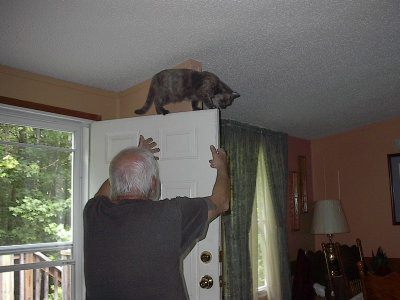 directions to escape the scene of the crime. The crime turned out to be the deliberate pushing of a tub of "I Can’t Believe It’s Not Butter" off the counter and onto the floor. Thankfully, the lid had not been knocked off. I picked up the container and put it back into the refrigerator.
directions to escape the scene of the crime. The crime turned out to be the deliberate pushing of a tub of "I Can’t Believe It’s Not Butter" off the counter and onto the floor. Thankfully, the lid had not been knocked off. I picked up the container and put it back into the refrigerator.
Following breakfast, I sat down in front of the computer and began checking email. Within minutes, I was startled by a loud, shrill scream uttered by Josephine. She was standing in the foyer looking up at Holly who was carefully balancing herself on top of the front door.
“How the hell did she get up there?” I asked Jo, watching warily as Holly did her Wallenda imitation.
“It looked like she spotted something crawling on the ceiling,” Jo said, “and the door seemed like a good way to get close to it. She jumped from the bench.”
I grabbed a dining room chair and was going to use it to bring Holly back down safely when the dilute tortie kitten gracefully jumped back down onto the bench. Be still my heart.
In the afternoon, I decided to lie down on the sofa for a short nap. Bad timing. Holly and Riley decided it was time to do their 100-yard dash. Starting in my den, they would take off sounding like a herd of wild elephants, thundering through the dining room, into the living room, past the fireplace and down the hall into our bedroom. Making a quick turnaround, 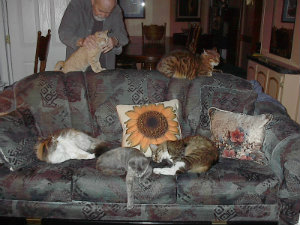 they would shoot over the bed and back into the hallway, through the office and the kitchen and back into my den, only to again turn around and gallop back through the dining room and into the living room. This time, they scampered over the sofa and my vulnerable naked arm, climbed Jo’s wingback chair onto the fireplace mantle, and dashed down the hall, disappearing into Jo’s crafts room.
they would shoot over the bed and back into the hallway, through the office and the kitchen and back into my den, only to again turn around and gallop back through the dining room and into the living room. This time, they scampered over the sofa and my vulnerable naked arm, climbed Jo’s wingback chair onto the fireplace mantle, and dashed down the hall, disappearing into Jo’s crafts room.
I got up and promptly noticed the new scratch on my arm. I knew it was new because it was a deeper red than the other scratches – and it hurt. I went into the bathroom, smeared some triple antibiotic ointment on it, and slapped on a small bandage.
A little while later, Jo called me into the kitchen.
“Did you see this?” she said, pointing to the top of the cabinets. The end piece of molding was hanging straight down, dangling by one lone nail.
“What the hell—”
“Exactly!” Jo said. One of the kittens, I’m not sure who, obviously tried to get up on top of the cabinets and, well, didn’t quite make it.”
“But there’s no room for anything on top of the cabinets,” I said.
“Tell that to Holly and Riley.”
Later, I was able to nail the molding back into place, but I’m not sure if it’s going to stay. Anyway, sooner or later, Holly or Riley, or both, will try to get up on top of the cabinets again. It's just a matter of time.
I can hardly wait. #
My Whole Life Flashed Before My Eyes (7/23/13)
If you’ve started reading this and you’re in your 20s, or younger, it probably won’t hold your interest. I know for me, when I was young, I never thought about my mortality, about death. That was something that happened to mostly old people.
I’m now an old people and I think about it a lot. Actually, I guess, I probably started thinking about it a while ago, although not when I was a 20-something. No doubt I first started to think about it when I nearly died. I was in my 30s and we lived in a house near a lake in upper Westchester County, New York.
Owning the property there entitled us to lake rights, though I wasn’t much for swimming or sunbathing. In fact, I don’t recall ever going down to our little beach and going swimming in the 14 years we lived there – except once. It was in the evening of a warm summer’s day and our homeowners’ association was putting on a barbecue.
There were hot dogs and hamburgers, potato salad, coleslaw, chips, sodas, toasted marshmallows, and buckets of ice cold beer. Everything you would normally expect at a barbecue.
I’m not sure what I was drinking those days, but it was definitely the hard stuff. Bourbon, vodka, Scotch, gin, you name it. I doubt it was Scotch, though, because I only drank that for a short time in my life, deciding early on that the taste of Scotch was more punishment than enjoyment.
That particular day, I’d had more than a few shooters up at the house, so I was feeling no pain when I got down to our little beach. Many of the local residents had already arrived, a few of them swimming out to the float. There was music coming from somewhere, and the fire had already been started. Small children had been relegated to their homes, leaving an assortment of men and women of various ages, and a few teenagers sprinkled among them. Someone tossed me a can of beer and I chugged it down like a thirsty man stranded in the desert. As so often was the case in those days, I didn’t stop at the one.
The evening wore on and it grew dark as I opened yet another can of beer, the number of which I had long ago lost count. That’s when I had the brilliant idea of swimming out to the float. Without giving it another thought, I waded out into the moonlit water and began swimming toward the float with all my clothes on, including my shoes. I could barely make out the float in the distance, but when I got pretty far out, I realized I had used up all my strength and was starting to go under! It was by now pitch black all around me, and I had no idea where the float was.
I sank below the water and fought to thrash back up to the surface. I suddenly realized in my drunken stupor that I was actually going to drown. I had been taught in Navy boot camp how to swim for distance, and how to float. Apparently, they forgot to teach me how to survive in the water while drunk as a skunk. I managed to yell help once, twice, again. My wife at the time did hear me, but thought I was fooling around. My thoughts were racing. At first, all I could think of was actress Shelley Winters being dumped into the lake by Montgomery Clift and left to drown in the film, A Place in the Sun. And then, yes, my whole life seemed to flash before my eyes. I thought for sure I was about to leave this world forever. It seemed as if everything that had ever happened to me, every person I had ever known, up to that point, flashed before my eyes.
That’s when two teenage neighborhood boys showed up and took hold of my arms, keeping me from going under again.
“Are you okay, Mr. George?” asked Dean Ohare, my muscular 16-year-old neighbor who worked during the summer months as a lifeguard at our beach.
“N-No,” I stammered. “I screwed up.”
“We’ll getcha back safely, Mr. George,” said the husky Porter kid, my neighbor on the other side of me, who also filled in part-time at the beach as a lifeguard. And they both “towed” me back to shore.
Not helping matters was my having an early history of bad dreams of drowning at the beach. Throughout most of my childhood, I would have this recurring dream, a nightmare really, that I would be swallowed up by a huge wave and drown.
And to think I had spent three and a half years on a destroyer, most of that at sea, without a hitch. Well, there was one major storm while we were crossing the North Atlantic. As the ship heaved and pitched up and down, rocking from side to side, I thought we were all going down to a watery grave. Fortunately, we got through the storm in one piece and made it back to port.
But the lake incident was the closest I had ever come to death, and when I look back on it now, I remember why I don't go near the water today. Not even the bathtub. It's showers only for me. #
Marmalade (7/16/13)
It seems like only a few weeks ago that I found myself writing a eulogy about a stray cat we had named Lucy. But actually it was a while back, toward the end of January.
It’s now Monday night, my self-imposed deadline for writing my weekly column – excuse me, blog – and true to form, as I had explained in last week’s blog, I now find myself wondering at the last minute what I should write about. A moment’s reflection tells me with a high degree of certainty that I must again write about a deceased stray cat.
Marmalade was an orange-and-white cat with an intrinsically friendly nature 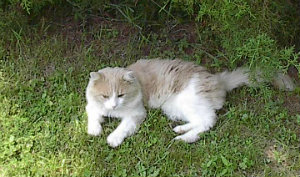 who first showed up in our yard during the summer of 2010. It was right after we had moved in, probably that first week, though I can’t be sure. She was outgoing and affectionate and talked up a storm, seemingly telling us in a singsong feline manner how tough life had been for her.
who first showed up in our yard during the summer of 2010. It was right after we had moved in, probably that first week, though I can’t be sure. She was outgoing and affectionate and talked up a storm, seemingly telling us in a singsong feline manner how tough life had been for her.
Of course, our first act was to feed Marmalade. Three adult cats already shared our quarters, so we certainly had plenty of cat food on hand.
That first week or so, we weren’t sure if Marmalade belonged to someone and had gotten lost, or had been abandoned. She didn’t appear to be feral as she had no trouble rubbing up against our legs and purring in anticipation of being fed. As the weeks turned into months, Marmalade continued to visit us most every day. We named her Marmalade because of her coloring, but I’m sure she was called something else by her previous owner.
Josephine even placed a photo of the 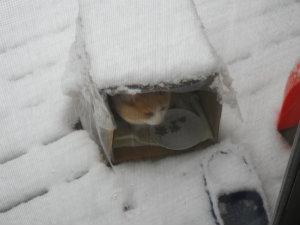 bewhiskered visitor on Craigslist with the caption, “Is this your cat?” But there was never any response.
bewhiskered visitor on Craigslist with the caption, “Is this your cat?” But there was never any response.
I tried looking up Marmalade’s breed in our many cat books, deciding she fit the description and pictures of the Kuril Bobtail, a probable descendent of the Japanese Bobtail. In other words, she was an orange-and-white cat.
Most days, she’d relax on our deck or lie in the grass, watching as I mowed the lawn, or she'd run up to the garden to inform Josephine that it was supper time. Our feline guest became a permanent fixture that summer, and we became quite fond of her. We couldn’t let her come into the house because of our other cats and the strong possibility of starting World War III. The summer months were warm, and the fall was comfortable enough. Most assuredly, there was no inkling of the harsh, snow-filled winter yet to come.
Looking back, there were four major snowstorms that hit western North Carolina in 2010-2011. To make matters even worse, right after Christmas I slipped on some hidden ice under th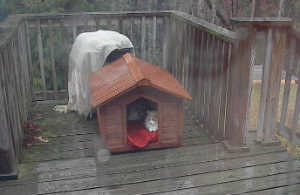 e snow in our driveway and broke my ankle in three places. But that’s another story.
e snow in our driveway and broke my ankle in three places. But that’s another story.
Prior to that, we faced the problem of what to do with Marmalade during the bad weather. Josephine took a large cardboard box left over from the move and fashioned a temporary shelter for the feline. She used packing tape to affix a large plastic trash bag to the box in a fairly successful attempt to waterproof the shelter during the frequent snowfalls. It worked and Marmalade survived that bad winter. Not that she spent all of the winter months in that cardboard box. Far from it. She appeared to have a network of places in which she found warmth and shelter and food. And the cardboard box sooner than later became water-saturated and eventually collapsed.
There were also days during the winter when it would warm up slightly. Following that first snowstorm, I was able to go outside and build a snow-woman, much to the delight of Marmalade who kept me company the whole time.
The next summer, we managed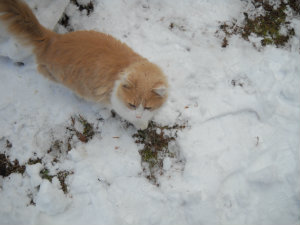 to acquire a doghouse, which we placed on our small deck so that Marmalade would be able to use it for shelter during snow or rain. And she did.
to acquire a doghouse, which we placed on our small deck so that Marmalade would be able to use it for shelter during snow or rain. And she did.
Marmalade would sometimes disappear for several days, and we would worry. We think she was able to get her meals elsewhere from time to time, but she always eventually came back to us.
During part of 2011 and most of 2012, Marm would disappear for days on end, then return battle-scarred and scratched up. She was a scrapper who obviously protected her “turf,” and perhaps invaded someone else’s. We would wince each time she showed up with visible wounds, but there wasn’t much we could do to prevent it.
However, Marmalade was no fool. In the evening from time to time, one of a family of raccoons would show up on our deck and begin eating Marm’s food. Marmalade would jump up on the banister and sit there while the invader disposed of her supper. No way was she going to tangle with this masked bandit.
Another time, she showed up with several large horse ticks clinging firmly to the back of her neck. We knew we had to be careful pulling them out lest we leave the ticks' heads embedded in the cat’s body. Jo squirted some liquid soap over the insects, but Marmalade scampered off before we had a chance to remove the ticks.
She came back a few days later, virtually tick-free and looking scrubbed and clean. 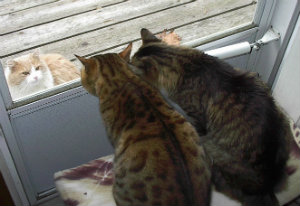 It was obvious that someone else had befriended the animal and looked after her needs.
It was obvious that someone else had befriended the animal and looked after her needs.
Recently this year, we spotted Marmalade being chased in the woods by a stray dog. The poor cat scurried up a tall tree to avoid the snarling canine’s deadly teeth. We stood on our platform that juts out into the woods and cheered Marmalade on, shouting loudly at the menacing dog until he finally gave up and scampered up the opposite side, disappearing over the hill.
“How’s she gonna get down?” Jo asked, concerned. “She’s pretty high up. Cats can climb up trees easily, but they have problems getting down.”
“Just wait,” I said.
We watched with bated breath as Marmalade eventually realized the dog had gone. She began to descend slowly, easing herself back down in reverse … one paw at a time.
It took a while, but Marmalade finally made it down from the tree. It apparently took a lot out of her and she limped off, disappearing deep into the woods.
She showed up a few more times after that, not looking too good. We fed her and off she’d go. A few days passed and I began to worry about her. And then one morning, Jo walked up to the garden. A few minutes after she had left, she returned, breathless.
“David! Marmalade is dead!”
“Where? Where is she?” I managed to finally rasp.
“Behind the shed. You know, under the overhang where she’d go sometimes to nap.”
I got up from the computer and hurried out to the shed to confirm what Jo had just told me. When I saw Marmalade lying lifeless there on her side, it felt as if someone had just stabbed me in the heart.
Goodbye, sweet, tough Marmalade. You will be missed. #
How to Write a Weekly Blog (7/9/13)
The first rule of thumb is to never write a blog in advance because a more important subject may present itself. Always wait until the last minute.
During the week, take lots of naps. Rest is a high imperative. 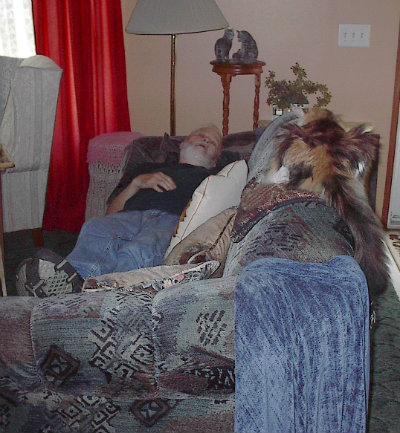
Mow the lawn.
Clean the litter boxes at least twice daily; sometimes three times.
Load the dishwasher.
Go out on the deck and throw peanuts to the squirrels, then leave some on the deck railing so that they can come up and entertain the cats.
Drive to the Post Office.
Spend two hours a day weeding in the yard.
Drive to Walmart, purchase kink-free garden hose on sale, return home and hook up to spigot on driveway side of the house.
Straighten out tools in the shed.
Watch the baseball game on the computer.
Surf the Web and check out all news feeds to see what’s happening in the world.
Play solitaire on the computer.
Take the garbage cans out to the shed so that raccoon doesn’t get into them and spread garbage all over the yard.
Take all your books out of your 11 bookcases and dust.
Put all the books back into your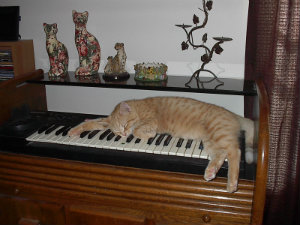 bookcases.
bookcases.
Revamp your baseball-card collection by grouping them into specific categories and then placing them into bigger, better loose-leaf books.
Visit the Saturday flea market and chat with your friends who sell baseball cards and comic books. Purchase a few 1950s cards and a couple of old comic books.
When you get home, examine the comics carefully, grade and price them, and then put them into clean, acid-free sleeves.
List your newly purchased comic books and baseball cards on eBay.
Finish one of at least eight books you always seem to be reading.
Watch several episodes of The Walking Dead you’ve recorded on your DVR. Each evening, make sure to watch both reruns of The Big Bang Theory.
Tell your wife the blog is mulling around in your head, and anyway, it writes itself. If absolutely necessary, remember that the best defense is an offense. Just tell your wife loudly and firmly: “Get off my back!”
Don’t worry about coming up with pictures to post with your blog. You’ll usually find some at least two hours past your bedtime the night before your blog is due.
The main photo in this week’s blog was taken by Josephine George and not sanctioned by the author. She also snapped the secondary photo of Riley, the orange tabby who can and does nap anywhere. He does not write blogs.
Portions of this week's blog were contributed by Josephine, who came up with the idea for this post in the first place. #
CAT Scan (7/2/13)
With all the mayhem, treachery and skullduggery going on in the world – and that’s just in Congress – we thought we’d keep this week’s posting light. That’s why we’ve decided to formally introduce you to each of our five current feline residents, in order of their first appearance.
Sparky’s arrival was a rescue waiting to happen. It happened 11 years ago inside a PetSmart store in Las Vegas. As w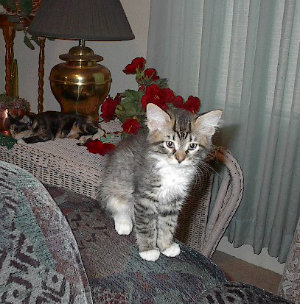 e browsed the cat toy aisle, we heard a loud, plaintive meowing as a woman hurried by us carrying something wrapped in a towel. We rushed after the woman, asking if we could have a peek at what she was holding.
e browsed the cat toy aisle, we heard a loud, plaintive meowing as a woman hurried by us carrying something wrapped in a towel. We rushed after the woman, asking if we could have a peek at what she was holding.
The woman stopped and pulled a portion of the towel away to reveal the most adorable little kitten we had ever seen. She explained that she was turning the frisky little stray into the adoption center there because a bunch of neighborhood boys were tossing him around like a football. She said she already had three large dogs and just couldn’t take on the burden of caring for a cat.
We didn’t hesitate, offering to take the kitten off her hands right then and there. She appeared relieved and handed over the little fella, whom we later discovered was part Tabby, part Maine Coon. The next day, we took Sparky to the vet and saw to it that he got a thorough examination and received all his shots. As with all our indoor cats, we later had him fixed.
Sparky is a loving cat who, unfortunately, loves to escape to the outside. Despite our best efforts, he managed to fly the coop on a number of occasions while living in Vegas, easily scaling an eight-foot d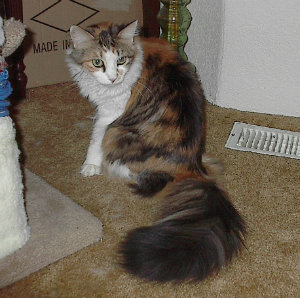 ividing wall and terrorizing our neighbor’s puppy. Here in the wilds of western North Carolina, Sparky has managed to escape only once, and he ran directly into the woods. I went into the woods after him, calling his name repeatedly. But Sparky must have met up with a critter that frightened him, because he came right back to me and jumped into my arms, something he had never done before.
ividing wall and terrorizing our neighbor’s puppy. Here in the wilds of western North Carolina, Sparky has managed to escape only once, and he ran directly into the woods. I went into the woods after him, calling his name repeatedly. But Sparky must have met up with a critter that frightened him, because he came right back to me and jumped into my arms, something he had never done before.
Sparky’s lone goal in life is to capture and eat every fly and moth that has the misfortune to flutter or buzz into our home. He is also a gourmet leaf eater. He won’t eat just any leaf. It has to be old and crunchy, preferably that from a fruitless mulberry. Don’t insult him with an oak leaf, or something off a tulip tree. No siree. He will, however, settle for a delectable maple tidbit.
One last fact about Sparky. He loves his food … and everyone else’s. His M.O. is to nibble a while on his, then do a quick end-around through the dining room and back into the kitchen to nudge Cali aw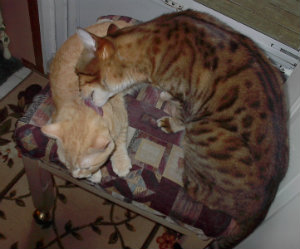 ay from hers, which he then gobbles down quickly before she can recover from the invasion.
ay from hers, which he then gobbles down quickly before she can recover from the invasion.
Which brings us to 10-year-old Cali, our second arrival. Yes, she’s a Calico, but don’t blame us; she came already named. We found Cali at an adoption center and Josephine promptly fell in love with her. We had lost our beloved Bratly, a 10-year-old Tortoiseshell, to a thyroid storm in 2002, and Jo had been searching for a replacement.
Cali is a scruffy semi-longhair who loves to be with people, but barely tolerates other felines. She loves to be brushed and combed, which she needs on a regular basis, and can capture and eat an invading moth as if she were on speed. Cali will kill for people food, especially if it’s rotisserie chicken.
C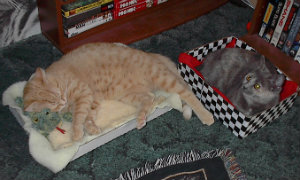 isco, aka Francisco, is a purebred Bengal given to us when he was four years old. Now 7, Cisco is a most unique cat who adores Josephine, following her around like a lost puppy. Cisco is quite verbal and when he speaks his mind, you can hear him in the next county. He likes his treats and considers them a regular part of his regimen. He lets us know when he thinks it’s time for a treat by going into the kitchen, slamming his quite solid cat body into a lower cabinet door and howling at the top of his very Bengal voice.
isco, aka Francisco, is a purebred Bengal given to us when he was four years old. Now 7, Cisco is a most unique cat who adores Josephine, following her around like a lost puppy. Cisco is quite verbal and when he speaks his mind, you can hear him in the next county. He likes his treats and considers them a regular part of his regimen. He lets us know when he thinks it’s time for a treat by going into the kitchen, slamming his quite solid cat body into a lower cabinet door and howling at the top of his very Bengal voice.
Cisco’s primary haunts are at the foot of our bed, on the fireplace 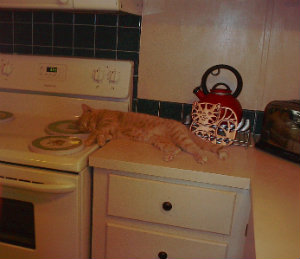 mantel, on the top of the sofa back, or on a wheeled stool in front of the screen door where he can monitor our yard and the woods beyond.
mantel, on the top of the sofa back, or on a wheeled stool in front of the screen door where he can monitor our yard and the woods beyond.
A wonderful side of Cisco’s personality was recently discovered when we adopted two 4-month-old kittens, Riley and Holly, brother and sister. Cisco instantly showed his gentle side, taking to the kittens as if they were his own. His paternal treatment of them is remarkable.
Riley is an orange Tabby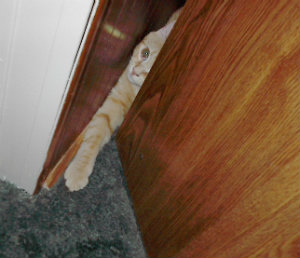 whose loving nature instantly melts the most cranky of individuals. Cisco is constantly licking Riley and watches over him like a papa lion. And Riley adores Cisco in return, often running up to him, turning upside down and begging him to play.
whose loving nature instantly melts the most cranky of individuals. Cisco is constantly licking Riley and watches over him like a papa lion. And Riley adores Cisco in return, often running up to him, turning upside down and begging him to play.
Holly is Riley’s sister, a grayish Tortoiseshell more popularly known as a “Dilute Tortie.” Both kittens are usually out of control when they’re not sleeping. Riley plays so hard that he will close his eyes and fall asleep anywhere, in any position. But awake, both Riley and Holly are feline maniacs. They tear through the house at breakneck speeds, and ya better get outta their way.
Their cat sense is phenomenal. If anyone, anywhere in the house is giving out something to eat, the kittens are there. And they are fast. For example, before Sparky can move his head down to the floor to lap up a cat treat or tender morsel of people food, Riley or Holly will sweep in and whisk away the delicacy in a blinding flash.
And with the kittens, there’s always a surprise. An example occurred this morning when the two siblings were found in the foyer, gleefully pawing out scoops of dirt from flowerpot-like plastic containers once holding pet grass and a catnip plant, and sprinkling it out all over the floor. I don’t remember our 2-year-old children getting into as much trouble. #
Coping With The End (6/25/13)
Yesterday, my wife and I drove to the local VA hospital here to see my friend Richie. He is in one of their ICU rooms where they will begin prepping him for chemo treatment today. The ordeal will take three days, at which time, if he is strong enough, he will return home to recuperate for three more weeks until returning for his next three-day chemo treatment. If he manages to survive this grueling 72-hour period of torture, Richard will begin radiation treatment.
Richie’s outlook is not so good. He has a tumor is his right lung, and a small-cell cancer in the left, and there is evidence of cancer having spread to the spinal area. Normally, the right-lung tumor would be a candidate for surgery, but the left lung’s small-cell cancer prevents this. Any attempt at surgery would result in immediate spreading of the small-cell cancer to other parts of the body.
Rich is not in the best of shape. In addition to epilepsy, he has had a heart attack and undergone triple bypass surgery. He had just gotten over pneumonia and lost a lot of weight, which has  left him in a weakened state. He was advised by his doctors not to undergo chemotherapy, which in itself could kill him, and just go home and try to be as comfortable as possible. But Rich, who served in the Army in Korea, has been a fighter all his life and isn’t about to give up now.
left him in a weakened state. He was advised by his doctors not to undergo chemotherapy, which in itself could kill him, and just go home and try to be as comfortable as possible. But Rich, who served in the Army in Korea, has been a fighter all his life and isn’t about to give up now.
As painful as it is to actually have cancer, there is certainly no dearth of pain for those related or close to the afflicted one. Richard’s three sons, Michael, Billy and Brian, will hold vigil at his bedside for the next three days. It will be very difficult for each of them, but they are resolved to hang in there and offer their strength and support to their father.
I remember back in the 1970s when my dad was first admitted to the hospital for an enlarged prostate. He was a young, vibrant man of 59 who no longer drank alcohol or smoked cigarettes. To all outward appearances, he was the picture of perfect health.
The surgery was to be a simple affair. Get in – snip, snip – and get out. Instead, doctors discovered a malignancy and mere hours after going in through the penis, reentered through the abdomen. It almost killed Dad right then.
After that, it was five years in and out of hospitals. Just when I thought he was going to be fine, off he’d go, back into the hospital for more tests and surgeries. Toward the end, Dad’s internal pain began to show outwardly. When he finally succumbed to the cancer that had by then spread throughout his body, my pain began.
The year was 1976 and the phone call came into the office late in the day. It was one of my dad’s old, hard-bitten newspaper cronies who knew me when I was a pup.
“Yeah, he finally did it. He’s gone,” the raspy voice said.
“Wait,” I said back into the phone. “Who is this? What –”
The reporter identified himself, and then went on. “Your dad. He’s gone. He died about….” Dad’s friend continued to speak, but I could no longer hear him. For me, the pain felt as if it were ripping through my heart. My dad was gone…forever. I would no longer see that friendly, smiling face; no longer hear his jokes, his puns, or his infectious laughter.
There is no do-over, no retry. Death, simply, is final. For those left behind, the pain can be unbearable. It was years before I could say I was over it. And probably more years after that before I really was.
Brian, Richie’s youngest boy who is now in his 40s, seems to be taking it the hardest. However, I haven’t seen Rich’s middle son, Billy, lately. And it’s difficult to assess what a person is feeling in his gut. All three boys are devoted to their dad, and it will be oh so hard on them when Richard finally does go.
What can I say to them to try and ease the pain? What words of wisdom can I, or anyone, impart to assuage their grief? Unfortunately, there are no magic words to stop the pain. It's all part of the grieving process. Cliche notwithstanding, only time can heal. #
Smoke Screen (6/18/13)
I haven’t smoked a cigarette since 1985. That’s 28 years without subjecting my body, or those around me, to a known carcinogen. Prior to that, I smoked close to three packs a day for years. I was 11 when I put a cigarette in my mouth for the first time. It was 1950 and I remember the experience quite well. I had gone into the woods with another boy around my age with a pack of Viceroys. One of us, I’m not sure who, had swiped the pack from a corner candy store. In those days, tobacco products were not kept under lock and key as they are today, and were left out in the open in convenient display.
The motivation behind this initial experiment with smoking had nothing to do with a desire to smoke. It was obviously all about doing something grownups do. That, and the lure and excitement of the forbidden.
My mother never smoked, and I don’t remember my dad doing it, though I know he did. In 1950, we began living with a stepfather, Arthur, who smoked more than two packs of unfiltered Chesterfields every day. Later on, h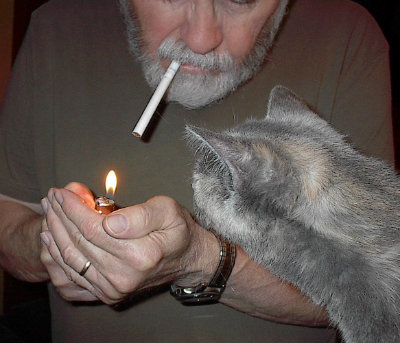 e switched to Raleigh cigarettes because of the coupons. I used to kid him that after smoking many years and accumulating a considerable number of coupons, he’d be able to afford a nice iron lung.
e switched to Raleigh cigarettes because of the coupons. I used to kid him that after smoking many years and accumulating a considerable number of coupons, he’d be able to afford a nice iron lung.
Arthur wound up years later with severe emphysema and a huge hole in his throat. He never did get the iron lung.
By the time I had reached 16, there was hardly a moment when I didn’t have a cigarette hanging from my lips. I never inhaled much. Oh, I’d draw it in and blow the smoke out through my nose to give the appearance of inhaling. But most of the time I didn’t really inhale. It was definitely an oral compulsion, and a desire to appear older than my years. After all, I was baby-faced and thus had to endure the embarrassment of being carded until I was nearly 30 years old.
I smoked everywhere for years, and it was pretty much acceptable. I mean, when I was growing up, and even into my 20s and 30s, nearly everyone smoked. In the Navy, when I served aboard a destroyer, when we got out to sea past the three-mile continental limit, they would open the ship’s store and you could purchase a carton of Lucky Strike, or Camels or Chesterfield regulars for 85 cents. If you preferred the longer Pall Malls, a carton would set you back a whole dollar. Back in the day, very few cigarettes had filters. There were the aforementioned Viceroys, Parliaments, and I think Benson and Hedges, but I don’t remember many others.
Seriously. Almost everybody smoked. If you watched a movie, the actors were always lighting up. Even the Red Cross would give out small packs of free Old Gold cigarettes to servicemen who were in the hospital.
When I worked as a young associate editor at Fawcett Publications’ TRUE Magazine in the 1960s, I used to play on the company softball team. We played other publishing companies, ad agencies, etc. We usually played on one of several baseball diamonds in Central Park. And I smoked even when I was out playing second base. I distinctly remember doing so when we were playing a team from Newsweek. The field happened to be a cement one in the shadow of the UN. I had assumed my usual position between second and first, a cigarette dangling from my lips, when a thunderous roar bellowed from TRUE’s editor in chief, Doug Kennedy: “Get that friggin’ cigarette outta your mouth!” I immediately dropped the butt to the cement and ground it out with my shoe, praying I wouldn’t get fired.
As the years passed and the medical community made everyone more and more aware of the dangers of smoking, fewer people smoked. Laws changed and one could no longer smoke whenever and wherever he chose.
In 1985, my life changed drastically. A routine physical revealed that I had type II diabetes, as well as diminished lung capacity.
“You have the beginnings of emphysema,” the doctor said.
“What do I have to do?” I responded.
“You figure it out,” he said. And I did. I walked out of that doctor’s office and never smoked another cigarette, excluding my brief encounter with marijuana.
Not that it was so easy going cold turkey. At first I replaced the cigarettes with toothpicks, which I chewed on. But after driving splinters into my gums, I gave that up and started chewing on pencils – coming close to winding up with lead poisoning. Finally, I started chewing sugarless gum and, despite my dislike of that exercise, it worked. Many years later, I stopped chewing the gum, realizing I didn’t really need it anymore.
My current wife, Josephine, used to smoke two packs of filter cigarettes a day. After many attempts at quitting, using everything from nicotine gum to nicotine patches, I finally shelled out $300 for a laser treatment “guaranteed to stop you from smoking forever.”
It was difficult, but she appeared to have finally overcome the addiction. Then, one evening when we were living in Las Vegas, I came home from work to find a note that she was taking a break at one of the many local neighborhood casinos. I decided to join her.
I walked through the casino looking for her among the endless rows of video poker machines. And eventually I found her, sitting in front of a gleaming poker machine gleefully poking buttons with her right hand as she watched the reels fall into place. Her left arm was outstretched, the wisp of smoke curling upward from the small white object in her fingers.
I couldn’t believe my eyes. “What is that?” I blurted out, nodding toward the burning cigarette.
There was an audible gasp as Jo turned around to face me.
“It’s not what it looks like,” she said. Yes, she really did say that.
Later, at home, she spoke fast, explaining that she wasn’t smoking; she was “puffing.”
“What?”
“I count my puffs. I limit my puffs. I puff only when I absolutely need to.”
The upshot is that Jo does indeed count her puffs and does so infrequently, reducing her daily cigarette consumption from two packs to about 10 cigarettes.
I can’t argue with that. #
Memories of Dad (6/11/13)
One of my earliest recollections of being with my father was in the cab of a steam engine, and my pulling the cord that blew the train’s whistle. It had been a once-in-a-lifetime opportunity, although I hadn’t known that at the time.
I believe Dad’s earliest job out of college had been as a reporter and later editor and rewrite man for the old Brooklyn Eagle, but his affable ways and absolutely charming charisma had eventually earned him a position as public relations director for the Long Island Rail Road (LIRR). As such, he was able to bring me aboard a living, breathing, steam-belching locomotive.
It was during the 1940s when the LIRR’s commuter trains were still being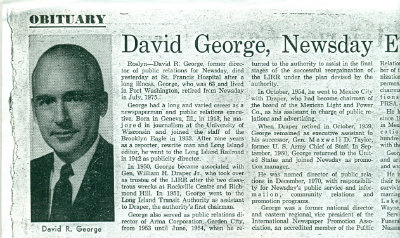 hauled by these steam-and-steel monsters. It was a day I obviously would never forget, with the locomotive pulling into a “roundhouse,” a building used by railroads for servicing locomotives and turning them around on large turntables.
hauled by these steam-and-steel monsters. It was a day I obviously would never forget, with the locomotive pulling into a “roundhouse,” a building used by railroads for servicing locomotives and turning them around on large turntables.
The defining feature of the traditional roundhouse was the turntable, which facilitates access when the building is used for repair facilities or for storage of steam engines. Early steam locomotives normally traveled forward only. Although reverse capabilities were soon built into locomotive mechanisms, the controls were normally optimized for forward travel, and the locomotives often could not operate as well in reverse. A turntable allowed a locomotive or other rolling stock to be turned around for the return journey.
That day will live on in my head and heart forever. I’ve marked it as one of my top five “best days.” Not so surprisingly enough, another best-days winner also involved both my dad and trains. It was the early ’60s and I had reached my 20s by then. I was married with a son of my own when my 90-year-old paternal grandmother passed away. When I found out Dad, who had remarried after my parents’ divorce, was going to take an overnight train to Chicago and then drive to Geneva, Illinois, for the funeral, I insisted I go with him. “I’ll pay my way,” I recall saying.
I had no money, of course, making less than a hundred dollars a week in my early editorial job. I had gone straight to Household Finance and borrowed  enough to pay for my ticket. It would take a long time to pay it back with interest, but sharing a two-berth roomette aboard the Broadway Limited with my dad was something very special, and priceless.
enough to pay for my ticket. It would take a long time to pay it back with interest, but sharing a two-berth roomette aboard the Broadway Limited with my dad was something very special, and priceless.
There were several other times when I was younger and my parents were still together, when I would travel with Dad to visit Aunt Louise and Uncle Lloyd in Washington, D.C., aboard a New Haven train. Despite the trip taking only about four hours, it was special in that there were always free crayons and coloring book with pictures of trains. And being with my dad, of course.
Ironically, trains almost took Dad’s life back in 1950. It happened in Richmond Hill, New York, just outside the Jamaica station. It was around 6:30 in the evening on November 22 when an onrushing commuter train plunged down the middle of another train's last car – cutting it in half lengthwise as if sliced by a giant cleaver and driving it 15 feet into the air. The head of the moving train stopped just yards short of where my father had been sitting, his camel’s hair coat covered in blood from the deceased passenger sitting next to him. Many passengers were killed that day, but thankfully Dad survived to write an account of the worst train crash in LIRR history for New York’s Daily News. Needless to say, he later endured a PR nightmare for many months to come.
I think back now to Dad mowing the large front lawn of our Old Westbury, Long Island home – with a push mower, no less – and he didn’t mind when my sister Barbara and I would take the grass cuttings and form a “fort.”
All told, I didn’t see much of my dad when he was alive. He seemed to always be working. But he was a joy when he was home, playing old standards on our upright piano, or getting excited when he would “tuck us in” at night and promise a grand breakfast of bacon and eggs and pancakes.
Dad succumbed to cancer at the young age of 63, but the moments I did have with him when he was alive were precious.
Happy Father's Day, Dad. #
The World Beyond (6/4/13)
I guess you could say I stopped being a skeptic and became a possible believer shortly after my mother died in 2003. At a point not quite midway through the writing of Stardust Dads, July 21, 2003, to be exact, my mother passed away. In my grief, partly as a tribute, partly as a catharsis, I wrote her in as one of the characters, as Danny Wallace’s mother, who dies and goes to “Midway Manor.”
Later, I experienced an incredibly vivid dream in which my mother appeared, announcing she had returned. In the dream, her astonishingly bright blue eyes sparkled as she stood no more than a few feet in front of me and announced, “I’m back!” The surroundings were unmistakably real. It appeared that we were 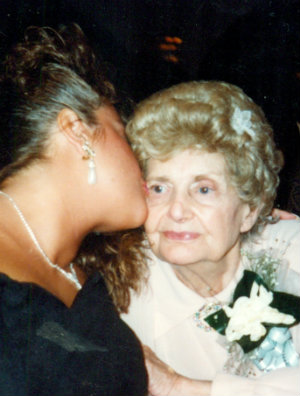 in the lobby of downtown Las Vegas’ Plaza Hotel and Casino, once known as the Union Plaza before the trains stopped running into Vegas. It had always been her casino of choice when she visited Las Vegas, which was automatic every time she flew from the East Coast to the West Coast to see her sister.
in the lobby of downtown Las Vegas’ Plaza Hotel and Casino, once known as the Union Plaza before the trains stopped running into Vegas. It had always been her casino of choice when she visited Las Vegas, which was automatic every time she flew from the East Coast to the West Coast to see her sister.
At first I was frightened by the dream. It was so real. My mother seemed so real, and I guess I wasn’t quite ready for her return. But in time I decided it may have simply been her way of letting me know she was still with me and that the book was a fine idea.
People talk about their experiences with the paranormal and contact with loved ones who have passed on. Sometimes they say the contact took place in the form of a dream. Others claim they were wide awake when they experienced the presence of someone who had passed on.
Before my dream, I would dismiss the claims of contact with the so-called spirit world by others as simply dreams, fantasies or just outright fairytales. But not anymore. As I wrote last week, I can’t state with any firm conviction that I believe there’s a hereafter. But I also can’t swear there isn’t one. And it’s become increasingly difficult to refute some of the accounts of others who have claimed they’ve been in touch with someone who passed on.
There are the many documented incidents of John Edward, and most recently, the stunning yet believable accounts of neurosurgeon Dr. Eben Alexander who, while in a coma, claimed he experienced a journey to the afterlife. He even claims that Heaven is real.
And of course there are the many naysayers, the career skeptics who point out the various flaws in the theory of a paranormal world. I remember as a young boy how my stepfather would tell me about the famous magician, Houdini, and how he vowed that when he died, he would make every effort to “come back.”
So far, there’s been no sign of him.
My wife Josephine, who had the inspiration for the novel we wrote together, has had more than her share of contact with the “other side.” The spark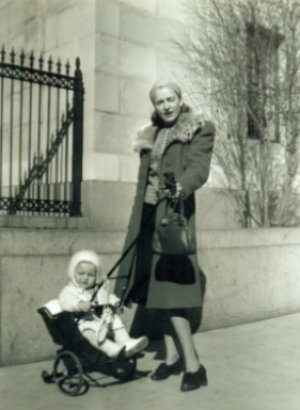 for Stardust Dads, in fact, was one of her connections with her dad, which is detailed in the “Story Behind the Story,” found elsewhere on this website.
for Stardust Dads, in fact, was one of her connections with her dad, which is detailed in the “Story Behind the Story,” found elsewhere on this website.
Back in the mid- to late ’70s, Jo felt that she had not grieved “properly” for her late father. She still harbored feelings of abandonment, fear, anger and guilt that remained unresolved for years.
At one point, Jo became aware of a psychic development class that would hold a séance in the latter weeks of the program. As Jo recalled:
“I really was terrified by the thought that Dad’s feelings toward me had changed, but I volunteered to sit with the group in the hopes of making contact. ‘Is anybody out there?’ the medium had said, and my hands quivered. My fingertips were barely touching the table, but it vibrated twice with a strong, swift motion.
“The psychic responded in her ‘sleeping’ state: ‘It’s a man…but he’s not speaking. There is an older woman with him…she’s asking for Jeanie.’ That’s when I remembered how my paternal grandmother had always called me by that name. The psychic repeated the question. ‘Who’s there?’
“Suddenly, a late-arriving member of the group walked into the room where the séance was being held. I was startled by the footsteps on the hardwood floor behind me and I screamed, which of course broke the psychic’s trance. We tried to make contact again, but…nothing. I went home feeling frightened and disappointed. And I stayed awake all night.
“The phone rang early the following morning. It was my mother, and she was crying. I hadn’t told her anything about the psychic class I’d been attending, especially the séance. When I asked her what was wrong, she replied, still crying, ‘Daddy came to me last night in a dream. You’re probably thinking I’m crazy, but I’m not. This was more than a dream; it was real! I had been sound asleep when I heard him calling for me.
“‘He told me to get up and get dressed, that we’d go out for a while. And I did. We went out just like we used to do, browsing around in different stores. We even stopped at a church. It was all so strange, as if time were standing still, but we were together for quite a while. Then, when Daddy brought me back to the house, he refused to come inside. I wanted you and your brother to see for yourselves that Daddy was back, but he insisted it was time to leave…and that was it. I don’t understand why this happened to me. And why didn’t he stay?’
“Shocked and elated at the same time, I assured Mom that I believed her experience was real enough, but that I needed to make a quick phone call to the psychic before I could explain it all.
“Repeating Mom’s dream account to the psychic, she confirmed that some contacts were made through dreams. She also cautioned that it wouldn’t have been a good omen if Dad had gone into the house when he was preparing to leave. Remaining outside meant his contact was only for a visit.
“I called Mom back and we both had a good cry as I explained what I had done the evening before. It was a chilling experience.”
One thing is certain. If there is a hereafter, we’ll all find out about it eventually. #
End of the Road (5/28/13)
Josephine wasn’t feeling so well the other day, coughing every two minutes and complaining of a sore throat. I touched the back of my hand to her forehead and cheeks, realizing she had a slightly warmer body temp than usual. She wasn’t “burning up,” as they say, but her body was probably fighting something.
The next day, while enjoying our morning coffee, Jo said to me, “You know, if I had passed away during the night, you wouldn’t have the slightest idea where anything was, what and where I recently filed anything. In your grief, you’d be totally lost.”
“If your life were suddenly over,” I replied, “mine would be over too.”
“That’s sweet, but not realistic. You’d have to go on living, and things would be a real mess. We haven’t got anything organized.”
“Well, that’s partially true,” I responded, “but these kinds of things take time.”
“Yeah, well you’d probably have me dumped into an urn and placed on a 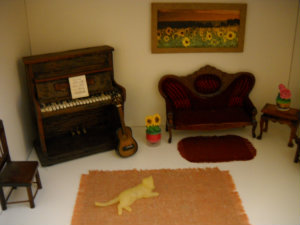 bookcase in your den simply because I wasn’t here to see you do it.”
bookcase in your den simply because I wasn’t here to see you do it.”
“I know you don’t want to be cremated because of your fear of fire.”
She nodded confirmation.
“But you also don’t like the idea of being put into the ground and your body prey for worms.”
Again, Josephine silently agreed.
“And you wonder why I get frustrated. I mean, what does that leave? We could hardly afford a mausoleum.”
Jo smiled and her face lit up.
“Look,” I said, “we each definitely need to make out a will, but as far as choices are concerned for what happens to our bodies, there are limits. You’ve got your casket and you’ve got your cremation, and that’s it. For me, and you already know this, I won’t have any further use of my body after I die, so cremation’s the best way to go. It’s cheaper, for sure. No fuss, no muss. You can scatter my ashes in the woods around our house.”
“What about your books and comics, your baseball cards? I can’t bury you with all of them.”
“I just told you –”
“I know, I know, you wanna be cremated.”
“Anyway, that’s what the wills are for. What to do with one’s…stuff. Remember what George Carlin said? ‘The only reason people need a house or an apartment is to have a place where they can store their shit.’ And we both have plenty of that.”
Jo smiled, and then got serious. “What about where we go after all that? I mean, after burial or cremation, we still have our spirits, our souls. I know you believe that.”
“I’m not sure I can say without any doubt that I firmly believe in the Hereafter. I think there’s a good chance that our essences, our souls continue on. But there’s also a good chance that when we die, that’s it.”
Jo stood up, obviously not happy with my last comment. Hands on her hips, she challenged me. “We wrote a book together with at least half of it taking place in the so-called Hereafter, remember?”
“So? Stardust Dads is a novel. Fiction. We made it up.”
“Yes,” Jo said, “but don’t tell me you didn’t believe in Midway Manor when we were writing about it.”
“Okay, I’ll give you that. It’s the only way I can write fiction, to put myself in the scene. When I was writing about the dads, or reading what you wrote about them, about Mickey and his guitar, and Lloyd playing that wonderful piano at Midway Manor, I was there with them and everything looked and sounded very much real. But that doesn’t mean I believe in the Hereafter.”
Jo was silent for a few minutes, obviously thinking about what I had just said. “You know,” she said calmly, “you’re gonna feel a little foolish after you pass on and later find yourself standing in the great Renaissance Room at Midway Manor. What will you have to say then?”
I thought back to when we were writing the book, remembering the great meals our characters enjoyed. My answer was academic.
“When do we eat?” #
Out of Nowhere (5/21/13)
I guess it’s reasonable to expect a number of adverse events happening in one’s lifetime. I mean, we’ve all read how so many accidents happen in the home or close to home, and we can, for the most part, prepare for many of these by being proactive and doing things that can prevent them from occurring in the first place.
But not this one. Not really.
Now, many of you have read this blog before, and those who have are aware of the two kittens we helped to rescue about 40 days ago. After local college student and veterinarian-aspiring Riina stopped the shelter from putting Riley and Holly down by paying for all of their shots and their eventual spaying/neutering, we happily adopted the two. It was love at first sight as our three adult cats welcomed them into our home with, uh, open paws.
And as everyone knows, kittens and mischief go hand in hand. Their presence here has not been without its incidents. Riley seems to have a penchant for squirming behind the flat screen and wriggling around in the
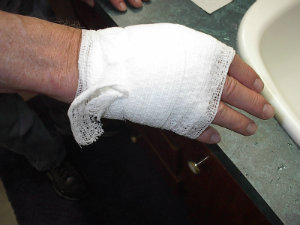
wiring, eventually blacking out the TV and disconnecting the phone.
Both Holly and Riley love the bookcases in my den, of which there are eleven. On a number of occasions they have knocked out a dozen or so books from the bottom shelves. But what is more surprising is the books they’ve managed to dislodge from the upper shelves of several of the bookcases. How they do it still baffles me.
The two kittens have already knocked over – and broken – more than one lamp. The other evening, I brought in a pie tin filled with dry cat food that we leave out on the deck for visiting strays during the day. If it’s only partially consumed, I bring it in for the night so the raccoons don’t get to it. I put it in the laundry room on top of an open, two-shelf cabinet. We didn’t think the kittens would be able to reach that high, and we were right. But what we failed to realize is that the kittens would bust their whiskers to try.
Their attempt involved a quick jump to the washing machine and dryer, and then a brave leap upward, coming down on a box of vacuum cleaner parts that spewed its contents all over the laundry-room floor.
All of this notwithstanding, this installment is not focused on the laughable hijinks of the two feline tykes. This chapter is primarily concerned with what took place this past Friday evening. Following an early dinner, Jo and I sat down to watch the nearly three-hour Quentin Tarantino film, Django Unchained.
Midway through the movie, as I sat in my chair fully focused on the action on the flat screen, suddenly, the blur of a kitten seemingly dropped down out of nowhere into my lap, claws digging into my left arm and right hand. I immediately screamed out at the searing pain in the top of my right hand as it was punctured. I pushed the ball of fur away from me onto the floor, realizing it was one of the kittens but unsure which one.
the top of my right hand as it was punctured. I pushed the ball of fur away from me onto the floor, realizing it was one of the kittens but unsure which one.
I dazedly concluded that there were at least half a dozen deep scratches on my left arm, which by then was bleeding profusely. I had immediately grabbed my right hand with my left, at first afraid to look at the damage.
By now Jo had left her chair and was yelling, “Lemme see, lemme see,” trying to peer under my covering left hand. I pulled my hand away and was stunned as I watched the back of my right hand swell up like a blowfish. I jumped up and headed for the bathroom, still verbalizing the pain. At that point Jo saw my badly swollen right hand, which now looked like a small balloon, and decided a vein had been punctured and blood was pooling under the skin.
“What should we do? What should we do?” she yelled as I thrust my hand under a full blast of cold water. “I dunno,” I managed to shout back.
“Oh my God! Is it filling up with blood? It’s gonna explode!” Jo was by now hysterical. “I’m calling nine-one-one!” She ran off to make the call while I kept my hand under the ice-cold stream of water. Despite never experiencing anything like this before, my reasoning told me it wasn’t blood blowing up my hand. Just instant swelling from the sudden puncture.
My mind went back to the winter of 2010 and how I had slipped on some hidden ice under the snow in my driveway and broken my ankle in two places. The whole ankle had swelled up and instantly turned purple. This must be basically the same thing, I reasoned. Still, I was pretty scared.
The wound was quite small relative to the size of the swelling. Jo came back into the bathroom and explained she had the 911 operator on the line. “They’re on their way,” Jo said. “She says to try and stay calm. They’ll be here very soon.” By now, my hand was numb, no doubt due to both the injury and the cold water.
On Jo’s urging, I carefully patted my bloated hand dry and walked back into the 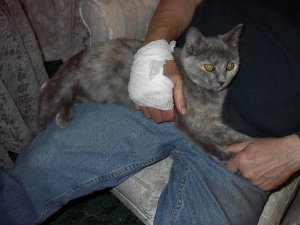 living room, sitting down on the sofa. A few minutes later, we heard the steady, repetitive beeping of the ambulance as it backed into our driveway. The two paramedics moved quickly down the gravel walkway and into the house. The woman member of the team padded around to the front of the sofa, leaned over and looked closely at my blowfish hand, shining a small flashlight on it. “Yeah, that’s pretty swollen, all right,” she said. “Can you move your fingers?”
living room, sitting down on the sofa. A few minutes later, we heard the steady, repetitive beeping of the ambulance as it backed into our driveway. The two paramedics moved quickly down the gravel walkway and into the house. The woman member of the team padded around to the front of the sofa, leaned over and looked closely at my blowfish hand, shining a small flashlight on it. “Yeah, that’s pretty swollen, all right,” she said. “Can you move your fingers?”
I wiggled the digits of both hands.
“How does that feel? Is there pain?” she asked.
“Not so much now,” I said. “The hand just feels very stiff. I had a lot of pain when it first happened. But actually, the scratches on my left arm hurt more right now.”
The woman had told us her name but neither of us retained it. She crouched over me and started applying iodine to the wound, and to the scratches on my left arm. “I’m going to wrap your hand up and give you an ice pack,” she said as she wound the bandage around my hand. “I want you to apply the ice pack to the back of your hand, keeping it on the bandage. You don’t want it touching your skin. Do it for twenty minutes; twenty minutes on, twenty off. And if you have some Advil or Tylenol, I’d take that as soon as possible.” She looked at Jo then, and then back at me. “You’re gonna have quite a bruise in the morning.”
She stood up and stretched her back. “I want you to look out for anything unusual such as a red line moving up your arm. Call nine-one-one again if you experience anything like that, or if you have a lot of pain. Her teammate handed her a form from which she read off a few more questions, including the confirmation of my name and age. She asked me to sign the paper in her hand, which she said basically indicates that I refused to go to the hospital. She nodded when I asked her if Jo could sign for me.
It wasn’t long after that point that they left. I spent the rest of the evening with the cold pack twenty minutes on, twenty minutes off. The make-believe violence on the screen seemed mild compared to what I had just experienced.
Once again, just another eventful evening in Mills River. #
Ticks and Spiders (5/14/13)
We got a call this morning from Lena, my wife Josephine’s Swedish daughter-in-law who is married to Jo’s middle son, Bill. She was breathless as she hurriedly explained how a tick had managed to burrow into her right arm, and she had no idea how it got there. Lena said she remembered reading somewhere that if you try to pull a tick out too quickly, you risk leaving the arachnid’s head lodged under the skin and a possible infection. She went on to explain that she poured nail polish remover on the tick, thinking that might dislodge the uninvited guest. In doing so, she managed to spill the liquid all over the kitchen.
“Do you have a doctor, someone you usually go to when there’s a problem?” Jo asked, trying to be helpful.
“I do, but I can’t remember his name or number.” She spoke rapidly, telling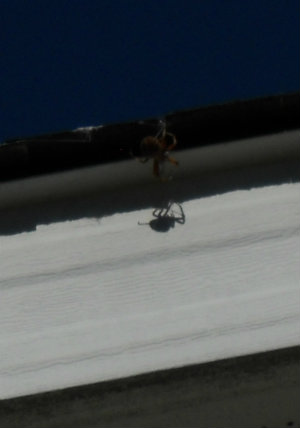 Jo how she tried to reach Billy, but his answering message was on. “He’s doing a roofing job today. I even called my neighbor friend, but she wasn’t home. I was hoping you’d be able to get it out for me.”
Jo how she tried to reach Billy, but his answering message was on. “He’s doing a roofing job today. I even called my neighbor friend, but she wasn’t home. I was hoping you’d be able to get it out for me.”
“Well, can you get out here now?” Jo said, trying to calm Lena down. “I can take care of it for you. I just removed an engorged deer tick yesterday from a stray cat that shows up regularly on our deck.”
Lena pulled up twenty minutes later, red-faced and excited. Jo sat her down on a wheeled bench by the front door, pulled up a stool and slowly, carefully lifted the tick up and out with a pair of tweezers. She dropped the bug into a Styrofoam cup in which she had squirted a bit of dish detergent.
I came out then, after having showered and dressed, and took the cup from Jo.
“Soap won’t kill it,” I admonished her. I had googled ticks the other day when she removed the deer tick from the cat. The literature suggested placing the arachnid into alcohol, which should kill it within ten minutes. It advised against just tossing it into the toilet while it was still alive.
I took the cup of tick into the bathroom and examined it under a magnifying glass. It was very much alive, wiggling its eight legs as it tried to make its way out of the detergent. I got another plastic cup and poured some rubbing alcohol into it. I transferred the tick into the alcohol. When I checked it a few minutes later, it was no longer moving. I let it sit another few minutes in the alcohol before finally shaking it into the toilet and flushing.
The experience brought me back to the 1950s and my Uncle Lloyd, whom I’ve written about here extensively. Lloyd had served with the OSS during WW II, and had helped to form the CIA following war’s end. I had spent the better part of a year living with Uncle Lloyd and Aunt Louise in Washington, D.C.’s Georgetown, and he had taken me on a number of forays into the surrounding countryside of nearby Virginia.
Upon returning from these day trips, which usually involved fishing in a secluded pond, or romping around on the wooded property of one of Lloyd’s FBI friends, Lloyd would have me strip down and he would go over my entire body, examining me very carefully for ticks. Despite Aunt Louise’s loud protests, Uncle Lloyd would conduct these exams with a lighted cigarette. When he found a tick embedded in my skin, and he almost always did, he would hold the lighted butt close enough to affect the offending tick, but not so it would burn me. The arachnid would start wiggling from the heat and that’s when Lloyd would use his tweezers to remove the tick.
The conversations that would ensue following this routine may have included the words “Lyme disease” and “Rocky Mountain spotted fever,” but as a 12-year-old boy, I didn’t pay much attention.
Uncle Lloyd, who passed away in 1975 at age 74, also taught me how to face my fears. One of the things I dreaded most, and still do, was spiders.
“Butch,” he would say to me (they both called me “Butch” for reasons I never did learn), “you’ve got to face your fears. Go out and track down some spiders and put them in jars. Study them, watch them. You’ll lose that fear after awhile.”
I never did. But I did do what he suggested, first in Georgetown, and then back in Queens, New York, when I had to go back and live with my mother and stepfather. I would check out empty lots where there might be some pieces of metal or wood lying about. Invariably, when I would lift up one of these strips of debris, I would find all sorts of spiders and bugs. Black widows were plentiful. I would scoop them into a jar and bring them home, keeping them in my room where I would study them. And the poisonous spiders would go into a biting frenzy, killing each other off.
I remember a science teacher in school insisting there were no black widows in New York, despite my telling him of my creepy collection. To prove him wrong, I brought the jar with the lone surviving black widow into school. The science teacher nearly lost it, sputtering that I was right and to please take it down to the lab. They of course killed the spider, but preserved it in a block of plastic or something, which they passed around the class. When I think back to the incident, and what I had done, my skin starts to crawl. If my mother had been aware of my actions at the time, I might have been put back in that boarding home I wrote about awhile back. #
Baseball Cards, Comic Books, and Mom (5/7/13)
The best thing about childhood is not having to be an adult. No worries about income taxes, mortgage payments, job performances or “meaningful” relationships. Just be yourself, enjoy life for the moment, and let imagination be your guide. If it’s fun, it’s good. ’Nuff said.
Not that being a child isn’t without its stressful moments. There’s peer pressure, school stress, and skin rebellion, to name a few.
One of the more pleasant memories of childhood was the collecting of baseball cards. Uniquely American as baseball itself, the 1950s could be heralded as the “Golden Age” of card collecting: as simple and uncluttered as life then and the cards themselves.
baseball cards. Uniquely American as baseball itself, the 1950s could be heralded as the “Golden Age” of card collecting: as simple and uncluttered as life then and the cards themselves.
For a mere nickel, one could purchase a pack of cards with photos and statistics of the baseball heroes of that time, and also get a “slab” of bubble gum to boot.
We would pore through the cards, muttering “Got it, got it, don’t got it, got it,” trading on the spot for needed players, or “going to the wall” in fierce competition with other young card-tossers.
There were two ways to compete: tossing against the wall of a building in which the card nearest to the wall wins all. If you tossed last and “topped” the other winning card, you won. A “leaner,” a card that winds up leaning against the wall, always won – unless, of course, another card topped it.
There was also flipping: one player would flip or drop a predetermined number of cards on the sidewalk, and the other player had to match him. In other words, if you flipped 10 cards and five were “heads” and five “tails” (the statistical back side of the card), the other player had to also flip five heads and five tails to win; if he flipped any other combination, you won.
Comic books were an even bigger joy. They were as collectible as cards, but there was much more to read and savor. We couldn’t flip or toss them, though we occasionally traded.
Today, the grownups have taken over and, in the opinion of many, sullied what essentially belongs to 12-year-old boys. Now, when a pack of cards (currently $2 to $3) or a comic book is purchased, one immediately opens up a price guide, or go es online to see how much it’s worth.
es online to see how much it’s worth.
The fun has been watered down with fractured values forced upon us by dollar-hungry opportunists who’ve forgotten what it means to be 12 years old. However, at the same time, in this era of advanced electronic entertainment in the form of the Internet and movies summoned at the touch of a button, the greed factor has probably helped to keep cards and comics from becoming extinct.
One person who understood what it meant to be 12 years old was Mom. She was there with all her patience and wisdom, providing love and affection, good solid meals, first aid when needed, sage advice based on years of experience, and a careful understanding and tolerance of the boyhood love for collecting things: frogs, snakes – well, maybe not snakes – lightning bugs, marbles, toy soldiers, tobacco tins, bottle caps, and – most important of all – baseball cards and comics.
It was Mom, after all, who gave up her bookcases so that comic books could be stacked neatly within. It was Mom who gingerly dusted around the stacks of card-filled cigar boxes, careful not to jostle the contents.
And, to her credit, Mom was careful not to become a cliché: a mother who threw out her son’s comics and baseball cards. Mom instinctively knew what it meant to “have the right” to be a 12-year-old.
It was, and still is, what made my mother so special. Mom passed away at 6:10 p.m., July 21, 2003. Had she lived a few more weeks, she would have celebrated her 94th birthday. I like to think that today she is in a place where she can smell and enjoy the flowers that were so special to her.
Happy Mother’s Day, Mom! #
Mills River Kittens Revisited (4/30/13)
As I begin to write this, it’s been exactly 19 days since Holly and Riley showed up at our house for good. They’d been fixed, had all their shots, and were now four months old and ready to greet the world, one whisker at a time.
Waiting for them, although not having any idea they were coming, were 10-year-old Cali, 11-year-old Sparky, and Cisco, our 7-year-old Bengal. We weren’t concerned about Sparky, an inquisitive, friendly, gentle tabby with a primary streak of Maine Coon. He loves everybody, human or feline or squirrel. We had reservations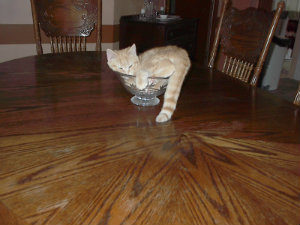 about Cali, our long-haired lap-cat Calico, who prefers keeping to herself. But if no one bothers her, she won’t bother anybody. Cisco, however, we figured might take some time to adapt to the diminutive house guests.
about Cali, our long-haired lap-cat Calico, who prefers keeping to herself. But if no one bothers her, she won’t bother anybody. Cisco, however, we figured might take some time to adapt to the diminutive house guests.
Well, we were right about Sparky. He follows the kittens everywhere, smelling their butts at every opportunity and generally keeping tabs on them. Cali, again as predicted, hangs back, watching from a distance. But Cisco is a whole ’nother story.
We never would have guessed that Cisco would turn out to play the benevolent, parental role. But with Holly and Riley, he has become just that: a doting, watchful, concerned parent.
We try to keep the kittens on a healthy feeding schedule, providing them with half a can each of name-brand wet kitten food twice a day, with kitten-focused Iams dry food available on demand. With our adult cats, we also try to be health-conscious, but we do provide them with “treats” on a regular basis.
Earlier today, when we thought the kittens were sleeping, something all cats and kittens do a lot of, we provided Cisco with a handful of treats tossed gently into a little pile on the kitchen floor. From out of nowhere came Riley, zeroing in on the mouth-watering tidbits and sucking them up like a feline vacuum cleaner.
Cisco appeared to do a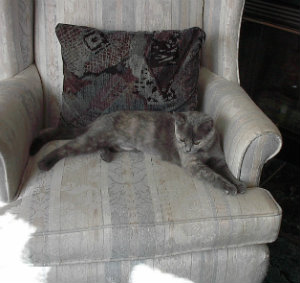 double-take at first, not expecting to share his special snack with anyone. He hung back, watching approvingly as Riley scoffed up the treats. Slowly, deliberately, Cisco slipped a paw into the rapidly diminishing pile and pulled away a few tasty morsels in his own direction.
double-take at first, not expecting to share his special snack with anyone. He hung back, watching approvingly as Riley scoffed up the treats. Slowly, deliberately, Cisco slipped a paw into the rapidly diminishing pile and pulled away a few tasty morsels in his own direction.
Which is just wonderful because our plan could not be working more perfectly. The raison d’etat for adopting the two little tykes was to have someone for Cisco to play with so he wouldn’t be constantly following Josephine around and pestering her for attention. Not that Cisco ignores Jo; far from it. But it has freed her to pursue other endeavors.
However, never in our wildest dreams would we have expected Cisco to take on such a paternal role with the little ones. He plays with them, follows them around, constantly touches noses with them, and quietly licks them into long bouts of exhaustive sleep.
Which brings up another hilarious moment. The kittens are like flying squirrels, moving so fast that they would continually scrunch up Jo’s beautiful lace tablecloth until finally, at one point, she had to remove it. The kitties play hard. And when they do finally get tired, it’s not a gradual transition. One minute they’re zipping through the rooms at speeds approaching warp factor; the next they’re out cold. Last week, Riley wound up on the dining-room table and fell fast asleep in Jo’s good crystal bowl.
Another time, while playing with a pet toy that lets him knock a ping-pong ball around a circular groove, he suddenly lost steam and collapsed atop the toy. Fortunately, we have several digital cameras available at a moment’s notice and were able to record the event.
The kittens are like having 2-year-olds. Maybe worse. They have to be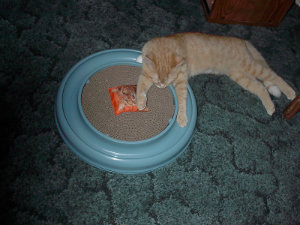 constantly monitored. The other evening, Riley got behind the big flat screen and screwed up a connection that knocked out the telephone and blackened the TV. By the time we were able to figure out what had happened and restored the connection, we’d lost the last ten minutes of Touch and have to wait until next week to find out what happened.
constantly monitored. The other evening, Riley got behind the big flat screen and screwed up a connection that knocked out the telephone and blackened the TV. By the time we were able to figure out what had happened and restored the connection, we’d lost the last ten minutes of Touch and have to wait until next week to find out what happened.
Riley and Holly are brother and sister, and are seemingly inseparable. But it is rather unnerving to see them constantly stalk and wrestle each other, especially in the morning hours. I cringe when they get each other into headlocks, and use their back paws to pummel each other while they keep biting, growling and screeching. I was concerned enough on several occasions to break it up, but for all the noisy kicking, biting and scratching, neither kitten seems to display one wound…ever.
I lock the two up at night in the largest bathroom, providing them with a comfortable pet bed, litter box and fresh water. It is where they are fed their morning and evening meals, and where they are kept while the adult cats are fed. But when I open the door after all the cats have eaten, the two shoot out of the room like two miniature bulls breaking out of a rodeo chute.
This morning, as I get ready to 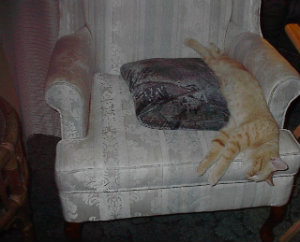 post this, was no exception. They’ve been out of control ever since. While I was brushing my teeth, I heard a loud crash. I ran into my den and immediately discovered a pile of magazines and papers on the floor. But there were also five books scattered among the debris, and what’s amazing is that these books were knocked from the fourth shelf of a six-tier bookcase! I picked up the magazines and papers and replaced them on my table, and put the books back before returning to my bathroom.
post this, was no exception. They’ve been out of control ever since. While I was brushing my teeth, I heard a loud crash. I ran into my den and immediately discovered a pile of magazines and papers on the floor. But there were also five books scattered among the debris, and what’s amazing is that these books were knocked from the fourth shelf of a six-tier bookcase! I picked up the magazines and papers and replaced them on my table, and put the books back before returning to my bathroom.
A few minutes later, I heard a plaintive mew as Holly strolled into the bathroom. I assumed the mew was her wanting me to play. But then there was another mew, and several more after that, and unless Holly had learned how to “throw” her voice, I figured it must be Riley. By then, Holly had walked over to the corner linen cabinet in the bathroom and had stretched up her entire body as she tried to reach the upper doors, which, I noticed, were moving slightly. I went over and opened them and out popped Riley. I lifted him out and put him down on the floor next to Holly.
How did he do it? Even if Riley had a hidden opposable thumb, it still doesn’t make sense. The doors are high up off the floor, and always closed. Unless the laws of physics had changed, or Riley had discovered quantum physics, it will forever remain a mystery as to how he got where he’d been. Meantime, I restacked the towels and washcloths Riley had rearranged, made myself a cup of coffee, sat down in front of the computer, and added this copy before posting.
Just another day in Mills River. #
Senior Citizenship – the Good, the Bad and the Ugly (4/23/13)
For me, I feel as if it happened overnight. One day I was in the prime of life, dealing with all that life has to offer, good and bad. The next, I had suddenly become a senior citizen and the future no longer appeared limitless.
Events in my life, large and small, remain crystal-clear in my memory. While some are a bit hazy when I go back to the 1940s and my age was in single digits, the rest of my life as it unfolded from the 1950s to this day seems quite vivid.
What I can’t pin down exactly is when the aches and pains started. I’m not talking about mowing the lawn or working in the garden or washing the cars and what I feel the next morning. I realize when you overuse specific muscles and body parts, you’re going to feel it the next day. But now, every day, when I get up in the morning, everything hurts. And my biggest physical expenditure the day before usually being nothing more than visiting the post office, buying groceries, typing on the computer or using the remote. Relief usually comes after several hours of moving around, and taking aspirin.
talking about mowing the lawn or working in the garden or washing the cars and what I feel the next morning. I realize when you overuse specific muscles and body parts, you’re going to feel it the next day. But now, every day, when I get up in the morning, everything hurts. And my biggest physical expenditure the day before usually being nothing more than visiting the post office, buying groceries, typing on the computer or using the remote. Relief usually comes after several hours of moving around, and taking aspirin.
We’ve all read or heard the term, life is short, many times, and thought nothing of it. That’s no longer true. I think about it all the time. It’s usually followed by, WTF?
I’ve tried to look at things in a more positive way and examine my current “senior” situation, which of course I share with millions. Despite Type II diabetes discovered in 1985 and limited vision in my right eye thanks to an inept ophthalmologist in Nevada, I’m in reasonably good health. I could afford to lose a few pounds, and I’m not gong to run the four-minute mile anytime soon, but my movements are not restricted and my mind is intact.
Also, my wife Josephine and I do get a break on our income tax because of our age. Being over 65 does have its advantages. For example:
If you’re over 60 and have a Golden Apple card, frequenting Applebee’s will give you a 15 percent saving. If you’re over 55 and an AARP member, Denny’s will knock 20 percent off your bill. If you’re past 55 years of age, IHOP, Chili’s, Shoney’s, TCBY, and Wendy’s will give you a 10 percent discount. The list of restaurants offering senior discounts is indeed endless. Sometimes they will just look at your gray hair and automatically factor in the deduction. But if you’re youthful in appearance, you may have to point it out to them – and prove it!
Your savings as a senior also extends to retail and apparel. Belk offers 55-plusers 15 percent off the first Tuesday of every month. Dress Barn gives seniors (55+) 10 percent discounts all the time. Ross stores offers 10 percent off every Tuesday for those 55 and older, and Stein Mart will knock off 20 percent on red dot/clearance items the first Monday of every month.
You can also catch a break at your local grocery store if you’re long in years. Albertson’s will take 10 percent off your tab the first Wednesday of each month if you’re 55+. Food Lion gives you a 6 percent discount every Monday if you’re 60+. Harris Teeter takes 5 percent off every Tuesday if you’ve reached 60, and Publix also gives you a 5 percent discount at 55+ every Wednesday.
Traveling can be cheaper for seniors as well. If you’re 62 or older, you can ride Amtrak for 15 percent less. If you’re 65 or older and not heights-challenged, American Airlines offers various senior discounts, but you’ll need to call first before booking. If you prefer movement by bus, Greyhound will chop 5 percent off your fare providing you’re 62 or older.
Should you desire to do the driving yourself and you’re an AARP member, Avis offers discounts up to 25 percent to rent a car, and Hertz will match the offer. National tops them all with up to a 30 percent discount for AARP members. Other car rental agencies also offer seniors discounts but, since they already offer discounts to the general public, at rates considerably less than the three leading companies.
Where you stay while traveling can save you money if you’re 60 or older. Motel 6 offers a 10 percent room discount, and Comfort Suites, Econo Lodge and Quality Inn all offer 20 percent to 30 percent off your bill. If you’re 62 or older, Holiday Inn offers a 10 percent to 30 percent discount depending on location. Marriott will spot you a flat 15 percent discount, and Hyatt offers a 25 percent to a whopping 50 percent reduction.
Seniors also benefit when it comes to activities and entertainment. AMC Theaters, for example, will give you up to 30 percent off if you're 55 or older. Cinemark/Century Theaters offers up to 35 percent off, and Regal Cinemas will give you a 30 percent discount. SeaWorld Orlando will take $3 off one-day tickets if you're over 50; and you can obtain a $10 lifetime pass to all U.S. National Parks, plus 50 percent off additional services including camping, if you're 62 or older.
These are just a small sample of what savings are available once you’ve reached your “mature years,” and often even a few years before that. And this is a good thing, for sure. Add to this the fact that I have the option of sleeping for as long as I like, though I’m usually up before dawn due no doubt to years of involuntarily having to arise early.
The negative factors in reaching senior status, in addition to the aches and pains, is having to take and keep track of various prescriptions, submitting to regular doctor exams, and receiving regular solicitations from hearing-aid specialists.
The worst mail, however, is the letter that arrives in your mailbox once a week like clockwork. It’s from the local funeral home and cemetery offering you eternal rest for pennies on the dollar.
Good grief. #
Kitten Invasion (4/16/13)
Riina, a young, soft-spoken college student, showed up as usual for her volunteer job at the Henderson County Animal Services shelter without fanfare. Studying to become a vet herself, Riina looked forward to working with the various cats and dogs. She never once anticipated she would have to make a life-or-death decision that day.
The shelter’s essential departmental functions include providing shelter for adoptable and stray animals and reuniting lost pets with their owners. Animals are held for a minimum of three days before becoming eligible for adoption. The shelter makes every effort to reunite a lost pet with his/her owner, or to place a stray in a responsible home. If a n animal cannot be placed within a reasonable period of time, they will be euthanized.
n animal cannot be placed within a reasonable period of time, they will be euthanized.
Riley and Holly, brother and sister kittens, were marked for termination. Their history was sketchy, the two discovered after the mother reportedly gave birth under a home. Riina never hesitated, immediately volunteering to take the two under her wing. Following a thorough veterinary exam, and providing for all their necessary shots, Riina advertised their availability on Craigslist.
And Josephine and I responded. Though we already had three cats, we reasoned that since Sparky and Cali were already past middle age at 10 and 11 years old, our 7-year-old Bengal, Cisco, could certainly use a playmate or two. Cali is a bit of a loner cat to begin with, and Sparky sleeps most of the time. For the most part, when he is awake, he ignores Cisco’s frolicking overtures to him.
Riina agreed to bring the two rescued kittens over to the house for us to see them, telling us of her plan to have them both fixed when they reach the age of four months. We could finalize the adoption a week after that.
When she brought the two siblings over, she used only one cardboard carrier, but the two were small enough and young 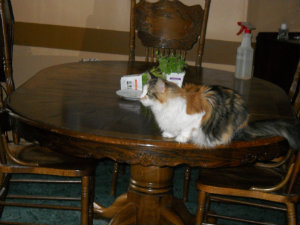 enough to endure their confined quarters. Riina put the carrier down in the foyer and opened the two flaps at the top. Out popped Riley, an adorable orange tabby male. His sister, Holly, a dilute tortoiseshell, elected to stay put in the box, apparently still half asleep.
enough to endure their confined quarters. Riina put the carrier down in the foyer and opened the two flaps at the top. Out popped Riley, an adorable orange tabby male. His sister, Holly, a dilute tortoiseshell, elected to stay put in the box, apparently still half asleep.
All three of our cats showed up to inspect our new diminutive guests. Sparky, not shy by any means, pushed his nose straight into Riley’s face, smelling the tiny kitten and touching noses in the usual feline social gesture. Cali watched from atop the dining-room table, preferring, in her inimitable fashion, not to mingle. Cisco came closer, but remained stoically aloof.
Riley’s curiosity took over and off he went to explore his new surroundings. While Riina trailed after the tiny cat, calling out his name as if he would respond to her demands that he cease and desist, Riley poked his nose into every nook and cranny of the living room. Cisco followed at a distance, clearly bothered by this impudent invader. Finally, Riina was able to scoop up the orange ball of fur and return him to his cardboard prison.
The initial test was over. Although clearly not overjoyed at the soon-to-be-permanent visitors, and despite a faint hiss from Cisco, our cats pointedly did not display any real, overt hostility.
On Wednesday, April 10, nearly one week after both kittens had been fixed, Riina returned to deliver the brother and sister kittens as promised, this time in separate cardboard carriers. Again, Sparky, Cali and Cisco showed up to greet the arrivals.
fixed, Riina returned to deliver the brother and sister kittens as promised, this time in separate cardboard carriers. Again, Sparky, Cali and Cisco showed up to greet the arrivals.
After allowing our cats a brief opportunity to smell the two siblings, I picked up the two carriers and brought them into the large master bathroom. A new litter box had been set up, along with a filled water dish, a double food dish, and a soft, circular pet bed. I set the two carriers down and opened them. Both kittens emerged and began exploring their new home. Sparky and Cisco crouched down outside the door, peering intently under the door at their new house mates.
Later, we paid Riina her homing fee, which didn’t cover even half the costs she had already laid out to rescue the two kittens. We said our goodbyes and promised to keep her up to date with the kittens’ progress.
The next day, Thursday, April 11, we set up a large metal dog cage in the foyer and placed the two kittens into it. Cisco and Sparky circled the cage, eyeballing the kittens from every angle. An initial hiss by Cisco proved to be the only negative reaction. Noses were touch again and again, until we finally retired the two for the night.
On Friday, April 12, in the morning, we allowed the two kittens the run of my den, which adjoins the master bath. Timid 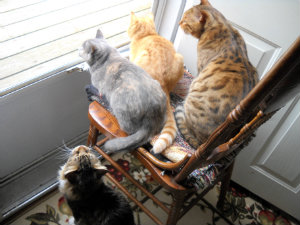 at first, it didn’t take long for the two to poke their little noses into every inch of the room, scampering over furniture, across my desk, and over and under chairs. At one point, while brushing my teeth, I heard a loud noise. I dashed into the den and found Riley perched atop the shade of a floor lamp next to my wingback chair, stretching to reach the row of books on the top shelf of one of my large bookcases. As I moved quickly forward, Riley pulled at the books, toppling a group of them that crashed to the floor. I reached out and snatched Riley in midair. I’d had enough, returning both kittens to the bathroom and closing the door.
at first, it didn’t take long for the two to poke their little noses into every inch of the room, scampering over furniture, across my desk, and over and under chairs. At one point, while brushing my teeth, I heard a loud noise. I dashed into the den and found Riley perched atop the shade of a floor lamp next to my wingback chair, stretching to reach the row of books on the top shelf of one of my large bookcases. As I moved quickly forward, Riley pulled at the books, toppling a group of them that crashed to the floor. I reached out and snatched Riley in midair. I’d had enough, returning both kittens to the bathroom and closing the door.
In the afternoon, we again opened the bathroom door and released Riley and Holly into the rest of the house. The two proceeded cautiously at first, somewhat wary of the three adult cats waiting for them. Sparky was the first to make contact, touching noses first with Holly, then Riley. Cisco began with his usual initial hiss, but stayed back and continued to observe. Cali hunkered down on the dining-room table, as usual watching things from afar.
The remains of the day went better than expected. In the evening, we put a little catnip out on the kitchen floor for the three adult cats, while the kittens finished eating their dinner behind a closed bathroom door. We continued to feed the kittens half a can each of kitten food twice a day, keeping them out of range of the adult cat food. However, apparently there was still a little residue of catnip on the kitchen floor when the kittens were let out again later in the evening, and Riley zeroed in on it immediately. A couple of sniffs and the little orange kitten fell over on his side. When he got up, he seemed a little disoriented.
The rest of the weekend was somewhat uneventful, that is if you don’t count the small overturned table and vase in the office area of the two-section living room. Or Sparky throwing up in three different places.
Today, Monday, April 15, the two kittens were again released into the general areas of the home, free to roam at will. The door to the room housing Jo’s dollhouses and garden plants she had started several weeks ago from seed was of course closed. As was Jo’s bathroom door. Otherwise, Holly and Riley could go where they wanted. Nothing major has happened so far, unless you count Riley strolling across the keyboard of Jo’s laptop and deleting an hour's worth of copy she had written for her next book, reminding Jo of the importance of hitting "Save." Or Holly hissing through the front screen door at Marmalade, a visiting stray we’ve been feeding fairly regularly for nearly three years.
Can’t wait for what tomorrow will bring. #
My Own Personal Bucket List (4/9/13)
From early in my childhood I had always fantasized about being a cowboy. My dream was to own a horse much like Roy Rogers’ palomino, Trigger. And of course that would include packing trusty twin pearl-handled gold six-shooters nestled in their white-holstered gun belt strapped to my hip.
It was a fantasy that persisted for years, especially when Mom and Dad were still together and we lived in Hollywood during the 1940s. It was a time when Western-movie cowboys ruled the day. And then later, at some point in the ’50s, I realized there was no way I was ever going to own a horse while I and my sister, along with my mother and stepfather, resided in a three-room, three-floor walkup apartment in Woodside, Queens.
At one time I did have the twin gold six-shooters, complete with the pearl handles and double-holstered gun belt. Never mind that they were only cap guns. They were good enough to serve me while my sister Barbara and I played cowboys and Indians. But the fantasy of actually becoming a cowboy and going out on long cattle drives became a distant memory.
Fade to the 1950s and the heyday of EC Comics. Their overriding success can be directly attributed to the horror comics such as Tales from the Crypt, but the genre that affected me the most were the science-fiction comics, Weird Science and Weird Fantasy. Besides being well-written and edited, the EC artists were among some of the best illustrators in the business. And they had a huge influence on me.
It was then that I decided I would become a comic-book artist. There was no formal announcement or even an aside to a close friend or relative. I just started drawing. Not as a penciler of anthropomorphic ducks and mice, but as a real artist drawing real people, and long, sleek, metallic spaceships. I would render futuristic cities and jagged planetary landscapes of alien worlds. It was exciting and I practiced every day, studying the thrilling four-color pages of EC’s finest otherworldly adventures. Sometimes I would copy a splash page in every minute detail. Other times, I would just draw from my imagination.
I even started creating my own crude comic books, drawing on folded 8-1/2 x 11 sheets. I hand-ruled the panels and carefully rendered the word balloons, and I wrote and illustrated story after story. I don’t know what happened to them, but I’m real glad there is no evidence to support this account. In 20/20 hindsight, they were not very good. My sister may have seen them, perhaps even my mother, but they were amateurish, and I use that word kindly.
At some point, I began having thoughts of someday going into outer space, of traveling to other worlds. The advent of the astronaut had yet to make its appearance. It was a concept not yet fully realized in the 1950s. But I still dreamed of reaching for the stars even then.
Despite the bloody introduction of the war in Vietnam, visions of manned space flight were no longer relegated to pipe dreams of science-fiction authors. Even President Kennedy spoke about landing a man on the moon by the end of the decade, and in 1969, that dream was fulfilled.
That was it. The idea of becoming an astronaut and soaring to the moon or (gulp!) Mars aboard a spaceship was now at the top of my bucket list.
But as fate would have it, I would never own a horse and ride the range. Nor would I ever toil at an easel churning out incredible artwork for the comics. And I would never experience the thrill and excitement of liftoff into space, or stepping out onto an alien planet.
No, my kismet was to sit at a desk and pound a manual typewriter for many years. Included in that exercise was proofreading long galleys of type, copy-editing overwritten manuscripts, and attending long-winded weekly editorial meetings. And in my spare time, there was reading, lots and lots of reading.
I’m retired now, and still reading and writing. But if you ask me if I would be willing to risk life and limb to climb aboard a rocket and travel to another planet, or to the stars, my answer would be a resounding:
Hell, yeah! #
I Just Remembered I Forgot (4/2/13)
Memory’s a funny thing. Even today, as a senior citizen, all things considered, my memory functions quite well. Most of the time. But I do have moments where my short-term memory sputters and conks out.
A perfect example occurred one recent morning when I got up planning to work on our income taxes. I put on the coffee and fed the cats, ate breakfast, then moved to the dining-room table where I had left the tax forms, last year’s return, receipts, calculator, etc. That’s when I noticed a splash of cat vomit under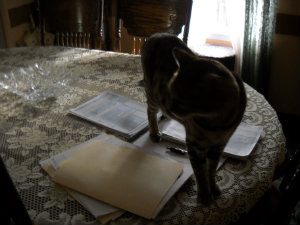 the table. I went back into the kitchen, tore off a few paper towels and went back into the dining room to mop up the residue. I followed that with a few more wet paper towels, then a few more dry ones to remove the evidence.
the table. I went back into the kitchen, tore off a few paper towels and went back into the dining room to mop up the residue. I followed that with a few more wet paper towels, then a few more dry ones to remove the evidence.
I stood up and surveyed my handiwork, noticing cat dander, lint and who knows what littering the carpeting. I decided to roll out the vacuum cleaner from the hall closet and give the dining room a quick once-over. However, when I finished that, I realized the carpeting in the living room was just as bad as the dining room had been. I vacuumed that room quickly, deciding to also include the long hallway.
By this time, my energy level had waned considerably. I sat down at the kitchen table to rest for a minute. That’s when I became aware of the odor emanating from the litter boxes in the laundry room. I got up and went into the back room, grabbing a plastic grocery bag from a hook. I used the scooper to remove the offending feline waste and deposited the bag into the trash.
That’s when I noticed the stepladder against the wall, which didn’t belong in the house. I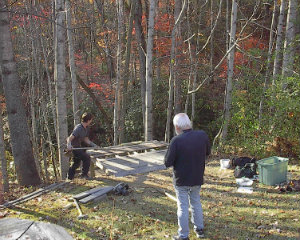 took the ladder out to the shed and put it inside. When I came back out, I noticed someone had left a rake leaning against the side of the shed. I started to put it away when I became aware of all the leaves that had managed to accumulate in the yard. It was still daylight, so I started raking the leaves until I had a huge pile.
took the ladder out to the shed and put it inside. When I came back out, I noticed someone had left a rake leaning against the side of the shed. I started to put it away when I became aware of all the leaves that had managed to accumulate in the yard. It was still daylight, so I started raking the leaves until I had a huge pile.
I rolled out the wheelbarrow from the rear of the shed, scooped up the leaves into the red metal carrier and made several trips to the wooden platform that jutted out into the woods. Dumping leaves and grass cuttings into the woods was a lot easier that way. I made a mental note to again thank son Brian for rebuilding the platform, which had developed rotted underpinnings from the weather over the years.
I had just put the wheelbarrow back in its spot when Riina, the young college girl, pulled up in her truck, parking in our driveway. We had committed to adopting two kittens from Riina, and she was bringing the little tykes over to let us see them before they are both taken to the local shelter to be fixed. Riley is the boy, a cute-as-a-button orange kitten, and Holly is the female, a soft, darkish gray kitty. I put the rake back into the shed and joined Riina and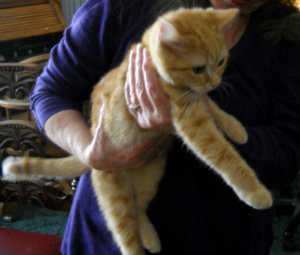 my wife Josephine on the deck.
my wife Josephine on the deck.
We moved inside and took some pictures, held the kittens in our arms, and had a brief conversation with Riina, who was studying to become a veterinarian. After she left, I became aware of how tired I was and decided to lie down on the sofa and take a brief nap.
Later, when I got up and sauntered into the kitchen, Jo, arms folded in front of her, confronted me.
“Are you all done?” she asked, arching an eyebrow.
“With what?” I asked, puzzled by her question.
“Taxes!” she rasped. “You were supposed to finish the taxes today.”
I pictured the papers on the dining-room table then, realizing I had lost track of what I had originally set out to do.
“I forgot about the taxes,” I confessed sheepishly. “I’ll do ’em tomorrow, first thing.”
“And your blog? It’s due tomorrow.”
“It’s all in my head, honey. It writes itself.”
“Yeah, and next week I’ll be secretary of state. #
What Makes You Happy? (3/26/13)
Aside from such obvious morale-booster items as a Christmas bonus, a winning ticket in a horse race, or a “bank error in your favor,” what really makes it for you? Perhaps you get all mushy inside watching your favorite movie romance. Or maybe a good book in which the characters come alive sends your endorphins flying.
For me, many things make me happy. Some of them are obvious. I’ve never had a bank error in my favor, but over the years Christmas bonuses have made my holidays a little brighter.
I haven’t been to a horse race in more than 45 years, but I once won a $2 Daily Double on a long shot that paid off several hundred, which enabled me to get my driver’s license back. It’s a long story but I’ll try to make it short.
I had purchased my first car in Norfolk, Virginia, while I was still in the Navy, a 1947 Pontiac. It was 1958 and Virginia didn’t require compulsory car insurance. Upon discharge the following year, I drove it back to New York. Christmas Eve morning, on the way to work, there was a blizzard and my brakes locked. The car slid slowly into another vehicle waiting at the light. There was no visible damage, but the guy driving the other car filed a whiplash claim with his insurance company.
vehicle waiting at the light. There was no visible damage, but the guy driving the other car filed a whiplash claim with his insurance company.
It was bogus, but since I had no insurance and couldn’t come up with the money to reimburse the insurance company what they paid the “injured” driver, my license was revoked. The horse-race winnings enabled me to square it with the insurance company and New York State returned my license.
But I digress.
As with many of you, I enjoy a good movie or a good novel. Either one can make me quite happy. These days, I look forward to Sunday nights when an episode of The Walking Dead airs. Post-apocalyptic dramas generally appeal to me, but this show has something extra going for it. And I’m not talking about zombies. The acting, direction, and production values are superior, for sure, but it is the writing that makes it such a success. Once I was able to accept zombies, I was hooked. It’s the characterization more than anything else. For me, despite knowing it is simply a play, I really care about the people portrayed in the weekly drama.
As I’ve mentioned here before, I enjoy old comic books and baseball cards. I still get a thrill when I come across a comic I had read as a tee nager. Even the “smell” of the comic book makes me happy.
nager. Even the “smell” of the comic book makes me happy.
When I open a pack of baseball cards, it’s a rush for me to see who I’ve drawn. Bill Maher says that it’s fine to collect baseball cards when you’re a kid as they depict their iconic heroes on the diamond. But if you’re an adult, he says, and you enjoy collecting pictures of men, you’re gay.
I’m not. But comic books and baseball cards still make me happy.
There are other things that make me happy. Getting up in the morning and realizing I’m still here makes me happy. It would be even better if I could get up in the morning without feeling pain. That would really make me happy.
Standing outside in the yard, surrounded by trees, makes me very happy. Looking up at the ink-black sky on a clear evening, unobstructed by harsh city lights, when the stars really do sparkle like diamonds, fills me with joy.
I love trains, especially old steam locomotives. As a young boy, I used to ride the old Broadway Limited from New York to Chicago when my parents sent me to visit my grandmother in Geneva, Illinois. Sleeping in a berth overnight on the train, looking out at the countryside racing by my window, made me very happy. And dinner and breakfast in the dining car were special.
Watching the gray squirrels and the white squirrels scamper through the woods from tree to tree, then across the lawn to our deck for an offered peanut in its shell, that makes me happy.
I’m not an inveterate bird watcher, but seeing the different varieties native 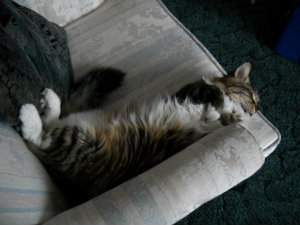 to the area fluttering about in the trees surrounding our home is enjoyable. There is one bird, the male cardinal, who shows up nearly every day, looking to steal a peanut from the squirrels. He is bright red and stands out among the other birds. Seeing him makes my heart sing. He has been very difficult to photograph.
to the area fluttering about in the trees surrounding our home is enjoyable. There is one bird, the male cardinal, who shows up nearly every day, looking to steal a peanut from the squirrels. He is bright red and stands out among the other birds. Seeing him makes my heart sing. He has been very difficult to photograph.
Stroking each of my cats, petting and speaking to them softly, and watching their adorable little faces looking back at me, that gives me great pleasure.
Writing makes me happy. Sharing my thoughts with others gives me great satisfaction. People reading what I write and commenting favorably on it would also make me happy. But my being computer-ignorant has kept me from being able to even install a “like” button on my site.
Writing this weekly blog makes me happy. It makes me even happier to have you come back every week to read it, and to visit other parts of our website. It would make me ecstatic if you liked what you saw here and decided to order a copy of our book. Writing my first novel, Stardust Dads, made me very happy, probably more so because I collaborated on it with my wife Josephine, and we're also working together on a sequel. We also collaborate on experiencing life together.
That makes me extremely happy. #
The Subrogation of the English Language (and Social Security) (3/19/13)
I realize there are a great many more important problems facing the world today than the increasingly improper use of grammar or the mushrooming misspellings by a seemingly uncaring, tech-happy public.
Frankly, I expect it from the general population. But I don’t expect it from supposedly educated, detail-oriented journalists. I don’t expect it to be imitated and encouraged by respectable, well-funded corporations.
I can’t remember the last time a TV news anchor, reporter in the field or even a talk show host actually used the correct form of “lay, lie.”
even a talk show host actually used the correct form of “lay, lie.”
I admit that the usage is tricky, but a professional journalist should know better. My Aunt Louise, rest her soul, drilled the correct usage into me during the brief time I lived with her as a young boy. An editor herself, she told me how educated people would judge me by this.
Working in my last job as the senior copy editor for R&R Partners, one of the largest, full-service ad agencies in the West, I was asked from time to time about the correct usage of "lay, lie," and I would just simply answer: "You lay something down. You lie down." But I think the Associated Press Stylebook probably explains it best:
“lay, lie The action word is lay. It takes a direct object. Laid is the form for its past tense and its past participle. Its present participle is laying.
“Lie indicates a state of reclining along a horizontal plane. It does not take a direct object. Its past tense is lay. Its past participle is lain. Its present participle is lying.
“When lie means to make an untrue statement, the verb forms are lie, lied, lying.
“Some examples:
“PRESENT OR FUTURE TENSES:
“Right: I will lay the book on the table. The prosecutor tried to lay the blame on him.
“Wrong: He lays on the beach all day. I will lay down.
“Right: He lies on the beach all day. I will lie down.
“IN THE PAST TENSE:
“Right: I laid the book on the table. The prosecutor has laid the blame on him.
“Right: He lay on the beach all day. He has lain on the beach all day. I lay down. I have lain down.
“WITH THE PRESENT PARTICIPLE:
“Right: I am laying the book on the table. The prosecutor is laying the blame on him.
“Right: He is lying on the beach. I am lying down.”
I hope this will sink in with some of you, but I’m sure most of those unable to grasp it before will continue to use the form of the word incorrectly. Certainly this does not speak well of our educational system.
And when did the term “every day” become one word? You see it everywhere, in expensive signage, in books, in magazines, on billboards, on TV. Damn it, “every day” has always been two words. The only exception is when using the two words as a modifier such as “an everyday occurrence.”
The adverb “all right” has always been two words, but just about everyone makes it a solid word and drops one of the l’s. Usage, however incorrect, does indeed in time often change spelling, and the “alright” form can now be found in Webster’s, though it is not preferred.
Another expression used incorrectly is “a lot,” made, astonishingly enough, into a solid word. Erroneous usage may reach epic proportions by the masses, but I assure you “alot” will never become acceptable.
There are dozens of other journalistic miscues that continue to irritate the hell out of me, but which I choose to forego putting forth at this time as I wanted to address something that turned up in my wife Josephine’s Facebook account that is currently being passed along.
I’ve tried to clean up the grammar and punctuation a bit, but have for the most part left the anonymous author’s excessive use of caps. I don’t know about you, but I bristle every time I hear the word “entitlement” as it relates to SS and Medicare:
KEEP PASSING THIS AROUND UNTIL EVERYONE HAS HAD THE OPPORTUNITY TO READ IT.
THIS IS ABSOLUTELY SOMETHING TO THINK ABOUT!
THE ONLY THING WRONG WITH THE GOVERNMENT'S CALCULATION OF AVAILABLE SOCIAL SECURITY IS THAT THEY FORGOT TO FIGURE IN THE PEOPLE WHO DIED BEFORE THEY EVER COLLECTED A SOCIAL SECURITY CHECK! WHERE DID THAT MONEY GO?
Remember, not only did you and I contribute to Social Security, but your employer did too. It totaled 15 percent of your income before taxes. If you averaged only $30k over your working life, that's close to $220,500.
Read that again.
Did you see where the government paid in one single penny? We are talking about the money you and your employer put into a government bank to ensure that you and I would have a retirement check from the money we put in, not the government.
Now, when we reach the age to take it back, they're calling the money we've put in an entitlement.
If you calculate the future invested value of $4,500 per year (yours and your employer's contribution) at a simple 5 percent interest (less than what the government pays on the money that it borrows), after 49 years of working you'd have $892,919.98. If you took out only 3 percent per year, you'd receive $26,787.60 annually and it would last better than 30 years (until you're 95 if you retire at age 65) and that's with no interest paid on that final amount on deposit!
If you bought an annuity and it paid 4 percent per year, you'd have a lifetime income of $2,976.40 per month.
Another thing with me ... I've had two husbands who died in their 50's (one was 51 and the other one was 59), before one cent of their Social Security could be drawn. I worked all my life and am drawing 100 percent of my own Social Security. Their SS money will never have one cent drawn from what they paid into it all their lives.
THE FOLKS IN WASHINGTON HAVE PULLED OFF A BIGGER PONZI SCHEME THAN BERNIE MADOFF EVER DID.
Entitlement my ass! I paid cash for my Social Security insurance! Just because they borrowed the money for other government spending doesn't make my benefits some kind of charity or handout!
Remember congressional benefits? Free healthcare, outrageous retirement packages, 67 paid holidays, three weeks' paid vacation, and unlimited paid sick days. Now that's welfare, and they have the nerve to call my Social Security retirement payments “entitlements”?
We're "broke" and we can't help our own seniors, veterans, orphans, or homeless. Yet in the last few months we've provided aid to Haiti, Chile and Turkey. And now Pakistan ... former home of bin Laden. Literally, BILLIONS of DOLLARS! And they can't help our own citizens in New York and New Jersey!
They call Social Security and Medicare “entitlements,” even though most of us have been paying for it all our working lives, and now, when it's time for us to collect, the government is running out of money.
Why did the government borrow from it in the first place? It was supposed to be in a locked box, not part of the general fund.
Sad, isn't it?
I will have to add a disclaimer here that I did not research this unknown author's facts concerning the benefits of congressional members, nor did I check her math. But it certainly is food for thought. #
Age of Reason Redux (3/12/13)
They say that time is a concept that was invented by man in order to make sense of when something happened, is happening, or will happen. The theory is that everything is happening at once and there is no past or future.
Interesting, but I’m not buying it. Although I must say, events that took place years ago when I was age 16 do seem as if they happened yesterday.
I ran with a bunch of guys who were also in my age group of 16 – 17. We hung out at what in New York parlance was called a corner “candy store.” Yes, you could find various candy bars and such there, but most of the store consisted of a long counter with stools where one could indulge in a tasty hamburger or a chocolate malted, or an egg cream. The latter having nothing to do with eggs. Basically, it consisted of a shot of chocolate (or vanilla) syrup, a spot of milk, and the rest in seltzer water.
In the 1950s, if you lived anywhere but in the New York City area (which included the five boroughs, Long Island, and New Jersey), and you ordered an egg cream, people would just look at you dumbfounded.
The candy store also had the requisite multicolored jukebox. Insertion of a quarter bought five individual songs, everything from “Earth Angel” by the Penguins to “Maybelline” by Chuck Berry.
We certainly weren’t a gang, or even a so-called “social club.” We were just a group of guys hanging out together trying to have a good time. Some of us tried to see the big picture and figure out what we were going to do with the rest of our lives, but for most of us, the big question for our barely used minds was how to get a girl to “go all the way.”
There was no prejudice in the group. The fact that there were no black members was no doubt due to there being very few, if any, black people in Forest Hills, Queens. But we had a Chinese guy, the only one in the clique with a motorcycle jacket. And another chap whose father was Italian and his mother Jewish. He was a big, strapping guy with a football player’s neck whom we called “Animal” because of the way he behaved.
There was also Lenny who, like me, was only five-foot-six and maybe 135 pounds soaking wet. But Lenny had split from home and joined the Merchant Marine, and had spent at least six months overseas. All of us were in awe of Lenny who had truly seen the world. He was extremely tough, too, taking on guys twice his size, and leaving them whimpering hulks.
There was also another member of our crowd, Harvey Weinstein. He was the so-called “brain” of the group who shares the name of a famous Hollywood producer. I doubt it’s him, though, since the producer is somewhat younger. We used to kid Harvey because of his often serious demeanor, calling him “Harvey Hebe” in order to get a rise out of him, which we did.
And then there were Bernie and Eddie, inseparable friends who had 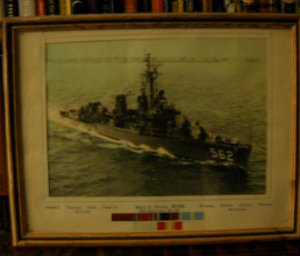 already reached that coveted NY legal drinking age of 18. Both were at least six feet tall, with Bernie the wiser of the two. In fact, Eddie was considered to be as dumb as a doorknob. Someone once asked him to spell “boot,” to which he answered “b-ooh-ooh-t.” At least that was the general consensus until the summer that Eddie somehow managed to get hold of the master key to all the Good Humor trucks in Queens. What a year for ice cream that was. In our collective juvenile minds, Eddie had been elevated to the status of genius.
already reached that coveted NY legal drinking age of 18. Both were at least six feet tall, with Bernie the wiser of the two. In fact, Eddie was considered to be as dumb as a doorknob. Someone once asked him to spell “boot,” to which he answered “b-ooh-ooh-t.” At least that was the general consensus until the summer that Eddie somehow managed to get hold of the master key to all the Good Humor trucks in Queens. What a year for ice cream that was. In our collective juvenile minds, Eddie had been elevated to the status of genius.
Anyway, Bernie and Eddie joined the Navy and went away to boot camp in Bainbridge, Maryland. Several months later, I decided to do the same. Something about my being in the company of others breaking into a bakery truck and stealing some cookies forced me into an overnight stay in the precinct jail, and then another night or two in the Long Island City House of Correction. I was miraculously cured of any desire for a lifetime career of crime and punishment, quickly agreeing to my lawyer’s suggestion to the judge that I join the Navy and, like my friend Lenny, see the world.
No one wanted to press charges anyway, and in a few weeks I found myself on a bus barreling its way along the New Jersey Turnpike toward Bainbridge, Maryland. To my pleasant surprise, my buddy Bernie was still at Bainbridge. Eddie had graduated and moved on to his next duty station, but Bernie could not quite grasp “the Navy way” and had been left back to do it all over again.
The weeks ahead in boot camp, and the years afterward aboard a destroyer, were rich and varied. I did indeed see the world and then some. But of course, that's another bunch of stories. #
The Good Ol’ Days of Men’s Adventure Magazines – Conclusion (3/5/13)
The following is the fourth and last part of a long article I wrote for Alter Ego magazine a few years ago, the rights to which I still retain. In it, I reflect on my days during the 1960s and ’70s when I worked as an editor/writer for the now-defunct men’s adventure magazines. At the time, we shared a large suite of Manhattan offices with Marvel Comics. For me, they really were the “good ol’ days,” but no one bothered to tell me at the time. Herewith, the conclusion:
George Glassgold was the “book editor” for quite a while, in charge of receiving review copies of new books, reading and evaluating them for possible condensation. He also was responsible for obtaining reprint rights from the various publishing houses.
Unfortunately, George spent a good deal of his time finding ways to avoid reading the books. Instead, George would pile the review copies into large shopping bags and schlep them over to the Strand Book Store where he would resell them and pocket the money.
George was eventually replaced with a young blond woman with a British accent. Patricia didn’t last very long, though. She was appalled by what she termed “the crudeness of the sweaty, vulgar men’s magazines.” Her downfall, however, can be attributed to her interpretation of what constitutes sex. In a less-than-exciting book she recommended for excerpting, she claimed the sex scenes were hot and heavy. Martin Goodman took a cursory look at the book and got the feeling it was not appropriate for the men’s books. He called me in and asked if I would take it home and give it a fast read, which of course I did. I confirmed his suspicions. Evidently, Patricia’s idea of oral sex, for example, was a woman blowing her sweetheart a kiss from the train.
Pete Fine was another young man who didn’t quite make the cut as an associate editor. Pete referred to himself as an “article doctor” when the managing editor of MEN confronted him about there being no punctuation in a 58-word lead sentence in a piece he was supposed to have copyedited. Pete promptly took it back to his desk and worked feverishly on the manuscript for another hour.
“What’s this?” the managing editor asked after looking it over again.
“Whaddya mean?”
“What do I mean? I mean, you’ve got commas next to periods, for crissakes.”
“You wanted punctuation.”
“I see,” said the managing editor.
Pete left that day and never returned.
Another associate editor, a young black man we’ll call Steve because I can’t recall his real name, signed on with MALE magazine and worked diligently for a few months. From all reports, he displayed good editorial sense and probably would have stayed on indefinitely – if the MPs hadn’t come in and taken him away. Apparently Steve was in the army reserve and was supposed to report to camp for two weeks’ active duty. When he didn’t show up, he was listed AWOL, tracked down and taken to the stockade to await court-martial.
As art director, Larry Graber ran the art department at MM for many years. A likable, even-tempered guy with an easy laugh, Larry possessed a high degree of artistic talent in addition to being quite knowledgeable in production.
One morning, while a vendor from one of the stat houses sat in a 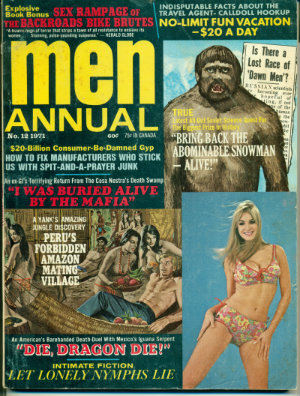 chair in front of Larry’s desk, a set of progressive proofs for one of the cheesecake sets arrived. It was now the ’70s and the open-legged shots of gaping vulvas left nothing to the imagination. Larry laid the proofs out on his table and began marking them up with a red crayon. Peering over his shoulder, the vendor smacked his lips and said, “Gawd, I could eat that!”
chair in front of Larry’s desk, a set of progressive proofs for one of the cheesecake sets arrived. It was now the ’70s and the open-legged shots of gaping vulvas left nothing to the imagination. Larry laid the proofs out on his table and began marking them up with a red crayon. Peering over his shoulder, the vendor smacked his lips and said, “Gawd, I could eat that!”
Larry, without blinking an eye, looked back at the vendor and said, “Go ahead, I’ve got an extra set.”
Art Paul was another one of those New York City eccentrics who haunted the halls of Magazine Management over the years. A diminutive cartoonists’ agent who called his one-man company “Laughs Unlimited,” Art would drop off batches of cartoons several times a week. While other cartoonists would mail their submissions along with a stamped return envelope, Art would deliver them in person to the editors responsible for selecting cartoons.
During the holidays, Art, who stuttered and had a tendency to spit when he spoke, would seek out the cartoon editors and bestow the tackiest of gifts upon them during Christmas week. Things like cheap ties with stains on them, or bottles of odd-smelling cologne. But Art needn’t have bothered with his feeble attempts at bribery, for invariably we’d discover some real gems among his offerings.
Obviously, Art’s cartoons consisted of rejects that cartoonists ultimately turned over to him, but the sheer volume of submissions resulted in many sales for him. I continued to purchase cartoons from Art for other magazines long after I had left Magazine Management.
Another young associate editor, who will have to remain anonymous here, approached me with several manuscripts he was supposed to copy-edit before sending to the typesetter. That’s right, I said typesetter. The days of PCs had not yet arrived, with most of us still using manual typewriters. I can still hear the clackety-clack din of multiple typewriters in action. All copy, after it was edited, was sent out to our contracted typesetter, who would then return galleys for proofing.
Anyway, this editor offered to pay me so much per manuscript if I would take on the task of editing them. I agreed, and wound up doing this for him on a regular basis for the better part of a year. I don’t know if he had any basic editorial skills or not, but he certainly did not lack for ideas or high-minded goals. He eventually wound up leaving MM and forming his own publishing group on the basis of a new magazine idea (not men’s adventure), and was highly successful.
Milton Schiffman, or Milton “Paperclips” as he was more commonly known by veteran MM staffers, was Magazine Management’s comptroller. Milt was friendly enough when passing the time of day, but compassion and empathy were not part of his emotional makeup. He had nothing but disdain for those less fortunate than he.
Reportedly, Sol Brodsky and Roy Thomas were walking down the hallway with Milt, headed toward Martin Goodman’s office to get a Marvel Comics freelancer paid early because of a financial crisis at home. As they walked, Milt pushed his horned-rim glasses back up his nose and shook his head in disgust.
“I’m sorry, but I don’t have any sympathy for anybody who doesn’t have at least a coupla thousand in the bank.”
Milton also freelanced on the side by doing MM staffers’ income taxes, for a fee. The problem was that Milt never got anyone a refund, ever. He went strictly by the book, and when there was room to hedge, Milt always gave the benefit of the doubt to the IRS.
The Drug and Alcohol Connection
Most of the MM staffers enjoyed a few drinks during lunch or after work, including those on the comic-book side. A few enjoyed it a bit too much, this reporter included. Some of us eventually got help, and some didn’t. I knew several editors who are no longer with us because they could not, or would not, stop.
One associate editor we’ll call Hal used to duck out of the office at least a dozen times a day, whipping around the corner to the Coral Bar for a couple of quick shooters. He would spend only a few minutes in the place, and then bolt back to the office. He never bothered with any nourishment and eventually died as a direct result of his chemical dependency.
Another older editor, Gil, a published poet who was separated from his wife, sat at his desk in the rear of the bullpen and nursed a bottle of vodka day after day, week after week, until finally succumbing to the ravages of alcohol poisoning.
Another young editor, who quit MM just before my arrival, sat home and drank himself into a stupor for months and months until he died. Doctors who later performed an autopsy said they had never seen a swollen, diseased liver in such a young man.
Even one of the MM secretaries used to fill her empty can of Coke with vodka and sip it through a straw during the day. She survived, but not before she endured the horrors of detox.
Marijuana smoking was also popular and certainly not as lethal as alcohol, but cocaine developed into a problem for a few who will have to remain nameless here. One enterprising editor eventually had to start selling the stuff to help pay for his addiction. He was a close friend and I’m sad to say his dependency eventually led to his demise before he was 35.
The Consultant
In my opinion, if there was any one man responsible for hastening the end of MM’s men’s adventure magazines, it was Selwyn James. Hired by Chip Goodman as a consultant in the early ’70s, Selwyn James came in and immediately began second-guessing the editors as to the content of the men’s books.
I can’t recall what Selwyn’s credentials were, if any. His full-time job had something to do with marketing. A blond, somewhat effeminate man with an annoying British accent, who hailed originally from South Africa, Selwyn would come in on his lunch hour and meet with the various editors one-on-one. He would go over their prospective line-ups for the upcoming issue, and then rip them apart.
In the ensuing months, he actually succeeded in feminizing the men’s adventure magazines, which of course caused several editors to resign in utter frustration. The rest of us suffered in silence and vowed to live to irrigate his grave.
The ultimate demise of MM’s men’s magazines, however, and eventually Magazine Management itself, was no doubt brought about by the onset of the Newspaper Guild. The events at the end are somewhat hazy. I left in 1977, receiving a week’s severance pay for each year of employment, thanks to the Guild’s contract. For some unexplained computer glitch, Cadence couldn’t issue me one check and I wound up sitting in front of a suspicious suit at the bank while he investigated why I had 13 checks, each for the same exact amount.
After I left, Stag was eventually resurrected by Chip Goodman’s new company while the rest of the men’s mags went belly up. I don’t know if any of the movie or confession magazine titles were sold, but Magazine Management, as I knew it, ceased to exist.
Martin Goodman, rest his soul, succumbed to Alzheimer’s disease in the late 1980s. I think it was around 1994 when Chip passed away. He was a relatively young man in his 50s, but the details of his death seem to be shrouded in secrecy.
There were other personalities, other stories in the Magazine Management saga. What I’ve written here are just a few of the memories that have lingered within me for more than 40 years. Some of the memories are hazy. Many are vivid, as if they happened yesterday. Right now I can see and hear Fabulous Flo filling in at the reception desk, greeting the kids who haunted the lobby hoping to catch a glimpse of their heroes Stan Lee or Roy Thomas or Johnny Romita or Big John Verpoorten.
No one ever sat in the lobby and waited to catch a glimpse of the men’s magazines’ editors and writers, or of the artists whose marvelous illustrations graced the pages of those colorful magazines.
But we were there, every day, for years. And we had fun. They were the good ol’ days, goddammit. And we loved every minute of them.
David R. George worked as an associate editor on TRUE Magazine in the early ’60s while attending Hunter College in the evening. After a 13-year stint at Magazine Management, from 1964 through 1977, he went on to serve as editor of a number of slick men’s magazines, including the American edition of Italy’s Playmen, Europe’s bestselling men’s magazine. Among his regular contributors were James T. Farrell and Stephen King. David also edited Hugo Gernsback’s venerable Sexology for several years. In 1986, he left New York for the greener pastures of Asheville, North Carolina, where he and his wife Josephine founded, published and edited a 40-page seniors-oriented tabloid, Carolina Senior Citizen, later changed to 39 Plus, for eight years. In 1996, David and his wife moved to Las Vegas where he was senior copy editor for R&R Partners, the ad agency that created the much-quoted line, “What happens here, stays here.” He and his wife Josephine have written a novel, Stardust Dads, which, surprise! features a men’s adventure magazine editor in New York whose life is being subtly manipulated by his late father. #
The Good Ol’ Days of Men’s Adventure Magazines – Part III (2/26/13)
The following is the third part of a long article I wrote for Alter Ego magazine a few years ago, the rights to which I still retain. In it, I reflect on my days during the 1960s and ’70s when I worked as an editor/writer for the now-defunct men’s adventure magazines. At the time, we shared a large suite of Manhattan offices with Marvel Comics. For me, they really were the “good ol’ days,” but no one bothered to tell me at the time. Herewith, Part III:
The Editors and Writers
Vera Jirsa, a tall, thin woman with an easy smile from Shaker Heights, Ohio, taught me more than I could ever have learned from an army of English professors. The managing editor of Stag could take a manuscript seemingly written by a Neanderthal (and a few of our outside freelance writers certainly fit that category) and pencil-whip it into some of the most readable copy on the planet. And when I missed correcting an obvious gaffe, or smoothing a syntax-poor passage, Vera would let me know without making me feel like Edgar Bergen’s Mortimer Snerd.
But Vera was socially reclusive. A creature of habit, she almost never left the building for lunch. Instead, she would call down to the Schrafft’s coffee shop in the lobby of the building and order lunch that would later be delivered to her desk.
“Hi, Georgia, Vera,” she would speak into the phone. “Fine, thank you. Yourself? Yes, sliced steak, medium. White bread. Coffee light. Change for a ten. Thanks.”
The words never changed, the greeting stayed the same. The order never altered. Day after day. Month after month. Year after year.
I remember one afternoon following Vera’s phone order, George Penty, then editor of For Men Only, swung around in his chair and looked right at me, eyes bulging, a desperate expression plastered on his face. “Let’s go to lunch,” he said.
Downstairs, as we turned the corner and headed for the Coral Bar, George said, “How many freaking years do we have to listen to the same lunch order? Doesn’t this woman have a life?”
We proceeded into the Coral, sat at the bar and ordered hamburgers. We washed them down with more than a few gin and tonics and forgot all about Vera, Georgia and Schrafft’s sliced steak medium.
George Penty had a talent for spotting a trend before it happened. He had written the first revisionist history of the Kennedy Administration, Kennedy in Power (1961). A speechwriter for Adlai Stevenson, George had cut his political teeth as a labor organizer in Southern Klan country. But George was as colorful as he was intellectual. In addition to his passion for politics, coupled with his fondness for young women and aged 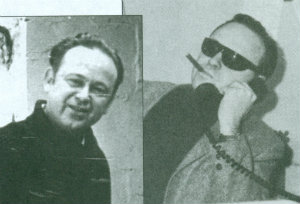 whiskey, George loved to recount funny stories about real people. His speech accompanied by winks and sprinkled with innuendos, George would tell his tales in a series of ellipses. Often, he would jump to his feet in the middle of a story and imitate the manner in which a person walked or carried himself. Despite his serious political side, George was better than any standup comedian today, and this is what endeared him to the rest of us.
whiskey, George loved to recount funny stories about real people. His speech accompanied by winks and sprinkled with innuendos, George would tell his tales in a series of ellipses. Often, he would jump to his feet in the middle of a story and imitate the manner in which a person walked or carried himself. Despite his serious political side, George was better than any standup comedian today, and this is what endeared him to the rest of us.
I remember one morning when George came in wearing a new silk tie he had purchased at Bloomingdale’s over the weekend. It was obviously an expensive tie, costing far more than what he usually paid for a tie even though he professed to having bought it on sale. It was also the morning that Martin Goodman had called him into his office to discuss For Men Only’s latest sales figures.
Unfortunately, Martin Goodman, millionaire publisher, was wearing the very same tie.
So picture it. There stood Martin Goodman and George Penty facing each other, belly to belly, tie to tie. As one eye-witness later recounted the story, Martin Goodman glanced down at George’s tie and smiled. “Glad to see you’re doing so well, George.”
George came back into the office red-faced, tore off the tie and stuffed it into the bottom drawer of his desk. He never wore it again.
Melvin B. Shestack, the so-called gentle con man, earned the nickname because he was always concocting wild stories or offering “a great deal” that existed only in his vivid imagination. It wasn’t that Mel did so for his own enrichment. To my knowledge, he never made any money on his “deals.” Because of whatever emotional hang-ups he possessed, Mel simply had to try and convince people that his elaborate schemes were legit.
For example, I remember that he had half the people in the office convinced he had signed a lucrative contract with a major publishing house to write a definitive history on famous Jewish gunfighters of the Old West. A staggering number, I’m sure.
Or the time he had persuaded both Martin Goodman and Stan Lee that he would be able to get some of the Marvel super-heroes into the Macy’s Thanksgiving Day parade as balloons. Remember, this was long before Spider-Man and his cohorts had attained nationwide fame and respectability. Of course, no such arrangement existed – except in Mel’s somewhat skewed mind.
Oh, balloon figures of the comic-book characters had been manufactured, to be sure. At considerable cost to MM. But when a phone call was made to parade officials, no one knew anything about it. Needless to say, no latex Marvel super-heroes floated down Broadway that year.
I also vaguely recall Mel taking it upon himself to make all the arrangements for the company’s annual Christmas party. There were some snacks to nibble on while everyone awaited the delivery of the booze. The hooch arrived all right, only to be taken right back to the store from whence it came. Somehow, Mel could not come up with the check to pay for it. It later became known as the only MM party in which the booze was “rented” for a few minutes.
Mel was also the only editor I have ever known to wear a green eye shade when he would proofread. Of course, his proofing left a lot to be desired, which is no doubt why the word got around that underneath that ubiquitous eye shade, Mel was able to catch up on his much-needed sleep.
Mario Puzo was considered MM’s World War II expert. His knowledge came from long hours of research at the library. And when he needed to enhance a story he was working on, well, as stated earlier, he used his imagination.
Before his success with The Godfather in 1969, Mario wrote two other critically acclaimed novels, Dark Arena in 1955 and The Fortunate Pilgrim in 1965. He also penned a children’s book, The Runaway Summer of Davie Shaw, an inscribed copy of which my son still treasures today.
Mario worked on “the other side,” in Bruce Jay Friedman’s division, so I had minimal contact with him. But I certainly remember the day The Godfather made the Hollywood connection. It was all over the newspapers.
Martin Goodman, who truly hated to write checks, was always giving Mario a hard time about his freelance. Especially when Mario would come into his office and ask for an advance on a story he had yet to write. But on the day Mario’s book was sold to the movies, Martin Goodman stood in the doorway of our bullpen, grinning from ear to ear. Obviously bursting with pride, he exclaimed, “I never said Mario couldn’t write!”
Mario also penned the screenplay for The Godfather II, which some consider even better than the first film. He also wrote the script for the first widely successful Superman movie.
A couple of other Mario Puzo incidents come to mind. Mario, who lived on Long Island with his wife and five children, often drove his car into work. Sometimes he would park in front of the building, right on Madison Avenue, and pay someone in the mailroom to go down and feed the parking meter every hour.
I’m not sure how it happened, but one day a cement truck pulled alongside his car and somehow tilted over and smashed his vehicle as flat as a Frisbee. Following a settlement with his insurance company and the replacement of his car, Mario made sure his commute involved only the Long Island Railroad, taxis and/or subway.
Mario loved to eat, and the evidence was overwhelming. What the short, bespectacled man lacked in height, he made up for in girth. So going to lunch with Mario was quite an experience. I remember eating two slices of pizza that afternoon; Mario ate two pizzas.
One day, Mario brought in a whole cheese, offering to share it with the rest of the bullpen. The problem was he didn’t have anything to cut it with. That’s when one of the young editors, Martin Sage, opened a desk drawer and pulled out a folded white towel. He lay the towel down on the desk and opened it. We all stared in shock as the overhead fluorescents caught a glint of shiny steel. It was the largest butcher knife any of us had ever seen.
Years after the fall of MM, I found myself editor of Adelina, the American edition of Italy’s Playmen, Europe’s largest-selling men’s magazine, and in dire need of some big names for the cover. I wrote to Mario Puzo and suggested he write a piece on food for me, or on any subject he wanted. He responded that though he appreciated my offer, he would have to decline. He felt he had paid his dues many times over and that his goal in life was to do as little work as he could possibly get away with.
Ernest Tidyman was hired as an editor sometime during the late ’60s. He was immediately given his own office, and we soon learned that Ernie wasn’t quite like the rest of us. The first thing he did was bring in a small, green-shaded library lamp for his desk and turn off the recessed ceiling lights. This gave his office a kind of soft, dark, “private” look.
The second thing Ernie did was create the fictional black detective, Shaft.
The third thing Ernie did was win an Oscar for writing the screenplay for The French Connection.
Ernie worked at Magazine Management for a relatively short time, writing a few freelance articles that were pretty bad. So bad, in fact, that we kept them in inventory and never used them. But on his feet, Ernie was head of his class, a real charmer. And when you’re as glib as Ernie was, you can get pretty far.
One night, I was enjoying a few drinks at Chance’s, a second-floor bar on West 58thth Street between Madison and Fifth. I got into a conversation with a guy who turned out to be Eddie Egan, the detective on whose life The French Connection was based. When he found out I worked alongside Ernest Tidyman, he launched into a tirade, telling me what I already knew, that Ernie was a “sloppy-ass hack writer.” He claimed that both he and the director of the film had actually reworked Ernie’s script and that they, not Ernie, should have received the Oscar.
Bill Smith, a.k.a. Martin Cruz Smith, author of bestsellers Gorky Park and Nightwing among other novels, is yet another MM alumnus. Bill, as we knew him when he was managing editor of For Men Only, with his boyish good looks and unbridled enthusiasm, could have been called the George Stephanopoulos of Magazine Management.
But Bill Smith, Ernie Tidyman and Mario Puzo are merely the tip of the literary iceberg when it comes to former MM staffers turned novelists.
In addition to the successful off-Broadway Steambath and a number of brilliantly funny Esquire stories, Bruce J. Friedman wrote the highly regarded books Stern, A Mother’s Kisses and the Lonely Man series. He actually accomplished most of these while still working at MM.
Being a member of Noah Sarlat’s group, I didn’t have much direct contact with Bruce. But I recall one time Bruce coming into our bullpen to ask if I would condense a book for him. Most real books were too long to run in the magazines, so we would cut them down to the length we had room for. Noah paid $75 for a book condensation, which was considered a freelance task, but for some reason Bruce’s budget allowed for $100.
“I hear you’re a whiz at doing book condensations,” Bruce said as he approached my desk, a big grin on his face. “Do ya have time to do one for me?”
“Sure, Bruce,” I said, jumping at the chance to earn an extra $25. “When do you need it?”
“Aw , take all the time ya need,” he said, and I breathed a sigh of relief. “Just have it back to me in the morning.”
, take all the time ya need,” he said, and I breathed a sigh of relief. “Just have it back to me in the morning.”
Before my time, Jim Thompson reportedly was Martin Goodman’s top paperback writer when MM was publishing Lion Books. He moved on to the West Coast and is now an acclaimed Hollywood “noir” writer.
Even Mickey Spillane, who hit it big in the ’50s with books like I, the Jury and My Gun Is Quick, first wrote comic-book stories for Martin Goodman’s Timely Comics. He also wrote for men’s adventure magazines, which included MALE and Stag Annual.
George Fox, one-time managing editor of MALE and MEN, also made the literary spotlight, sharing screenwriting honors with Mario Puzo for Earthquake.
Carl Sifakis was another MM staffer with whom I had the pleasure of working for many years. In addition to working on Stag with Vera, I also teamed up with Carl to put together a number of issues of Sportsman. Carl, a Columbia journalism graduate and veteran newspaperman, not only imparted great wisdom and knowledge based on his years of experience, he also provided a never-ending source of entertainment.
When titling the stories in Sportsman, Carl and I would try to see who could come up with the best double-entendre. For instance, a jungle adventure involving tigers wound up with the title “Blind Date with a Man-Eater.”
Because of a newsstand sales increase in magazines about guns, Martin Goodman decided to change Sportsman into a gun book, changing the magazine’s name to Sportsman & Guns. The majority of articles were written by the same man, Gil Paust, I believe, and almost every one started with the same lead. The author would recount how a friend would come over and verbalize his wish of converting this or that gun into something more powerful, or something that had a better sighting device. And Gil would say, “Funny you should mention that. I have just the thing in a vise down in my basement workshop that I’m converting. This was then followed with the technical description and outcome.
Those issues were never any more successful than prior issues of Sportsman. The gun enthusiasts just never discovered us. The fact that we still had the same “Fredericks of Hollywood” and familiar truss ads in the back of the magazine didn’t score any credibility points with the readers, I’m sure.
But Carl and I had fun doing them. It was a real challenge to try and come up with synonyms for rifle, such as “smoke pole” and “firestick.” How many times can you use the words rifle or gun in a blurb without sounding redundant?
When Bruce Jay Friedman left to pursue his successful writing career, Carl eventually took over his position on “the other side” as editorial director, and after a brief stint as editor of For Men Only, I became Carl’s managing editor.
Today, Carl continues to write various books for Facts on File, drawing upon a talent he cultivated as a newspaper reporter before joining Magazine Management. He is the author of The Catalogue of Crime, The Encyclopedia of American Crime, The Dictionary of Historic Nicknames and American Eccentrics, among many others.
David Ivins worked with me as an associate editor on MALEmagazine. David carved out his own little niche at MM by writing articles centered around motorcycle gangs. A motorcycle owner himself, David became quite prolific at the task. In the beginning, we thought nothing of calling outlaw bikers Hell’s Angels – until one day several representatives from the real Hell’s Angels showed up at the MM offices and “suggested” that we cease and desist. It turns out that the name is copyrighted or trademarked and that we could not use it without permission. Only in America.
Following that, David kept the biker gang names generic.
David also wrote several nonfiction books, including a comprehensive tome on woodburning stoves. But David’s biggest claim to fame was bringing the Newspaper Guild in to represent Magazine Management employees. When Cadence had taken over, there may have been a reduction in freelance rates, and perhaps some other moves we were not happy with. But the proverbial straw was none of these things.
The air conditioning was not working properly and we were constantly complaining that it was too warm and humid in the office. The apathy on the part of management continued until, one day, David picked up the phone and dialed the Newspaper Guild. After months of meetings with the Guild’s representative, David finally succeeded in bringing the opportunity to vote for union representation to Magazine Management.
Cadence management was furious. They tried everything legally possible to persuade us to vote the Guild down, but in the end MM became a union shop. It was also the beginning of the end, but I’m getting ahead of myself. # (Concluded next week)
The Good Ol’ Days of Men’s Adventure Magazines – Part II (2/19/13)
The following is the second part of a long article I wrote for Alter Ego magazine a few years ago, the rights to which I still retain. In it, I reflect on my days during the 1960s and ’70s when I worked as an editor/writer for the now-defunct men’s adventure magazines. At the time, we shared a large suite of Manhattan offices with Marvel Comics. For me, they really were the “good ol’ days,” but no one bothered to tell me at the time. Herewith, Part II:
The Marvel Connection
I remember the first time I saw Gary Friedrich. It was in the mid-1960s and Gary was writing scripts for Rawhide Kid, Sgt. Fury and Daredevil. He immediately caught my attention. Because of his long hair and beard, he bore a striking resemblance to Jesus Christ. He also wore shiny brown leather pants, which at the time I thought were pretty cool.
We eventually became good friends and spent many an evening drinking our troubles away at the Coral Bar. Years later, I hired Gary as an associate editor to help me with For Men Only, which lasted a relatively short time. We remained friends, with Gary often coming out to the house where he would entertain my children with his Brer Rabbit-Brer Bear mimicry, among other endearing amusements.
I probably met Roy Thomas through Gary. I recall chatting with Roy from time to time, and seeing him socially at parties, but one incident stands out. I used to bring home two copies of every Marvel comic book published, for my son and daughter. My son David loved Spider-Man and one day I mentioned this to Roy, lamenting that having arrived at MM a year after The Amazing Spider-Man title began, I didn’t have the early issues.
Roy offered to sell me a copy of The Amazing Spider-Man #1 for $100. At the time, that was a lot of money and I just couldn’t raise the dough. Last time I looked, a near-mint copy of #1 was listed in Overstreet at $32,000.
I also became friendly with Big John Verpoorten, obviously because he was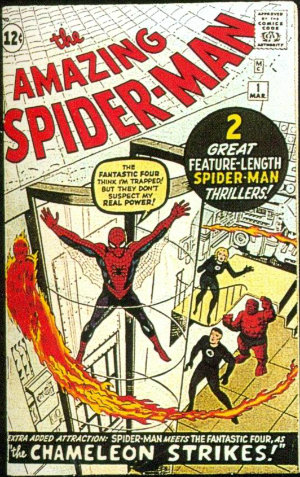 a close friend of Gary’s. And because Fabulous Flo Steinberg was just such a breath of fresh air, I think everyone considered her a friend. I also was friendly with Marie Severin, a sweet, very talented person. As most comic buffs know, Marie was the colorist on the old EC Comics line and her brother was none other than John Severin, a prolific EC artist, and since I was an early, card-carrying, numbered E.C. Fan-Addict, the connection was instant.
a close friend of Gary’s. And because Fabulous Flo Steinberg was just such a breath of fresh air, I think everyone considered her a friend. I also was friendly with Marie Severin, a sweet, very talented person. As most comic buffs know, Marie was the colorist on the old EC Comics line and her brother was none other than John Severin, a prolific EC artist, and since I was an early, card-carrying, numbered E.C. Fan-Addict, the connection was instant.
There may have been one or two men’s magazine staffers who looked down their noses at the Marvel division, but most of us realized and appreciated what Stan and company were doing.
The Goodmans
The first time I met Martin Goodman, I was virtually petrified. The silver-haired, bespectacled man had a certain presence about him that silently commanded respect. I remember how he often wore dark sunglasses, even when he strolled the corridors, and this seemed to render his persona almost Mafia-like. He could look at you and utter the fewest of monosyllabic words, and the effect would be chilling. Few addressed him by his first name. The company joke was that even his brothers called him Mr. Goodman.
I recall my first face-to-face with the man. I had just left the art department and was headed back to the bullpen when he suddenly emerged from his secretary’s room and stood in front of me.
“They tell me you can do it all, kid.”
“O-Oh,” I think I managed to stammer out weakly.
“Well, keep up the good work.”
But despite my working in abject fear of Martin Goodman for the major part of 13 years, I can honestly state here that I never had anything but respect and admiration for the man. Martin Goodman, as I knew him, was an honorable, decent man who, according to his own accounts, rode the rails and slept in box cars during the Great Depression.
I had been working late one night and he had come into the bullpen and graciously invited me to have a drink with him. As we sat in his large, richly appointed, plush-carpeted corner office, complete with treadmill and fully stocked bar, this soft-spoken gentleman recounted his early days. We were drinking 101-proof Wild Turkey and so much of what he said was flushed away with the booze. I do recall him telling me about being in therapy and how he had taken a bottle of bourbon to his last group therapy session.
“If you can’t drink in group,” he said defensively, “where else can ya drink?”
Martin Goodman was never predictable. One of the associate editors, Ivan Prashker, wrote a fictional short story for Playboy magazine that was published in 1970. I think the story was called “The Boss’s Son.” The setting was not a publishing company but there was no mistaking the thinly disguised principal characters of Martin Goodman and his son Chip, whose depiction was less than flattering.
Ivan had been on vacation in Europe when the Playboy issue hit the newsstands, but when he got back to the office, he walked around trembling, positive that his days at MM were numbered. He had initially planned on taking a job with another company before the story was published, but the opportunity for the position had fallen through. The word spread quickly and just about everyone in the company had either read or knew about Ivan’s magazine story.
About a week after the magazine came out, Ivan was stopped in the hallway by Martin Goodman, who smiled and said, “Nice piece of writing, Ivan.” And that was that. Martin was apparently more impressed with Ivan’s sale to the prestigious Playboy than he was concerned about any possible slight to his son Chip.
I believe it was around 1968 when Martin Goodman sold the company to Perfect Film and Chemical Corp. (later bought by Cadence Industries), pocketing a reported $13 million. Cadence was an international conglomerate that owned, among other subsidiaries, Perfect Pencil and Hudson Vitamins, etc. For months on end, an army of accountants would march through the hallways, sticking their faces into the various offices, seemingly searching for the company’s “assets.” They never quite realized that the assets were us, the editors, writers and artists.
When the company was sold, Martin Goodman shared a little of the wealth with his employees. While he was generally tight-fisted when it came to salaries, he had always been generous at Christmas time. What people received varied according to your position and how long you had been with MM. My Christmas bonus had reached $1,300, and this was the amount I received in August or September of the year the company was sold, sort of an extra Christmas bonus.
The two department heads, Bruce Jay Friedman and Noah Sarlat, of course received considerably more, as they also did at Christmas. But there was still some griping among the senior members of MM who’d been with Martin Goodman for more than 25 years. They felt he could have afforded to be a lot more generous.
Martin stayed on as president of MM for a while, eventually turning over the position to his son Chip. I think it was sometime soon after that the company relocated its offices a few blocks south, at 575, still on Madison Avenue. Marvel Comics, of course, had meantime become a separate entity and had relocated over to Third Avenue.
Charles “Chip” Goodman had lived his life in the shadow of his father and obviously did not have an easy time of it. The other Goodman son, whose name I can’t recall, refused to have anything to do with Martin Goodman’s publishing empire and went off to pursue a career on his own. For whatever reason, Martin Goodman respected his other son for this independence and, conversely, openly expressed disdain for Chip, who was not the sharpest pencil in the drawer.
While the elder Goodman had a knack for titling and almost a sixth sense for what would sell and what would not, Chip didn’t have a clue. Over time, Chip learned a lot about the business but he most certainly never attained the natural “feel” his father had. He would change a word now and then, or ask that a photo be replaced, but he obviously did it only because he remembered his dad had done so. More often than not, when Martin Goodman made a change, it proved to be a positive move.
I recall Chip summoning me to his office one afternoon, complaining about a layout. “I don’t like this shot,” he said, pointing to a small photo of an airplane. “Kill it and replace it with something else.” Then, as an afterthought, he said, “And I don’t wanna see another photo or text or art. Figure something else out.”
Well, of course, he had eliminated all possible options, so I simply dropped the photo and had the art department reconfigure the layout. I never heard another word about it.
Cadence later reneged on i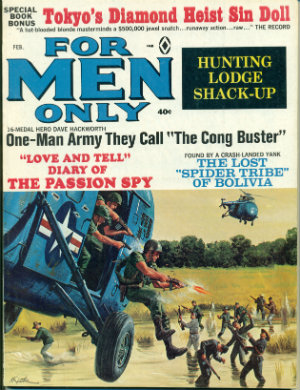 ts promise to Martin Goodman to keep his son Chip installed as titular head of Magazine Management and kicked him out. Martin was furious and vindictively started up a rival publishing company, Atlas/Seaboard, to publish comics to compete with Marvel, but eventually it failed. Chip, with his father’s help, subsequently started up his own company, taking along Stag and reviving the slick men’s magazine Swank, the latter a title Martin Goodman owned and had once published with little success.
ts promise to Martin Goodman to keep his son Chip installed as titular head of Magazine Management and kicked him out. Martin was furious and vindictively started up a rival publishing company, Atlas/Seaboard, to publish comics to compete with Marvel, but eventually it failed. Chip, with his father’s help, subsequently started up his own company, taking along Stag and reviving the slick men’s magazine Swank, the latter a title Martin Goodman owned and had once published with little success.
Meantime, Marvel Comics’ own Stan Lee actually took over as acting president for a while. Stan, nee Stanley Lieber and a cousin-in-law of Martin Goodman, had been with MM for many years. So the comic-book guru actually was my publisher for a short time. I’ll never forget the steady stream of memos in which he never failed to sign off with “Excelsior!”
Incidentally, though it’s not generally known, Stan Lee reportedly did some writing for Martin Goodman’s men’s adventure magazines back in the ’40s.
The Good Ol’ Days
From the summer of 1964 through the rest of the turbulent ’60s, I looked forward to coming to work. Sure, we all knew the days of the men’s adventure magazines were numbered, that we were writing and editing anachronisms. But no one seemed to be worried. For the most part, we were a capable cadre of editors who had fun with the work and who enjoyed the company of each other.
At least once a week, someone would break out a bottle of Scotch from his desk and we’d sit around sipping whiskey and try to solve the world’s problems. There were exceptions, but most of the editors had at least a bachelor’s degree, and the conversations were often quite intellectually stimulating. And the humor…usually dark…gave rise to fits of laughter that echoed into the night.
They were, indeed, the good ol’ days. A pity, though, that no one told us at the time. I’d give anything for a chance to go back and relive those wonderful moments.
The Artists
Today, men’s adventure magazines are a lot more valuable than they were when they were being published. As collectibles, the appeal certainly isn’t the writing, despite many of the stories having been penned by highly successful authors. And it surely isn’t the screaming, sensational headlines that once enticed a monthly readership in the hundreds of thousands. Quite simply, it is the outrageous illustrations.
True, one has to look at the whole package to get a better grasp of the appeal, for it was the whole package that the readers bought. But the fact that a single copy of For Men Only from 1968 sells on eBay today for nearly $40 has to be attributed mainly to the art work.
Scantily clad women prevailed, often rendered in poses that included the bondage tools of ropes and shackles, and always in danger from menacing Nazis, knife-wielding bad guys, or vicious animals. The art was always realistic and painstakingly detailed.
The artists I remember doing the lion’s share of the art for MM included Mort Künstler, Norman Saunders, Earl Norem, Bruce Minney, Gil Cohen and Charles Copeland. There were certainly many others over the years, but these are the guys I’d constantly run into in the hall or in the art department.
Mort Künstler was always one of my favorites. Today, his Civil War paintings command thousands. An excellent book, Jackson & Lee, Legends in Gray, published in 1995 by Rutledge Hill Press, collects many of his finest paintings. Understandably, the book jacket copy pointedly does not mention Mort’s prolific Magazine Management output. (cont. next week) #
The Good Ol’ Days of Men’s Adventure Magazines (2/12/13)
The following is the first part of a long article I wrote for Alter Ego magazine a few years ago, the rights to which I still retain. In it, I reflect on my days during the 1960s and ’70s when I worked as an editor/writer for the now-defunct men’s adventure magazines. At the time, we shared a large suite of Manhattan offices with Marvel Comics. For me, they really were the “good ol’ days,” but no one bothered to tell me at the time. Herewith, Part I:
It was a warm, humid day in June when I climbed the subway steps and made my way west up 59th Street. The year was 1964 and I was headed for 625 Madison Avenue and the offices of Magazine Management.
It had been an eventful year, or as author Jon Margolis, former political reporter for the Chicago Tribune, referred to it in his book, The Last Innocent Year, “the beginning of the ‘sixties.’”
It was the year the Civil Rights Act became law. Cassius Clay beat Sonny Liston. China tested her first atomic bomb. The U.S. Surgeon General warned against cigarette smoking. Nelson Mandela began serving a life sentence for opposing Apartheid. Honda diversified into car production. The World’s Fair opened in New York’s Flushing Meadows. The Berlin Wall went up. Liz Taylor married Richard Burton. Timothy Leary set out on his psychedelic journey. And The Beatles arrived in America.
While young men started burning their draft cards, rioting black men set fire to neighborhoods, and women began to wonder if the male sex was their oppressor, I hurried up 59th Street to keep my own date with destiny. As I neared the corner of 59th and Madison, a pigeon indiscriminately deposited its finest droppings on the sleeve of my new, olive-green lightweight summer suit.
“It’s good luck,” Noah Sarlat responded as I sat in his office a few minutes later, chuckling good-naturedly while I rubbed furiously at the black-and-white splotch with a wet paper towel.
Noah was one of two editorial directors at Magazine Management. I had interviewed with him following a cold call I’d made on the advice of my friends Bob Shea, who had been an associate editor with me at Fawcett’s TRUE Magazine, and Larry Shaw, an editor at Lancer Books.
“I don’t have anything at the moment,” Noah had advised me over the phone, “but I suspect there might be an opening any day now. And sure enough, a few weeks later following the resignation of a young associate editor, Noah called me in for an interview and promptly hired me.
The men’s magazine department was split up into two divisions, with the associate editors divided into two separate “bullpens” of six each, plus one secretary. Noah headed up my group, which consisted of Stag, For Men Only, Complete Man, Action for Men and Sportsman. The other group was presided over by Bruce Jay Friedman and included MALE, MEN, Man’s World and True Action. There were other titles published from time to time, including so-called “annuals” twice a year. These annuals consisted primarily of reprints from the major titles, MALE, MEN, Stag and For Men Only. They were simply repackaged with new titles, different photos and/or art. Blurbs and captions were also rewritten to give the issues a “fresh” look. Action for Men, True Action, Man’s World and Sportsman also ran a lot of recycled material, although some original articles were included.
Noah put me right to work that day, writing blurbs and captions for a four-page Stag spread that featured at least two dozen World War II photos, each demanding a two-line caption. But first he introduced me to Vera Jirsa, managing editor of Stag at the time.
“Vera,” he said, taking the pipe out of his mouth to speak, “will show you where everything is.” He smiled then and added, “But be careful not to show him everything; he’s still wet behind the ears.” [I was 25.] Noah winked at us both then and sauntered back to his office, pleased with his double-entendre. It was the kind of humor we all came to expect from Noah on a daily basis.
Every morning at about 11, with a regularity usually reserved for train schedules, Noah would grab his copy of the New York Herald Tribune and head for the men’s room located outside the suite of offices around the corner from the bank of elevators. “I’m off to the library,” he would announce to Pearl Hammer, his secretary, within earshot of all six editors sitting in the large bullpen area.
But Noah, sophomore humor notwithstanding, had worked at MM for a long time and had come to be known as “Mr. Magazine Management.” It was Noah, more than anyone else, who had devised the way the men’s books were put together, and like Stan Lee with Marvel Comics, he made publisher Martin Goodman (center of photo shown here, with son Chip to his right) a lot of money over the years.
The Magazines
The men’s adventure magazines were offshoots of the old pulps of the ’20s and ’30s. Developed during the 1940s, the books proliferated in the ’50s, appealing primarily to the blue-collar worker. The “meat” of the magazines consisted of stories dealing with man against nature, man against beast, man against man. While some of the material had a basis in fact, most of it was the product of fertile imagination.
World War II, for example, did indeed take place. But later writers like Mario Puzo of Godfather fame, himself a Magazine Management editor for a number of years, would create entirely mythical battles in which he would dream up a cast of hundreds of thousands of nonexistent combatants. And very often, an illustration for just such an article would be assigned and completed before the article was even written.
I remember receiving an assignment from the editor of For Men Only in the form of a title: “Black Beret Raid on the Vietcong’s Nitro Navy.” Less than a week later, before I had even put together a basic plot outline, the editor showed me the finished illustration they had assigned, which would run on the cover of that issue. I made a copy of the illo, took it home and fleshed out a plot, then wrote the story – making sure to include a scene that jived with the illo.
Another favorite staple of the men’s books was people being mauled, bitten or ravaged half to death by armies of ferocious weasels, rabid monkeys or killer boars. Often, the story would involve a “lost jungle tribe.”
Sex had a prominent place in the men’s adventure mags, but until the early to mid-’70s, a lot was promised but none of it fulfilled. For years, one of Martin Goodman’s taboos was using the word “whore” in copy. There was even a brief period of time when he outlawed the use of the word “sex” in titles and blurbs. Try coming up with euphemisms for sex that have the same meaning and impact.
In a nutshell, the sexual content was very tame in the early years. Perhaps in copy one might get away with “… a glimpse of her dark triangle,” but that was about as strong a description as we could use. Cheesecake sets were black-and-white, with no hint of nipples or pubic hair. And if we wanted to use photos in articles with a sexual theme and a nipple happened to be peeking out, our resident retoucher, Murray Shapiro, would airbrush in a bra or something to cover it.
The editors would also have Murray airbrush the faces of various staff members onto the bodies of actors involved in action scenes taken from movie stills. Photos of each of us were used many times as “hero shots.” When there was a new hire, no matter whether it was in editorial, accounting, even the mailroom, a camera was dispatched and a photo taken to be used to depict the next hero G.I., plane-crash survivor or arms smuggler.
And if someone broke a leg skiing, or wound up with his or her arm in a sling after falling from a ladder, poof! went the flash camera.
Later on, toward the end of the ’60s, fewer hero shots were utilized, primarily because one female editor complained when a shot of her and another staffer were used in conjunction with a story showing them as felons who were wanted dead or alive! She worried aloud that someone might recognize her on the street and shoot her.
Another reason, of course, was the eventual fading out of adventure stories and the transformation into skin books. Hero shots simply weren’t needed.
Murray was as good as the editors who gave him instruction. For the most part, editors were responsible for marking up photos with a black or red crayon to indicate what they wanted taken out, altered or added. There were a couple of memorable goofs.
A layout in For Men Only, for example, which used a still from an obscure movie to illustrate a sex exposé, showed two naked women dancing outdoors around a pole. Murray was instructed to put black bars over the nipples, eyes and bare buttocks. Both women had their eyes banded when the issue came out, but one girl had a band over her nipples but no such band over her rear end. The other woman’s backside was dutifully banded, but her nipples were left for all the world to see.
Another classic case of “can’t see the forest for the trees” occurred when a black-and-white cheesecake set was used in Stag. The model was wearing a modest bikini that covered everything we couldn’t show, but apparently the editors, as well as Murray, never paid attention to the carving on the beautiful birch tree she was holding onto in one of her poses. And probably no one on staff ever would have seen it had it not been for a concerned reader who tore out the page and sent it to the editor. Carved into the tree inches from the model’s hands was the crude rendering of a penis, accompanied by a terse, three-word engraved bit of advice about what to do with it.
We didn’t receive a lot of mail from readers, but there were letters from time to time, mostly from World War II vets pointing out discrepancies in some of our facts. Amazingly enough, I don’t recall anyone ever writing in to challenge us on something that was totally fabricated – like my story, “Black Beret Raid on the Vietcong’s Nitro Navy.”
We used to run photo features in all the magazines, utilizing photos from the various wire services like Wide World and UPI (United Press International). One month we ran a photo of a man sliced in half by a train. It wasn’t as gory as it sounds, and the man’s facial features were fairly well indistinguishable, but nevertheless a woman wrote in asking for more details. She was positive it was the body of her missing husband who’d gone out for a can of soup and never returned.
 There never was a strict dress code at MM. During the ’60s, I guess, most of the men on the editorial staff wore ties and slacks, but we eventually discarded our ties and traded in our slacks for jeans. My “uniform,” for the most part, became buttoned-down shirt open at the collar, jeans, and a well-tailored blazer. While actually working in the office, I would hang up the jacket and roll up my sleeves two turns.
There never was a strict dress code at MM. During the ’60s, I guess, most of the men on the editorial staff wore ties and slacks, but we eventually discarded our ties and traded in our slacks for jeans. My “uniform,” for the most part, became buttoned-down shirt open at the collar, jeans, and a well-tailored blazer. While actually working in the office, I would hang up the jacket and roll up my sleeves two turns.
Of course, there was always someone who would abuse the privilege, just as it often happens in today’s enlightened, laid-back office environment. I remember the day one of the younger editors came into the office dribbling a basketball and wearing attention-getting cut-off jeans, sneakers and a T-shirt with a two-word expletive emblazoned across the front.
Chip Goodman, who was running the company at the time, naturally, had a fit. A memo went out immediately. Something to the effect, “While we don’t expect employees to wear white shirts and ties as they do at IBM, certain people have started coming to work looking like they’re on their way to Fire Island. Please understand this is a work environment, a business office, and we all should dress accordingly.”
Later, sometime in the early to mid-’70s, the magazines dropped their adventure themes and morphed almost overnight into slick men’s books with strong sexual content. Those of us who had been “moonlighting” by writing freelance articles on things like “How to Spot the Car-Repair Vultures” and mildly sexual exposé stories, in the evening and on weekends, were handed a new set of rules. Almost abruptly, we were asked to write hard-core porn.
It was one of the most difficult things I’ve ever had to do in publishing. Not that I’m a prude. It was just hard to switch gears and write nothing-left-to-the-imagination smut. Eventually, it became second-nature and I grew quite prolific at the task. Salaries at Magazine Management had always been on the low side, but the lucrative freelance opportunity was basically what kept most of us going for years. Switching to porn was simply not going to deter any of us from continuing to earn a living. (cont. next week) #
My Wife Is a Creative Maniac (2/5/13)
“We’re gonna need a bigger house,” my wife Josephine said to me the other day.
“Why?” I asked, pretending not to know.
“Well, to begin with, I don’t like writing and working on my crafts in the same room.”
“You already have two rooms.”
“One is the display room for my dollhouses and crafts I sell. You know that,” she said defensively. “The other room is for my craft supplies, and for my computer where I write. It’s really too small for both.”
“You’ve got three large walk-in closets in which to store stuff.”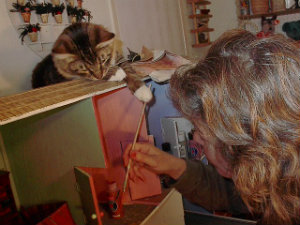
“My clothes and shoes are in two of those closets.” Jo said, growing annoyed. “We also need a room for the cats, for their toys. And I’d like for us to build a series of ramps and ledges and tunnels so they can work off some of that excess energy.”
“First of all,” I snapped back, “we can’t afford any more house than what we already have. Secondly, I’ve got a billion books and eleven bookcases and I make do with one room. And as far as the cats go, they pretty much stay in whichever room you or I are in. If we had a room set aside for them, they’d only be in it if we were there as well.”
“Your room is the largest one we have.”
I ignored her response. “Even if we had an extra room for the cats, which one of us is the carpenter who’s gonna build all those wonderful ramps and tunnels?”
And so Jo dreams, which is okay really. I’d like to have a nice, comfortable couch in my den on which to take naps, and room for a real desk or large table to give me more counter space. But the reality is that each of us has to be able to make the best of what we do have, and be happy with that. There are people elsewhere in the world who barely have a place in which to sleep.
But Jo really does make do with what she has, and her creative side utilizes what most people throw out and turns it into something useful or beautiful. Take boxes, for example.
 When something comes into the house in a box, Jo immediately confiscates the box. She’ll take off one side and top of the box, wallpaper the insides, put carpeting on the bottom “floor,” and then strategically position miniature furniture, wall hangings, flower arrangements, etc. so that she now has a beautiful shadowbox she can sell.
When something comes into the house in a box, Jo immediately confiscates the box. She’ll take off one side and top of the box, wallpaper the insides, put carpeting on the bottom “floor,” and then strategically position miniature furniture, wall hangings, flower arrangements, etc. so that she now has a beautiful shadowbox she can sell.
The only problem is that Jo never sells anything. Oh, once she sold a few handcrafted items on ebay, but she made her pricing so low that it wasn’t cost-effective. Another time, she solicited on craigslist and a woman came over and bought a few items. But Jo never did that again, declaring that she really wasn’t keen on having strangers come into her home.
I remind her from time to time that she keeps making things but doesn’t sell anything, and she just says, “I don’t care. I like looking at the things I make, and displaying all of them.”
Before we left Nevada, Jo had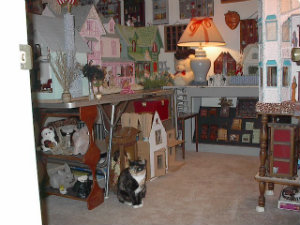 amassed ten dollhouses, most of which were picked up at flea markets or yard sales. They had been in horrible condition, either only half-finished or just in disrepair from neglect. Jo would whip them into shape by making any needed repairs, stuccoing the outer walls, retiling the roof, papering the inside walls, carpeting the floor, etc. She was always threatening to sell them.
amassed ten dollhouses, most of which were picked up at flea markets or yard sales. They had been in horrible condition, either only half-finished or just in disrepair from neglect. Jo would whip them into shape by making any needed repairs, stuccoing the outer walls, retiling the roof, papering the inside walls, carpeting the floor, etc. She was always threatening to sell them.
Then a few weeks before we were ready to move, I made her realize we just couldn’t take all of them. She finally sold or gave away eight of them in desperation. I think it broke her heart.
When we moved back to North Carolina, I found a battered, beat-up, broken-down dollhouse at Smiley's, the local flea market. I was able to get it for a few bucks. It was large and heavy and cumbersome, and I had to carry it across the length of the flea market. It took me at least fifteen minutes. I had to stop a couple of times by resting it on a vendor table be cause some parts of it were sharp and cut into my arms. She’s done wonders with it and it’s almost ready to sell. Of course, I’m sure that won’t happen.
cause some parts of it were sharp and cut into my arms. She’s done wonders with it and it’s almost ready to sell. Of course, I’m sure that won’t happen.
When Jo was still working, the board members in her company would receive boxed Christmas gifts annually. So each year, she would bring home the empty boxes and use them as cubbies in which to store small pieces of various items like wood, acorns, ribbon, etc.
Jo also brought home empty Office Depot boxes from work and stacked them seven boxes high in three rows in her largest closet. She marked the front of each box with a dark crayon to easily indicate the contents, items such as sponges, egg cartons, pieces of Styrofoam, bottle caps, scrap material, corks, etc.
Jo keeps coming up with ideas for using common, everyday, throwaway items and turning them into attractive or useful miniatures for dollhouses. An example would be cutting out the individual egg cups in paper egg cartons and turning them into fruit bowls.
Other examples include:
► corks into miniature lamps
► dried green pepper seeds into potato chips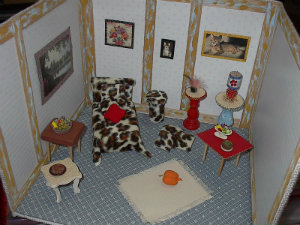
► sliced corks into layer cakes
► manila file folders (crimped) into pie shells
► marbles (wrapped in green crepe paper) into lettuce
► toothpicks into pencils/candles/carrots
► golf tees into table legs
► dried lentils into trays of chocolate chip cookies (laboriously painting black dots on the lentils and then gluing them one-by-one onto buttons) Genius!
► pictures from empty jigsaw puzzle boxes into miniature framed paintings
► sponges and scrap material into beds
► plastic rings and pipe cleaners into wreaths
► broken jewelry beads into miniature jelly apples
► buttons into dishes
► pieces from an old straw hat into wicker table tops
► sea shells into a compote with fruit
► pencil erasers into sliced bologna
Anyway, you get the idea. The only problem with all of this is that Jo keeps moving stuff around. She never seems to be content with the way things are set up. With us men, generally, if we like the way a room is laid out, we are fine with keeping it that way. With women, not so much. I wrote about this need for her to move furniture around a few blogs back. Suffice to say, it never ends.
“I never use my dresser,” Jo said suddenly yesterday. “Maybe we can sell it or give it to Goodwill, then move your dresser into your den. That way, I can move a couple of my dollhouses into the bedroom and I’d have a lot more room to display stuff.”
“No,” I said defiantly, shaking my head.
“Why not?”
“You know why. Think about it some more.”
“Well, it’s a good idea.”
Lunatic. #
Lucy (1/29/13)
Last week I posted the blog entry, “Bad Day in Mills River.” I wrote about a series of annoying events that occurred throughout the day on Sunday, January 20, 2013. In the course of the article, I mentioned a visiting cat upon whom we had bestowed the temporary nickname of “Lucy.” I even included several pictures of her at our screen door.
We had no way of knowing whether she had been abandoned or was lost. She was very playful, and though she probably had reached her full size, I suspect she was not long out of her kittenhood. I doubt she was even a year old. Because of her affectionate and trusting nature, we were convinced that she was not a feral stray, that she had to have been cared for by someone. As a result of that thinking, we placed an ad on craigslist, along with several photos, asking if she was anyone’s lost cat. We had also explained that we already owned three adult indoor cats and would not be able to easily adopt this one into our household, for obvious reasons. We had included our phone number.
There have been no calls to date.
We continued to feed Lucy wet cat food twice a day, with an ever-present pie tin of dry cat food left on our deck right next to a bowl of fresh water. There were a couple of very cold or rainy nights in which we brought Lucy in and segregated her in my bathroom, returning her to the outdoors the following mornings. But for at least the past three weeks, she has been free to roam wherever the mood suited her, knowing she would be fed regularly.
She was a talker, meowing continuously in a friendly kind of way. And when I picked her up 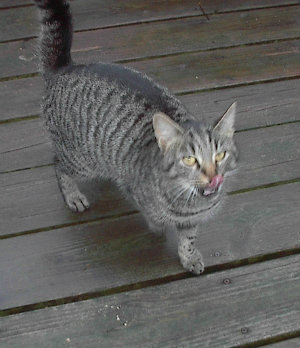 and rubbed her head, she would break into a loud purr. When I would walk from the deck to the driveway, she would scoot ahead and throw herself right smack in front of me, rolling over on her back and meowing back up at me as if to say, “C’mon, let’s play.” She would do this over and over again until we reached the driveway and my car.
and rubbed her head, she would break into a loud purr. When I would walk from the deck to the driveway, she would scoot ahead and throw herself right smack in front of me, rolling over on her back and meowing back up at me as if to say, “C’mon, let’s play.” She would do this over and over again until we reached the driveway and my car.
I would worry as I turned on the car that she might place herself in harm’s way where I couldn’t see her, but she always managed to stand clear while I drove away. When I returned, she would always be there to greet me, alerting me to her presence with her characteristic running meow before I could actually see her. And then, as I walked back to the house, she would again resume her by then familiar dart-ahead-stop-in-front-of-me-and-roll-over-on-her-back routine. And always with her unique feline running commentary. It didn’t take long for us to bond.
Meantime, Josephine stayed on the computer, laboriously searching website after website to see if anyone had lost a young tabby. We had determined that she was a female, and after discovering her prominent pink nipples, surmised she might even be pregnant, which would explain her ravenous appetite. She could polish off a can of cat food faster than any cat I’ve ever known, and believe me, I’ve known a lot of cats.
Jo also researched the area, looking for a no-kill animal shelter to which we might bring Lucy for potential adoption. She found only one, which was in another county. She called them and was politely told that we would have to find a facility in our own county.
On Wednesday, January 23, Jo and I spent all morning in heated argument over whether to bring Lucy to a shelter in our county where they would check her for a microchip. If the shelter did not find a chip, and she had no serious diseases, they would try to find a home for her. But they also said that if they could not place a cat within a certain amount of time, they might have to be euthanized.
I refused to take the orphaned feline to any facility that might possibly kill an animal. And even if it were a no-kill shelter, I am not an advocate of an animal spending the rest of its life in a cage. There was silence between us after that.
Until the unexpected knock on the door sometime in the early afternoon.
It was a young man who wanted to know if the cat they found lying in the street in front of our home was ours. Jo ran out with him to the street, while I trailed slightly behind them, refusing to acknowledge what I think I heard.
The man’s companion, a young woman, held a lifeless cat in her arms. I stayed back, unable to continue forward as Jo began sobbing. The woman was talking softly, explaining how they had just driven around the bend in the road and had seen the cat lying in a pool of blood. “It must have just happened,” she said.
“Is she…is she dead?” I heard a voice ask, not fully realizing it was mine. The woman nodded.
I wept uncontrollably.
After a few minutes, I had the woman bring the lifeless body around to the front of the house and put her down on the ground under the deck. What happened next is kind of a blur. I know we thanked the young couple for bringing the cat in from the street, and telling them that we would take it from there.
Grief then, and that empty helplessness that follows a heartfelt loss.
Goodbye, sweet Lucy #
Bad Day in Mills River (1/22/13)
Have you ever had one of those days when everything went wrong? I don’t mean one or two things; I mean everything? Sunday, January 20, 2013, was one of those days for me.
As I usually do, I swung my legs out of bed and toe-poked around for my slippers. Instead of my slippers, though, I managed to land both feet in a small puddle of unattributed cat vomit. It was an ominous start to an already expected difficult day.
I grabbed a handful of tissues from the box on the table beside the bed and cleaned the offending residue off my feet, and then put on my slippers. I made a mental note to return and clean the carpet after Josephine got up and I could turn the light on.
I padded into the bathroom and quickly prepared for the day. Sparky, our 10-year-old tabby/Maine Coon, reminded me it was breakfast time. I went into the kitchen and put on the coffee, then spooned out four small dishes of cat food. By then Cali, our calico, and Cisco, our full-blooded Bengal, had joined us in the kitchen.
While the three hungry cats ate their food eagerly, I brought another plate of food out to the deck where our visiting tabby was waiting impatiently. She cried incessantly until I put the dish 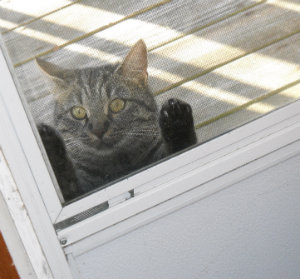 down on the deck, which she then attacked hungrily. Not knowing whether the cat had been abandoned or was lost, we had given her a temporary nickname of "Lucy.” Her affectionate and trusting nature convinced us she was not feral.
down on the deck, which she then attacked hungrily. Not knowing whether the cat had been abandoned or was lost, we had given her a temporary nickname of "Lucy.” Her affectionate and trusting nature convinced us she was not feral.
I went back inside and poured a cup of coffee, reviewing Saturday’s events and what I still had to do that Sunday. As an older diabetic taking a number of prescription medications, I usually wound up in Medicare’s so-called "gap” by September. I knew my three-month supply of two kinds of expensive insulin would most likely be used up before the year ended, so as an alternative to refilling the mail-order Rx at "gap" prices, I had secured a prescription from my doctor to purchase just one vial at a time from the local pharmacy to tide me over until 2013. However, a lunchtime injection had been added to my regimen, which resulted in the extra vial being depleted faster than I had expected.
Worrying that I might not have enough insulin to last until I received my new mail-order package, I called the mail-order pharmacy to find out when I could expect delivery. They confirmed the order had been approved by the insurance company that complements Medicare, but said it had not gone out at that point. Remembering the Monday holiday, it was obvious I wouldn’t get it until Thursday at best. They suggested I call the insurance company.
I called the insurance company and sparred angrily with the robot at the other end of the line.
"Representative,” I said.
"In as few words as possible, please tell me what your inquiry is about.”
"Representative! I need to speak to a representative!”
"I’m sorry. I was unable to understand your response. Please say or key on your phone–"
"Dammit! Representative!”
"I’m sorry. Your response was not understood. I will connect you with one of our representatives. Please wait for the next available representative.” Music.
Finally, I was connected to a woman with a tiny voice. "May I have your full name and account number.”
"I’m sorry, I can barely hear you.”
"I need your full name and account number,” the woman said, practically yelling and clearly annoyed.
I responded, telling her of my situation and how the mail-order medicine had been approved. I asked if I could purchase another vial of insulin and still be covered by insurance without having to pay full retail. She asked me to hold. Music.
Ten minutes passed. Click. Dial tone. We had been disconnected.
I went through it all again, screaming at the robot and explaining to a new person all over again about my problem. Finally, I was told there shouldn’t be any trouble. I used the pharmacy's automatic refill service to order the insulin and an eye drop medication that was very low.
 On Sunday, as I was getting dressed to drive to the drugstore, the phone rang. A recorded message informed me that there was a problem with my refill order and that they had to get in touch with my insurance company.
On Sunday, as I was getting dressed to drive to the drugstore, the phone rang. A recorded message informed me that there was a problem with my refill order and that they had to get in touch with my insurance company.
I called the pharmacy right back and got their robot. "Push one if you want to leave a message for the pharmacist,” the robot said. I hit one and explained how I had called the insurance company the day before and that they had assured me there would be no problem. Please let me know this will be okay.”
I waited for more than an hour for a call-back from the pharmacist. Nothing.
Finally, after two hours had passed, I decided to call them back. I tried to dial but kept getting an odd beeping sound. I could not get a dial tone. By now, I was totally frustrated. I went to Josephine and begged her to help. "The phone is not working,” I said. "Could you call the phone company for me and find out what the problem is? I’ve had it up to here with robots.”
Jo checked both phones, determined there was a problem, and turned on her cell phone. I watched her face turn crimson as she parried with the robot. When she finally did get a representative, the woman informed Jo they had checked all the lines and that it was not an outside problem. Therefore, she said, it’s an inside wiring problem and we were not covered for that. The cost for sending a repairman out would be $85.00.
I was livid. I yelled I would cancel the land line altogether before I’d pay a phone repairman. Jo shushed me as she put the representative on hold and decided to check all the wiring we could see. It was a crawling-around-on-hands-and-knees exercise and not the easiest thing for us old folk.
While Jo did that, I turned on my cell phone and left a second message for the pharmacist, explaining about the dead phone and that he/she should call me back on my cell. She did. “I spoke to the insurance company,” the soft-spoken pharmacist said, “and they did an override on the pending prescription. You can come in and pick it up anytime.”
The phone rep had told Jo someone more knowledgeable would call back on her cell and discuss the problem with her. Meantime, I realized it was way past lunchtime. I made a sandwich, injected insulin, and sat down to watch TV while I ate.
The television would not go on.
I finished eating and got down on my hands and knees and rooted around in all the complex wiring behind the flat-screen. It had to be a lack of power, I decided. I pushed one end of a 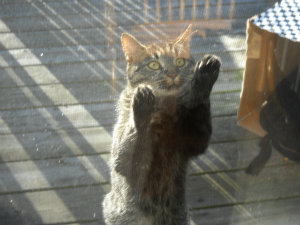 long button on the surge protector and the screen lit up. Obviously, a cat had somehow managed to turn off the power to the TV.
long button on the surge protector and the screen lit up. Obviously, a cat had somehow managed to turn off the power to the TV.
And the land line now had a dial tone.
I drove to the drugstore and picked up my prescriptions. When I got back, "Lucy” was clinging to the screen door with all four paws. I almost avoided getting scratched as I extricated her from the screen. I calmed her down and assured the hungry feline I would feed her again later.
When I got inside, I discovered that Cali had thrown up in the dining room in three different places on the carpet. This reminded me of the vomit in the bedroom and I went about cleaning up everything. I also remembered to pour hydrogen peroxide on the cat scratch.
The squirrels were now on the deck, running around the banisters looking for peanuts I had forgotten to purchase. I started to write myself a note to buy peanuts, but the pen ran out of ink. At about the same time, Jo yelled that there was an error message on the computer. And Lucy had again adhered herself with all four paws to the screen door. While I pondered which problem to tackle first, Sparky threw up on the carpet in the living room.
It was time to take a nap and wait for another day to come. This one wasn’t gonna quit. #
A Break in the Routine (1/15/13)
It happened during the winter of 2010-2011, right after Christmas. I believe it was the second of four significant snowstorms we had that year. We had enjoyed Christmas Eve with Jo’s family and the grandchildren, and the next day, Christmas, it snowed hard and for a long time. There was at least a foot of snow by the time it was over.
It wasn’t until Wednesday morning, December 29 and garbage pickup day, that I bothered shoveling a path out to the cars in the driveway. I then shoveled another path from the back of the house where we keep the garbage cans to the beginning of the driveway. I wheeled the two trash cans out to the street and then started walking back down the driveway, which is on an incline.
Suddenly, without warning, I slipped on some hidden ice beneath the snow and my legs went out from under me. When I landed, my left leg had folded up under me in a very unnatural way. I knew right away I was in trouble.
I tried to move, but the pain was intense.
“Jo,” I yelled weakly, knowing full well that my wife wouldn’t be able to hear me inside the house. I tried a feeble “Help!” But I also knew how futile that was. The nearest neighbor was across the street and high up on a hill. Unless they were actually outside, no way they could hear me. All I could think of at the time was: If a tree falls in the forest and there’s no one…
I lay there in the snow for a while, listening to the eerie quiet around me. I realized I would have to either get up by myself or eventually freeze to death. The pain in my ankle kept me fully alert. I reached down, unlaced the boot and pulled at my sock. The sight of my now black and blue and purple ankle, which had swelled up to the size of a baseball, almost made me faint.
I laced the boot back up and slowly, with great effort, somehow managed to get to my feet. Favoring the injured ankle, I limped back down the shoveled path and into the house. I yelled to Josephine that I was hurt as I eased myself down on the sofa.
“That’s broken!” Jo declared after a brief examination. “We’ve got to get you to urgent care right away!” Her authoritative tone would have convinced anyone that her medical license was hanging on the wall.
I insisted I eat breakfast first, reminding Jo of my diabetes. “Who knows how long we’ll be there,” I said rhetorically.
It was at least two hours from the time I fell before my ankle was finally X-rayed and I was examined by a doctor at the Sisters of Mercy Urgent Care facility. Indeed, I not only had broken the ankle, but in two places.“They’re clean breaks,”  the female doctor said to me. “We’ll make an appointment for you with an orthopedic surgeon, but I don’t think you’ll require surgery. Meantime, we’ll give you a script for the pain.”
the female doctor said to me. “We’ll make an appointment for you with an orthopedic surgeon, but I don’t think you’ll require surgery. Meantime, we’ll give you a script for the pain.”
I handled the crutches as if I’d been using them all my life. “Piece of cake,” I said to Jo. But it was not so easy getting up the steps to the deck and the front door. Once inside, I started moving around quickly.
“Be careful on those,” Jo warned. “You don’t wanna fall again.”
“I didn’t fall,” I said defensively. “I slipped on the freakin’ ice.” I hurried into my bathroom then, moving much faster than I should. Next thing I knew, the crutches had slipped out from under my arms and I was crashing headlong into the bathroom door jamb. I went down with a heavy thud. My scraped hand was bleeding from trying to break my fall as Jo came running in, horror etched in her face.
“Are you all right?” When I mumbled that I was okay, Jo picked up the crutches and helped me to stand. “Didn’t I warn you?” she admonished.
“I’m gonna need more pain pills.”
The earliest appointment I could get was the following Monday, January 3, 2011, at 3 p.m. Following more X-rays of the ankle, Dr. Brooks came in and took a long look at the injury. “I really want to operate,” he finally said.
There was a long pause before he spoke again, giving me ample time to let my imagination run wild. I envisioned the hospital operating room, the surgeons, the attending nurses, the bright lights, the anesthesia….
“But I’m going to hold off for now.” The doctor’s voice brought me back to reality. “Wha-what?” I stammered.
“We’ll put you in a cast for now and see how it goes.” After he left the room, his assistant asked me what color cast I wanted. We settled on green.
The next appointment was for the following Monday, January 10. However, we were hit with another snowstorm and the appointment was postponed until Friday, the 14th. The pain was more intense at night for some reason, but the pills managed to get me through it all.
On the 14th, we arrived at the orthopedic center. After signing in, we were told to take a seat in the crowded waiting room. It was obvious that the snowstorms and the accompanying ice had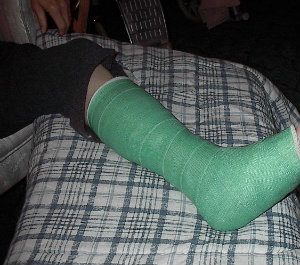 taken its toll. Jo headed toward two empty chairs and I followed a few steps behind, fumbling with the crutches.
taken its toll. Jo headed toward two empty chairs and I followed a few steps behind, fumbling with the crutches.
I’m not sure how or why I suddenly lost my balance and found myself pitching forward again, falling as if in slow motion. I yelled Jo’s name. She turned and lunged toward me to break my fall. We both went down, crashing to a heap on the waiting-room floor. There was a loud, collective gasp from the clerical staff and the other patients in the room. Jo and I looked at each other, quickly concluding we hadn’t broken any more bones. We began laughing uncontrollably. A nurse came out as several other people came to our aid and helped us to our feet. We couldn’t stop laughing at the absurdity of the scene.
Needless to say, we were asked to sign a release and promptly taken in to see the doctor.
After that, there were months of slow healing, along with a few more cast changes and X-rays. And thank goodness for the pee jar.
Jo’s son Brian brought over a walker and wheelchair for me to use. He had purchased these second-hand after he had broken his leg in a sports accident a few years before. I gave up the crutches for the wheelchair first, then the walker to get around the house. But when I had to visit the doctor’s office, getting up and down the stairs from the deck was not so easy. Jo rigged up blankets for me so that I could sit down and ease myself to ground level step by step.
Later on, I had to wear a special boot for a month or so, but eventually my bones healed. The ligaments, however, were another story. It took at least a year for them to get back to normal.
It didn’t snow at all this past winter, but we’re ready for it this year. And if and when it comes, I’m staying indoors until it bloody well melts. #
“You Oughtta Be in Politics!” (1/8/13)
That’s what my wife Josephine said to me the other day. I had been watching CNN and the way each politician tried to out-talk the other on how to fix the fiscal crisis we have in this country.
“Well, we’ve got to do something about government spending in this country,” said one resolute Republican. “And I’m talking about entitlements, damn it. Medicare and Social Security are eating us alive.”
“What are you suggesting, Congressman?” asked the host.
“Well, to start with, even the president is agreeable to adjusting the way we arrive at the CPI for determining COLAs for Social Security.”
“Sonofabitch!” I said loudly, responding to the talking heads on the TV screen. “Now they want to put the burden of fixing this country’s economic mess on the backs of seniors and the disabled. The friggin’ way they figure cost-of-living increases for Social Security isn’t realistic in the first place, and now they wanna make it worse for us!”
“Stay calm, honey,” she said. “Your blood pressure–”
“Screw my blood pressure. Social Security shouldn’t ever be in the discussion about debt ceilings and national budget deficits. We’d be fine if the government hadn’t helped itself to the Social Security Trust Fund long ago.”
I referred Jo to some of what Sen. Don Riegle and Lori Hansen Riegle wrote in April 2011, which can be read online in full in the politics section of the Huffington Post:
Social Security is self-financed, cannot borrow, spends less than 1 percent on its administrative costs, has a $2.6 trillion surplus that will continue to grow for a number of years, and is off-budget. It does not contribute to the federal deficit or the debt. The Social Security surplus is invested in U.S. Treasuries, which enables the federal government to borrow less from other sources. The government borrows these Social Security funds to pay for other government spending – but is obligated to pay interest on these borrowings – and pay back the borrowed funds in full when they are needed by Social Security for benefit payments.
Opponents of Social Security obscure the real facts. The planned build-up of the Social Security Trust Funds since 1983 makes it clear that Social Security has a $2.6 trillion surplus today that will continue to grow.
Another argument made by Social Security opponents to raise fear about the national debt is how much our government has borrowed from China. They never mention how much our government has borrowed from Social Security. In fact, the government has borrowed more from the Social Security surplus than it has from any other source in the world, including China. As a result, Social Security now "owns" nearly 18 percent of the federal debt, making it the largest single holder of U.S. debt. The government owes almost twice as much to Social Security as it does to China and Hong Kong.
“So what would you do if you could go to Washington and take part in the legislative process?” Jo asked wryly.
“There are smarter, more experienced people than I who can figure it all out. But I certainly wouldn’t start by hurting this country’s seniors. They’ve already pushed the eligibility age back for full Social Security, and it should be the same for Medicare. But don’t talk about cutting benefits once a person has 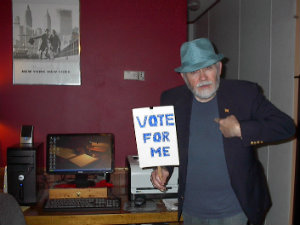 reached the qualifying age. We’ve all contributed to these programs for decades. It’s our damn money.
reached the qualifying age. We’ve all contributed to these programs for decades. It’s our damn money.
“You know, if the House and Senate were placed on Social Security and Medicare along with the rest of us, I bet these programs would be problem-free in less time than it takes to arrange a congressional junket.
“We got this country on an even keel when Bill Clinton was in charge, and even built up a surplus. If we did it once, we can do it again. Two needless wars still not paid for doesn’t help the federal budget either.
“Yes, we have to curtail spending, but not on things that are essential to the growth and prosperity of the country. Trim back the excess, the waste, but invest more in education and infrastructure.”
“How about coming up with new ideas to help us, the real middle-class who got old,” Jo said.
“Well, if I had the power, I really would insist that everyone in government be part of Medicare and Social Security.”
“Anything else?”
“Yeah. I’d allow exemptions for household pets on one’s income tax. Of course, there’d be a limit as to how many pets one can own.”
“All pets? Even, say, a goat?” Jo was laughing now.
“Baaa!” #
Resolution Solution (1/1/13)
At the start of every new year, many people, male and female, resign themselves to doing something, or not doing something, that will result in improving their health, their appearance, or their morale. Or all of the above. It’s been going on for as long as I can remember. As the old gag goes:
“I quit smoking.”
“You did?”
“Yes, and I’m gonna do it again in the morning.”
Of all the New Year’s resolutions made over the years, quitting smoking and dieting to lose weight are probably the top two mindsets made by men and women. I’ve done both. When I was younger, which was a long time ago, my weight would fluctuate up and down. This actually began after I got married and settled down into a routine that included regular meals. I would resolve on the first of the year to lose weight, and I would successfully diet down to my goal. And then slowly the pounds would return, and in a couple of years, I would again set forth my New Year’s resolution to lose weight, and again it was Groundhog Day all over again.
I also smoked like the proverbial chimney. Close to three packs a day.
I didn’t inhale much. It was more of an oral habit, chain-smoking one after the other. And for most of those years, I never bothered with filtered cigarettes. I just kept one going and letting it hang out of my mouth, gangster-style. I was Joe Cool, I thought. Real grown-up. Never mind the discomfort to my eye from  the constant slipstream of smoke. Illustrating this is the photo shown here, taken in 1961. I was with my two brothers, Edward, wearing a motorcycle jacket, and Jonathan. I was 22 and still letting that cigarette hang out of my mouth. Not cool.
the constant slipstream of smoke. Illustrating this is the photo shown here, taken in 1961. I was with my two brothers, Edward, wearing a motorcycle jacket, and Jonathan. I was 22 and still letting that cigarette hang out of my mouth. Not cool.
I probably tried my first cigarette when I was 11 or 12. My first memory of this was going into the woods with a young buddy of mine who had managed to swipe a pack of Viceroys, from where I’m not sure. We thought it was so great, even though both of us couldn’t stop coughing after taking the first drag. Reflecting on this now, I suppose I should be thankful that my first cigarette was filtered.
These were isolated incidents, to be sure. But when I had reached the ripe old age of 16, smoking had become a regular habit. And when I joined the Navy at 17, cigarettes were a given for almost everyone. And the Navy seemed to encourage it. When I went to sea aboard a destroyer, cruising beyond the three-mile limit, the ship’s store was permitted to sell what were called “sea stores.” These were duty-free cigarettes that in the 1950s sold for a dollar a carton. And if you smoked the smaller butts such as Lucky Strike, Camels, or Chesterfield regulars, you had only to shell out 85 cents for the 10-pack carton.
And if you had the misfortune to wind up in a Naval hospital for whatever reason, the Red Cross came in and handed you packs of Old Gold, for free!
In 1985, as part of a routine physical exam by my regular GP, I blew into a machine that assessed the condition of my lungs at the time. I was 46 years old and I hadn’t fared too well.
“You have diminished lung capacity,” the doctor told me. “The beginnings of emphysema.”
“What does that mean?”
“You’re a smart guy. You figure it out.”
And I did. I walked out of the doctor’s office that day and never smoked again. Not even a “last cigarette.” I had always said I would stop smoking if anyone could prove to me that it was hurting my health. I didn’t wait for New Year’s; there wasn’t time.
Oh, it wasn’t that easy. At first, I constantly chewed on pencils as a substitute, to the point of almost getting lead poisoning. I finally resorted to chewing sugar-free gum, a habit up to that point in my life I had always abhorred. It worked. It satisfied the oral craving I had, although the sweetener used in the gum produced in me a constant barrage of flatulence that was far from socially acceptable.
Eventually, I chewed less and less gum, and finally halted that behavior as well.
My wife Josephine is finding the cigarette addiction a lot more challenging. With her, nicotine was the devil that had taken control. Setting forth New Year’s resolutions to stop smoking had been unsuccessfully tried a number of times by Jo. She even tried acupuncture after hypnosis didn’t work. As she recounted to me, “It just might have worked if I hadn’t been left alone in that room with all those long needles sticking out of me, and my not understanding how the tingling sensation and my feeling as though I were going to pass out was a normal reaction. But this hadn’t been explained to me and I’d panicked.”
When Jo and I were publishing the monthly seniors tabloid, 39 Plus, I continually tried to get her to stop smoking. I pleaded, I cajoled, I even threatened. It all fell on deaf ears. She eventually tried the nicotine patch system, and indeed she did not pick up a cigarette for three months while she was on it. But very soon after she stopped the patches, she started smoking again.
Finally, several years after we had relocated to Las Vegas, I even shelled out $300 I couldn’t afford for a laser treatment that seemed to work. The air in the house was clean for the first time. I was thrilled, but Jo was concerned that she had started gaining weight and her clothes didn’t fit. Still, she seemed to have finally beaten the addiction.
And then one day I got home early from work and decided to surprise her at the local casino, which she visited occasionally after her workday was over. And there she was, jabbing buttons on a gleaming silver machine with one hand, and two-fingering a cigarette at arm’s length with the other.
I stood there transfixed, mouth wide open. “What the hell is that?” I said accusingly.
Jo turned then and registered surprise, her face turning crimson as she squished the cigarette into the ashtray. “Honey, this is not what it looks like.”
I broke up, unable to stop from laughing at the familiar line of denial heard in so many movies for reasons not relating to smoking. When I finally stopped laughing, I said to Jo accusingly, "You're smoking again!"
"I don't smoke," she declared defensively. "I puff."
"What?"
"I count the number of cigarettes I smoke, and the number of puffs on each one."
"And do you have a self-imposed limit of puffs?"
"Yes. Two, three at the most," she said.
The upshot is that today, although not completely free of the devil nicotine, Jo has managed to cut back her consumption from two packs a day to about nine or 10 daily cigarettes. Trying to hide it from me actually taught her how she could manage on less.
When this blog goes online, Jo will have begun her next resolution to again cut her tobacco consumption in half.
Conversely, I am still a nonsmoker. But since returning to North Carolina two and a half years ago, I have managed to put on about 20 pounds I really don’t want or need. On the morning of New Year’s Day 2013, I will once again resolve to shed those 20 excess pounds.
And if that doesn’t work, I’ll do it again on the morning of New Year’s Day 2014. #
Pause for Thought, Paws for Adventure (12/25/12)
It’s time to write this last column of 2012 and I’m not sure what the topic should be since my head is still spinning from the events of the last few weeks. I’ll probably revisit some of the things I’ve written about since I started this blog, but I do have a few more thoughts on the gun violence that has ripped through this country.
Listening to the NRA spokespersons finally “contributing” to the dialogue concerning the horrendous murders by gun in Newtown, Connecticut, I find myself, in my sadness, experiencing anger, outrage and disbelief in their asinine comments. When they speak of so-called solutions to the continuing multi-murder free-for-alls that have become regular occurrences in this country and what we can do to stop them, they very pointedly leave out the common denominator: guns.
They speak of mental health databases, arming (gasp!) teachers, or putting armed guards in every school, everything except shutting down the supply of assault weapons that make mass murder as easy as writing your name on the blackboard.
Banning assault weapons doesn’t work, they say. Everyone has the right to own these military-style weapons, they say. It’s the Second Amendment, they say.
Bullfeathers!
First of all, when the Second Amendment was introduced, it was about the right to arm local militia. The original wording: A well regulated Militia, being necessary to the security of a free State, the right of the people to keep and bear Arms, shall not be infringed. Then, a few years ago, in 2008, and again in 2010, the Supreme Court, in a landmark decision, ruled that it was the right of every U.S. citizen to possess a gun with which to defend his home and family. The Court ruled that the Second Amendment protects an individual's right to possess a firearm, unconnected to service in a militia, and to use that arm for traditionally lawful purposes, such as self-defense within the home.
I don’t have a problem with this part. What I have a problem with is that now, today, millions of ordinary citizens own at least one semiautomatic weapon, and millions more own multiple semiautomatic guns. What happened?
We banned assault weapons in 1994, and the gun lobby, namely the NRA, said the legislation didn’t work. In 2004, the loophole-filled ban expired. No one really worked very hard to renew it.
It’s time to look at the legislation again, get some teeth into it and get rid of the loopholes. Don’t tell me it won’t work. Look at Australia, at the United Kingdom, and at many other countries. It won’t be perfect, but it will be a start. We’ve got to do something to stop the killing.
Okay, I’ll get off the soap box. Jo reminded me that it’s Christmas.
Looking back on this year, I’ve written on many subjects, more than a few having to do with free-wheeling, frolicking felines.
In “Cross-Country Kitties” (4/24), I expounded on our three adventuresome cats who accompanied Jo and I on our 2,100-mile journey from Nevada to North Carolina. I recounted how Cisco, our full-blooded Bengal, found his way through a small hole in a motel room wall and escaped into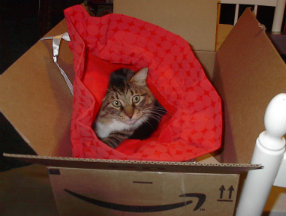 the inner recesses of a dual-level passageway of exposed pipes, plumbing fixtures and spider webs that wound its way through the large complex of 200 rooms. Sparky had followed right behind him. It took most of the night before the two decided to return, displaying total indifference to our mental state of near collapse.
the inner recesses of a dual-level passageway of exposed pipes, plumbing fixtures and spider webs that wound its way through the large complex of 200 rooms. Sparky had followed right behind him. It took most of the night before the two decided to return, displaying total indifference to our mental state of near collapse.
In “Cat Tales” (5/22), I wrote in general about the virtues and not-so-virtuous habits and traits of the more than 86 million cats held as pets in this country.
In “Pets R Us” (7/10), I recounted the many and varied pets I have had through the years, from puppies to ducks to tadpoles to fish to cats – many, many cats.
In “Cats Will Be Cats” (10/2), I extolled the positive sides of our three cats, including their fastidious litter-box habits. I also wrote about their idiosyncratic movements as well.
In “Of Mice and Men, and Snakes” (11/27), I explained how our cats became “watch-cats,” alerting us to the invasion of field mice in our home. I wrote about how they gathered in front of the lower kitchen cabinets, indicating with turned-up noses and twitching whiskers, and accompanied by hearty meows, that we had several mice snared on sticky traps deep inside the cabinets.
In “Critter Jitters” (12/4), I wrote about a guest cat that visits us daily, expecting and receiving ample nourishment. I also wrote about other local critters, from creepy spiders, wily white squirrels, rascally raccoons, testy turtles, lurking lizards, and blue-tailed skinks.
And just two weeks ago, on 12/11, I told you all about “Sparky and the White Christmas Tree.”
There were many other themes on which I elaborated, but if you’re new here, I’ll let you discover them for yourselves. Meantime, Jo and I wish everyone a very Merry Christmas and, please, a Happy and Joyous New Year. #
How Many Innocent Children Have to Die Before We Act? (12/18/12)
I can’t bear to repeat here the grisly details of the senseless murders that took place a few days ago in an elementary school in Newtown, Connecticut. Murders committed by one deranged young man armed with a high-power, semiautomatic Bushmaster assault rifle and two semiautomatic handguns.
The entire world now mourns the school’s six adult women and 20 innocent young children, plus the shooter’s mother, whose lives were abruptly snuffed out. And while investigators pore through the evidence in an attempt to come up with answers as to why this horrific tragedy took place, many others are asking themselves: How are we going to put an end to the mass-murder cycle that seems to be on an alarming increase in the United States?
asking themselves: How are we going to put an end to the mass-murder cycle that seems to be on an alarming increase in the United States?
No fewer than 15 multiple-victim shooting incidents have gone down so far this year. Besides the horrendous rampage in Newtown, Connecticut, four others stand out as among the worst in recent memory.
On February 27, a former classmate at Chardon High School in Chardon, Ohio, randomly opened fire, killing three students and injuring six.
On April 2, a lone gunman shot seven people to death and injured three at a small Christian college in Oakland, California.
On July 20, during a midnight screening of a new Batman film, The Dark Night Rises, a gunman opened fire on the audience in the crowded Aurora, Colorado, theater, killing 12 people and injuring 38. He reportedly might have killed more if his semiautomatic assault rifle hadn’t malfunctioned.
On August 5, a gunman opened fire at a Sikh temple in Oak Creek, Wisconsin, killing six people and wounding four.
All of which poses the never-ending question: How many people, how many children have to die at the hands of mentally impaired gunmen armed with military weapons manufactured for purposes of war?
A case in favor of stricter gun laws can be found in another country that had similar problems with high-power weapons so readily available. Following a mass shooting in 1996, Australia put into place a set of strict gun laws. It hasn’t experienced a similar massacre in the 16 years since. And that certainly isn’t because the whacko count is so much lower in the land down under.
I know many will disagree with me and spout the familiar chestnut, “Guns don’t kill people, people kill people.”
While I agree that guns can’t kill people by themselves, guns, particularly automatic and semiautomatic weapons, give people the ability to kill easier and faster.
Now, I’m not advocating taking away a person’s right to own a gun. I, too, respect and believe in upholding the Second Amendment. But when that was conceived so many years ago, no one at the time could even imagine the weaponry that would be developed.
We know it’s a complex issue, but spare us the political rhetoric. Plain common sense and decisive movement to protect our citizens, especially our children, are what is needed now.
Lawmakers in Congress need to step away from the gun lobbyists and take another look at the carnage that has occurred in this country in just this past year alone. They need to take a long, hard look at the laws put into place in Australia.
We cannot allow one more senseless mass murder of innocent men, women or children to occur. It is time to take action.
Please. #
Sparky and the White Christmas Tree (12/11/12)
Finding Sparky was a fluke.
We had gone into the Las Vegas PetSmart in the spring of 2002 for the sole purpose of purchasing canned fo od for our two cats, Ashley and Cricket. We had just lost our beloved Bratly in January of that year, the victim of a thyroid storm.
od for our two cats, Ashley and Cricket. We had just lost our beloved Bratly in January of that year, the victim of a thyroid storm.
As we made our way through the store, we heard the loud, plaintive cries of what sounded like a kitten. They emanated from a box a woman was carrying as she headed toward the adoption services located at the back of the store.
He was the most adorable kitten we had ever seen.
“Excuse me,” I said to the woman who was desperately trying to coax the little guy into quieting down. “Are you bringing him in or taking him out?”
“I’m bringing him in,” she said. “We can’t keep him. I have three dogs and two cats already. We found him being tossed around like a football by some neighborhood kids. Why? Would you be interested in taking him?”
And that’s how we found Sparky. He never made it into the system. Of course, we did have to have him examined by our vet, receive all of the necessary shots, and eventually get fixed.
Sparky was a handful from the beginning. He seemingly had no fear of anything. Ashley was a rescued feral cat who wouldn’t let anyone pick her up, but Sparky got along fine with her, and with Cricket, another rescued cat. However, Sparky considered himself the alpha right from the start. Never mind that both Ashley and Cricket had tenure on him, and were older.
He was into everything.
The usual rule is that when a kitten enters the home for the first time, he is supposed to be isolated, allowing others to sniff him and get used to his scent, and he theirs. But Sparky would have none of that. Within an hour of his arrival, he had explored every nook and cranny of every room in the five-bedroom house. Bathrooms, closets, no area was overlooked by Sparky.
"Curiosity killed the cat" is a cliché for good reason. Cats are just too nosy for their own good. No one personifies this inquisitiveness more than  Sparky. He just has to examine and sniff everything that enters the home, whether it's a person or an object.
Sparky. He just has to examine and sniff everything that enters the home, whether it's a person or an object.
And as with most felines, any container brought into the house – grocery bags, boxes, even an empty Priority box from the U.S. Postal Service – becomes way too much of an enticement for Sparky and he will try to crawl into it. It makes no difference whether it's large enough or not. If there's an opening, Sparky will make every attempt to place himself inside it.
And then there was the white Christmas tree.
When we arrived in Las Vegas in the fall of 1996, coming from western North Carolina, we no longer had the notion of having a live tree, although Josephine and I had always had a live tree before we moved to this warm, dry climate. We both soon discovered that each of us separately had always fantasized about an artificial white tree, and so we bought one, choosing red and blue as the primary colors for the ball ornaments.
It was beautiful, and none of the cats did anything to harm it. Oh, to be sure, cats will be cats and from one year to the next, one of the cats would knock an ornament from a branch and 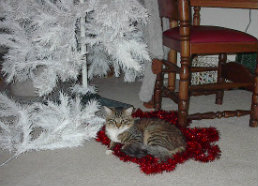 bat it around playfully. But that was the extent of it.
bat it around playfully. But that was the extent of it.
Until 2002 and Sparky’s first Christmas.
Sparky evidently saw the tree as his private playground, his own personal mountain to climb and conquer. Slowly but surely, no matter how much we tried to discourage it, Sparky would run up the middle of the tree and “nest” in one of the branches. Which might have been okay if he had been content to do only that. But Sparky had other plans.
That first year of Sparky’s arrival, he managed to dislodge branch after branch from the tree. He would run into and up the tree, nesting at different times on differen t branches, his weight eventually bending and snapping them off one by one.
t branches, his weight eventually bending and snapping them off one by one.
Oh, we tried everything to keep him away from the tree, short of locking him up in a bathroom. We even sprayed the tree with one of those pet solutions that are supposed to short-circuit their olfactory organs to the point of turn-off. But apparently Sparky, who is part tabby and part Maine Coon, actually liked the smell of this spray, and launched himself into the tree with even more gusto than he had before.
Pretty soon, before the holiday was over, Sparky had managed to reduce our tree to barely more than a sprig, leaving us with only the top of the tree, which we placed into a vase and set up on a table.
Merry Christmas, Sparky! #
Critter Jitters (12/4/12)
The first scary critter we ran into occurred the first month we arrived in Mills River, North Carolina, about two and a half years ago. We had left the outside deck/porch light on most of the evening, which was sometime in July. When I opened the front door and looked out through the screen door, getting ready to turn off the light, I almost convulsed.
There, only inches from our screen, was the largest spider I had ever seen. It was supported by an enormous web that stretched from one banister to one of the lawn chairs. Now, when we had lived in Nevada , there were plenty of ugly, poisonous black widow spiders outside the home. They emerged from under the siding at night, waiting for prey. And they were plenty big enough.
, there were plenty of ugly, poisonous black widow spiders outside the home. They emerged from under the siding at night, waiting for prey. And they were plenty big enough.
But this North Carolina arachnid was big enough to take to a hoedown.
I don’t know what kind it was, nor did I take the time to study it. I simply closed the door and locked it. I had then turned to Josephine and declared, “We’ll deal with it in the morning.”
Fortunately, the huge crawly had vanished by daybreak, but not before I had endured an evening of cold-sweat nightmares. The spider and its web were gone, and the lawn chair had been knocked over, causing Josephine to speculate that perhaps a bat had swooped down during the night and scooped up the eight-legged tidbit.
The next forest denizens we encountered were the squirrels. Of course, there is nothing scary or dangerous about these little guys. There are the usual gray varieties that dart out of the woods and scamper across our lawn, foraging for nuts. But, surprisingly enough, there are also the rare white squirrels, which are native to the area in which we now live.
Sometimes we would see the gray squirrels chasing their albino cousins, and at other times the white squirrels would go after their gray brethren.
Josephine, of course, insisted on naming a few of them. One well-nourished gray squirrel with a large white chest she calls, surprise, “Sammy.” A smaller version of Sammy she named, surprise again, “Samantha.”
I took to buying roasted, unsalted peanuts in the shell at the local supermarket and placing them on the banisters surrounding our deck. At first, the squirrels would wait until I went back inside before venturing onto the deck and snatching up the peanuts. But soon they became more brazen and now dart up on the banister while I’m still outside, distributing the nuts.
The birds also got into the act, and there are plenty of them. Sometimes I would break up pieces of discarded older bread and place them on the bani ster, and the birds would eventually take the food away. But they are much more enthusiastic about the peanuts and will compete with the squirrels for the shell-encased nutrients. It’s almost comical to watch the tiniest of starlings flutter onto the banister and tackle the largest of the peanuts, fluttering away with the nut barely clenched in its little beak.
ster, and the birds would eventually take the food away. But they are much more enthusiastic about the peanuts and will compete with the squirrels for the shell-encased nutrients. It’s almost comical to watch the tiniest of starlings flutter onto the banister and tackle the largest of the peanuts, fluttering away with the nut barely clenched in its little beak.
We also have a number of very large hawks that swoop down and snatch the peanuts, scattering the squirrels in all directions. Most of them are black, but we once witnessed a red-shouldered hawk perched high up in one of our trees, surveying the area for hours, perhaps amused by the feeding frenzy on our deck.
There is also an orange-and-white neighborhood cat, upon whom Josephine bestowed the moniker, wait for it, “Marmalade,” who visits us daily looking for food. While she is obviously an outdoor cat, she is not feral and became quite friendly once she determined we were not a threat to her. Our guess is that she once belonged to someone who eit her passed away or moved and left her to fend for herself.
her passed away or moved and left her to fend for herself.
Our first winter here was a bad one, with four major snowstorms. We became so concerned for Marmalade that we rigged a large cardboard box on the deck to provide shelter for her in the cold and snow. We couldn’t bring her into the house where our three cats reside, since that would most surely trigger World War III. The cardboard eventually caved in from the moisture, so we replaced it with a sturdy, wooden dog house, pitched roof and all.
There were also several box turtles that wandered onto the property, despite the creek having long dried up before our arrival. Yes, Josephine lost no time in anointing them with the not-so-surprising names of “Tommy” and “Tammy.” Yes, she did. We see them briefly from time to time, out in the sun after a rain looking for insects to feed upon, though one of them usually burrows into the ground and hides, while the other, we think, spends most of her time under the tool shed.
Also sharing our acre-plus is a lizard o r two, and a few blue-tailed skinks. The latter can usually be seen on the side, back or front of the house, flashing across the cement foundation to seek refuge under the siding. Occasionally, one will scurry across the deck, obviously looking for a photo op.
r two, and a few blue-tailed skinks. The latter can usually be seen on the side, back or front of the house, flashing across the cement foundation to seek refuge under the siding. Occasionally, one will scurry across the deck, obviously looking for a photo op.
But the biggest nuisance critter of all has been a family of raccoons. And yes, Josephine did refer to one as “Rocky.” Sorry. They only come out at night, but are certainly not welcome. A couple of times, one or more of them has come up on our front deck and eaten Marmalade’s food, which gave us the opportunity to take a few photos.
They’ve also attacked our garbage cans, undoing the bungee cords and ripping into our refuse. There is nothing like getting up first thing in the morning and having to gather up chicken bones and other goodies strewn across our lawn.
But their worst transgression was to climb the fence surrounding our garden this past summer and tear into our small corn crop, ripping apart the plants and devouring every one of the small ears of corn that were still in the process of growing.
They’re kinda cute, these little bandits with opposable thumbs, but I hear they can be vicious. Even Marmalade jumps up on the banister when one comes on deck to eat her supper. She knows when she’s overmatched.
And so do we. #
Of Mice and Men, and Snakes (11/27/12)
’Twas the month before Christmas when all through the house, a number of creatures were stirring, three cats and a mouse.
Our quarterly visit from Chris, our pest-control man, was still a week off. The TV was on and Josephine was watching intently, while I sat at the computer surfing the web. When I got up to go into the kitchen, I noticed all three cats sitting in front of the lower cabinet doors below the sink.
Taking note of their rapt interest in what may be happening behind the closed cabinet doors, I listened intently but heard nothing except the voices coming from the TV set.
“Honey,” I called to Jo, raising my voice. “You’d better come in here and see this.”
“What?” Jo yelled, annoyed at the distraction from what she had been watching. She stopped short when she got near the kitchen, noticing all three felines sitting in close proximity to each other in one corner of the kitchen.
“Whoa,” she exclaimed. “Something’s going on.”
I opened one of the lower cabinets and pointed our large flashlight at the rear wall under the sink. Suddenly a small, gray object shot from left to right in front of me, disappearing into the darkness behind the dishwasher.
Jo screamed. Loudly. The three cats scattered in all directions.
“Okay, Okay,” I said. “Try to stay calm, honey. Lemme look behind here,”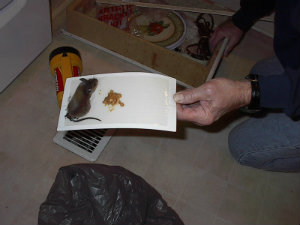 I said, pulling the lower drawer out from the set of drawers to my left. I turned the flashlight back on and splashed the light at the wall behind where the drawer was, exposing one of our sticky traps. Sure enough, another small, dark gray mouse struggled furiously to break free from his paper prison.
I said, pulling the lower drawer out from the set of drawers to my left. I turned the flashlight back on and splashed the light at the wall behind where the drawer was, exposing one of our sticky traps. Sure enough, another small, dark gray mouse struggled furiously to break free from his paper prison.
Jo screamed again.
“I need a plastic bag and a stick or something,” I ordered. “But first put Sparky in my bathroom. Hurry!”
When Jo came back with a long, thin strip of molding, I handed her the flashlight and inserted the wood strip into the dark area where the drawer had been, snagging the sticky trap, which had now adhered itself to my stick. The peanut-butter bait was still in the center of the trap. The adorable little mouse with its cute little eyes stared at me as it continued to scramble to get free. The trap clung to my stick as I pulled it through the drawer opening. I twisted the molding strip loose.
“Wait!” Jo said. “Let me get the camera.” She returned to the kitchen quickly and snapped a picture, after which I placed the mouse and the sticky trap into the plastic bag and dropped it into the garbage.
I then tied up the large trash bag and took it outside, lowering it into one of the garbage cans. I felt a pang of guilt as I secured the lid.
Several hours later, the cats were again clustered around the lower kitchen cabinet doors. I opened the door directly under the sink and there again was a mouse caught in the folded sticky trap. I repeated my earlier efforts, dispatching the mouse and its paper jail into the trash.
I then picked up Sparky, placed him back in my bathroom and closed the door. Sparky was the cat most likely to go after the mouse. Cisco and Cali could also be considered mousers, but they are much more timid than Sparky, who is fearless. I went back into the kitchen and pulled out the bottom drawer again, and again there was yet another mouse clinging to the new sticky trap. It was bigger than and maybe not as cute as the earlier two. I repeated my now familiar routine and deposited the rodent into a trash bag, which I then took outside to the garbage can.
An hour later, the cats had resumed their guard-duty positions in front of the lower kitchen cabinets. Jo joined me and once again Sparky was relegated to my bathroom. I opened the doors under the sink, but there was nothing. But when I pulled open the bottom drawer and peered inside, sure enough, there was a fourth mouse caught on the sticky paper. Again, I fished out the poor little rodent and placed it in the trash.
The fifth mouse caught in a sticky-paper trap directly under the sink arrived just as we were preparing to call it a day. I had already brushed my teeth and put on my pajamas, so was not inclined to repeat the outside trash routine.
“He’s not going anywhere,” I declared, “and we need to get to bed. We’ll take care of this in the morning.” Jo agreed sleepily. Before we left for the bedroom, we placed three of the kitchen table chairs against the lower cabinets and drawers. The cats were clever, but there was no way they were going to move the chairs.
In the morning, I went directly into the kitchen and pulled the chairs away. I peered under the sink and did a double-t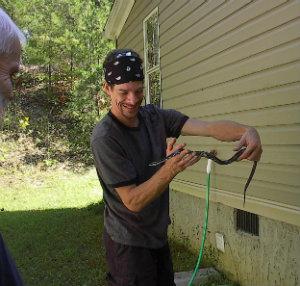 ake. The mouse had chewed his way to freedom, leaving behind an extraordinarily large helping of mouse poop. I checked behind the drawers, but that sticky trap with its peanut-butter bait remained untouched.
ake. The mouse had chewed his way to freedom, leaving behind an extraordinarily large helping of mouse poop. I checked behind the drawers, but that sticky trap with its peanut-butter bait remained untouched.
I thought back to the first year we were here in western North Carolina, and how a three-foot snake had found its way into the area under the cabinets beneath my bathroom sink. It, too, had managed to get itself snagged on a sticky-paper trap. Obviously, it had been going after a mouse. When I had called Jo in to have a look, she decided the reptile was dead as it hadn’t moved the whole time she was there.
She was wrong. The reptile moved in an apparent but futile effort to free itself.
Jo’s scream would have impressed Hitchcock.
“Get it out of here,” Jo yelled.
“I don’t do snakes,” I said.
The next day Jo’s youngest son Brian came out to the house, took the nonpoisonous snake outside, removed it from the sticky trap and cleaned it up. After which he let the critter slither away into the woods.
Brian came back a few days later and performed some carpentry work under my bathroom sink. As a result, no critter will ever be able to invade my bathroom again. The kitchen, however, is still not critter-resistant.
Outside, where the woods surround us, there are some other critter problems. But we’ll tell that story next time. #
A Moveable Feast (11/20/12)
In two days it will be another Thanksgiving and the unofficial start of the “2012 Holiday Season,” which may or may not be good for me as I sit here in front of the computer with no clue as to what I want to write about.
Not that I have nothing to do. Good grief no. I’m supposedly retired and yet my days are filled with too much on my plate. And that brings me back to thoughts of Thanksgiving Days past.
It was back during the 1960s, when my children were young. The 30-pound turkey – a gift to us from my friend Johnny Brennan, a retired detective from the famed “Broadway Squad” who was real tight with a number of meat wholesalers in Manhattan – had been thawing in the fridge for days. My first wife Pat had labored all morning, basting the bird regularly as it cooked, stirring the vegetables, whipping the mashed potatoes, racing around the kitchen in a cyclonic frenzy.
The four-room apartment lacked a formal dining room, thus requiring all meals eaten at the rather small kitchen table situated against one wall. The roast turkey was done and had been removed from the oven for cooling. Zero hour was upon us as I carefully prepared to carve the bird. Seven-year-old David and 5-year-old Jennifer sat at the table in gleeful anticipation, their eyes glued to the glistening, browned fowl hanging over the edges of the too-small platter in the center of the table.
I plunged the carving fork into the left side of the turkey and quickly raised the large knife with my right hand. That’s when I was reminded of the shelf on the wall as I hit it with my arm, dislodging the sugar bowl and spewing its contents all over the steaming hot dinner.
Pat and the children stared in disbelief at the now white-covered roast turkey. I, too, was paralyzed, unable to accept the reality of what had just happened. My memory of the ensuing moments following this debacle is hazy. I vaguely remember Pat grabbing pot holders and picking up the platter with its confection-topped turkey and moving quickly to the sink where she began running a stream of water over the tarnished bird. Fade to black.
Another unique Thanksgiving comes to mind, this one in 2004. Josephine, my current wife, had spent most of the day in the kitchen, beginning at first light. We were living in Las Vegas, many hundreds of miles fro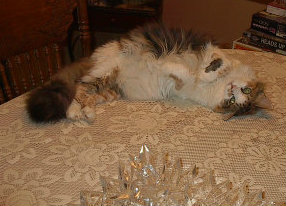 m any family.
m any family.
“I know it’ll be just the two of us,” Jo said the night before, “but I feel like doing it right. I’m tired of casino food.”
“No argument from me,” I responded, mumbling something about football in a lower voice.
Josephine outdid herself. The dining room table wore a crisply ironed tablecloth, upon which our best china was laid out. Two long, red candles guarded the artificial bouquet in the center of things. My job, as I recall, was to stand guard and make sure the cats stayed off the table.
I probably could have used some help.
Anyway, I did the best I could. And so did Josephine. It was a wonderful dinner, and something to be thankful for. Jo even prepared a formal menu, which we tried to reproduce here, but were unable to correct the blurriness.
For those of you who care about such things, the menu listed the following:
Roasted Tom Turkey
Buttered Stuffing Red Ruby Cranberry
Brown Baked Dinner Rolls
Winter Salad Baby Peas Asparagus
Turkey Au jus
Pimento Stuffed Green Olives
Pitted Black Olives Mashed Potatoes
Brown Sugar Sweet Potatoes
Guests: David & Josephine George, Cricket, Ashley, Sparky & Cali
This Thanksgiving, we will drive over to Jo’s middle son Bill’s house where he and his wife Lena, along with grandchildren Jasmine and Jacob, will prepare the turkey and host this holiday’s feast. Also attending will be the rest of Jo’s family, including her youngest son Brian and his significant other, Michelle. Jo’s oldest son, Michael, will also join us.
Everyone will bring a tasty contribution to the party, with Josephine and I providing a honey ham, sweet potatoes and cranberry sauce.
And there won’t be a sugar bowl in sight.
Thanksgiving Update: We got to Bill and Lena's house yesterday at about 4:45. Within 15 minutes, most everyone else had arrived. Michael brought his longtime friend, Melinda, and Jo's great granddaughter JacLyn came with her mother, Samantha. I had met the latter two about two and a half years ago and didn't recognize either. No one thought to tell me who they were and so I just figured they were neighborhood friends of Bill and Lena's.
When Michael reintroduced JacLyn to Josephine, he said, "Do you remember who this is?"
The little 5-year-old shook her head.
That's when Michael said, motioning toward Jo, "This is my mommy."
JacLyn grinned widely, said "Hi," and lunged gleefully at Jo, who had crouched down near the floor. Unprepared for the sudden contact, Jo fell backward, landing her backside on the hard kitchen floor. She managed to laugh as JacLyn clung happily to her.
Jo said later that "it was the best hug I've had in a long time."
The presliced spiral honey ham was unwrapped, along with the sweet potatoes and cranberry sauce. In addition to the usual pre-dinner munchies such as celery, carrots, olives, etc., other contributions included Lena's broccoli casserole, and from Michelle a stringbean casserole, a special squash dish, and really good traditional stuffing. Brian, the sous-chef, pleased our palates with a brilliant mac-and-cheese concoction.
Jo's grandson, 7-year-old Jacob, couldn't get enough mini-marshmallows left over from the candied sweet potatoes, while 13-year-old Jasmine huddled with her mother, planning their midnight Black Friday foray at the mall.
The turkey was another matter.
Apparently, Bill and L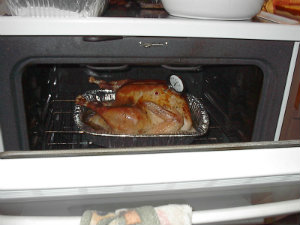 ena neglected to study up on the proper timing and thawing procedures for the Thanksgiving Day bird, which resulted in a very-not-ready turkey. The meat thermometer had reached the proper goal of 160 degrees, but the pop-up button refused to deploy, indicating an undercooked bird. Thus everyone proceeded to help themselves to what was available, beginning with the honey ham.
ena neglected to study up on the proper timing and thawing procedures for the Thanksgiving Day bird, which resulted in a very-not-ready turkey. The meat thermometer had reached the proper goal of 160 degrees, but the pop-up button refused to deploy, indicating an undercooked bird. Thus everyone proceeded to help themselves to what was available, beginning with the honey ham.
While the turkey went back into the oven and resumed cooking, everyone chowed down. Second helpings later, as Jo and I donned our jackets for our return trip home, Bill opened the oven and announced that the bird was ready. Jo took her camera out again and captured the image of the finally cooked turkey as we were leaving.
There was a collective, tryptophanless sigh.
For as far back as I can remember, it was the first Thanksgiving in which turkey was not included in my holiday meal.
Needless to say, we were wide awake when we got home. #
Snow, Bread and Milk (11/13/12)
What is it about snow that so radically changes a person’s behavior? Having been born and raised in the Northeast, I decided a long time ago that climate may have a lot to do with it. Something in the air or water, I reasoned.
Living a good part of my adult life in New York State’s upper Westchester County, snow during the winter months was not at all unusual, and large, kn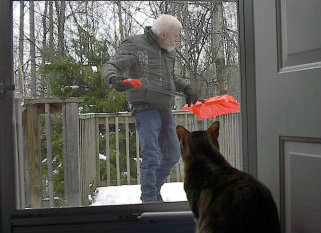 ee-deep accumulations were commonplace.
ee-deep accumulations were commonplace.
But it made no difference whether the snowfall measured two inches or two feet. At the first sign of a snowflake, the behavior pattern went into high gear. Mama Bear or Papa Bear, or even one of the baby bears, would inevitably ask, almost rhetorically, “We got ’nough bread and milk?”
Now, for as long as I live I’ll never figure out why grown men and women would ask such a question. I mean, why bread and milk? It’s probably safe to assume that a whole lot of adults don’t even drink milk anymore. And surely one could find it possible to survive a few wintry days without the sustenance of their morning toast.
But there it is: 10 snowflakes have descended in an area roughly measuring 10 square miles, and already long lines have formed at every supermarket, convenience store and deli that is open. Naturally, the bread and milk supplies are the first to be depleted.
The next day the snow is melting and every family for 10 square miles, or more, that was fortunate enough to get to the store early, now has enough bread and milk to last the rest of the winter. Or at least until the next snowfall.
You can tell me about the moon and how it affects moods and such, how grown people do  weird things when the moon is full. But you give me a good snowfall, or even a so-so snowfall, and I’ll show you behavior modification without reasonable cause.
weird things when the moon is full. But you give me a good snowfall, or even a so-so snowfall, and I’ll show you behavior modification without reasonable cause.
The South is no exception. The mere mention of the possibility of snow on the evening weather forecast sends North Carolinians scrambling up and down supermarket aisles, quickly tossing multiple loaves of bread and containers of milk into their shopping carts as if there were a time limit.
Now, when I hear the mention of the word snow, my mind races back to the winter of 2010 when more than a foot of the white stuff covered our driveway. Unbeknown to me, that blanket of snow covered a sheet of hidden ice. On my way back from taking out the garbage cans for pickup, I slipped and did a double deck flip, landing in a very unnatural way on my ankle and breaking it in two places. But that’s another story.
Of one thing I am certain: When snow begins to fall, it has got to warm the hearts of dairymen and bakers alike. #
Post-Election Plight of a Politiphile (11/6/12)
Today is Election Day and the last chance for adult U.S. citizens to vote for the candidate of his/her choice. For most, it will be a welcome relief from the constant barrage of political TV ads, unwelcome phone calls and unsolicited mailings, most of which tear down the opposing candidate and cast aspersions on their heritage.
For some political junkies, however, a great void in their lives will open up tomorrow (unless, of course, a repeat of the 2000 election occurs and a recount ensues). It is much like being an avid baseball fan who lives and breathes the sport with all its statistics and history until the last World Series game signifies the end of the season.
To be sure, there will always be another presidential election, but it will have to wait for four years, unlike the four-month pause until a new Major League season begins. So what does the inveterate politiphile do during the interim?
I’ve been rattling my brain to come up with some answers because I’m not only a political junkie, I’m also an unwavering baseball nut. To make matters worse, my team is the New York Mets.
Well, first, if President Obama wins reelection, I will relax and know that despite all that is not right with the world, the nation’s Commander-in-Chief has my back. I will remain confident that we still have a President who will not lose his cool and be forced into doing something that might trigger World War III.
I will be content in knowing that my monthly Social Security payment will continue to be deposited into my checking account, that it will not be privatized, and I can go on paying my mortgage and purchasing food.
I will feel secure in the knowledge that Medicare will continue to help cover most of our health care costs now and for as long as my wife and I live.
I will feel proud to have as my President, a man who believes in a woman’s right to choose what is done with her own body, and to be given equal pay for equal work.
I will feel good in knowing that my President will continue to fight for human rights, for equality for all people, of all ethnicities, gay or straight.
I will go to bed at night knowing that the man in charge will make sure students can afford to attend college, and that our veterans can receive the benefits they so gallantly earned.
I will rest assured that the economy will continue to improve, that the man in charge is a man of honor and integrity, a man who remains true to his values, a man whose strength and resolve will build a better tomorrow for all of us.
And despite my wife’s insistence that I allow her to tutor me in the finer points of cooking, a task I find as abhorrent as making the bed, I will turn to my baseball card collection and concentrate on acquiring the missing players’ cards for the Mets and Brooklyn Dodgers.
UPDATE: President Obama won reelection, in both the electoral and popular vote, despite Florida, as usual, still working on a final tally. Half the country breathes a sigh of relief, while the other half tries to figure out what happened. One thing is clear, though: Congress and the Administration have to sit down and reach a compromise on what is best for the country.
Our future depends on it. #
The Boarding Home (10/30/12)
The other day my wife Josephine suggested she make lentil soup for dinner. I nearly convulsed in my response.
“Absolutely not!” I said loudly. “Out of the question!”
Jo looked puzzled. “Geez, honey, what’s the matter with lentil soup?”
“I’ll tell you what the matter with it is,” I said, trying to stay calm. “I was forced to eat a bowl of lentil soup for dinner six days a week for more than a year.” I then went on to recount my days in a boarding home when I was nine years old.
It was sometime toward the waning days of the 1940s. My mother had divorced my dad and was working as a waitress to get by. The meager child support she got from my father certainly didn’t cover her expenses, and my seven-year-old sister and I were not old enough to take care of ourselves. In my mother’s thinking, placing us in a private boarding home was the only way she could work to support the three of us.
The home belonged to an Italian-Catholic family who had two teenage children of their own. They lived out on New York’s Long Island, in Lindenhurst. It was a time when most of Long Island was still one large potato farm. To be sure, the postwar housing boom had seen the rise of several cookie-cutter communities tucked away at neat right angles, spawning the likes of Levittown, and others.
But the DeMarcos’ (not their real name) home had been singly constructed amid a patch of woods, with neighboring homes situated a respectable distance away.
The DeMarcos and their teenage boy and girl lived on the main floor, segregated away from the board-paying nine boys occupying the renovated attic, and the six or so rental girls, including my sister Barbara, somewhere downstairs.
Life for me while residing at the DeMarcos’ home was not exactly a bowl of cherries. Far from it. The food, while certainly not unhealthy, was a major problem for me. I mean, one can only eat so many consecutive bowls of lentil soup. Breakfast was also a dependable routine: a cup of hot chocolate and a “stack” of plain white bread with which to dunk in the hot chocolate. I don’t recall if we were permitted to have a second cup of hot chocolate.
Lunch was also a constant: several peanut butter and jelly sandwiches on white bread. An occasional variant was a large hunk of Italian bread instead of the sliced bread, otherwise the afternoon fare never changed.
There never were any in-between snacks, never dessert after dinner. Oh, how I yearned for a nice big bowl of corn flakes, or a ham sandwich, or (sigh) ice cream. That whole year, I was always hungry. I imagine my sister felt the same way, although in those days we didn’t have much contact with each other.
Sundays were the lone exception. A heaping plate of macaroni with tomato sauce. Never any meat, but there may have been bread. I’m not sure.
The only break to all of this was the infrequent number of times Dad would visit and take us out to lunch. I don’t have any memory of us stuffing ourselves on those occasions, only the excitement of seeing our father.
Visiting was difficult for our waitress mother. She had no car and worked most of her daylight hours. A trip out to Lindenhurst would entail a long journey on the Long Island Railroad, and then a cab to the home. No lunches; just a brief visit with Mom.
We did somehow convey to her how hungry we always were, and one day she was driven out to the home by a butcher she was dating, who presented the DeMarcos with a generous package of prime steaks.
We never saw any of it.
But I could smell and probably hear the meat sizzling down in the kitchen when the DeMarco father came home from work. I told my mother the next time she came out, and she raised hell with the DeMarcos. Shortly thereafter, she again was driven out by her butcher boyfriend, who again presented the DeMarcos with a package of well-seasoned steaks.
This time, after supper and everyone had been fed the usual lentil soup, Barbara and I were summoned to the kitchen. A plate bearing a full, cooked sirloin steak was rudely slammed down in front of each of us. We were ordered to “Eat up and then get back to your rooms!”
Even a nice steak loses its taste when one has to eat in fear and anguish.
Food wasn’t the only problem. During the summer, which stretches endlessly when you’re a child, we were sent out each day wearing nothing but jeans. We weren’t allowed to wear even a polo shirt and thus ran around in the woods shirtless. Mosquito bites, scratches from tree branches, sometimes sunburn were just some of consequences of the DeMarco dress code.
The DeMarcos were Catholic. We were not. Both our parents were Protestant, my dad’s family Bible-belting Midwest Baptists. I don’t know about the other kids, but the DeMarcos couldn’t be bothered. We all were sent to Catholic Church every Sunday and I learned all about the Catholic religion, memorizing and saying the prayers each evening. We were encouraged by the church to say a lot of Hail Marys, supposedly to move people out of purgatory and into Heaven.
I prayed for more food.
We were each given a dime to place in the basket that came around every Sunday, and of course we faked putting it in and instead held the coin out to buy candy. We also learned how to steal candy from the candy store.
There were other problems living at the boarding home, too many to go into here. There was, for example, some sexual experimentation that went on among the older boys, eventually including the younger ones such as myself. All of this eventually came out, but it wasn’t what ended our stay at the DeMarcos’ home.
The final straw was the brutal vandalizing of a house elsewhere in the woods. Apparently, the owners were away on vacation and some of the older boys seized the opportunity to break in and ransack the place. They didn’t just overturn chairs and kick holes in the walls. They destroyed a well-stocked library, tearing books from the shelves and tossing them into a pile. They tied rope around the posts holding up the roof of the front porch and pulled the whole thing to the ground.
I was part of it. Not the ringleader certainly, but nevertheless a part of it. I am still ashamed for not trying to stop it, but I guess it was an opportunity to vent all of my frustrations, to try and get rid of the homesickness, that pain in the pit of my stomach.
The police came and we were arrested. It cost my father a lot of money. We were all too young to go to jail, thank God. But the shame and embarrassment, and the pain I caused to my mother especially, will remain with me forever.
My sister and I were of course taken out of the home. Barbara stayed with Mom, but I was placed in yet another home, a smaller one with fewer children, also on Long Island. I stayed there for several months, feeling more lonely and abandoned than ever.
And then my prayers were answered, or so I thought. My mother remarried, not the butcher, and I was freed from captivity. We moved in with my beer-loving stepfather, into a three-room, third-floor walkup apartment in 1950's Queens, a lower middle-class Irish neighborhood with a bar every so many feet.
Little did I know that would be the beginning of yet another nightmare for me, but that of course is another story. #
Beautiful Beamer (10/23/12)
The other day I was actually stuck in traffic, which is not a common situation in Asheville, North Carolina, at a time when it was urgent that I be somewhere very soon. I thought about the Star Trek movies and TV shows in which people are “beamed up” from planet surfaces.
Wouldn’t it be helpful, I thought, if scientists were actually working on such a type of human transporter right now, and that someday we’d be able to go from point A to point B by just stepping into a matter-transfer machine?
Think about it. You’ve got an important meeting three states away. You’re on the verge of signing a lucrative, six-figure contract with a nervous client who still needs to be convinced with a little one-on-one attention.
Trouble is, the weather is dreadful and all flights from your nearby airport have been grounded. If it were possible to teleport a human being, you’d simply drive to the nearest “Humafax” booth, insert your “Beamer” credit card, punch in your destination code, and zap! You materialize in front of your client , impart some neat, insightful words of wisdom and a few choice phrases of encouragement, and in minutes he’s signing on the dotted line….
I decided to do a little research to see if scientists might indeed be working on such a device. And they very definitely have been, with some qualifying degrees of success. Although in 1993, David Goodstein, then professor of physics and applied physics, and vice provost at the California Institute of Technology, thought no one ever would.
Basically, he said, the human genome project would be the first step in such an endeavor, because scientists would need the entire genetic blueprint of a person, present in each cell, to copy the cells.
“But even if you had all that information,” Dr. Goodstein said, “you would basically be making a Xerox of the person.” And that, in principle, would involve disassembling the body into atoms of the constituent elements and reassembling the body elsewhere with the atoms present there.
But as anyone who uses an electronic copier knows, a copy is never better than the original. It is always worse, though it may still be perfectly readable. And with each subsequent copy more little mistakes creep in.
“An imperfect copy is okay in a document,” said Dr. Goodstein, “but a disaster in a human being.”
Come to think of it, anyone who’s seen the 1986 remake of The Fly knows what happened to the scientist in the film when an insect got into one of the transportation booths with him.
All of this aside, there have been some dramatic breakthroughs in this area of science. Perfection in teleportation, if it is ever achieved, will revolutionize the course of civilization and alter all forms of transportation forever.
I’m not going to get into the detail of how before 1925, the Newtonian theory suggested that matter is made up of tiny, hard balls, that objects do not move unless they are pushed. I’m not going to explain how according to Newton, objects do not suddenly disappear and reappear somewhere else. Why bother trying to explain something I’m not sure I fully understand.
Suffice to say that in 1925, thanks in large part to Albert Einstein, scientists Werner Heisenberg and Erwin Schrödinger, along with their colleagues, developed what we now know as the quantum theory. In a nutshell, in quantum physics, when the strange properties of atoms were analyzed, physicists realized that electrons acted like waves and were able to make quantum leaps in their apparent frenzied motions within the atom.
But enough complicated science. In 1993, Charles Bennett and a team of scientists proved that it was indeed physically possible to teleport objects at the atomic level. To be precise, they were able to prove that all the information contained within a particle can be teleported.
Since that time, physicists have been successful at teleporting photons and even entire cesium atoms. (I told you it was complicated.) And unbelievable as it sounds, scientists expect that within the next 20 years we will develop the ability to teleport the first DNA molecule and virus.
As recently as 2007, a teleportation method that does not require “entanglement” was proposed by scientists. Without getting technical, entanglement is the most difficult problem of quantum teleportation to overcome.
All of this will be aided by the future development of quantum computers that will ultimately replace the digital computers we all now use.
As physicist and author Michio Kaku states in his fascinating book, Physics of the Impossible (Doubleday 2008):
“So teleportation exists at the atomic level, and we may eventually teleport complex and even organic molecules within a few decades. But the teleportation of a macroscopic object will have to wait for several decades to centuries beyond that, or longer, if indeed it is even possible. Therefore teleporting complex molecules, perhaps even a virus or living cell, qualifies as a Class I impossibility, one that should be possible within this century. But teleporting a human being, although it is allowed by the laws of physics, may take many centuries beyond that, assuming it is possible at all. Hence I would qualify that kind of teleportation as a Class II impossibility.”
In other words, Captain Kirk may have to wait a while before Scotty can beam him up. #
A Walk in the Sun (10/16/12)
Last Sunday, Josephine and I decided it was time to join the ranks of the healthy. To do that, we decided, would mean walking almost every day for a minimum of 25 minutes.
Right away, there were a few drawbacks. First, we live in the mountains of western North Carolina, which means you generally can’t go more than a few hundred yards before encountering a hill. Walking down a hill entails a careful strategy of making sure one doesn’t over stride or step on a rock or into a small fissure in the road, thereby twisting an ankle, or worse. Walking up a hill is strenuous, even for young people. For out-of-shape seniors such as us, it is daunting, to say the least.
The second drawback was the prolific number of dogs in the neighborhood. Actually, we may be the only household that doesn’t have a dog. That first day, and first dog we encountered,  began barking when we were around the bend in the road and still not within the canine’s line of vision. Fortunately, he was ensconced safely behind a fence.
began barking when we were around the bend in the road and still not within the canine’s line of vision. Fortunately, he was ensconced safely behind a fence.
In front of the fence was a large, red Romney/Ryan sign. We stayed across the road from the fenced-in dog as we continued our steady pace. The dog barked louder and louder as we walked, our pace quickening just a tad. Then, in a moment of inspiration, Jo spoke softly and reassuringly to the canine. “Okay, okay, doggie. We’ll vote for Romney.”
The dog looked at us, cocked his head and suddenly stopped barking. As we moved farther along the side of the road, I said firmly, “Not.” And the Romney dog, as we now refer to him, resumed barking even louder than before.
We continued to walk at a good pace, perhaps not as briskly as some exercise gurus would have you move, but in our minds, good enough. The scenery was a multicolored paradise of pastoral beauty, with an occasional white squirrel darting up a tree trunk, and a horse grazing in a nearby field. Jo had taken her cane with her, and I held on to my trusty walking stick.
When we reached a point at which my watch indicated we’d walked about 15 minutes, I suggested to Jo that we move to the other side of the road and head back, against traffic as we had decided upon before we left. Not that a car or truck could sneak stealthily up behind us in that setting of quiet countryside without our hearing it long before we saw it. True, traffic up to that point had consisted of just two cars and a garbage truck. But it was always better to see what was coming ahead of time.
That first day, coming back up the steepest, longest hill, I instantly became aware of my heavy breathing, and there wasn’t a bikini-clad blonde in sight.
Nearing the top of the hill, I could feel my heart pounding, my face flushing, and my legs close to buckling. I slowed up, half turning to see how Jo was doing. Her head was down and I could hear her wheezing.
“You okay?” I asked, finding it challenging to speak as I struggled with my uphill pace. She mumbled in the affirmative as we both continued to the top of the hill.
When we were back in sight of the Romney dog, we made an exception to our against-traffic rule and crossed back over 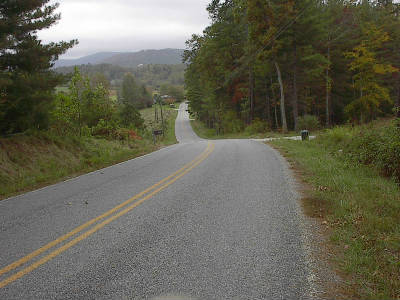 to the right side of the street. No sense inciting the animal by putting ourselves right in his face, we reasoned. Of course, right on cue, Romney dog barked up a storm as we moved up the side of the road. Jo, also on cue, reassured the canine that we would cast a ballot for the Republican candidate. And the Romney dog stood quiet.
to the right side of the street. No sense inciting the animal by putting ourselves right in his face, we reasoned. Of course, right on cue, Romney dog barked up a storm as we moved up the side of the road. Jo, also on cue, reassured the canine that we would cast a ballot for the Republican candidate. And the Romney dog stood quiet.
Until I yelled, “Not!” The barking resumed, its shrill yelps cutting through the morning country air.
We made it back to the house without further incident, and that is pretty much how it went for the rest of the week.
Friday, not so much. The day turned out to be more than a little unsettling. It was on the way back. We had already survived the long uphill trek without our hearts giving out. And we had passed Romney dog and his barkfest. We were now in the final leg of our daily journey and were just passing the last house on the left side of the road. After that it was all woods until we reached our driveway.
Suddenly, as if out of nowhere, two barking dogs came at us from behind. Jo started to panic and I told her to stay calm and just keep walking normally. One of the dogs, a small black and brown canine with hints of Doberman in his DNA, got closer and closer to me, nipping at my heels. I nudged him firmly away with my stick as we continued to walk forward. I think he got the message. Fortunately, both loose dogs seemed to lose interest and hung back as we moved up the winding road.
Saturday, I took off for my customary walk-through of Smiley’s Flea Market. Followed by a stop at one of the area’s super Walmart stores. This meant a good deal of walking, though as Jo pointed out, it involved a lot of stop and go and thus was not the same as our now daily exercise walk.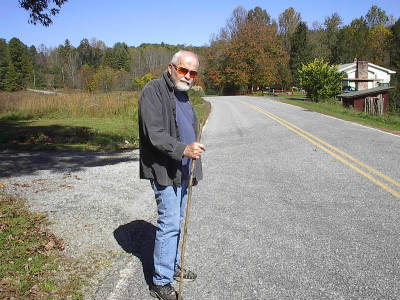
Our second Sunday walk began poorly. We had reached the point where we could see the Romney dog and his sign. Romney was barking as usual from behind the chain link fence. But he was barking at three loose dogs on the other side. That was too much for Jo and I, and we turned abruptly around and headed back home.
Later, we drove down the road to see if the unleashed dogs were still there. Happily, they had gone. It was the day we had decided to take a few pictures for my column – sorry, blog – and we tried to do so through the windshield. Not satisfied with the results, we decided to try walking again, this time, as you can see, with the camera.
Jo now worries we could next meet up with a bear. #
Celebrity Tag (10/9/12)
Back when I was editing and publishing 39 Plus, a monthly tabloid for seniors and soon-to-be seniors, in Asheville, North Carolina, we ran an interview with Perry Como. Up to that point, our interviews had concentrated on local notables, but Perry was the first person we featured with national fame. However, he also had ties to the area, maintaining a mountaintop retreat near the tiny mountain hamlet of Saluda.
As I recall, it was both an honor and a pleasure to feature Mr. Pierino Como in our publication. No one could better represent the kind, gentle, graceful attitude that is The South.
I did not have the pleasure of actually meeting Perry Como in person, since the interview was conducted over the phone by my lead writer at the time, Ralph Roberts. I have, however, had the good fortune to meet, and even work with a few notable and charismatic people over the years.
I began my editorial career with TRUE Magazine back around 1962. At the time, TRUE was owned by Fawcett Publications, which was located on Manhattan’s West 44th Street. The area, with its many excellent hotels and restaurants, was a haunt for celebrities.
My first celebrity experience occurred while I was enjoying a hot dog at a corner stand at Sixth Avenue and 44th Street.
“Hey, Dane,” hollered the man behind the counter. I spun around on my stool in time to catch a glimpse of actor Dane Clark, probably best known for his role as Abe Saperstein, manager of the world-famous Harlem Globetrotters basketball team. Clark grabbed a dog, splashed some mustard on it and hurried off to an appointment.
I went home that night and told my wife about the experience. Soon after, the story circulating through the neighborhood was that I had had lunch with Dane Clark.
In those days, I was young and impressionable, and still that way a year or so later when I found myself gawking at actor Jason Robards while lunching at New York’s famous Dinty Moore’s. Robards sat at a table with an entourage of Hollywood cronies while every waiter in the place hovered over the star.
I was equally dumbfounded when I emerged from that very same restaurant several months later, and literally ran smack into Burt Lancaster. I looked up at this Redwood of a man, unable to keep my awestruck mouth closed. I mumbled “Excuse me” as Burt smiled and giant-stepped into the restaurant, the actor’s charisma very much apparent.
The epitome of charisma, however, belonged to one Robert F. Kennedy, who within just a few feet strode right past me during a large Fifth Avenue parade in the 1960s. The moment is still etched in my memory as vividly as the day it happened.
I remember as a child living in Los Angeles in the late 1940s. My mother took me to the Hollywood Christmas parade, and I was in my glory. In those days, I inhaled Western movies, and this was an opportunity to see in person the likes of Hopalong Cassidy, Gene Autry, Roy Rogers, Dale Evans, Lash Larue, and so many others, marching down Hollywood Boulevard on horseback. What a thrill to treasure forever, to have tucked away for whenever I needed to feel good about something.
But somewhere along the line, I lost my “young and impressionable” reactions to notables. Perhaps I even fostered a certain gentle cynicism.
I remember walking into Downey’s, a New York restaurant known for its celebrity clientele, and tripping over a woman’s foot sticking out in the aisle. I gave her my best annoyed look before proceeding to our table.
“Hey,” my colleague rasped excitedly, “that was Joanne Woodward you were glaring at. She’s here with Paul Newman.”
A few years later, I attended an afternoon press party held at a rather nice lower East Side establishment and met up with author and well-known newspaper columnist Jimmy Breslin. We had a few drinks together while he spoke of the days when he wrote for the men’s magazines. Following that meeting, in the years ahead I would run into him again and again. One of his publishers was located in the Madison Avenue building in which I worked, and we became regular nodding acquaintances.
These were, for the most part, fleeting encounters with the rich and famous, but I also worked for years alongside a few notables on a regular basis. From 1964 through 1977, I was an editor at Magazine Management. I worked with people such as The Godfather author Mario Puzo, a real sweet guy who loved to eat; with best-selling author Martin Cruz Smith; and with playwright and novelist Bruce Jay Friedman, among others.
There were many other celebrities whose paths I crossed, however briefly, from Ed Sullivan and Peter O'Toole to David McCallum, Robert Vaughn's Man From U.N.C.L.E. partner. All of which contributed to an exciting period in my time on this planet. But none of it is as important and fulfilling as the close relationships and bonds I have formed with extraordinary people I’ve met along the way, including friends I’ve worked with, and especially people such as my wife Josephine. To me, they are the true celebrities in my life. #
Cats Will Be Cats (10/2/12)
I love all animals, even the critters living in the woods that pretty much surround our house in Mills River, North Carolina. And that includes the family of raccoons that wiped out our very small corn crop this year.
But my favorite animal is the domestic house cat, which of course comes in all breeds, shapes and sizes. And, just as with humans, each has his or her distinct personality. In our current household, there now live in permanent residence three cats: Cali, a scruffy Calico with a Maine Coon coat, who came already named; Sparky, a Maine Coon/tabby upon whom we did bestow his moniker; and Francisco, a full-blooded pedigree Bengal whom we call “Cisco,” because we Americans are lazy with our speech and prefer to shorten – or assign an acronym to – everything.
Litter-box habits are unique with each of the cats. Sparky’s deposits are covered up quickly and efficiently, but the aroma is abnormally offensive and has an afterlife akin to the radioactive fallout of an H-bomb explosion.
Cali, on the other hand, does not always make it to one of the three litter boxes. She is the victim of a chronic condition known as Irritable Bowel Syndrome, or IBS (there we go again). When she does decide to relieve herself inside a litter box, she rarely covers it up. Oh, she tries to hide it, vigorously scratching at one of the rims of the litter box, but no sand ever lands on the offending material.
Cisco goes the other way, obviously having been rigidly trained by his mother. Following one of his fastidious deposits, Cisco scratches long and hard, industriously heaping pile after pile of sand on his donation, until most of the sand in his oversized container has been carefully moved to just one corner of the box, with some of that spread out onto the nearby floor.
Over the years, I have had other cats with different ideas as to how they should dispatch their bodily ejections. Flutter, a squirrel-tailed longhair, used to stand outside the litter box facing it. After evacuating his bounty on the floor, he would then reach in and scratch vigorously in the sand, sending the granules flying in the general vicinity of his recent project.
Cats, like humans, also have their eccentricities. Sparky apparently feels it is his implicit responsibility to “shadow” my every move when it is close to meal time. As an early riser, he trots close by my heels as I stumble out of the bedroom and pad down the hallway to my den and the bathroom just off that. He is quickly joined by Cali, both of whom proceed to pace back and forth while I use a meter to check my fasting glucose. Cali squeaks again and again when I prolong their wait for breakfast by placing pressure drops into my eyes.
Entering the kitchen, both cats are joined by Cisco, his tail straight up in anticipation of the imminent morning repast. All three cats weave in and out among themselves, stopping at times to touch each other’s nose in the familiar feline social gesture.
When I snap open the canned cat food, all three cats voice their approval. Cisco is the loudest, with Sparky trying hard to make his barely audible rasp heard. Cali’s squeak has now progressed to a full-throated meow. As soon as I place their now-full dishes on the floor, Sparky and Cali become mute, their bewhiskered faces buried in their food. But when I place Cisco’s dish on the floor, the spotted Bengal becomes aloof, dancing around and ignoring the morning bounty. It is only when I leave the room that Cisco finally trots over to his plate and commences eating.
Lunchtime is almost a repeat of breakfast, although it is not a scheduled feeding time for the cats. But they’re all there, touching noses and weaving in and out among themselves, just on the chance that Josephine or I will accidentally drop a tidbit or two of scrumptious human food, which, despite the advice of most veterinarians, we often not so accidentally do.
Dinnertime is the same story, but Sparky’s internal clock is set on early. If I’m on the computer, Sparky is suddenly walking across my keyboard, his face poking in and out of mine. When I try to ignore him, he begins to lick my arm vigorously. If I’m at my desk, Sparky plops down on whatever papers are in front of me. He is audibly annoyed when I remove him from the desk. And if I am outside working in the yard, he and Cisco sit on a chair and call to me through the screen door.
And so it goes, day after day – and I wouldn’t have it any other way. #
Motormouth (9/25/12)
A few years ago, I read that Detroit was going to equip some of the new cars with an added feature: a device that enables your car to call you when someone’s breaking into it.
I don’t know if that ever actually came to pass, but I do recall what my reaction was at the time: Wonderful! Just what the world needed – an automobile that can call you up at 2:30 in the morning! We can just imagine how the scenario would go:
Ring. Ring.
Hello. (Yawn)
Hi, Dave. Sorry to wake you, but I felt someone tampering with one of my door handles.
What…? Wait, are you being stolen, Sonata?
Well, uh, not now. I think the thief ran away when he heard me dialing.
Dialing? First of all, Sonata, you’re a car; you don’t have fingers.
Cute. You know what I mean – when I was making a connection with your phone.
So why did you wake me up?
Sorry, Dave. I thought you’d want to know.
But nothing happened. You’re safe and sound, right?
Yes, Dave. I just wanted to share the experience with you.
Well, that’s just terrific, Sonata. Anything else you want to get off your chest, er, hood?
As a matter of fact, Dave, now that you ask. I feel so used lately, so unclean, so utterly neglected. When are you going to give me a bath?
Good grief! Tomorrow, Sonata. I’ll take you to the car wash first thing in the morning. Anything else?
Well, yes, Dave, I’m afraid so. My windshield wiper fluid is real low, my battery cables are full of crud, my tires need air, my antenna won’t go all the way up … should I go on?
I get the picture, Sonata. And while we’re at it, I’ve got a few gripes I’d like to pass on as well.
Sure, Dave, go ahead, knock yourself out.
How come your heater takes so long to get warm? And what’s that noise I hear in front every time I make a turn? And why is the steering stiff and the brake pedal unyielding when I start you up on cold mornings?
Sorry, Dave. I haven’t really been myself lately. I guess it all began about the time you sent the bank the last payment. I think it’s referred to as Detroit’s built-in obsolescence. Anyway, it’s up to you to find me a good mechanic.
First of all, you weren’t made in Detroit. You were made by Hyundai. Second, I believe I’ve been more than fair to you. Good mechanics have worked on you. I’ve provided you with regular oil changes and all the other preventive maintenance you required. I’ve spent a lot of money on you, and I’ve given you four and a half years of my life making sure you were well taken care of.
How about when you kicked me in the tire when I wouldn’t start one morning?
That was an impulse thing. I had an important meeting and you let me down when I needed you by letting the battery go dead.
That’s codependency, Dave.
No, it’s not. I love you, Sonata, and I need you.
Codependency, Dave.
Stick it in your carburetor, Sonata!
You seem to forget all the times I’ve come through for you, Dave. How ’bout the time you hit that ice slick and started going into a spin? I pulled you out of that one without a scratch to either of us.
I turned into the skid and let up on the gas pedal; that’s what saved us.
What about the time you were passing a slow driver and another car came at us out of nowhere?
I floored the gas and the passing gear kicked in.
Passing gear, my pistons. I gave you that extra speed because I care about you with all my heart.
You don’t have a heart, Sonata. You’re a car.
OK, I love you with all my motor.
I’m pretty fond of you too. Say goodnight, Sonata.
Goodnight Sonata. #
Time-Trip Tradeoff (9/18/12)
To say we live in unsettling times would not only be an understatement, it would be redundant, since we’ve been living in unsettling times for many years now.
The added factor of millions unable to find a decent job has compounded the already terminally ill economy. The clown car we call Congress has been unable to reach a compromise on any new legislation that might help create new jobs, or stimulate economic growth.
Gasoline prices are at an all-time high, which is certainly bad enough, but have you taken a good look in the supermarket lately? Two bucks for a head of lettuce the size of a Brussels sprout? Seriously?
The war in Afghanistan rumbles on, with U.S. troops training Afghan militia, who in turn ambush their tutors and send them home in body bags.
The Middle East, long a hotbed of unrest, has once again erupted in a chain of vicious attacks on our embassies, resulting in the murder of four American diplomats. All due to a 14-minute YouTube excerpt from a privately and poorly made movie that mocks the Prophet Mohammed as a womanizer, child molester and ruthless killer.
And then, for good measure, throw in the presidential election in which incumbents and aspirants alike spend millions of dollars of PAC money for air time so that they can hurl negative accusations and poison-tongued invective at their opponents. Never mind what they can do for their city, state or country. Just pay attention to how bad the other guy is.
Add to this the demand from Israeli Prime Minister Benjamin Netanyahu for the U.S. to set a clear “red line” that Iran cannot cross with its nuclear program if it wants to avoid war. A demand for an action Israel itself has so far not made.
Considering past actions of Iran’s regime, setting of this so-called red line would be ignored; it would not stop them from trying to reach their obvious goal of total nuclear armament. And when they succeeded, Israel and America would loom large in their gun sights. For the U.S., or any other country, to set such a red line would be to commit itself to war, and such a war would most assuredly involve more than two countries, and eventual nuclear doomsday.
We are a tough country and we’ve survived such bad situations before. And we’ll no doubt lick the problems facing us today as well. But it does prompt us to mentally go back and retrieve the memories of a somewhat less tense period.
There were problems in the 1950s, too, but bread was 18 cents a loaf, ground beef was 49 cents a pound, cigarettes were 20 cents a pack, and a young lad of 13 or so could get himself a 12-ounce bottle of Pepsi and a big fat bread pretzel for 11 cents.
And the work ethic in this country was alive and well. We remember delivering newspapers after school, delivering packages of meat for Mo the butcher, and shining shoes in front of the Jackson Heights, New York, IRT subway entrance. We remember hard work and money in our pocket, and it spent slowly.
In the 1950s, the president of the United States didn’t have much hair and played a lot of golf. Visions of a sugar-blonde named Marilyn danced in many a male head. The closest thing to a national commitment to exercise was the hula hoop. And Detroit was having a love affair with chrome.
There were problems, of course. There always are. A senator named McCarthy had an ocular dysfunction in which red was the only color he could see. The term “civil rights” was still a dream. The mindless polluting of our rivers, forests and the air we breathe was going full steam and unchecked. And young men were losing their lives on the hilly battlefields of Korea to defend the world against the Red Menace.
But despite the negative aspects of the period, there were many more positive ones. Joltin’ Joe DiMaggio was hitting baseballs farther than Babe Ruth; a young man named Elvis was hip-swiveling his way into musical history, and changing it forever; a young senator named Kennedy was taking on the union racketeers; and $10 bought three or four bags of groceries.
In our memories, for the most part, it was a simpler, kinder, gentler time. And it was, for the most part. But of course the era had its drawbacks. For one thing, 1950s America was far from being a society of fairness. If a person was born black, he or she could look forward to growing up in a culture that was very much segregated, particularly in the South. If you were black, you had to ride in the back of the bus, drink from the separate, “coloreds only” water fountain, attend a segregated school.
I remember in 1956, fresh out of Navy boot camp, being assigned duty aboard a destroyer that was in dry-dock in Portsmouth, Virginia. Drawing my first 24-hour liberty, I went into town with a crewmate who just happened to be black. As a New Yorker, I never gave it a second thought. We hit the first tavern we saw, which is what most sailors do. Before we could even take a seat at the bar, the bartender put up his hand. “Whoa!” he said firmly. “I’ll serve you, but not your friend.” Not only did this personify the separate and unequal society of the time, it was an outlandish paradox. Here I was barely 17 years old and baby-faced, and the bartender was willing to serve me alcohol illegally, but refused to serve my buddy who was somewhere in his mid-20s. His only problem a skin color he didn’t choose.
And then, of course, there was the technology gap. Television was in its infancy, with small screens that showed only black-and-white images. Computers were huge, city block-size machines operated by a team of technicians. There was no Internet, no Facebook, no Twitter, and no email. GPS wasn’t even an idea yet.
Telephones in the home all had cords plugged into wall outlets, and if you were out and about and needed to make a call, you had to look around for a telephone booth, for which you would need small change. There were no cordless phones, no cell phones, no iphones or smartphones.
A simpler, kinder, gentler time, but without the technological amenities we have today. A tradeoff that begs the question: Are we really better off than we were more than six decades ago? #
Getting the Bugs Out (9/11/12)
Inspiration for this essay occurred not more than a few minutes ago – in the form of an inch-and-a-half-long insect, black in color, with wings the length of its body. Large as its wings were, it never took to flight, but instead scurried into a dark corner to escape a certain squashable fate.
Now, I’m a tolerant man, but anything in the category of insect or arachnid, especially arachnid, that decides to share my home or office had better be extremely small and not very noticeable.
The Southern climate seems to be an influencing factor in the “size” of resident bugs. I discovered this the year I moved to the western North Carolina area. My first experience was a fly that started buzzing around our living room. The thing was so large that, in nutritional terms, it could have fed a family of four.
Outside our home one year, there was a spider – of the “orange garden” variety, I believe – that spun its web between two large evergreen bushes, persisting throughout most of the summer and into late fall. Taking into account its entire leg span, the thing took up more space than a tarantula and was big enough to take dancing at Asheville’s Bele Chere festival.
Now I know that some people keep tarantulas as pets, but for me, being in the same building with a spider the size of my hand would no doubt elevate my blood pressure to a critical level.
I suppose it’s only fair to state that the South isn’t the only place where insects grow large. I recall departing a commuter train in New York’s Grand Central Station one year with a fellow editor. As we headed up the platform toward the main station room and the street exits, five-foot-six me trying to keep up with the six-foot editor’s giant strides, John, an easygoing, nonchalant kind of guy, let out a bellowing scream that visibly shook up half-a-dozen normally stoic New York commuters nearby.
Scuttling across the platform, en route from the train to who-knows-where, was a water bug of credulity-straining proportions. I’m telling you, this insect was big enough to play defensive end for the Carolina Panthers. And poor John had this overriding fear of water bugs.
I took John’s arm and hustled him out of the station and into a taxi. It was weeks before John got up enough courage to take the train again, opting instead to commute to work by car – which in New York City is equivalent to a suicide attempt.
Irwin, an art director friend, likes to tell the story of an experience he had while renting a summer home in the Hamptons one year.
One warm August evening, he recounted, while sipping a cool gin-and-tonic on the patio, Irwin and his wife were startled to hear their son screaming hysterically from an upstairs bedroom.
Responding to his young son’s call for help, Irwin bounded up the stairs to the child’s room, ready for anything.
“What’s the matter?” Irwin said as he rushed through the doorway.
“Buggy, Daddy,” his son cried. “Get the buggy.”
“Don’t worry, son” Irwin said, smiling, relieved that his son was just reacting to a pesky insect and was in no real mortal danger. “Daddy’ll take care of the buggy. Show me where it is.”
When his son pointed to the ceiling near the window, Irwin smiled again, turned on the light and looked up.
His heart stopped.
Clinging to the ceiling with all of its eight long legs was a Kafka-like version of a wolf spider. It was as big as a dinner plate.
Irwin retreated to the garage and returned with a shovel, battering the oversized arachnid until it dropped to the floor with a thud. Whether Irwin was exaggerating or not, he never saw fit to return to the Hamptons again.
As I type this, my concentration is disturbed by an enormous black ant that suddenly appeared and then disappeared within my computer keyboard. If size alone were enough to dictate what this insect was going to do next, I’d say it was almost large enough to drive a car to Washington, D.C., and help President Obama resolve the federal deficit dilemma.
Am I serious? Nah!
Well, maybe a little…. #
Our National Treasure (9/4/12)
Where would our world be without our senior citizens? In what shape would we be in today if we had not been blessed with some of the major contributions that came from a number of well-known oldsters? The list is long, but to name a few:
Pablo Picasso was still exciting our visual senses with his drawings and engravings at the age of 90. Ben Franklin came up with the compromise that eventually enabled us to adopt the U.S. Constitution, at 81. He also invented bifocal glasses at the age of 78. Grandma Moses was still painting at age 100. Leo Tolstoy wrote I Cannot Be Silent when he was 82.
I could go on forever describing the accomplishments of one Dr. Michael DeBakey, a surgeon known as “a magician of the heart.” While still in medical school, he developed the roller pump, which eventually became an essential component of the heart-lung machine. He pioneered the use of Dacron grafts to replace or repair blood vessels, and was instrumental in the development of an artificial heart.
Over the course of his career, DeBakey operated on more than 50,000 patients. In 2000, he was cited as a “living legend by the Library of Congress. Among his many awards, DeBakey received the Congressional Gold Medal from President George W. Bush. He practiced medicine right up until the day he died, nearly reaching age 100 in 2008.
Bertrand Russell actively participated in international peace efforts at the age of 94. Winston Churchill authored A History of the English-Speaking Peoples at 82. Konrad Adenauer presided over Germany as chancellor at 88. Arthur Rubenstein performed one of his greatest recitals in New York’s Carnegie Hall at age 89. Albert Schweitzer was also 89 when he headed a hospital in Africa. Pablo Casals was still giving cello concerts at 88. W. Somerset Maugham penned Points of View at 84.
At 91, Eamon de Valera served as president of Ireland. Adolph Zukor was the chairman of Paramount Pictures at 91. George Bernard Shaw wrote the play Farfetched Fables at 93. Lovable George Burns gave us an Academy-Award performance in The Sunshine Boys when he was a mere lad of 80.
And let’s not forget equally lovable Betty White who, as an accomplished actress, has been nominated for an Emmy 20 times, and at 90 is still going strong.
But let’s put the famous aside for the moment and consider our older neighbors. In what manner does the average senior enhance the quality of life in our society today? Look around you. Take note of the many mature men and women who volunteer their time and energy to help so many others, in so many ways.
Now expand your thinking and allow your perceptions to take in the whole picture.
For the most part, the older generation is the conscience of youth. Many of today’s seniors represent the moral goodness, the ethics, the courage and tenacity, the compassion that make up the very backbone of this country.
It is the older people who keep us honest, who remind us of the values that have kept our nation strong. In today’s fast-lane, high-tech, smartphone, microwave, digital culture, values are so easily zapped into antiquity.
We cannot allow that to happen. We must continue to appreciate and listen to these older people, listen to their insightful wisdom that has been honed to perfection by the often painful whetstone of experience. We must cherish and protect our seniors every moment, for they, truly, are our greatest national treasure. #
I Scream Ice Cream (8/28/12)
Everyone loves ice cream.
Who wouldn’t like it? Communists, maybe. Or perhaps ruthless dictators such as Syria’s al-Assad or Iran’s Ahmadinejad. Chances are, though, that even money-mad, power-hungry dictators are able to turn on to the cold, sweet, creamy rich dessert.
I’ve got fond memories of the stuff. I say memories because as a type II diabetic, I haven’t been able to enjoy the real McCoy for a number of years.
I remember back during the early 1950s, while I was living with my Aunt Louise in Washington, D.C.’s Georgetown, she and her dear friend, Ann Palco, decided to take me out for a real treat, a taste sensation that would live on in my head for the rest of my life.
“Butch, darling,” Aunt Louise had said to me. She always called me “Butch,” for reasons known only to her. And she followed everyone’s name with “darling” when she addressed them directly. “Ann and I are going to take you to Wile’s and let you experience ice cream you’ll never forget.”
Now I have to tell you, Wile’s was a unique place, an ice cream emporium unlike anything I had seen up until then, or ever since. I’m not sure if it was in Washington, or nearby Virginia or Maryland, but it wasn’t all that far from fashionable, quaint Georgetown. I doubt it even exists today. I tried a cursory search for it on the Web, but without any luck.
Anyway, when we arrived at Wile’s, sat down and opened the menu, my 12-year-old mouth fell open and stayed that way for the rest of the evening. Descriptive paragraphs listed countless frozen dairy concoctions that defied anything I could have dreamed up.
There was the “Washington Monument,” a full quart of ice cream molded into the shape of the capital landmark; “The Capitol,” a half gallon of multi-flavored ice cream expertly crafted into the form of the building that houses Congress, complete with cherry-topped dome; and “The Glutton,” a bulging gallon of ice-cold confection housed in an appropriate “tub” and surrounded with every edible accessory known to ice cream lovers.
There were other mouth-watering creations, many of which have not survived in my memory banks.
After considerable deliberation, I selected the “Banana Mountain,” described as “nine scoops of ice cream, any flavors of your choice, sliced bananas, nuts, a pitcher of hot fudge, and oodles of whipped cream.”
Aunt Louise and Ann Palco looked at each other in mock horror, their amused eyes saying, “Sure, Butch, you can try to eat this. Ho-ho-ho.”
I ate the whole thing.
It took me a while. I had to come up for air a few times, hit the men’s room twice, and my tongue got so cold that it finally went numb. But I was proud of myself, and I really enjoyed it.
My last memory of the place was looking back through the door and seeing the happily intense face of a grossly overweight man in the rear of the ice cream parlor as he worked on what I remember to be his second “Glutton.”
Ann Palco has gone. Aunt Louise is a collection of warm, loving thoughts in my head and heart. And as for Banana Mountain, where are you now that I need you? #
Gone Fishin’ (8/21/12)
This past Father’s Day conjured up many warm memories of my dad, a few of which I have shared here a number of times. It also stirred up some fond recollections of a very special relationship I had with my Uncle Lloyd, about whom I’ve also written.
Both men have long since departed this world, but they are certainly not forgotten. Evidence of this certainly can be found in our novel, Stardust Dads, which began as a tribute to our fathers by my wife/co-author Josephine and me, and included Uncle Lloyd.
Born William Lloyd George in Mauston, Wisconsin, Uncle Lloyd graduated from the University of Wisconsin with a Bachelor of Arts degree in journalism. After working for 12 years for newspapers and magazines in Milwaukee, Chicago and New York, he went to Washington, D.C., in 1934 to become editor-in-chief of the National Resources Planning Board.
Lloyd served with the U.S. Navy during World War I. In World War II, he served with the Office of Strategic Services (OSS) in India, Burma and Thailand, and was awarded the Bronze Star for accomplishing a hazardous mission into enemy-occupied Bankok.
Following the dissolution of the OSS in 1945, he participated in establishing a peacetime intelligence structure, known today as the Central Intelligence Agency (CIA).
Lloyd never spoke much about what he did for the CIA, though he did say to me once that most of what he did involved sifting through information coming into the agency and properly interpreting what it meant. But to me, he played the role of “the spy” to the hilt. I remember once while working as a magazine editor in New York, Uncle Lloyd called to tell me he was in town briefly and that he wanted to take me to lunch.
Later, sitting at a table in a posh Manhattan restaurant, I looked directly into Lloyd’s eyes and asked him point-blank if his sudden arrival in New York City had anything to do with then Soviet Premier Khrushchev’s infamous shoe-banging appearance at the United Nations General Assembly. Lloyd’s response: “I’d try the trout almandine.”
Lloyd was quiet and soft-spoken, and never said anything unless he had something to say. And, like my paternal grandfather, he could enjoy the simpler pleasures life has to offer.
He once asked me if I ever felt so good about just being alive that I actually expressed it physically. He confided that he occasionally felt so good about things that he would effect a little leap into the air and click his heels together, which he then demonstrated with amazing dexterity.
I lived with Aunt Louise and Uncle Lloyd for an entire summer in the early 1950s, in Washington’s Georgetown section. From there Lloyd would take me on many fishing expeditions, sometimes out on the Potomac River, and sometimes to secluded private ponds on the property of friends living in the wilds of nearby Virginia.
Lloyd took his fishing lures seriously, and would actually fashion a few homemade versions by cutting out the shiny insides of Snow Crop frozen orange juice containers. In fact, I caught a huge catfish in the Potomac with one of his homemade lures.
Upon his retirement in 1967, Lloyd was awarded the Distinguished Intelligence Medal for his “outstanding achievement as a pioneer in American intelligence” and for “contributions of major significance to the creative structure and functioning of the agency.”
Lloyd also wrote three books for boys: Air, Men and Wings; Trains, Tracks and Travel; and Grow Up to Fly.
Uncle Lloyd passed away in 1975. He was 74. I can still see his smiling, pleasant face, that curious glint in his eyes, as if he were in on some incredible fun secret.
I can still see him with my son for the first time, not long after David was born. The baby was lying belly-down on a blanket on the living-room rug. I can see Lloyd hunkering down on his hands and knees and putting his face right up against my son’s, and my son promptly responding with a gurgling smile. Uncle Lloyd had that gift – being able to transfer his enthusiasm for life to others.
He is still missed. #
Age of Reason (8/14/12)
This coming February 19, at about 3:30 in the afternoon, I will experience another birthday. For me, it will be a significant event. I will turn 74, the age at which my Uncle Lloyd died, and exactly 11 years past the age at which my dad died, 63.
I have mixed feelings about this upcoming birthday. It signifies yet another year’s passing in what, for most of us, is a much too brief tenure on this planet.
As Mark Twain once said, “Life would be infinitely happier if we could only be born at the age of 80 and gradually approach 18.”
In the early years of the second decade of the 21st century, I look forward to a future of using the products of man’s creative ability. In other words, being able to brush my teeth while keeping them clenched firmly in hand; of being able to adjust the level of sound around me as if I were using a TV remote-control.
The marvel of achieving clarity of vision using two small circles of soft plastic has already been my privilege for many years, but I’m sure mankind will improve on that miracle. Meantime, I’ve lost a good deal of visual acuity in my right eye, the cause of which is a complicated story best saved for another time.
Thanks to innovative techniques and amazingly improved surgical instruments, a new lens has been permanently implanted in my left eye that has fine-tuned my vision to near perfect. Eyeglasses are still needed for reading and computer use, but no more time lost fussing with contacts, lens cases and cleaning solutions.
I realize that way back in the old days, not many got to be 74. But thanks to new vaccines, better nutrition, incredible drugs and improved medical care, many folks reach the age of 65, 70, 75, feeling – and often looking – much younger.
I certainly don’t feel my age – except sometimes in the morning when every movement I make getting out of bed is an agonizing, bone-crushing, muscle-wrenching ordeal. It’s like the “morning after,” except I usually haven’t been anywhere the night before.
Later, though, after some strong coffee, a hot shower and some brisk limbering-up exercise, I feel, well, youthful. And, as a result, I sometimes will run when I shouldn’t, pick up something heavy when I’ve been advised not to, and work much longer than I should. All of which results in the following morning’s body-bruising wake-up ritual.
There are, however, many other little day-to-day nuances that affirm my approaching age 74 and beyond, such as:
- adding “God willing” to the end of most of my statements.
- forgetting dates, misplacing car keys, getting names wrong.
- arranging my hair instead of combing it.
- eating less and still managing to gain weight.
- realizing that the cost of a kid’s Nintendo is more than I paid for my first car in 1957, a 1947 Pontiac.
- taking a serious interest in commercials for moisturizers, skin restorers, and help for constipation.
- developing a taste for bran cereals.
- calculating how many years I have left, rather than figuring how old I am.
- visiting the pharmacy almost as often as the supermarket.
- realizing there’s barely enough room in the bathroom for all my medications and other “life support” gear.
- preferring calendars with big numbers instead of sexy women.
Seriously, though, there are some positive aspects to being older. Having lived for many years, the “been there, done that” experiences of older people usually keep them from making the same mistakes again. And, too, most department stores offer senior discounts, as do a majority of restaurants and other retail establishments. In fact, just about every service, from furnace cleaning to furniture restoring, will deduct a percentage from their final bill for seniors.
Growing old is getting better in this country. I wonder what I’ll be able to get when I reach 100. #
Screwed Up, Locked Out, Done In (8/7/12)
It’s happened to a lot of people, I guess. They momentarily put their keys down somewhere and the door to their car, their house, or their apartment closes and locks, leaving them locked out and dumbfounded.
It’s happened to me in the past, and more than once, I have to admit. It was before the advent of the keyless remote. Upon entering a car wash in which the driver must exit his car and let one of the attendants put the vehicle through the washing operation, I left the keys in the ignition and got out of the car. For reasons still not clear to me, the doors locked automatically, leaving the wide-eyed attendant and me standing there transfixed, unsure what to do next.
A hurried phone call found my wife less than overjoyed with having to stop what she was doing and drive 20 minutes to bring me a spare key to open the vehicle.
Another time, after I had parked my car, I put the car keys down on the passenger seat while I rummaged through the glove compartment looking for something. Finding whatever it was, I quickly exited the vehicle, which automatically locked when the door slammed shut. This time, I paid a locksmith a ridiculous sum of money to allow me back into the car to retrieve my keys.
But my biggest gaffe occurred earlier today. I had driven all over the day before to find just the right birthday cards for my sister and niece. I had signed, addressed, sealed and placed stamps on the cards. Since the cards had to be taken to the post office, Josephine and I had decided to make a day of it. We’d mail the cards, and then drive into Brevard and check the local bookstore, Highland Books, to see how our novel was doing. After that, we figured on checking in to Brevard’s extensive antique mall, as well as the local thrift store that also befriended stray dogs and cats and offered them up for adoption.
The best laid plans.
“Tell me you have your keys,” Jo said as she slammed the front door shut behind her. Horrified, I patted my pockets, recalling how I had put them down on the dining room table while clutching the birthday cards with one hand and fishing around in the bowl for my wallet and cell phone with the other.
“Where are your keys?” I said accusingly.
“They make my purse too heavy.”
“Good grief, Jo. Don’t ask me about my keys after you lock the door.
Here’s what happened next:
We circled the house, checking windows and doors, knowing full well that the home was locked up tighter than Spanx shapewear on a full-figured woman. Then Jo remembered she had left her bathroom window open about a foot from the bottom, and the screen was installed from the outside.
“All we need is a screwdriver,” she said, pointing to the bathroom window about five feet up from the ground.
“And a ladder,” I added. Unfortunately, the stepladder was in the house. All that was available was the large extension ladder in the shed.
By this time, we had completely circled the house and had come back to the small deck and the front door.
“I’ll meet you by the bathroom window,” I said to Jo.
I put the birthday cards down on the deck’s railing near the door and trotted over to the shed in back of the house. I grabbed a screwdriver and carried the long extension ladder back to where Jo stood waiting.
The sudden clap of thunder startled both of us. Then lightning and more thunder. And then rain. I quickly pried the screen from its grooves and leaned it against the house. I squeezed the two tabs on either side of the partially opened outer window and pushed it up as high as I could. I did the same with the inner window. I was afraid I might break the glass, so I placed the ladder next to the window. But I just couldn’t contort my body to gain entry.
Finally, I placed the ladder almost horizontally under the window sill and carefully pushed my 73-year-old body past the thorn-riddled bush to the right and through the partially open window, squirming forward until I slammed against the toilet seat, folding and unfolding my legs through the window in an attempt to land on my feet. The metal grooves where the screen had been cut into my knees.
By now, the rain had increased and Jo was laughing hysterically. And then I was inside, intact, and standing up.
That’s when I suddenly remembered the birthday cards. I rushed out of the bathroom, careful to close the door behind me so the cats wouldn’t get in from the hallway. I ran to the front door and went out on the deck, grabbing the now well-soaked cards from the railing. I placed them carefully on a ledge in the foyer to let them dry, then went back out and around to the other side of the house to put the window screen back in.
Jo went back inside while I fussed and fiddled with the screen. No luck. She reappeared inside the bathroom, at once barking directions on how to reinstall the screen. I told her to hold on while I brought the extension ladder back to the shed. Following that, I went back into the house and brought out the stepladder.
This gave me the height I needed. Jo was still giving me directions.
“This is the top,” she said incorrectly. I knew it was futile to argue with her and proceeded to put the screen back in upside down.
“It doesn’t look right!” Jo hollered. “I see daylight at the bottom!”
“Pop it back out at the top,” I said, and she did. I turned the screen around and slipped it back into its grooves. The thorny bush had by now scratched both of my arms in several places, and the rain had picked up.
I brought the stepladder back inside and went to the shed for my bow saw. I returned to the bathroom window and the thorny bush, which was really just an overgrown weed. By now I was soaking wet. Quickly, I sawed the bush down to just a few short sticks in the ground. I dragged the sawed-off limbs into the woods, returned the bow saw to the shed and went back inside.
“The day’s about over,” I said to all three cats who stood in the foyer, staring bewilderedly at me. “We’ll try going to the post office and Brevard tomorrow.”
Tell me again about the Golden Years. #
Bones, Muscles and Cylinder Heads (7/31/12)
I had a doctor’s appointment last Monday, and I was scheduled to take my car into the garage for them to take a look at it on Tuesday, the next day.
The doctor’s familiar smile made me feel at ease when he came into the examining room. We exchanged pleasantries for a few minutes, and then I told him about my aches and pains.
“Describe the pain,” he said, writing on a notepad.
“I’m not sure how to describe it,” I said. “I get out of bed in the morning and I feel as if I’d been run over by the Green Bay Packers.”
“You feel sore?” he asked. “Where? In the legs, arms, head…where?”
“My head’s OK,” I said. “But, yeah, my arms, my legs, my fingers. Sometimes I can hardly move my fingers.”
The doctor grunted.
“This morning,” I said, “I had trouble standing up after I put my slippers on. I was just one big sore, aching hulk, and I don’t understand why. I do my exercises. I do the crunches like you told me.”
The doctor nodded.
“I really don’t do anything I shouldn’t,” I added, not sure why I did. “I watch my diet and I try to get the proper sleep.”
The doctor shook his head. “We’ll have to run some tests. I’ll schedule you for Wednesday….”
The next day, Tuesday, I brought my car into the shop. The mechanic came up to me, smiling broadly. “What’s the trouble?” he asked, writing something on a clipboard.
“I’m not sure,” I said. “The car just doesn’t feel or sound right. There’s this pinging noise, and every time I make a right turn it clicks like one of those clickers the nuns use in church.”
The mechanic grunted.
“In the morning is when it’s the worst,” I said. “The steering’s very stiff, and the brakes hardly work at all. I can barely get out of the driveway.”
The mechanic nodded, opening the hood and poking around.
“I take care of the car,” I said defensively then, not sure why I did. “I change the oil every three thousand miles, and I use the best brand of oil as well.”
“I’d like to run some tests,” the mechanic said. “Could you arrange to bring it in early tomorrow morning and leave it here?”
I brought the car in the next day, Wednesday, and got a ride back to my house. Later, I went back to see the doctor and undergo a few tests.
“Call me Friday,” the doctor said. “I’ll let you know what we find.”
On Thursday, the garage called. “Are you sitting down, Mr. George?” the mechanic said softly.
I nodded into the phone.
“Mr. George, in all honesty, there’s not much we can do for your car,” he said. “Short of putting in a whole new engine, and replacing just about everything else, the brakes, the steering box, the sway bars, the universal…well, you get my drift. Frankly, for the money, you’d be a lot better off buying a whole new car. The thing’s just plum wore out is what’s happened.”
On Friday, the doctor’s office called. “He’ll be with you in just a minute,” said the nurse. “He wants to talk to you about your tests.”
My heart was pounding and I could feel the blood rushing to my head. I suddenly felt very flush.
“Good morning, Mr. George,” said the doctor. “Are you sitting down…?”
Just kidding. I’m OK. The aches and pains are obviously part of the aging process. All I have to do is fine-tune my exercise program.
My car, however, is beyond Medicare. #
Better Communication (7/24/12)
The other day I drove by a familiar gas station and convenience store in West Buncombe. Though I’d seen the store’s sign dozens of times before, its spelling, “Buncomb,” still offended me. I don’t know if the owner just ran out of room, or actually didn’t know how to spell his own county. But it still bothers me.
So, here’s another blog devoted to the advancement of a more improved use of the English language via the printed word.
A few more common errors to watch out for:
All right. That’s the way to spell it. The dictionary may list alright as a legitimate word but it is not acceptable in standard usage, according to Random House.
Compose, comprise. Remember that the parts compose the whole and the whole is comprised of the parts. You compose things by putting them together. Once the parts are put together, the object comprises or is comprised of the parts.
Different from. Things and people are different from each other. Don’t write that they are different than each other.
Flout, flaunt. They aren’t the same words; they mean completely different things and they’re very commonly confused. Flout means to mock, to scoff or to show disdain for. Flaunt means to display ostentatiously.
Nouns. There’s a growing trend toward using them as verbs. Resist it. Host, headquarters and author, for instance, are nouns, even though the dictionary may acknowledge that they can be used as verbs. If you do, you might come up with a monstrosity like: “Headquartered at his country home, Ralph Terrell hosted a party to celebrate the book he had authored.”
Redundancies to avoid:
Easter Sunday. Make it Easter.
He owns his own home. He owns his home.
The company will close down. The company will close.
During the summer months. During the summer.
Autopsy to determine the cause of death. Autopsy.
Say, said. The most serviceable words in the journalist’s language are the forms of the verb to say. Let a person say something, rather than declare or admit or point out. And never let him grin, smile, frown or giggle something.
Spelling. It’s basic. If reporters can’t spell and copy editors can’t spell, we’re in trouble. Some ripe ones for the top of your list:
It’s consensus, not concensus.
It’s restaurateur, not restauranteur.
It’s dietitian, not dietician.
Temperatures. They may get higher or lower, but they don’t get warmer or cooler.
Unique. Something that is unique is the only one of its kind. It can’t be very unique or quite unique or somewhat unique. Don’t use it unless you really mean unique. #
Good News, Bad News (7/17/12)
War is bad news, and there certainly was more than enough real bad news in the world when I was growing up. The Japanese bombed Pearl Harbor, and we later paid them back with our technology. A lot of innocent men, women and children died in between.
There was the sadness of the Korean Conflict, and of course the long, drawn out bloodbath of the Vietnam War.
There was also other bad news when I was growing up. I remember when my mother took me into Manhattan and we looked up to the top of the Empire State Building, where an airplane had crashed into it in the dense fog several nights earlier.
I also remember that fateful day in the early 1950s when one Long Island Railroad commuter train knifed through another commuter train sitting outside the Jamaica station and killed hundreds. I remember it well because my father had the dubious distinction of being the public relations director of that railroad at the time. He was also on the train that was split apart and miraculously survived it.
Dad's survival was good news, and there was other good news too: tearing open presents on Christmas morning, hunting for multi-colored eggs and candy-stuffed Easter baskets, watching fireworks from the roof of a 1949 Buick at Jones Beach on the Fourth of July, and playing wonderful games like cowboys and Indians.
I remember my sister pretending she was Dale Evans, while I ran around with my gold six-guns in white holsters strapped to my hips and feeling every inch like Roy Rogers, King of the Cowboys.
And covering the bottom of the family’s large canopy bed with blankets, and hiding under it, pretending it was the great ship, the Golden Venus, sailing for exotic, faraway ports.
But we all eventually grow up and sometimes the bad news is a lot worse. The Gulf War was very bad news. The events of September 11 were so horrible, it’s difficult to even speak of that day. The Iraq War was extremely bad news, and the conflict in Afghanistan continues to be very bad news. It will be good news when our men and women all come safely back home, but right now it is bad news.
The destructive tanking of the housing market, Wall Street’s suicide market nosedive, Europe’s cliff-hanging economic merry-go-round, and the ongoing unemployment nightmare are all bad news. Aided and abetted by the Bad News Bears of Washington’s do-nothing Republican/Democratic elite.
The economy is certainly bad news, and for many good reasons, but one wonders how much of it relates to people worrying about the economy being bad. I remember reading an item that appeared in a Better Business Bureau newsletter a while back that I’d like to share:
There was a man who lived by the side of the road and sold hot dogs. He was hard of hearing and so had no radio. He had trouble with his eyes and thus read no newspapers. But he sold good hot dogs.
He put up signs on the highway telling how good they were.
He also stood on the side of the road and cried to passers-by: “Buy a hot dog, Mister?”
And people bought his hot dogs.
He increased his meat and bun orders. He bought a bigger stove to take care of his trade. And he finally got his son home from college to help him out.
But then something happened.
His son said, “Father, haven’t you been listening to the radio? Haven’t you been reading the newspapers? There’s a big depression. The European situation is terrible, and the domestic situation is even worse.”
Whereupon the father thought, Well, my son’s been to college, he reads the newspapers and he listens to the radio, so he ought to know.
So, the father cut back on his meat and bun orders, took down his advertising signs, and no longer bothered to stand out alongside the highway to sell his hot dogs.
And his hot-dog sales fell almost overnight.
“You’re right, son,” the father said to the young man. “We certainly are in the middle of a depression.” #
Pets R Us (7/10/12)
My very first pet was a Mexican Chihuahua. I was about 4 or 5 years old and we were living in Garden City on New York’s Long Island. It was during the 1940s and we were fortunate enough to have an in-ground pool in the backyard. It was a simple rectangular affair that had been drained for the winter.
In my youthful wisdom, I decided that the little Chihuahua, despite an early spring chill, needed to cool off and that the pool would be a great place for him to do it. And so I turned on the water and filled the pool with only about six inches of water. I placed the small dog into the water and watched him splash around gleefully…until he started trembling.
He caught pneumonia.
The young girl next door took him in and nursed him back to health. Of course, she grew quite attached to the little fellow and I never got him back, my parents obviously deciding I was still too young for that kind of responsibility.
A few years later, my dad was offered a screenwriting job in Hollywood. While he remained in New York wrapping things up with his job and our Long Island house, Mom took my sister and me to California to settle in to the new house in Hollywood.
A few months later a family friend brought us a beautiful white duck. I named him Danny, happily chasing my waddling, honking friend all over the driveway and backyard. I really liked that old duck.
Then one day Danny the Duck disappeared.
That Sunday at dinner, I tasted duck for the first time. I didn’t know what it was for a while, until I figured out what the furtive glances and muffled whispers among the adults sitting at the table were all about. I had eaten my pet for Sunday dinner, and I was heartbroken.
Shortly thereafter, the bottom fell out of the film industry and the job market dried up. Dad returned to New York, while Mom arranged for the Hollywood house to be sold, and the next thing I knew I was back living on the East Coast.
A few years later, while spending the winter and most of the summer with my grandmother in Illinois, someone gave me a kitten, a tabby I named “Mischief,” who was always getting into just that. I recall how I used to try to stop him from pouncing on and eating the June bugs that got in through the torn screen of my bedroom on those warm summer evenings. Later, as an adult, I found out that cats can eat most insects with impunity.
Toward the end of the summer, I was unexpectedly whisked back to New York. Under fierce protest, I was forced to leave Mischief behind. I’m not sure what happened to him, but I soon learned that Grandma George really didn’t care for cats.
And of course there were the chameleons our parents would purchase for us when we went to the big circus. Despite being advised not to handle them excessively, as soon as we got home we would take the little guys out of their respective boxes and place them on the blankets, the sheets, the floor, all in an effort to watch them change color, which they did. None lived for more than a few days.
I spent another enjoyable summer in Washington, D.C., in Georgetown, staying with my aunt and uncle. This resulted in an unusual series of short-term pets.
In Georgetown, there are a number of elaborate foreign embassy estates, many of which feature a goldfish pond on the grounds. As a boy of 12 or so, I used to sneak onto these properties and kneel beside the ponds to watch the goldfish. I also became aware of some other pond denizens, namely tadpoles, or polliwogs, as we called them. In time, I started bringing a jar with me on my clandestine excursions, and eventually wound up bringing back a number of tadpoles to my aunt’s house.
Aunt Louise did not share my enthusiasm for creatures wild, but mellowed out enough to lend me one of her large roasting pans to house the new pets. Down to the basement I went, roasting pan in hand, filling it with water and some large rocks. My stolen tadpoles thrived in their new environment, though I can’t for the life of me remember what I fed the things.
I do recall one of the tadpoles shedding its tail and morphing into a little frog. One day he hopped out of the roasting pan, onto the workbench and out of my life forever. And then I had to go back to New York, leaving the rest of my tadpoles vulnerable to the flushing action of Aunt Louise’s toilet.
Before leaving, however, I did manage to bring home a large catfish I had caught in the Potomac with my Uncle Lloyd. I was just getting ready to name the fish when Aunt Louise scooped it up and trotted down to the corner where she deftly dispatched it into the sewer.
There was also an adorable garter snake I had caught and brought back to the house, wrapping it carefully in one of Aunt Louise’s towels. I do remember her horrified reaction to my find, but not what she did with it. Needless to say, its tenure in Georgetown was very brief.
When I first got married, I couldn’t wait for children. While renting a furnished basement apartment in Jackson Heights, I went down to the nearest pet store and purchased a puppy of dubious heritage. I named him “Onion,” as he was fond of that particular vegetable, but in truth, Onion would gobble down anything he got his paws on.
We kept him confined to the kitchen while we were at work by placing a bamboo hamper in the doorway. Unfortunately, Onion ripped it to shreds. The landlord was less than pleased with this and asked us to leave. The landlord of our next apartment did not allow pets, so we had to give Onion away. A friend of my wife’s mother, who had a small farm in Pennsylvania, offered to take him in. We were satisfied with this scenario, knowing the puppy would be able to romp freely in this country setting. A week later he was struck by a car and killed.
While our children were growing up, we adopted a number of pets, mostly hamsters and tropical fish. The hamsters would die like clockwork every two years. As for the fish, one night when I checked in on the kids, I noticed the temperature had dropped considerably in the small aquarium. I turned the heater’s thermostat up to compensate, and in the morning all of the fish were floating at the top, apparently boiled to death.
We switched to cats.
There was Johnny, a black-and-white Tom who loved to feast on corn on the cob; Scourage, a female calico who nagged every family member every day of every year of her entire life; Prounce, a cute little gray-and-white tabby with big ears who grew to 23 pounds; and squirrel-tailed Flutter and Thumper, who were terrific at fetching like a dog.
Today, in Mills River, North Carolina, we are watched over by Cisco, a spotted, big-eyed Bengal; Cali (we didn’t name her), a gentle calico not so social with other felines; and Sparky, a half-breed Maine Coon/tabby whose life’s work is to catch and eat every fly and moth brave enough to buzz or flutter their way into our home.
Pets – from fish to felines – are good for us. They keep us company, they keep us distracted, and they soothe us. Life would not be the same without them. #
I Am Not a Cook (7/3/12)
I think I became really aware of my ineptitude as a cook when my wife came down with the flu sometime in the 1970s. I remember her asking me amid muffled groans if I would please fix supper for the children.
No problem, I lied.
The first problem was defrosting the hamburger patties. “Microwave” was a word not yet introduced into our household vocabulary. After spending 10 minutes trying to pry the individually wrapped meat patties apart with a dull butter knife, I began hurling them into the sink with the unfettered thought that they would indeed break apart upon impact.
I was wrong.
They shattered a glass casserole dish instead, both of them still fastened securely to each other as if they had been cemented together.
The image of the chain saw lying under my work bench in the basement passed through my head for only a fleeting moment. Instead, I turned on the broiler and let the burgers cook frozen.
I poured a can of cream-style corn into a saucepan and turned on the burner. I placed the frozen french fries into the oven, and started making the salad. In a few minutes I checked the hamburgers and, to my utter horror, discovered they were already turning black. I scraped them up with the spatula and slid them gingerly onto plates.
“Start on these, kids,” I said. “The rest of your meal’s on the way.”
Both children looked at the charred meteorites still sizzling on their plates, then at each other, an expression of abject fear on their cherubic faces.
I finished the salad and gave it to them on smaller plates as they choked down the last bits of blackened burger.
“Why is the lettuce brown, Dad?” Jennifer asked.
“Just tear off the bad parts, Jenn,” I responded as I spooned the corn onto their dishes.
“The corn tastes burned, Dad,” said David.
“Try these,” I said, spilling the now-burned-to-a-crisp french fries onto their plates.
“When will Mommy be well?” Jenn asked, stifling a sob.
There’s a bright spot here. I do very well when it comes to outdoor cooking.
Except once.
It was during the late 1960s. We were renting the second-floor apartment of a private home in New York’s Borough of Queens, with permission to use the backyard whenever we chose. It was a Fourth of July weekend and I had driven out to Manero’s to select a prime steak. It was going to be a big event. I had even been invited into the meat locker to pick out the side of beef from which our steak would be cut.
The butcher cut it just so thick, trimming some of the fat, but leaving enough for it to cook properly. I remember how costly it was even in those days, but I had vowed that money would be no object.
When I got home, I carried the steak into the house, clutching it tightly to my chest as if it were precious gold.
Our company arrived the afternoon of the Fourth, promptly sitting down in lawn chairs and sipping iced tea as I prepared the grill. It was a freestanding affair, with legs that folded when not in use. I set it up on the grass, noticing it wobbled a little too much on the uneven ground.
I looked over at the children playing quietly in the yard and spotted one of David’s blocks. I picked it up and placed it under one of the barbecue grill’s legs, eventually getting it level.
When the coals were finally hot, I went upstairs and brought down the huge, thick, well-marbled steak that had been marinating for two days. It was the most beautiful piece of beef I had ever seen.
Our guests clucked approvingly as the aroma of charbroiled steak wafted through the late afternoon air. I hovered over the grill, long fork in hand, waiting for the all-important moment to turn the steak over.
“I need to show you something,” my brother-in-law said, waving a magazine in the air. I looked over at him for only a few seconds, but it was enough time for my son to crawl under the grill and extract his block. I stood transfixed, staring in total disbelief as the grilled toppled over and the sizzling steak flopped to the ground.
In a flash, I had retrieved the steak and whisked it upstairs, shoving it under running water to wash away the dirt and grass now clinging to it.
We dined shortly thereafter, the steak noticeably free of any distinct flavor.
My wife hid my son under the bed for two days until I calmed down. #
Miscommunication (6/26/12)
Is communicating via the printed word fast becoming a lost art, utilized and cultivated by a select cadre of aging journalists? Are books, newspapers and magazines going to end up in antique malls where collectors of the future will look upon them as “quaint” relics of the past?
Hopefully not, but it’s obvious that television and various other electronic devices have left their mark on the literary growth of this country. The literacy gap is apparent everywhere. One cannot drive through the streets of Anywhereville and not notice the plethora of misspelled words or ambiguous messages on business signs everywhere.
We see the problem every day. Actually, we’ve seen the problem for more than 50 years. And writers themselves are often the culprits. How many times has this editor admonished writers about the rules? “Don’t abbrev.,” we would tell them. “Clarity!” we would holler. “About sentence fragments,” we would advise them.
We can mind-trip back to the ’60s and ’70s right now and conjure up images of mixed metaphors, rampant redundancies, and silly similes.
We recall one ambitious author, who had penned a number of adventure stories for us, who wrote: “He could tell by the buffalo’s eyes that its gaze was unsteady.”
Another confused bard had offered this gem: “Ford, General Motors, Chrysler – they’re all in the same boat. In a different manuscript, this same writer also had written: “Gorilla arms encircled him in a bear hug.”
Of course, these writers were creative, and editors value writers who are creative – even to the point of forgiving them their grammatical indiscretions. How can you not love lines such as: “I’ll punch your nose so far into your face you’ll smell your socks.”
And, too, editors from time to time are guilty of forgetting the rules. We remember our Aunt Louise, who had edited a number of Western magazines a long time ago, telling us about an overeager editorial assistant she had. After revising the assistant’s blue-pencil changes for the third time, she confronted the young woman and explained that the proper term for drinking whiskey straight without a chaser was “neat,” not “neatly.”
We remember reading an article in Editor and Publisher nearly 40 years ago that compiled a list of about 50 common errors in newspaper writing. Most, as we recall, were examples of word usage. Some involved spelling and grammatical rules. For those of you who wish to fine-tune your word skills, or for those who are just curious, we’ll include some of the more memorable:
Affect, effect. Generally, affect is the verb; effect is the noun. “The letter did not affect the outcome.” “The letter had a significant effect.” However, effect is also a verb meaning to bring about. Thus: “It is almost impossible to effect change.”
Averse, adverse. If you don’t like something, you are averse (or opposed) to it. Adverse is an adjective: Adverse (bad) weather, adverse conditions.
Couple of. You need the of. It’s never “a couple tomatoes.”
Demolish, destroy. They mean to do away with completely. You can’t partially demolish or destroy something, nor is there any need to say totally destroyed.
Funeral service. A redundant expression. A funeral is a service.
Imply and infer. The speaker implies. The listener infers.
It’s, its. It’s is the contraction of it is; its is the possessive.
Lay, lie. Lay is the action word; lie is the state of being.
Less, fewer. If you can separate items in the quantities being compared, use fewer. If not, use less.
And make sure you don’t any words out.
Additional common errors to watch out for:
Allude, elude. You allude to (or mention) a book. You elude (or escape) a pursuer.
Annual. Don’t use first with it. If it’s the first time, it can’t be annual.
Block, bloc. A bloc is a coalition of persons or a group with the same purpose or goal. Don’t call it a block, which has some 40 dictionary definitions.
Drown. Don’t say someone was drowned unless an assailant held the victim’s head under water. Just say the victim drowned.
Ecology, environment. They are not synonymous. Ecology is the study of the relationship between organisms and their environment.
Flier, flyer. According to the AP Stylebook, flier is the preferred term for an aviator or a handbill. Flyer is the proper name of some trains and buses: The Western Flyer.
Mean, average, median. Use mean as synonymous with average. Each word refers to the sum of all components divided by the number of components. Median is the number that has as many components above it as below it.
Reluctant, reticent. If he doesn’t want to act, he is reluctant. If he doesn’t want to speak, he is reticent.
Because it was so late, we were reluctant to write this blog. #
What Dreams May Come (6/19/12)
I’ve been a dreamer all my life.
I’ve never been content to look around and say, well, this is what I’ve got; this is my lot in life. I’m stuck with it. I’ve always tried to look beyond the next hill, to see what lay ahead, what might be in store for me. Or to see what might be available if I went after it.
I remember as a kid lying awake at night, my hands clasped under my head, listening to a distant train whistle cutting through the dark stillness of the night. In my mind’s eye I could see the steel ribbons of track that stretched to the horizon, the promise of faraway towns and cities waiting, beckoning.
My heart would pump with excitement at the thought of traveling to distant lands, and I often fantasized going off on my own, riding the rails or signing on board some tramp steamer bound for exotic ports of call.
And during the late 1940s and early 1950s, I began devouring every word of science fiction I could find, my mind by then filled with visions of gleaming, silver spaceships, alien worlds and the vastness of outer space.
Much of what I read about, fantasized about, or dreamed about, I eventually went on to experience in one way or another. In many cases, it wasn’t quite the way I had envisioned it.
I ran away from home when I was 16. I forget why, but I left New York City with less than $2 and nothing but my thumb for transportation. I got as far away as Bayonne, New Jersey, where I tried to hop a freight bound for I don’t know where.
I remember it was late at night as I crouched in the brush alongside the tracks. I know it was in the fall of 1955 because the Brooklyn Dodgers were finally winning a World Series. There was a slight chill in the air, which seemed to go right through my denim jacket.
I could hear the clicking of the rails long before I saw the train, my heart pounding and the adrenalin making my head swim. And then the train was zipping by me and I was running, trying to grab hold of a metal rung on one of the freight cars. But it was no good; the train was moving much too fast for me.
I watched as it disappeared into the night, disappointed, cold, hungry and tired. I hitchhiked back home after that, longing for the security of my mother’s reassuring arms.
The following year I joined the Navy, eager to see the world. I know it was February of 1956, because the Brooklyn Dodgers’ pitching hero of the World Series, Johnny Podres, was in boot camp with me, billeted in the barracks right next to mine.
I saw the world never very far from the deck of a destroyer, but it was exciting, and I was not disappointed.
And then I saw Orson Welles in the film, Citizen Kane, and the world of publishing became my goal in life. My dad had been a newspaperman, a reporter, a rewrite man, and he had written countless short stories for detective magazines, and even a mystery novel in 1944, Death Meets the Deadline. And, of course, I wanted to be like my dad.
Along the way I was influenced by other books, by other writers, by other people. Eventually, my fantasy of becoming a writer, and then an editor, became fact. For the better part of 30 years, I wrote for and edited magazines. For another eight years, I also wrote, edited and published a 40-page tabloid for seniors in western North Carolina. Following that was another 14 years as a copy editor/proofreader for a large, full-service advertising agency headquartered in Las Vegas.
In my spare time, I also managed to write, along with the invaluable help of my co-author wife Josephine, a novel: Stardust Dads.
I’m definitely no Citizen Kane, but many of my dreams have come to fruition, which tells me that it’s OK to have those dreams.
As English poet Gilbert Keith Chesterton wrote, “The center of every man’s existence is a dream.”
For all of us, at any age, it is our “right” of passage.
Brain Dead (6/12/12)
Writing for a living is not the easiest way to make a buck. It is particularly difficult when one must maintain a steady stream of daily, weekly, or even monthly editorial material that is at once interesting, fresh, tightly crafted and smooth flowing.
Never mind the task of honing one’s craft, of writing and rewriting, of omitting needless words. This is an ongoing exercise a writer engages in for most of his life.
One is reminded of William Strunk’s 63-word essay in The Elements of Style:
Vigorous writing is concise. A sentence should contain no unnecessary words, a paragraph no unnecessary sentences, for the same reason that a drawing should have no unnecessary lines and a machine no unnecessary parts. This requires not that the writer make all his sentences short, or that he avoid all detail and treat his subjects only in outline, but that every word tell.
A noble theme not always followed by most of us. I’ve gone back over some of the articles and columns I’ve written over the years, and a number of them have caused me to cringe. The Strunkian “Omit needless words!” echoes in my head.
But honing one’s craft is a never-ending task for all of us, and not the most difficult part of a writer’s burden.
The hardest part about being a writer, I think, is coming up with ideas. I sat down in front of this computer screen tonight and the words “writer’s block” came instantly to mind.
What in the world am I going to write about? I thought.
I got up and began to pace back and forth. That’s a habit I seemed to have inherited from my dad. My son apparently shares the same genetic affliction.
Eureka! I’ll write about pacing.
The habit can be embarrassing. I can’t tell you how many times I’ve pulled the entire telephone off my desk while pacing and talking at the same time. This was of course before they came out with the cordless phone that most of us who still have land lines use today.
Dad often told me about his early days as a newspaper reporter and how he used to pace when he was on the phone in the office. He recounted the day his editor called him in and asked him what he did when he had to call in a story from a phone booth.
Dad demonstrated how he would step out of the booth as far as the telephone cord would allow and then march back and forth on the sidewalk as he spoke. Short-pacing, he called it.
Back to writer’s block. It persists.
I could write about more serious topics such as the state of the world economy, and how what happens to the economic fortunes and misfortunes of Europe and even the Far East can wreak havoc with the U.S. economy. I could write about how the skittish movers and shakers on Wall Street can toss around a few markers here and there, and three or four hundred bucks disappears from my 401(k).
I could write about the grandstanding antics of the GOP and the insanity of a Presidential election year that is only going to intensify. About how politicians on both sides of the aisle fiddle away while Congress burns out.
I could write about the sad state of officiating in Major League Baseball and the need for expanding the rules regarding electronic replay on controversial calls.
I could write about topics closer to where we live, about brutal home invasions and senseless murders not many miles from our door.
I could write about our pets, about the abandonment issues of Cisco, our full-blooded Bengal cat, who cries loud and long if you walk out to the garden or check the roadside mailbox. About Sparky, our tabby/Maine coon, who opens cabinet doors, constantly begs for people food, and has made chasing down and eating moths his life’s work. Or about Cali, our calico with an attitude, who barely tolerates her brothers but constantly demands affection from her human guardians.
I could even write about the bag boy at our local supermarket, who surely must be weary of asking that forever nagging question: “Paper or plastic?”
But I can’t write about anything right now because I have writer’s block. In a manner of speaking, I’m temporarily brain dead. #
Snow Kidding (6/5/12)
It’s June 2012 and uppermost in most people’s minds is the teetering global economy. But after that, everyone wants to know what’s up with the weather. Whether it’s extreme heat or finger-numbing cold, horrible hurricanes or terrorizing tornadoes, each of us is affected by Mother Nature in one way or another.
We lived here in western North Carolina for 10 years back in the ’80s and ’90s, and then spent the next 14 years living and working in the perpetually dry heat of Las Vegas, Nevada. Upon retirement in 2010, we returned to the lush green mountains and four-season weather of the westernmost part of North Carolina. Our roots go back to the all-season confines of New York, from Long Island to the borough of Queens, and from big-city Manhattan to upper Westchester County, with memories of subzero temperatures and snow measured in feet forcibly subdued but never forgotten.
When we arrived here in June 2010, we settled in and accepted the much higher humidity than we’d been subjected to during our years in Las Vegas. As winter approached, we steeled ourselves for the worst.
And it came … in the form of four major snowstorms that produced significant accumulations. During one of them – I can’t remember which one – I slipped on some hidden ice beneath at least a foot of snow in my driveway and broke my ankle in two places. But that’s another story.
Other parts of the country have had tons of snow and plenty of subzero temperatures, resulting in school closings and businesses shutting down. This in turn has produced some unsung heroes in the form of parents, and perhaps even some grandparents, who have had to survive indoors with their children.
Fortunately, this species called humankind has a secret weapon with which to battle the elements and cabin fever: a remarkable sense of humor.
An example of this is the diary of a man in Pennsylvania who wrote about his winter experiences in a new town. My mother had sent me some excerpts from this diary, which apparently at the time had been faxed around to businesses in Mom’s region. The author’s identity remains unknown.
JAN. 3, 1994: Moved to our new home in Pennsylvania. Beautiful development with lots of trees and a great view. Moved up from the South. Can’t wait to see some snow.
JAN. 10: Snowed last night! What a beautiful setting. Shoveled the driveway open. Kids love it here. What a terrific state to live in. Snowplow came by. Had to shovel out.
JAN. 13: More snow. Kids are off from school. Shoveled the driveway to get to work. I-78 blocked with idiots who don’t know how to drive. Got home to find the snowplow came by and blocked my driveway. Had to shovel to get car in. Snowplow guy is starting to tick me off.
JAN. 14: More of the white crap fell again last night! Kids still off. Just got finished shoveling out the driveway again and that damn plow came by and closed it up again. Gave the driver the high sign. He blinked his lights and ran over my mailbox.
JAN. 17: Snow falling and a foot is predicted. Kids off again. Left car out along the curb so I didn’t have to shovel the driveway again. The jerk in the plow came by again and buried the car. I was about to report it stolen when I noticed the antenna sticking out of a mountain of snow.
JAN. 18: Snow stopped. Hurray! Kids still off. Wife on tranquilizers for her nerves. Kids acting like wild pirates on shore leave. It’s getting cold.
JAN. 19: Temperature is 15 below zero, with wind chills to 40 below. Kids off again. My back hurts, my butt is dragging, and we haven’t gotten any mail since that damn plow driver knocked over the mailbox.
JAN. 20: Car is frozen solid in a huge ice ball. Kids still home from school. Wife aging rapidly. Shoveled out car so wife can get kids out of house for a while. Just when I finished, I saw the damn plow coming. I ran into the house and got my gun. I shot out his front tire and he lost control and ran over my car.
JAN 21: More snow predicted. I called the office and asked for a transfer. #
Get the Message (5/29/12)
Humor is subjective by nature, which makes it virtually impossible to get everyone to laugh at a particular joke. It’s even more difficult to use humor to successfully get a message across to even a few people.
But that’s exactly what some clever, insightful entrepreneurs are able to do with office signs, bumper stickers, T-shirts, coffee mugs, and those once ubiquitous “buttons.”
Which begs the question: Just who, exactly, are the people who think up these slogans? Do you know or have you ever been introduced to someone who said he or she created funny slogans for a living?
It’s a mystery that ranks right up there with Jimmy Hoffa’s disappearance, UFOs, crop circles, and where your missing socks go.
The signs, bumper stickers, buttons and T-shirts are all around us. For example, a sign in the lobby of a local business near me proclaims: If you’re smoking in this building, you had better be on fire.
I remember spotting a button slogan not too long ago with the rallying cry: Spellers of the world, untie!
A recent bumper sticker was also seen locally that demanded: Help Stamp Out Bumper Stickers.
Where did all this begin?
The basic idea of putting a personal viewpoint on display publicly goes back a while, even before the famous Burma Shave roadside signs. Remember the cross-stitched samplers like God Bless Our Happy Home? No humor here, but the message was clear.
And then in the early ’60s, the bumper-sticker madness began, making driving fun. Humor was added when Volkswagens started sporting bumper signs that said: Made by Elves in the Black Forest.
Slogan buttons were always popular in election years, but in the ’60s the causeniks – the peace lovers, bomb banners and war supporters – used buttons to get their various messages across. This gave way to the joke buttons, which in turn inspired the slogan-bearing T-shirts, coffee mugs, etc.
One of our favorite T-shirts seen locally features a big cat on the front, with the slogan directly below it: I Don’t Do Mouse Work.
We even spotted a stepping stone for sale with the inscribed bit of wisdom: Gardeners Know the Best Dirt.
And for the burgeoning army of Baby Boomers turned senior citizens, there’s a sweatshirt available that says: Over What Hill? Where? When? I Don’t Remember Any Hill.
There’s also a T-shirt (or sweatshirt) with words seemingly cut out from a newspaper in ransom-note style that conveys the ominous message: Hand Over the Chocolate and No One Will Get Hurt.
We even found an apron with an attitude! The message: I’m Not Aging, I’m Marinating.
The aging theme seems to have really caught on as of late. One coffee mug states: 52 Is Not Old…If You’re a Tree! Another mug personalizes its message: Jennifer Is 48 and Her Mind Is Still Tarp As a Shack!
And politics is no stranger to the world of the sloganeers, either. A few weeks ago I spotted a bright yellow bumper sticker with bold black lettering that read: Stop the Crazy Voices in Your Head – Turn Off FOX News! #
Cat Tales (5/22/12)
One thing etched in stone is that cats, all cats, male and female, have a collective mindset that is unshakable.
Despite years of cajoling, offers of cat treats, or outright bursts of frustrated yelling, cats will be cats.
In essence, that means that cats, no matter how fearful they might be, will investigate any box, bag, purse, human leg, etc., that appears within their domain.
They will push their bewhiskered little faces into their bowels before you can successfully spoon out their foul-smelling food, thereby intercepting their vile vittles with their twitching noses and ears.
They will howl during the night, chase imaginary denizens of the dark, bat around stuffed cat toys, shred three-quarters of the upholstered furniture and, usually when all humans are up and about, curl up and go to sleep.
When cats are not busy stalking prey, real or imagined, or chasing each other, or meowing incessantly for attention or food, they will sit stoically, seemingly forever lost in thought.
What do they ponder as they sit staring into space? Experts aren’t sure. They may not be thinking about anything. They may simply be observing things, or perhaps just feeling content.
And they will sleep. In fact, according to cat behaviorists, cats snooze about 80 percent of the time.
Are cats smart? Evidence indicates they are, but don’t compare them to dogs. According to Peter Borchelt, an animal behavior therapist at New York City’s Animal Medical Center, “Dogs are pack animals that hunt together in the wild. They have a hierarchy and a desire to serve a master. Cats, as solitary hunters, have less need for responding to social signals. I like to say that as a pet, a dog is your good buddy and is responsive to many human social signals. A cat is your good buddy, too, but he just isn’t motivated to tune in to those same signals.”
Some folks believe that cats understand every word you say – but simply have an attitude problem. In other words, if you tell a dog “Come here,” he‘ll trot right over with a “Yeah, how can I help you?” But a cat’s response is usually something like, “Put it in writing and I’ll get back to you.”
Despite the feline’s aloofness, it’s safe to say that this household pet is here to stay. Latest statistics indicate there are now more than 86.4 million cats kept as pets in the United States.
And that translates into a helluva lot of cat litter. #
Pique or Peeve (5/15/12)
Above all else, I’d like a word with the guy who first tampered with that bottle of Tylenol. Near as I can figure, if it hadn’t been for him, I wouldn’t be having so much trouble opening packages.
Everything I purchase lately comes securely wrapped in hard plastic materials that dare you to open them. And when you’ve got arthritis in your hands, it’s even more difficult.
The strip around a container of nondairy whipped cream, for example, requires a knife and some degree of dexterity to separate it from the treasure it protects.
Every over-the-counter medication, such as aspirin, comes with its own unique version of “Open me if you can!”
And have you tried opening one of those “self-opening” cans of pet food lately? Feel a little foolish when you injure your finger prying up that little metal ring and it snaps off – and the can of cat food is still sealed in tight?
How about that pop-top soda can? It goes snap, pop, fizz – and the lid’s still on. What do you do when you’re out in the boonies fishing, and nowhere near a can opener?
I appreciate innovative ideas and simple improvements to things that might make life more enjoyable, but sometimes I could do without “geniuses” inventing doodads, enacting new laws, and establishing widespread living patterns that often complicate and annoy rather than simplify and make comfortable.
I could do without toilet paper rolls that have no beginning.
I could do even less without spray cleaners that clog up after five squirts.
I could do without people who flick their cigarette butts on your front lawn, honk their car horns in every tunnel, or take up two spaces in public parking lots.
I could do without people who telephone you, don’t identify themselves, and then ask who you are.
I could do without the headache I get every time I visit the supermarket and try to make sure the lightning-fingered checkout clerk doesn’t scan an item twice.
I could do without April 15th being the last day income taxes can be filed – the same day the Titanic went down.
I could do without dogs barking all night long, pestering panhandlers doing their thing in the light of day, or people who say they’ll get right back to you – and don’t.
I haven’t smoked in 27 years, and I certainly don’t appreciate secondary smoke, but I’m concerned about the loss of one’s freedom of personal choice because of new, overzealous legislation.
There was a cartoon that appeared in a nationally distributed magazine a few years back in which a man was stopped by a policeman, telling him that if he wanted to smoke, he’d have to cross to the other side of the street. Funny, but not that far-fetched when you consider the new laws being enacted today.
But please don’t think of this writer as a miserable, cynical, unfulfilled miscreant who subsists on a steady diet of Hostess Twinkies, Cutty Sark Scotch and sour grapes. For me, there is nothing like:
A Western North Carolina sunrise (or sunset).
The sound of cool, crystal-clear spring water gurgling over mountain rocks.
First bloom of a morning flower.
The home-run crack of a baseball bat in the park.
The laughter of a child.
The smile of a woman.
A far-off train whistle late at night. #
The Collector (5/8/12)
As far back as I can remember I’ve been a collector of things. In the late 1940s and early 1950s, I had accumulated various numbers of collectibles that included everything from ice cream sticks and marbles to bottle caps and Dixie-cup lids.
But, like most kids my age at the time, I was batty for baseball cards. I used a couple of cigar boxes to keep the cards segregated: one box to store my permanent, pristine condition collection, the other for duplicates.
The “dupes” we used to play each other for cards, either by flipping the cards to the ground and matching heads or tails, or by pitching them against a wall, with the closest to the wall being the winner. “Leaners” were the best to get, unless another kid’s card topped yours, and then he won.
Nonsports cards such as Frank Buck’s Bring ’Em Back Alive series, or Bowman’s Wild West, or Freedom’s War, or the wonderful 1951 Jets, Rockets, Spacemen, were also eagerly collected and “flipped” by us.
Best of all, the cards were inexpensive, a penny apiece – and you got a slab of bubble gum with each one. Today, sports and nonsports cards come only in packs of eight to12, and they are at least $1.99 per pack. And – sorry, bub – no gum.
In the 1940s, I collected ice cream sticks and bottle caps, primarily out of economic necessity. Both were in plentiful supply. One had merely to keep his eyes toward the ground as he walked about. The discarded ice cream sticks were everywhere, as were the bottle caps. Bright, colorful tops from bottles of Mission orange soda, Coca-Cola, Pepsi, Hires root beer, Nehi grape, and so on.
We kept the bottle caps in jars mostly, but we also used them to play “Skullies,” a game in which chalking up the sidewalk for the game board was also involved. As for the ice cream sticks, by crisscrossing them in a certain interlocking way, we were able to fashion “rafts.” These, of course, were then hoarded as “finished” collectibles.
But comic books were my one real passion, from the mid-1940s on. Superman, Batman, Donald Duck and Little Lulu, of course, but also Planet Comics, An Earthman on Venus, Robotmen of the Lost Planet, Strange Worlds, Destination Moon, Weird Science, Lars of Mars, Flash Gordon, Mystery in Space, comics with beautiful, colorful, glossy covers depicting extraterrestrial landscapes, rocketships, bug-eyed monsters, ray guns, and scantily clad damsels in distress.
Along the way I bought, read and collected those science-fiction pulp magazines with equally lurid covers, such as Amazing Stories, and later the smaller digest-size slicks such as Galaxy, and The Magazine of Fantasy and Science fiction.
But again, comics were my all-consuming passion. While I rarely purchase or read comics published today, I still actively keep up with the hobby. I am partial to certain old comics from my childhood. Sequential art is a legitimate medium that has always been part of my life. As an editor on the men’s adventure magazines in the 1960s and ’70s, I had the fortunate experience of working for a company that also published Marvel Comics, churning out superheroes such as The Amazing Spider-Man, The Hulk, The Avengers and the Fantastic Four. In our small suite of offices on Madison Avenue in Manhattan, I became friendly with several Marvel staffers, one of whom today is my BFF. Gary Friedrich wrote dozens of stories for titles like Rawhide Kid, Sgt. Fury and His Howling Commandoes, Daredevil, etc. He also created the motorcycle-riding Ghost Rider.
Today, when I visit a comic store, or walk around at a flea market, or wander through an antique mall, and spot a certain comic book I remember from the 1940s or ’50s, my heart starts to pump faster and I get very excited. I can’t explain it, but I’m a kid again. For me, it is a rush like no other.
Investment is often the motivator for some adults who purchase older comic books, and it is indeed an important factor. Although I outgrew my attraction for superheroes long before I was out of my teen years, the real value is in the superhero genre. After all, actor Nicholas Cage, an avid comic-book collector himself, reportedly sold his copy of the 1938 Action Comics at auction recently for more than $2 million. Yes, you read it correctly, $2 million for a 10-cent comic. The issue was significant in that it featured the very first appearance of the Superman character.
Investment aside, appreciation of sequential art, nostalgia, and a chance to snatch a piece of long-ago happiness is thrill enough for most of us.
Nearly 20 years ago I had to sell many of my prized comic books for needed cash to support my publishing venture. It just about broke my heart. One particular 10-cent comic book, in near mint condition, was listed in the Overstreet Comic Book Price Guide as having a value of about $240. Currently, it books for close to $4,100. And this is for a non-superhero comic. That hurts me in my wallet when I think about it, but I’d rather have back some of the other, less valuable comics I sold. I may never see some of them again.
Every once in a while I do pick up an old comic if the price is right, and I still collect old paperbacks, and baseball cards, and nonsports cards, and hardcover books, and videotapes, and magazines, and railroad souvenirs, and whatever.
I’m a hopeless collector who realizes I can’t take any of it with me when I go, but Lord help me, I love the stuff. #
Thunder Road (5/1/12)
“Automaniac” is the kindest word we can use to describe the breed of driver we see out on the roads today. We’ve always had our share of bad drivers, but lately, it seems, our highways are jammed with bumper-to-bumper boobs intent on rendering driving a hateful experience for the rest of us.
We’ve written before about how the courteous motorist in the Carolinas was fast becoming an endangered species.
No exaggeration there. Just take a look around the next time you hit the road.
Up North in Yankeeville, the discourteous driver is expected. Southern-based motorists who have the misfortune to drive there simply assume a defensive stance and get through it.
In California, some drivers shoot drivers who irritate them, thus there’s little hope for road survival there.
With aggression and ignorance the keys to white-line madness in the Carolinas, here are some of the more offensive types we need to look out for:
Getaway Gertie. This gal is frightening when she rolls out onto the highway with her no-prisoners attitude. She breaks all the rules, speeding, zigzagging, tailgating, cutting off other drivers, and generally maintaining a roadside manner of utter recklessness. She’s usually under age 30 and drives a red sports car. Keep your distance if you can.
Warp-Factor Willie. Despite his preoccupation with speed and his short life expectancy, there always seems to be a Willie around to scare the pants off us. This automaniac was born fast. He’s the kind of guy who does his childhood in laps. He can’t do anything slowly. He’s the chap in the car that’s way down the road when you’re turning onto the highway. You look to your left and he’s way-y-y down there. You look right and then you look again to the left as you begin to pull out – except that Warp-factor Willie’s got his starship battle cruiser practically jammed into your trunk. Stay out of this speedball’s way.
Stop-on-a-Dime Darren. This fella was born in the crevices of time. He’s out of synch with the rest of society, living mostly in his head. He’ll be on the highway, or on Main Street in the middle of town and, for whatever zero-witted reason, he’ll just jam on his brakes. Never mind the traffic behind him. There’s no way to know when he’s around – until he stops. One clue: He ignores stop signs.
Corner-Cuttin’ Kate. She can’t abide by red lights. If there’s a gas station on the corner when the signal is red, she’ll peel off to her right and barrel past the pumps to the next street. Avoiding her – and a broadside collision – is tricky.
Jump-Start Stuart. You know him. He’s the rubber-burning, tire-screeching airhead who thinks he’s going to win a prize for the fastest getaway from a traffic light. He’s probably from New Jersey.
Line-Dancin' Leon. This cowboy loves to “dance” with his vehicle, which is usually a pickup. He’s all over the road and in your face, boot-scootin’-wheelin’ his way to eventually oblivion. If you spot him kicking up his automotive heels near you, pull over and sit this one out. Leon’s favorite color is plaid.
Clandestine Claudia. This lady’s a menace because of her secretiveness. She never uses her directionals. She figures her destination is her own business, and making a turn is her own affair. Claudia doesn’t have many friends.
Horn-Happy Harry. This man is an obsessive/compulsive whose neurosis goes into overdrive when he’s tooling through a tunnel. He’s compelled to test his horn again and again, especially if he can startle motorists also using the tunnel. He’s also impatient and loves to give you the horn if you don’t do a “Jump-Start Stuart” at the light. Harry sometimes does bad things to small animals.
These are only a few of the offenders on the road today. But you already knew about them, didn’t you? #
Cross-Country Kitties (4/24/12)
In June 2010, following 14 years of living and working in Las Vegas, Nevada, Josephine and I left for the greener pastures of Western North Carolina. Before we departed, a lot of planning had to take place. The biggest problem was how to travel with our three cats. We had already ruled out flying for a number of reasons, and using either of our two cars with very limited space would never work. There was no question that we had to contain the cats while driving. After all, cats will be cats. However, we felt that cooping them up in confining carriers for such a long trip would be too cruel.
After much discussion and looking at all the options, we decided to have the cars transported professionally, purchase dog cages and rent a Ford Explorer. The dog cages would afford enough room for each to contain a small litter box.
There was barely enough space in the SUV for the three cages and our luggage, not to mention odds and ends such as a couple of laptops, an attaché case, a box of important papers that couldn’t be entrusted to the movers, a cooler filled with water and snacks, a jug of fresh litter, cans of cat food, etc.
We knew the 2,100-mile journey would be challenging, but we had no idea just how severely troublesome it would actually become. Our first clue came inside a Motel 6 room near Kingman, Arizona. This was our first overnight stop since leaving Las Vegas. We had experienced a long delay due to construction around Hoover Dam, and I preferred not driving at night.
Despite reading articles advising pet owners not to let the cats out of their carriers/cages, even while indoors, we felt it was necessary to allow the animals the freedom to stretch their legs. Sparky, our tabby/Maine coon, and Cisco, a pedigree Bengal cat, were happy with our decision and proceeded to sniff out every inch and cranny of the room before finally settling in to eat their food. Cali, our tortoiseshell calico, remained fearful and socially reclusive, choosing to crouch down in a corner of the room and observe the other two.
In the morning, the first of our troubles began. Cali was nowhere to be found. We searched the room twice, but no Cali. That’s when we spotted Cisco’s tail as it disappeared behind the headboard of one of the beds.
With Jo in tears, I grabbed Sparky and placed him inside his travel cage. Then, with much effort, I pulled the mattress and box springs up and over on their sides, revealing Cali who had obviously managed to slip through a hole in the lining of the box springs and get wedged inside the metal coils. To add to the drama, Cisco had also squeezed between the coils in an effort to reach Cali. By this time, Jo had taken out her scissors and proceeded to cut away the entire lining from the box springs. Carefully, while I continued to hold up the mattress and box springs, Jo removed Cali and then Cisco from the coils.
Later, after we had gotten Cali and Cisco back into their travel cages, Jo stuffed the box-springs lining into a plastic bag.
“Remind me to dispose of this when we get to the next state,” she said. I looked at her then, obviously puzzled.
"Evidence,” she said.
Two days later, we arrived in Shawnee, Oklahoma. I’m not sure what kind of event was going on, but the first few “pet-friendly” motels had no vacancies. Finally, at the last place we tried, a room was available and we took it, sight unseen.
As we had done in Arizona and New Mexico, we carried everything into the room, including all three dog cages containing our cats. Cisco, the Bengal, was not happy with yet another move and was quite vocal about it. He was louder than any cat I’ve ever had. I was sure they could hear him back in Nevada.
When we finally got everything and everyone into the room, we looked around and quickly realized the place was a dump. It seemed to be clean enough, but the furniture was worn, the carpeting stained, and there had apparently been a two-by-three-foot hole cut out of the wall under the sinks adjoining the bathroom. It was patched with sheet rock and seemed to be secure enough, but certainly not pretty.
About an hour had passed before we realized Cisco and Sparky had disappeared. We searched the room and to our utter horror, discovered that the sheet-rock patch had been pried open, exposing an open area behind the wall. I had been warned that Cisco was aware of how leverage worked, but I hadn’t taken that advice seriously. I knelt down and stuck my head through the hole and found a dual-level passageway of exposed pipes, plumbing fixtures, and spider webs that wound its way through the large complex of 200 rooms. There was no sign of Cisco or Sparky.
We called the front desk immediately, literally sick with fear and grief. The night manager assured us that there was no way the cats could escape to the outside. If they did get out, there was no doubt in our minds that we would lose them forever.
Fortunately, we had not let Cali out of her cage that night and she was safely sleeping, unaware of her missing brothers.
Several maintenance men promptly combed the narrow maze of noisy pipes and other metal clutter, calling futilely for the fleeing felines. Later, one worker told us that he had found a cat that fit the description of Cisco, but the obviously frightened Bengal had wriggled free, scratched the maintenance man and disappeared back into the pipe-filled jungle.
Needless to say, we were sick with fear that we would never see the two cats again. We skipped dinner and remained in our clothes, holding vigil near the gaping hole in the wall. Nodding off from time to time, we stayed awake for most of the next five hours.
At about 1:30 in the morning, Jo looked down and there was Sparky, somewhat disheveled but none the worse for wear.
But where was Cisco? A full eight hours from the time the two had disappeared, Cisco walked back in through the hole, dirty and a little roughed up by his unauthorized joyride. Tail straight up, he strutted into the room and meowed loudly, demanding breakfast along with the rest of the tribe.
After eating, we packed up the car and hit the road again, relieved that we were able to get out of Dodge without losing our beloved cats. On the sixth day of our journey, we reached Tennessee. We decided to upgrade to a suite of rooms that included a Jacuzzi, a kitchen, and plenty of space for the cats to stay out of harm’s way.
Or so we thought.
During the night, Cali managed to crawl up inside an overstuffed rocker recliner and get herself entangled in the inner workings of the chair. A mournful mew in the morning alerted us to her dilemma. By this time, we were veterans and knew what to do. Carefully, we extricated the fur ball from her “fortress of solitude.”
Later that day, we arrived safely at our new home in Mills River, North Carolina. No more worries for us.
Yeah, right
But that’s another story. #
Express Stress (4/17/12)
Have you ever gone shopping for just a few items and experienced the so-called “express lane”? If you have, you’ll know what we mean when we reason that this line seems to have been created for the “express” purpose of slowing life down to a crawl.
It never fails, no matter which store I patronize. I’ll pick up my quick loaf of bread or half-gallon of skim milk or four cans of cat food or bottle of shampoo or whatever, then head for the express line, 10 or 15 items being the limit for that register.
Then I’ll stand there and watch all the customers in other lines check right through. Meanwhile, I’ll continue to wait, wondering what’s going on two or three customers ahead of me. Invariably, it will be one of several ubiquitous shopper types:
Say-Something-and-Make-My-Day Doris: This gal goes out of her way to break the rules. If the limit is 10 items, she won’t cheat just by one or two; her shopping cart will be overflowing with more than 20 or even 30 items.
Doris wears an attitude on her face that says she’s packing either a 9mm automatic, a can of mace, a 12-inch hunting knife – or all of the above. Doris’s demeanor suggests that she will not hesitate to use any of these weapons against anyone foolish enough to challenge her use of the express line.
Doris usually has an out-of-control child with her, the type who kicks your cart and then stares you down, as if daring you to move closer to the checkout counter.
Checkbook Bertha: This lady writes a check for everything, even if the total is for only a dollar or two. She obviously never heard of a debit or credit card.
But before Bertha can write a check, she has to find the right eyeglasses. This exercise usually eats up another three or four minutes before Bertha is ready to write the check, that is if she can locate her pen.
Bertha then scrawls each letter, each number with a deliberateness usually reserved for a careful calligrapher. This causes the check-writing procedure to go on for another 10 minutes.
Register-Tape Roger: This guy’s suspicious of everyone and everything. After he’s been checked out, he’ll insist that the checker go over the tape with him, item by item. This is good for at least six minutes, maybe longer.
Even after Roger leaves, he’s often back a few minutes later to hold up the express line while he grills the checker over the price of a particular item.
Matriarch Mildred: This woman has a big family, and usually brings most of it with her to the store.
You’ve experienced this type in front of you before. She’s several items over the limit already, but what the heck, you’re not gonna quibble over a few items.
As the checker begins scanning items from Mildred’s cart, Mildred dashes daughter Dora off to hunt for a forgotten can of spaghetti sauce. Meantime, Cousin Corrina comes careening into the counter with a can of corn, also forgotten on Mildred’s first store tour.
The checker is about to scan the last item when Mildred’s son Steven, in a perfectly executed lay-up shot, hurls a bag of fresh shredded broccoli onto the counter.
Daughter Dora returns with the spaghetti sauce, but the checker is still trying to ring up the package of broccoli – which won’t scan.
A six-pack of soda, a bag of oyster crackers, a carton of cigarettes, and 10 minutes later the checker is finally done. But Mildred, in the express “cash only” line, must – you guessed it – write a check, and that’s good for another five minutes.
Express lines: This is not what they mean when they talk about life in the fast lane. #
Moving Violation (4/10/12)
We’ve got a game we play in this household. I don’t know what it’s called, but the object is to see how many different ways we can rearrange the furniture in any given room.
An expanded version is to determine, by physical and mental trial and error, just how many different ways there are to rearrange everything in every room on every floor.
A major part of the game is for the woman of the house to select the heaviest and most awkward piece of furniture in the building and see if the man of the house can relocate it into the most difficult of spaces. Extra points are scored if this awkward piece must be moved from one level to another.
The fact is, women just plain love to rearrange furniture. It’s kind of like having a life-size doll house and being able to redo the rooms in creative ways.
Generally, a man will be content with an arrangement of furniture if it suits him. If a chair is positioned in such a way as to be conducive to viewing television, reading a book or magazine, or just plain relaxing, chances are he’ll leave that chair be for years.
Not so for a woman. Generally, she is never quite satisfied with the ways things are laid out. She knows there is always a better way to do it, and she makes it her life’s work to find the ultimate floor plan for her house or apartment. Never mind that in the process she may make life miserable for her mate.
The kitchen is always a woman’s focal point for rearranging things. And it is the one room that causes so much consternation for the man of the house.
Picture this: The woman spends an entire day rearranging the kitchen, placing her pots and pans where she used to store her canned goods, putting the dish towels into a new drawer, switching the silverware drawer with the utility drawer; well, you get the idea.
The man of the house comes home from work and prepares to cook dinner for himself, and maybe even try his hand at baking a cake to surprise his wife, who is attending a night class that evening.
The ensuing two hours are a disaster. He can’t find the flour; the fish is charred to a crisp in the broiler while he ransacks the room for a potholder; the cats whine incessantly for their dinner while he turns the place upside down trying to figure out where she put the can opener, and the peas wind up overcooked and dried out while he wastes time jerking open every drawer searching for a slotted spoon.
Things really get bad when the woman of the house plays another variation of the move-it-around game called Put-It-Where-He-Won’t-Find-It-And-Then Forget-Where-You-Put-It. This will figuratively drive a man up a wall. It goes something like this:
“Honey, I can’t find my bowling ball,” he says exasperatingly.
“Oh, I moved it from the hall closet so I could store my boxes of crafts materials there,” she replies sweetly.
“Well, OK,” he says. “So where did you move my ball to?”
“Let me think…” she says, her voice trailing off.
“C’mon, honey,” he pleads impatiently. “You know I’m supposed to meet Charlie at the alley in about twenty minutes.”
“Try the closet in the den. I think I put it in there.”
He walks down the hallway and into the den and opens the closet door, finding himself face-to-face with dozens of boxes and plastic bags stuffed with odds and ends of every description. Somewhere amid this burgeoning clutter may be his bowling ball encased in a leather bag along with his bowling shoes. The search will take a while.
He hears someone screaming…and realizes it is him. #
Last Times… (4/4/12)
Have you ever reflected on some of the things you once did, not realizing it would be the last time you did them? I have.
As an older male, I feel there are plenty of experiences that still lie ahead for me, but a number of things I did for the last time immediately come to mind.
Do you remember the last time you…
Jumped onto the back of the ice man’s truck and swiped a chunk of ice to suck on during a sweltering hot New York summer’s day?
Visited the library and found there were fewer than 20 science-fiction books listed in the card catalog, most of which were written by either H.G. Wells, Jules Verne or Robert Heinlein?
Stuffed your face with your mother’s eight-layer chocolate ice box cake?
Stuffed your face with your grandma’s light-as-a-feather, mile-high angel food cake?
Stuffed your face with your Aunt Louise’s marvelously moist, incredibly rich devil’s food cake with one-of-a-kind marbled icing?
Played curb ball?
Whacked a “spaldeen” for a “two-sewers” home run with your favorite broom handle?
Played Chinese handball on the sidewalk against the brick wall of a building?
Sat in the rumble seat of your grandfather’s car?
Played “taxi” using your mother’s antique spinning wheel?
Built a “fort” using the grass clippings your father had just raked into a pile?
Took a picture of your 8-year-old daughter burrowing into a massive pile of leaves?
Ordered a vanilla Coke at your local candy store soda fountain?
Enjoyed a chocolate egg cream – which has nothing to do with eggs and is strictly a New York/New Jersey concoction – at a soda fountain?
Gave your mom a birthday present of Helena Rubenstein’s Apple Blossom Toilet Water?
Played cowboys and Indians with your sister, and she was Dale Evans and you were Roy Rogers?
Flipped baseball cards against the wall?
Went to the corner candy store and asked for some empty cigar boxes?
Bought Wild West trading cards for a penny apiece, which included a slab of bubble gum?
Bought the morning edition of the New York Daily News for three cents, and then gave it to your fifth-grade teacher in exchange for a commendation?
Listened to someone’s car radio to get the World Series score?
Used a skate key to put on your roller-skates?
Listened to news commentator Gabriel Heater say, “Ah, there’s good news tonight,” on the radio?
Glued your ear to your parents’ Zenith console radio, listening with a lump in your throat as Tom Mix is shot by a bad guy?
Played Monopoly with your sister, who turned the board upside down because you were beating her unmercifully?
Pushed your 5-year-old son on a playground swing, but no matter how hard you pushed, he demanded to go higher and faster?
Watched from the Ebbetts Field bleachers as Jackie Robinson stole home for the Brooklyn Dodgers?
Went fishing with your Uncle Lloyd and caught a huge catfish in the Potomac with his glass rod?
Said goodbye to your father, who was in the hospital? #
Procedure (3/28/12)
He had no idea where he was when he woke up. He felt sore all over, and his hunger was persistently gnawing at him from within. His mouth felt as dry as cotton and he suddenly experienced a great thirst.
He could detect movement in another area of the room and he heard sounds unfamiliar to him. He rose to his feet and padded over to what appeared to be a wall of steel mesh.
He tried to make out the objects moving about beyond the wall. There were voices now, low murmurs emitting from two different human shapes. His blurred vision cleared then, focusing on what he now determined were a man and a woman.
The woman was hunched over, her attention centered intently on an object he had never seen before. The man was nearby, poring liquids into various glass containers.
He felt dizzy and fell back, unable to stay on his feet. The room was spinning and he tried hard to stabilize himself. He felt even sicker than before, and the pain in his stomach intensified. He felt his bowels move and realized he had no control over them.
He tried to remember the series of events that had led up to this moment, but he could not. He vaguely recalled eating a delicious meal and then his mind was a blank after that.
The voices in the room grew louder and he tried to again focus his eyes in order to see beyond the steel mesh wall in front of him.
The man came closer to him then, and he could see he wore some sort of white suit. The man held something shiny in his hand, an object that caught a glint of overhead light as the man approached him.
Something suddenly engulfed him around the waist. The last thing he heard was the woman squealing as the man plunged the sharp instrument into his stomach. The last thing he felt was his body going numb all over. He closed his eyes then, unaware of what was happening to him, or why.
After all, what do Guinea pigs know? #
People Perks (3/21/12)
When a radio DJ friend of mine once mentioned how one of the fun perks of his job was meeting interesting people, going on to recount his meeting Bob Hope and conducting a phone interview with him, it triggered some of my own memories of interesting people I’ve met along the way.
Working as an editor these many years, particularly as an editor in Manhattan, has afforded me the opportunity of meeting many fascinating people. Popping immediately into mind is American novelist James T. Farrell, author of the classic “Studs Lonigan” trilogy among dozens of other novels, who agreed to write a monthly book-review column for me.
I met him for the first time at lunch with my publisher, Walter, who, in addition to several magazines, ran a successful line of paperback books. Walter was intent on convincing Farrell to allow him to reprint some of Farrell’s older works, and he never once let up during our meal at a small upper East Side restaurant.
Farrell nodded politely much of the time while Walter ranted on about the positive aspects of his company reprinting his material.
Walter was not in the same intellectual league as Farrell, not even close, nor was I for that matter. But James T. was a gentleman and he let Walter plead his case, fruitless as it turned out to be.
Later, after lunch, Walter took a cab back to the office, and I walked Farrell back to his apartment. On the way, all Farrell talked about was baseball, which was his passion. We had a good heart-to-heart about the finer points of the game, and about some of the more illustrious players. He was an interesting, engaging, thoughtful man, and I regret I had not known him earlier in life.
In late 1979, James T. Farrell passed away. He had written three columns for me, which I published, and apparently they were among the last material written by him.
Walter took Farrell’s death personally, storming into my office and demanding to know what I was going to do about it.
“What’d you have in mind, Walter?” I asked.
“I wanna big name,” Walter yelled. “As big as Farrell. Bigger, even.”
Walter came into my office every morning for more than a week after that, worrying his hands through his rapidly thinning hair as he demanded a progress report.
One morning, after I’d had a lengthy but productive chat with literary agent Kirby McCauley, Walter came storming in.
“OK, who’s gonna write the bloody book column?”
“Stephen King,” I said, purposely succinct.
Walter stood there with his mouth open. “King?” he repeated disbelievingly. “You got King?” He grinned then, and he continued to grin for a long time after that.
Stephen King did indeed write a book-review column for me, five of them to be exact. Then he got busy with other projects. Walter eventually sold the magazine I was editing, and I moved on to my next adventure.
I never did actually meet face-to-face with Stephen, but we did speak on the phone a number of times. He was quite pleasant and down to earth. We corresponded again later when I was editing another magazine, and working for another publisher.
But that’s another story. #
The Y Chromosome (3/7/12)
It’s a funny thing about memory, how it can barge in on one’s thoughts without warning. I’ll be sitting here in front of my computer monitor, for example, typing away and – Wham! – there’s my late father, his smiling face and affable personality engulfing me with a familiar warmth I can still experience today.
Or I’ll be tooling along in my old Hyundai Sonata, or standing in line at Ingles in Etowah, or picking blackberries in the yard, or taking a shower, and suddenly, without notice, my son has taken over my head.
Sometimes I see my son as a little boy, racing backward to catch a baseball I’ve thrown too far; or speeding down the sidewalk on his tricycle, defying gravity as he executes sharp turns into neighbors’ driveways; or sitting up in bed on Christmas Eve, his young eyes opened wide as he talks to the neighborhood “Santa,” telling him how he’s been “an excellent boy.”
Fathers and sons. There is a very special bond here, a bond that goes beyond science. The so-called Y chromosome is passed only from father to son, but there is a connection between the two that transcends the science of genetics, a copula that really is spiritual in nature. A mother and son, a father and daughter – these are strong family ties. But a father and son are forever linked by a seemingly magical cord that can never be broken.
My father died in 1976. It has been almost 36 years since I last saw him alive, but when I think of him, it is as if he were bigger than life, filling my head and my heart with his buoyant spirit.
My son and I have been apart without contact for many years now, for reasons – real and imagined – that should never be. But often I let his spiritual presence fill my heart and mind. I see him at all ages. He is, in my own virtual reality, a child seriously at play, and then an adult, intelligent, quick-witted, insightful, opinionated, sure of himself.
My dad is gone, and my son has gone his own way, which makes me the father-son in the middle, bereft of any meaningful contact with either end of the Y chromosome.
This is difficult to bear.
There are goals in life all of us hope for, strive for, work hard to achieve. Some are harder than others to realize.
I cannot bring back my father. He has moved up to the next plateau in the collective destiny of humankind. But I will never give up the hope that someday, somehow, my son will come back into my life.
I remember all too clearly when he went away to college. I drove him to the station and we said our goodbyes. I stood back and waited until the train lurched into movement. I looked for him in a window, to see him one more time before he embarked on that important leg of life’s journey, but I could not find his face.
I remember a panic feeling in my stomach as I ran back to the car. I drove like a madman to the next railroad crossing in an effort to beat the train. And I did.
I got out of the car and stood there, watching every window as each car rolled past the crossing gate. Standing there, I watched the train shrink into the distance. I never did see his face in a window that day.
He never saw the tears of love in my eyes, either. #